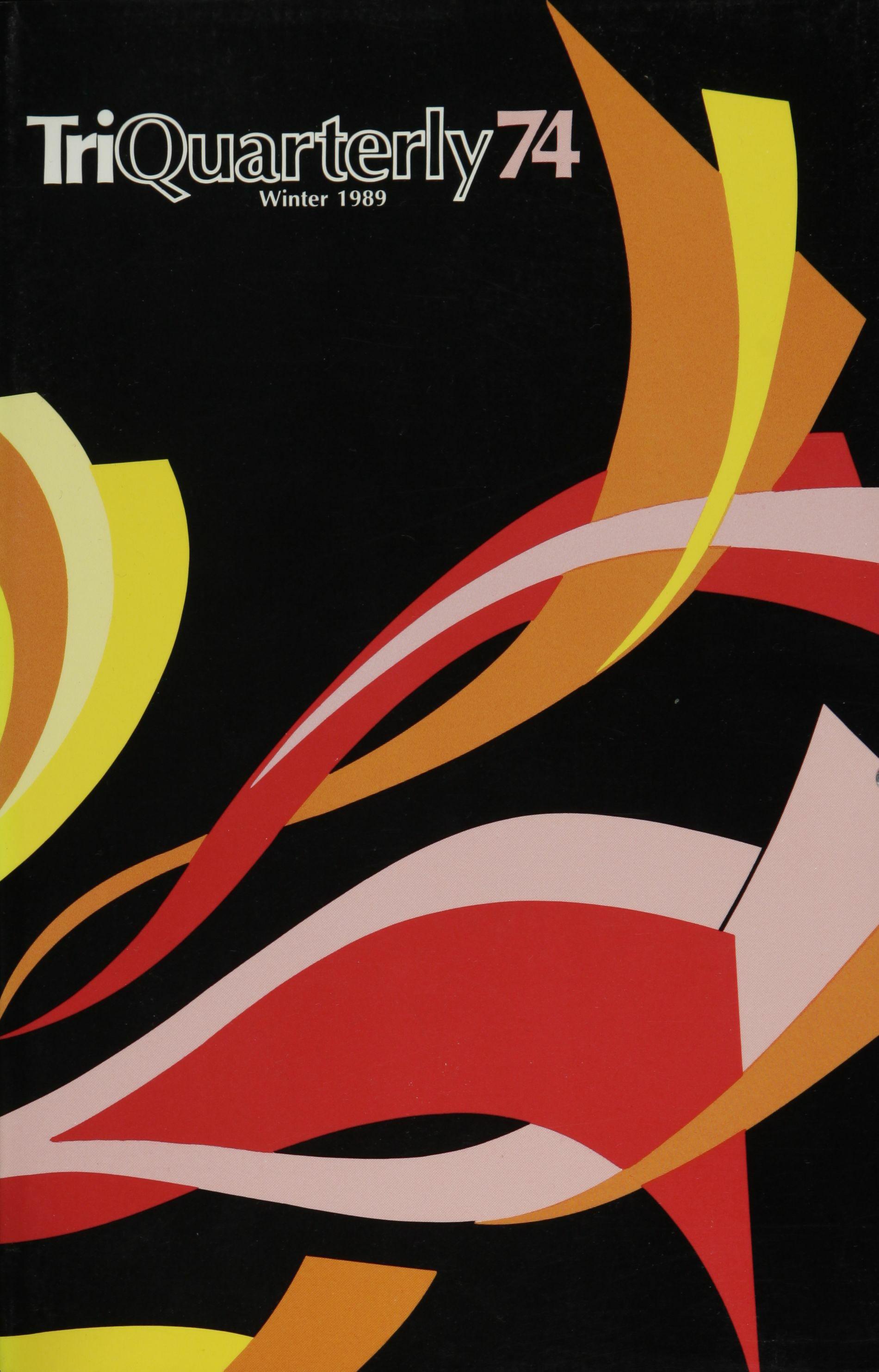
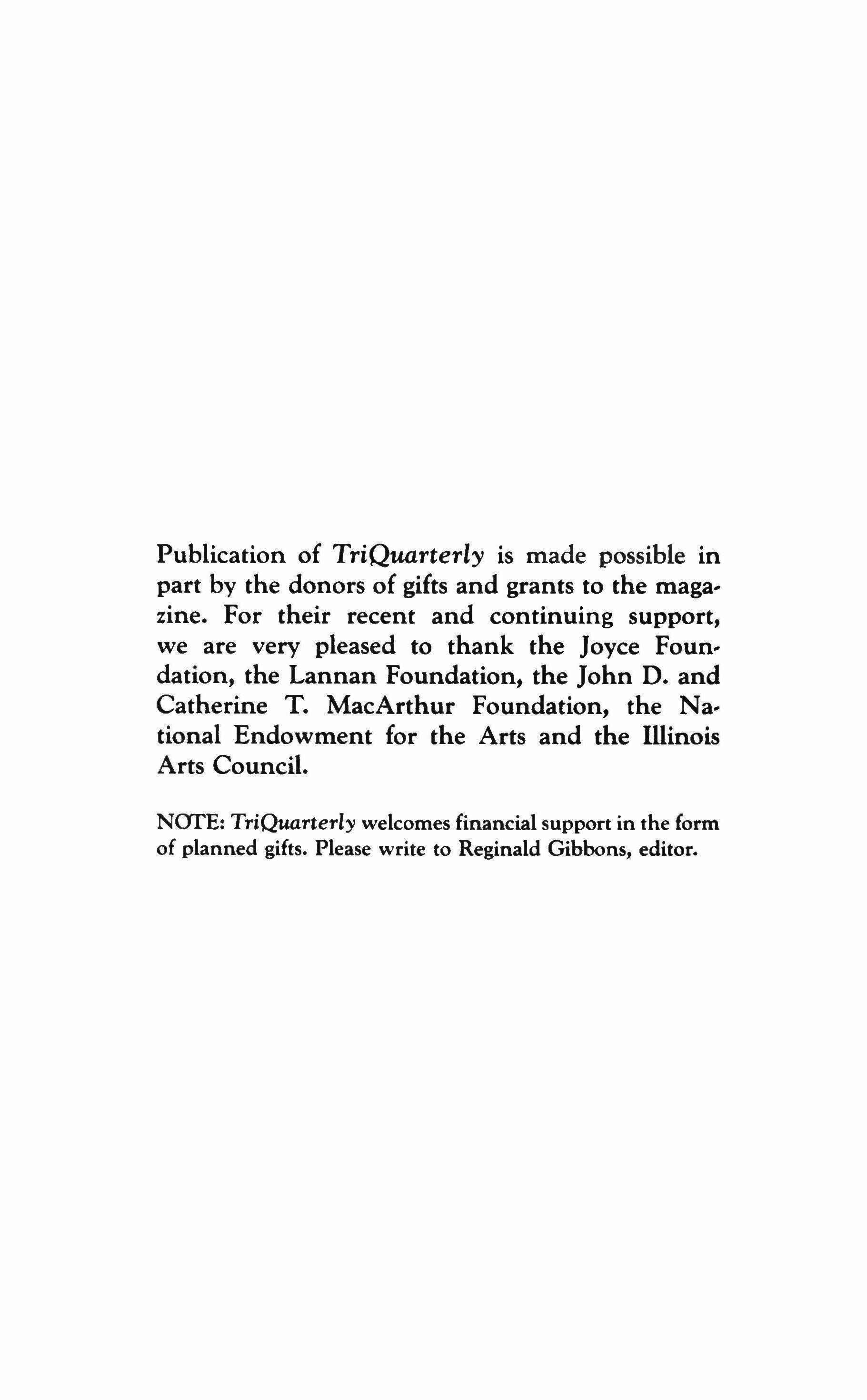
Publication of TriQuarterly is made possible in part by the donors of gifts and grants to the maga zine. For their recent and continuing support, we are very pleased to thank the Joyce Foun dation, the Lannan Foundation, the John D. and Catherine T. MacArthur Foundation, the Na tional Endowment for the Arts and the Illinois Arts Council.
NOTE: TriQuarterly welcomes financial support in the form of planned gifts. Please write to Reginald Gibbons, editor.
Associate Editor
Susan Hahn

Editor
Reginald Gibbons
Managing Editor Janet Vander Kelen
Special Projects Editor Fred Shafer
Assistant to the Editor Janet E. Geovanis
Editorial Assistants
Executive Editor Bob Perlongo
Design Director Gini Kondziolka
TriQuarterly Fellow Beth DeSchrvver
W. Douglas Fitzsimmons, Amy Rosenzweig, Jo Anne Ruvoli
Advisory Editors
Hugo Achugar, Robert Alter, Michael Anania, Cyrus Colter, Rita Dove, Gloria Emerson, Richard Ford, George Garrett, Gerald Graff, Francine du Plessix Gray, Michael S. Harper, Bill Henderson, Maxine Kumin, Grace Paley, Michael Ryan, Alan Shapiro, Ellen Bryant Voigt
TRIQUARTERLY IS AN INTERNATIONAL JOURNAL OF WRITING, ART AND CULTURAL INQUIRY PUBLISHED IN THE FALL, WINTER AND SPRING AT NORTHWESTERN UNIVERSITY.
Subscription rates-Individuals: one year $18; two years $32; life $250. Institutions: one year $26; two years $44; life $300. Foreign subscriptions $4 per year additional. Price of single copies varies. Sample copies $4. Correspondence and subscriptions should be addressed to TriQuarterly. NORTHWESTERN UNIVERSITY, 2020 Ridge Avenue, Evanston, IL 60208. Phone: (312) 4913490. The editors invite submissions of fiction, poetry and literary essays, which must be received between October 1 and April 30; manuscripts received between May 1 and September 30 will not be read. No manuscripts will be returned unless accompanied by a stamped, self-addressed envelope. All manuscripts accepted for publication become the property of TriQuarterly, unless otherwise indicated. Copyright © 1989 by TriQuarterly. No part of this volume may be reproduced in any manner without written permission. The views expressed in this magazine are to be attributed to the writers, not the editors or sponsors. Printed in the United States of America by ThomsonShore, typeset by Sans Serif.
National distributor to retail trade: B. DeBoer, 113 East Centre Street-Rear, Nutley, NJ 07110, (201-667-9300). Distributor for West Coast trade: Bookpeople, 2929 Fifth Street, Berkeley, CA 94710, (415-549-3030). Midwest: Illinois Literary Publishers Association, P.O. Box 816, Oak Park, IL 60303, (312-383-7535); and Ingram Periodicals, 347 Reedwood Drive, Nashville, TN 37217, (615-793-5000).
Reprints of issues #1-15 ofTriQuarterly are available in full format from Kraus Reprint Company, Route 100, Millwood, NY 10546, and all issues in microfilm from University Microfilms International, 300 North Zeeb Road, Ann Arbor, MI 48106. lSSN: 0041-3097.
74
Winter 1989

COVER STORY
If you like this issue's cover, you'll love the 18" x 24" poster version thereof, similarly colored and identical in all respects except that the poster does not have the issue number or date - just the TriQuarterly logo. Created by TQ Design Director Gini Kondziolka and printed on heavy, coated stock, this is a poster to be proud of-and one you may wish to have framed. To order, send $9.00 check or money order per poster to TriQuarterly, 2020 Ridge Avenue, Evanston, IL 60208. Or, to charge your VISA or MasterCard, please so specify and include your account number and the card's expiration date. (Please note that the $9.00 price includes handling and shipment in a sturdy, specially designed mailing tube.)
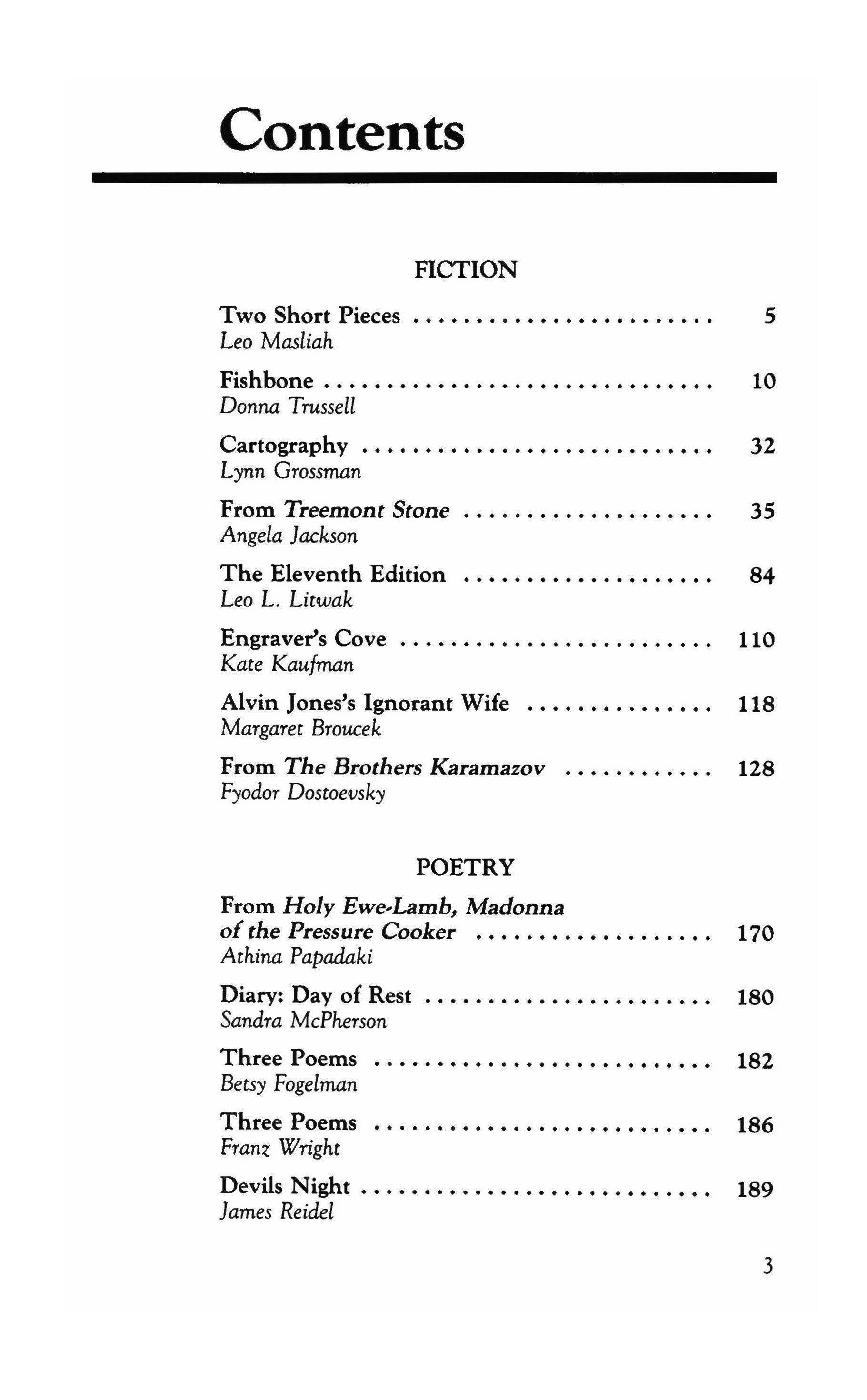
Contents FICTION Two Short Pieces Leo Masliah 5 Fishbone 10 Donna Trussell Cartography 32 Lynn Grossman From Treemont Stone Angela]ackson The Eleventh Edition Leo L. Litwak Engraver's Cove 110 Kate Kaufman 35 84 Alvin Jones's Ignorant Wife 118 Margaret Broucek From The Brothers Karamazov Fyodor Dostoevsky 128 POETRY From Holy Ewe-Lamb, Madonna of the Pressure Cooker 170 Athina Papadaki Diary: Day of Rest Sandra McPherson 180 Three Poems Betsy Fogelman Three Poems 186 Franz Wright Devils Night 189 James Reidel 182 3

Bye Bye Blackbird 190 Mary Kinzie A&P Nightshift: January 1959 193 Paul Mariani From Donner •. 196 Belle Randall Two Poems 201 Adrienne Rich I. C. U. 203 Robert A. Fink Three Poems 205 Josephine Jacobsen Two Poems 209 Eleanor Wilner Two Poems. 214 Ingeborg Bachmann Antigone 217 Czeslaw Milosz From Martial 221 Laurie Duggan Life of Johnson Upside Your Head Forrest Gander 232 ESSAYS The Sad White Jazz Man 247 Peter Schwendener Teaching, Writing and Politics Roger Mitchell 255 CONTRIBUTORS 264 Cover design by Gini Kondziolka Photographs by Mark Steinmetz following pages 20, 120 and 222.
Two Short Pieces
Leo Masliah

THE TWIN (script for a comic strip)
Frame I-Even before I learned the meaning of the word "hate," I felt unconditional hatred toward my twin brother Franz. (The illustration shows two infants fighting over their mother's breast.)
Frame 2-When I finally learned to read, the dictionary offered me an appropriate means of verbalizing my feelings. (The illustration shows the narrator pointing with his index finger to the word "hate" in the middle of a page; some distance away is the figure of Franz, identical to that of the narrator. Both are schoolboys.)
Frame 3-Subsequent grammatical studies made it possible for me to articulate what I was feeling in complete syntactic units. (The illustration shows the narrator saying "I hate you" to his brother. Both appear wearing uniforms that identify them as secondary school students.)
Frame 4-The happiness of my first amorous experiences failed to overshadow my intrinsic animosity. (The illustration shows the narrator locked in an embrace with his girlfriend on a park bench. She asks him: "What are you thinking about, my darling? You're so quiet." He answers: "I'm thinking a little about how much I love you, but mostly about how much I hate Franz.")
Frame 5 - Franz's wedding day afforded me a first opportunity to manifest my somber inclinations in public. (The illustration shows Franz's wedding. The priest asks "Does anyone have any objection to this union?" The narrator answers "I do. I regard the groom as totally contemptible.")
Frame 6-When I got married, the priest got the papers mixed up and addressed me mistakenly as Franz; the irreverent ecclesiastic lived to deplore his lamentable blunder. (The illustration shows the
5

narrator, next to his bride, slapping the priest and saying, "I'll teach you to confuse me with Franz, you retard!"}
Frame 7 - Because 1 was unwilling to fill out those parts of the application forms requiring a list of my close relatives, 1 had to turn down numerous opportunities for employment. (The illustration shows the narrator inducing the forced ingestion by mouth of a crumpled application form, on the part of the civil servant waiting on him.)
Frame 8-0bliged to placate my rage with an apology of the works of Chopin and Schumann, my piano teacher came to regret having proposed to me the performance of pieces by Liszt and Schubert. (The illustration shows the narrator strangling his piano teacher, and exclaiming, "Just what did you think you were going to make me play, you stupid old cow?" On the floor there appears a musical score bearing the name of Franz Schubert.)
Frame 9-1 had to beat it out of a bookstore in a hurry one day whenwhile rummaging distractedly through the contents of a table full of sale items, I threw up noisily all over a volume of Kafka. (The illustration shows the narrator running up the street as the book dealer shouts to him from the doorway of his store, "Come right back here and clean that up, you existentialist pig!")
Frame 10-My already boundless hatred increased tenfold after 1 discovered that while 1 spent my free time seducing my brother's wife, my own infamous spouse was off making love to none other than Franz. (The illustration shows the narrator in bed with his lover in a hotel room, while in the adjoining room a voice can be heard saying, "Oh, Franz!")
Frame 11-When-following both Franz's and my own divorce, and the loss of our respective jobs due to poor evaluations mistakenly forwarded by us to our respective employers in an inverse exchange of correspondence-we once again found ourselves sharing the same bedroom at our parents' house, base sentiments began to darken my every waking hour. (The illustration shows the two twins in their respective beds, with markedly bellicose expressions on their faces.)
Frame 12 - The night 1 decided to do away with Franz once and for all, 1 discovered that 1 wasn't the only one with guns on my mind. (The illustration shows the twins in their beds, each with his respective revolver sticking out from under his respective blanket.)
Frame 13-At present, however, 1 am under the care of a psychoanalyst who has been trying to convince me that my own name is Franz and 1 never had a twin brother. (The illustration shows Franz.)
6
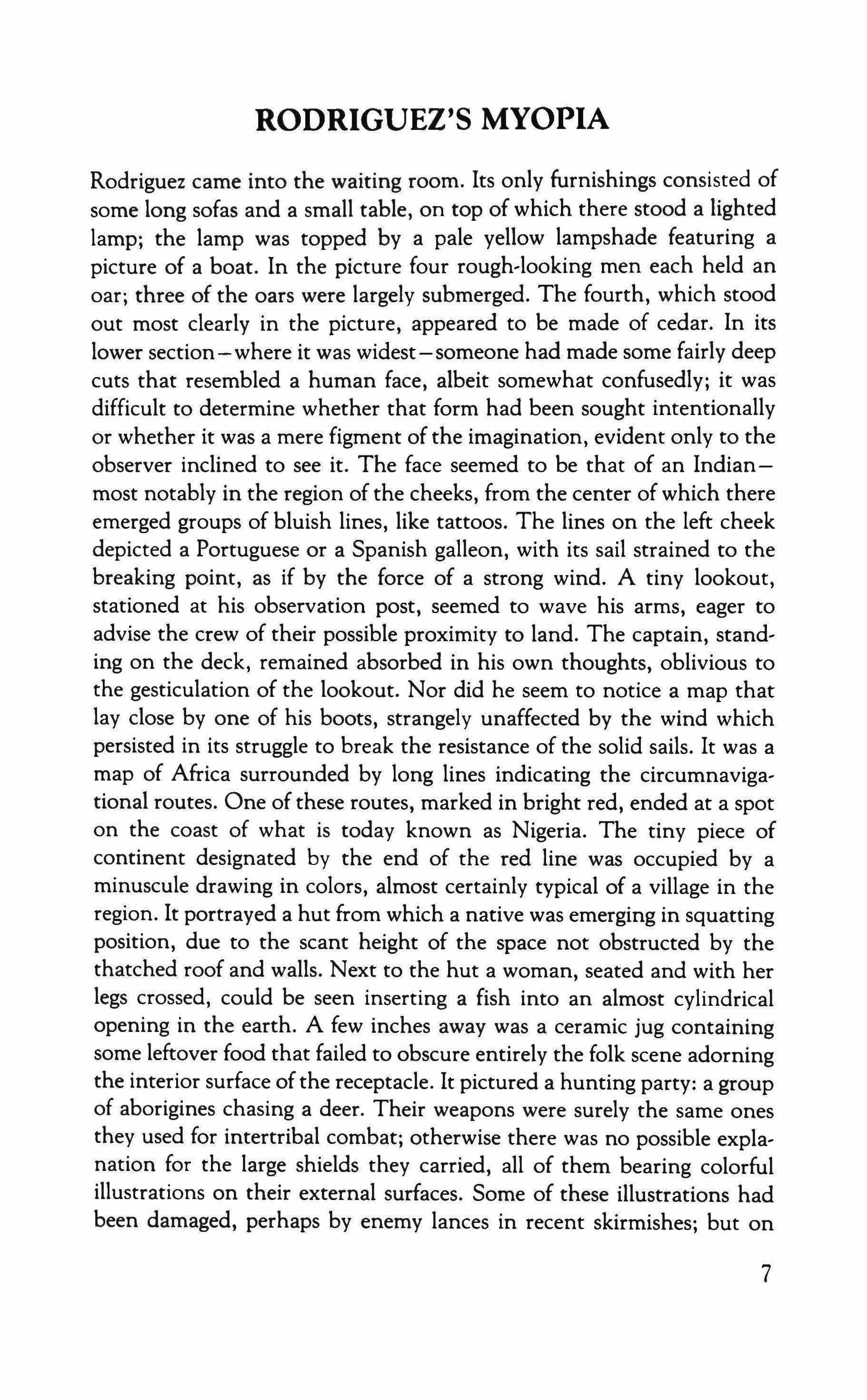
RODRIGUEZ'S MYOPIA
Rodriguez came into the waiting room. Its only furnishings consisted of some long sofas and a small table, on top of which there stood a lighted lamp; the lamp was topped by a pale yellow lampshade featuring a picture of a boat. In the picture four rough-looking men each held an oar; three of the oars were largely submerged. The fourth, which stood out most clearly in the picture, appeared to be made of cedar. In its lower section-where it was widest-someone had made some fairly deep cuts that resembled a human face, albeit somewhat confusedly; it was difficult to determine whether that form had been sought intentionally or whether it was a mere figment of the imagination, evident only to the observer inclined to see it. The face seemed to be that of an Indianmost notably in the region of the cheeks, from the center of which there emerged groups of bluish lines, like tattoos. The lines on the left cheek depicted a Portuguese or a Spanish galleon, with its sail strained to the breaking point, as if by the force of a strong wind. A tiny lookout, stationed at his observation post, seemed to wave his arms, eager to advise the crew of their possible proximity to land. The captain, standing on the deck, remained absorbed in his own thoughts, oblivious to the gesticulation of the lookout. Nor did he seem to notice a map that lay close by one of his boots, strangely unaffected by the wind which persisted in its struggle to break the resistance of the solid sails. It was a map of Africa surrounded by long lines indicating the circumnavigational routes. One of these routes, marked in bright red, ended at a spot on the coast of what is today known as Nigeria. The tiny piece of continent designated by the end of the red line was occupied by a minuscule drawing in colors, almost certainly typical of a village in the region. It portrayed a hut from which a native was emerging in squatting position, due to the scant height of the space not obstructed by the thatched roof and walls. Next to the hut a woman, seated and with her legs crossed, could be seen inserting a fish into an almost cylindrical opening in the earth. A few inches away was a ceramic jug containing some leftover food that failed to obscure entirely the folk scene adorning the interior surface ofthe receptacle. It pictured a hunting party: a group of aborigines chasing a deer. Their weapons were surely the same ones they used for intertribal combat; otherwise there was no possible explanation for the large shields they carried, all of them bearing colorful illustrations on their external surfaces. Some of these illustrations had been damaged, perhaps by enemy lances in recent skirmishes; but on
7
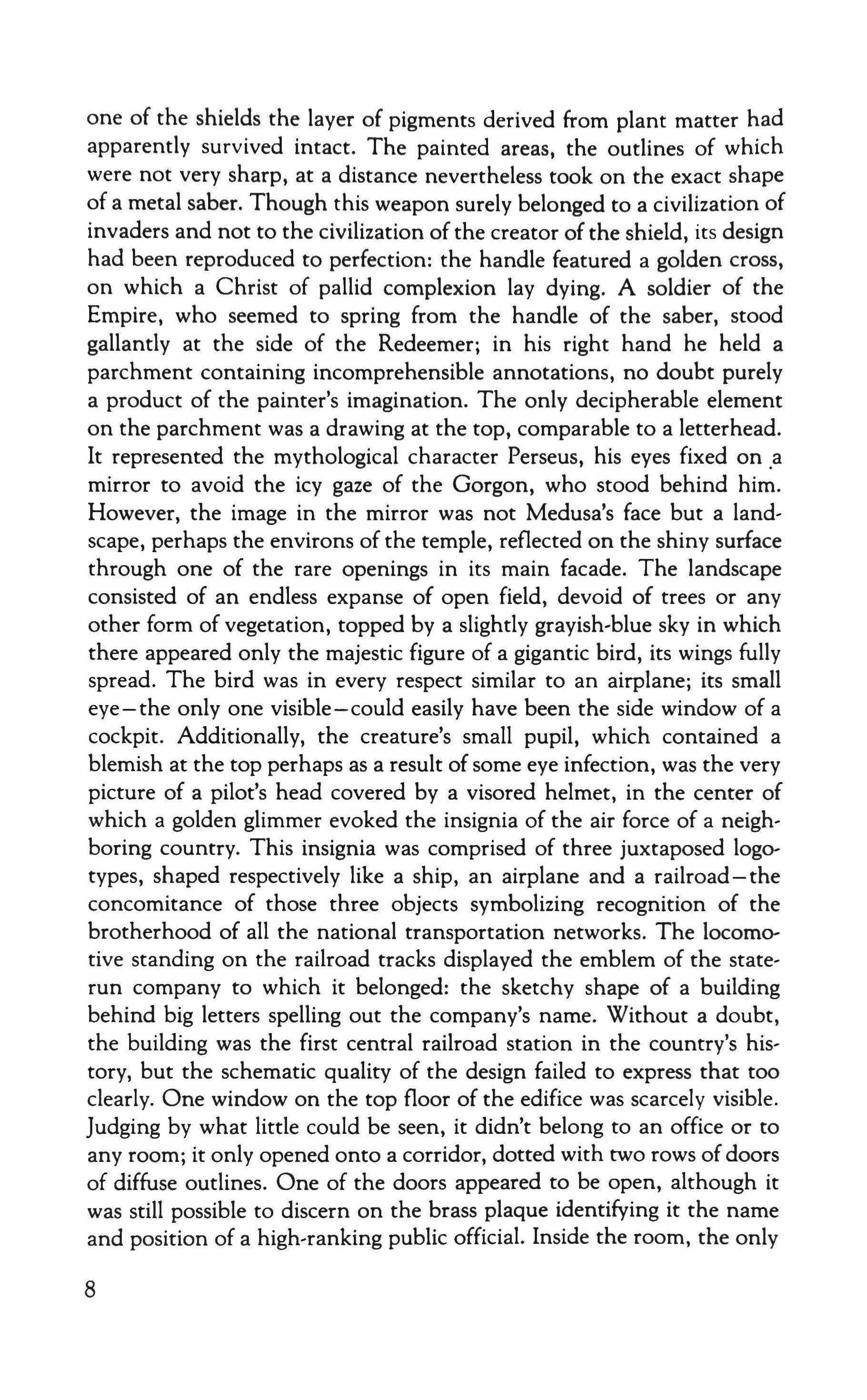
one of the shields the layer of pigments derived from plant matter had apparently survived intact. The painted areas, the outlines of which were not very sharp, at a distance nevertheless took on the exact shape of a metal saber. Though this weapon surely belonged to a civilization of invaders and not to the civilization of the creator of the shield, its design had been reproduced to perfection: the handle featured a golden cross, on which a Christ of pallid complexion lay dying. A soldier of the Empire, who seemed to spring from the handle of the saber, stood gallantly at the side of the Redeemer; in his right hand he held a parchment containing incomprehensible annotations, no doubt purely a product of the painter's imagination. The only decipherable element on the parchment was a drawing at the top, comparable to a letterhead. It represented the mythological character Perseus, his eyes fixed on .a mirror to avoid the icy gaze of the Gorgon, who stood behind him. However, the image in the mirror was not Medusa's face but a landscape, perhaps the environs of the temple, reflected on the shiny surface through one of the rare openings in its main facade. The landscape consisted of an endless expanse of open field, devoid of trees or any other form of vegetation, topped by a slightly grayish-blue sky in which there appeared only the majestic figure of a gigantic bird, its wings fully spread. The bird was in every respect similar to an airplane; its small eye-the only one visible-could easily have been the side window of a cockpit. Additionally, the creature's small pupil, which contained a blemish at the top perhaps as a result of some eye infection, was the very picture of a pilot's head covered by a visored helmet, in the center of which a golden glimmer evoked the insignia of the air force of a neighboring country. This insignia was comprised of three juxtaposed logotypes, shaped respectively like a ship, an airplane and a railroad-the concomitance of those three objects symbolizing recognition of the brotherhood of all the national transportation networks. The locomotive standing on the railroad tracks displayed the emblem of the staterun company to which it belonged: the sketchy shape of a building behind big letters spelling out the company's name. Without a doubt, the building was the first central railroad station in the country's history, but the schematic quality of the design failed to express that too clearly. One window on the top floor of the edifice was scarcely visible. Judging by what little could be seen, it didn't belong to an office or to any room; it only opened onto a corridor, dotted with two rows ofdoors of diffuse outlines. One of the doors appeared to be open, although it was still possible to discern on the brass plaque identifying it the name and position of a high-ranking public official. Inside the room, the only
8

thing Rodriquez could make out - and that with great effort - was a painting that occupied almost a third of the surface of the wall. But it was impossible to see what that painting contained. Disappointed, he directed his gaze elsewhere.
Translated from the Spanish by Louise B. Popkin
9
Fishbone
Donna Trussell

The other girls from my senior class were off at college or working. Not me. I stayed alone in my room and played The Game of Life. Mama didn't like it.
"Wanda, are you on drugs?" she said.
I shook my head. I spun the plastic wheel-it made a ratchet soundand moved the blue car two spaces, up on a hill. The great thing about The Game of Life was all the plastic hills and valleys. No other game had such realism.
"You need a change," Mama said. ''You're going to Meemaw's."
My bus was leaving early the next morning, so I had to pack in a hurry. But I took the time to put a matchbook in my purse. I don't smoke, but I thought it might come in handy if I needed to send a message to the bus driver: Hijacker, ninth row, submachine gun under his coat.
The sky was overcast, and it was a slow, pale trip. The only rest stop was in Centerville, where I got a fish sandwich at the Eat It and Beat It. Meemaw was waiting for me at the station. She smelled of cold cream and lilacs.
Ed grabbed my suitcase. "Yo," he said.
"Yo," I said back.
Ed's pickup was full of old Soldier of Fortunes. I rested my feet on top of a picture of a tank. Meemaw's life sure had changed since she married Ed.
"My little girl," she said. She patted my knee the way a kid flattens Play-doh.
"She's not your girl," Ed said. "She's your granddaughter."
"She is my little girl."
10

A chain link fence now surrounded Meemaw's garden. "Keeps dogs out," she said. The fence made her farm look even less farmish than it had, with its green shack for a barn and refrigerator toppled on its side out back and giant new house modeled after the governor's mansion.
Meemaw fussed over me at supper: Wanda, can I get you some more roast, would you like another helping of butter beans, how about some corn bread?
Ed had three cups of coffee with supper. He poured the coffee into his saucer and blew on it. I asked him why he drank his coffee that way.
He didn't answer. Finally Meemaw said, "To cool it down."
Ed's cup and saucer were monogrammed in gold. My plate too.
"Meemaw, where's your dishes?" I asked. "The ones with purple ribbons and grapes?"
"Well, we have Ed's china now."
He slurped his coffee, staring straight ahead. He might as well have been talking to the curtains when he said, "I'm glad you're here, Wanda, because I've been wanting to ask you something. All day I've been wondering-who paid the hospital when you had that baby? The taxpayers?"
I smashed a butter bean with my fork. "Excuse me," I said and went outside.
I looked out across the pine trees, dark green. I used to believe trees had people inside them. I wished some God would change me into a tree. That wouldn't be a bad life-sun, rain, birds. Kids looking for pine cones. Me shaking my branches for them.
The peat moss in the garden was warm. I lay down and pulled a watermelon close.
After a while Meemaw came out and sat down near my head, in the snapdragons and cucumbers. Meemaw planted vegetables and flowers together, except for the gladiolas, offby themselves. Pink, peach, yellow, white-a million baby shoes, shifting in the wind.
She smoothed my hair and talked about exercise and how important it was.
"Meemaw, what happened to your strawberries?"
"Birds. But that's all right. Plenty for the birds too."
Every morning we'd go out to pull weeds, and she'd tell me uplifting stories about people she knew. Trials they'd had. A young man wanted to commit suicide because law school was so hard. Once a week his mother wrote him letters full of encouraging words.
"What kind of encouraging words?"
"Oh, 'Don't give up.' That sort of thing."
11

When he graduated he found out she'd been dead for a month. She'd known she was dying, and had written the last letters ahead of time. Meemaw knew lots of stories about people who "took the path of least resistance" and ended up sick or poor. I got back at her by asking personal questions.
"Meemaw, have you ever had an orgasm?"
Yes, she said. Once. "I was glad to know what it is that causes so much of human behavior." She smiled and handed me a bunch of gladiolas. Afternoons I stayed in my room. Mama wouldn't let me bring The Game of Life. I lay on the bed a lot. The light fixture had leaves and berries molded in the glass. Once I wrapped my arms around the chest of drawers and put my head down on the cool marble top.
Meemaw would call me to supper. There wasn't much discussion at the table. If anyone said anything, it was Ed talking to Meemaw or Meemaw talking to me. Except for once, when I went to the stove to get some salt. Ed told me I'd done it all wrong. ''You don't bring the plate to the salt. You bring the salt to the plate."
After supper Meemaw and I went down to the barn. She milked Sissy. I fed the chickens. I'd throw a handful of feed and they'd move in at eighty miles an hour.
Ed never came with us. He hates Sissy, Meemaw told me. "He's jealous."
"Jealous of a cow?"
"Why, of course. I spend so much of my time with her."
Evenings Ed watched Walking Tall on his VCR. Or he went inside his toolshed. He never worked on anything. He looked at catalogs and ordered tools, and when they came he hung them on the walls. He read books about the end of the world: the whole state of Colorado was going to turn into jello, and people will drown. "You've got five years to live, young lady," he told me. "Five years."
He had guns- a whole case-full. Once I saw him polishing them when I was standing in the hall by his study.
"What do you think you're doing?" he said. I walked away. He shut the door.
One day when I was watching Meemaw through a little diamond shape made of my thumbs and two fingers, Ed said, "You planning on sitting on your butt all summer?"
"I haven't thought about it."
"Start thinking."
12
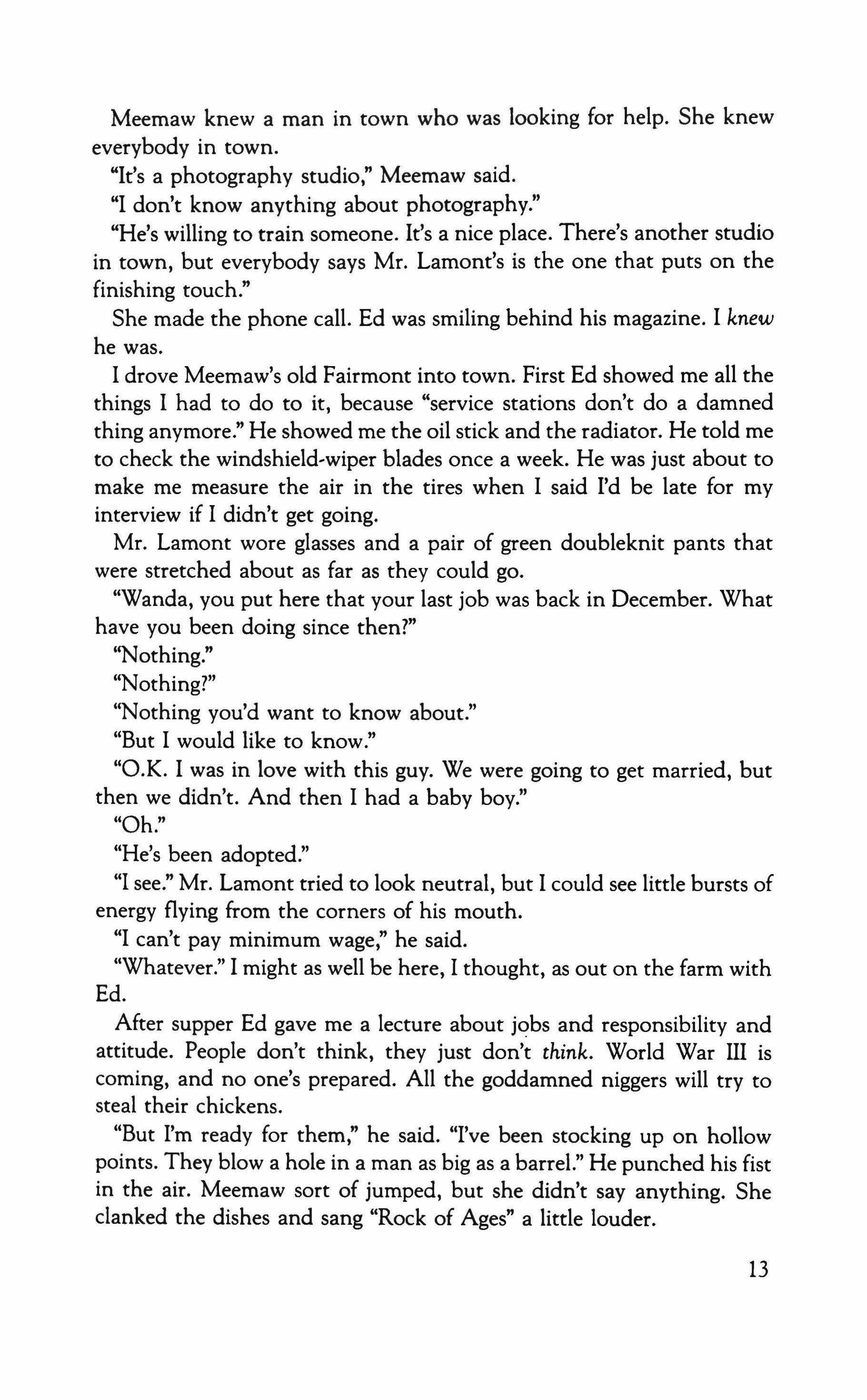
Meemaw knew a man in town who was looking for help. She knew everybody in town.
"It's a photography studio," Meemaw said.
"I don't know anything about photography."
"He's willing to train someone. It's a nice place. There's another studio in town, but everybody says Mr. Lamont's is the one that puts on the finishing touch."
She made the phone call. Ed was smiling behind his magazine. I knew he was.
I drove Meemaw's old Fairmont into town. First Ed showed me all the things I had to do to it, because "service stations don't do a damned thing anymore." He showed me the oil stick and the radiator. He told me to check the windshield-wiper blades once a week. He was just about to make me measure the air in the tires when I said I'd be late for my interview if I didn't get going.
Mr. Lamont wore glasses and a pair of green doubleknit pants that were stretched about as far as they could go.
"Wanda, you put here that your last job was back in December. What have you been doing since then?"
"Nothing," "Nothing?"
''Nothing you'd want to know about."
"But I would like to know."
"O.K. I was in love with this guy. We were going to get married, but then we didn't. And then I had a baby boy."
"Oh."
"He's been adopted."
"I see." Mr. Lamont tried to look neutral, but I could see little bursts of energy flying from the corners of his mouth.
"I can't pay minimum wage," he said.
"Whatever." I might as well be here, I thought, as out on the farm with Ed.
After supper Ed gave me a lecture about jobs and responsibility and attitude. People don't think, they just don't think. World War III is coming, and no one's prepared. All the goddamned niggers will try to steal their chickens.
"But I'm ready for them," he said. "I've been stocking up on hollow points. They blow a hole in a man as big as a barrel." He punched his fist in the air. Meemaw sort of jumped, but she didn't say anything. She clanked the dishes and sang "Rock of Ages" a little louder.
13

I went to bed with the pamphlet Mr. Lamont gave me, The Fine Art of Printing Black and White. The paper is very sensitive, it said.
The next day Mr. Lamont showed me the safelight switch. "See that gouge? I did that so I could feel for it in the dark."
He did a test strip. "Agitate every few seconds," he said, rocking the developer tray.
He let me print a picture of a kid holding a trophy. "Make it light," he said. "The newspaper adds contrast. Look how this one came out." He showed me a clipping of a bunch of Shriners. They looked like they had some kind of skin disease.
After a week I got the hang of it, and Mr. Lamont left me in charge of black and white. I liked the darkroom. No phones. No people, except for the faces that slowly developed before me. Women and their fiances. Sometimes the man stood behind the woman and put both arms around her waist.
Jimmy used to do that.
He held me like that at the senior picnic. It was windy. Big rocks nailed down the corners of each tablecloth. Blue gingham. The white tablecloths had to be returned because the principal thought they'd remind the students of bedsheets. Jimmy and I laughed; we'd been making love for weeks. We got careless, in the tall grasses by Cedar Creek Lake. Night birds called across the water.
When I was two weeks late, I told him. He looked away. There's a clinic, he said, in Dallas. I covered his lips with my fingers.
At Western Auto they said they'd take him on, weekends and nights. At the Sonic, too, for the morning shift. Jimmy and I looked at an apartment on Burning Tree Drive, southwest of town. A one-bedroom. He stared at the ceiling. Jimmy? I said.
Goodbye, goodbye, I told the mirror long before I really said it. I read every book I could find about babies and their tadpole bodies. I gave up Coke and barbecue potato chips. My breasts swelled. I felt great. Hormones, the doctor said.
At first my baby was just a rose petal, sleeping, floating. At eight months I played him records, Mama's South Pacific and Daddy's "Seventy-six Trombones." I stood right next to the stereo, and he talked to me with thumps of his feet.
You want to feel him kick? I asked. Mama shook her head and kept on ironing. Daddy left the room.
I didn't get a baby shower. Mama told everyone I was putting it up for adoption. "It," she called him. I made up different names for him. Fishbone, one week. Logarithm, the next.
14
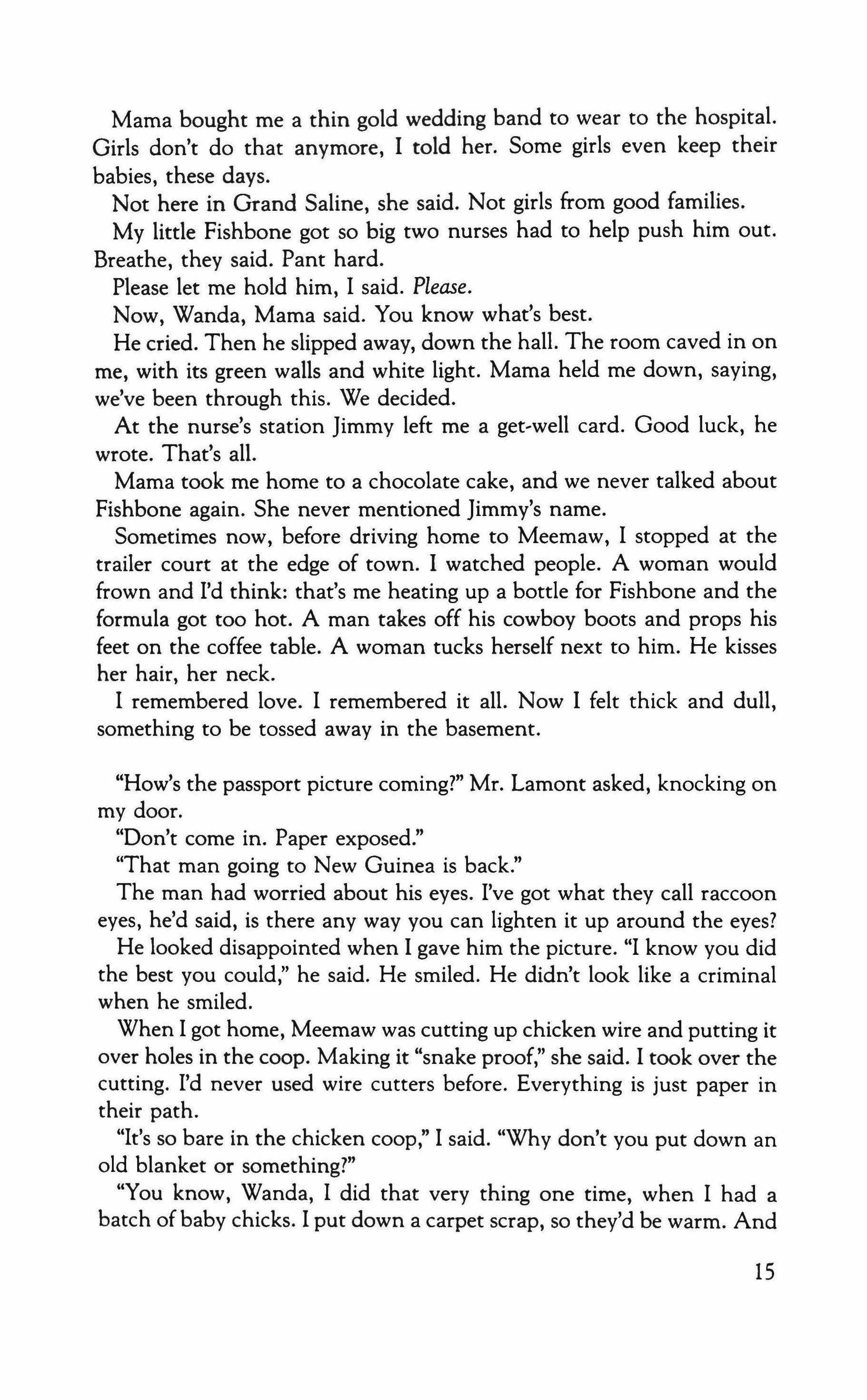
Mama bought me a thin gold wedding band to wear to the hospital. Girls don't do that anymore, I told her. Some girls even keep their babies, these days.
Not here in Grand Saline, she said. Not girls from good families. My little Fishbone got so big two nurses had to help push him out. Breathe, they said. Pant hard.
Please let me hold him, I said. Please.
Now, Wanda, Mama said. You know what's best. He cried. Then he slipped away, down the hall. The room caved in on me, with its green walls and white light. Mama held me down, saying, we've been through this. We decided.
At the nurse's station Jimmy left me a get-well card. Good luck, he wrote. That's all.
Mama took me home to a chocolate cake, and we never talked about Fishbone again. She never mentioned Jimmy's name.
Sometimes now, before driving home to Meemaw, I stopped at the trailer court at the edge of town. I watched people. A woman would frown and I'd think: that's me heating up a bottle for Fishbone and the formula got too hot. A man takes off his cowboy boots and props his feet on the coffee table. A woman tucks herself next to him. He kisses her hair, her neck.
I remembered love. I remembered it all. Now I felt thick and dull, something to be tossed away in the basement.
"How's the passport picture coming?" Mr. Lamont asked, knocking on my door.
"Don't come in. Paper exposed."
"That man going to New Guinea is back."
The man had worried about his eyes. I've got what they call raccoon eyes, he'd said, is there any way you can lighten it up around the eyes?
He looked disappointed when I gave him the picture. "I know you did the best you could," he said. He smiled. He didn't look like a criminal when he smiled.
When I got home, Meemaw was cutting up chicken wire and putting it over holes in the coop. Making it "snake proof," she said. I took over the cutting. I'd never used wire cutters before. Everything is just paper in their path.
"It's so bare in the chicken coop," I said. "Why don't you put down an old blanket or something?"
"You know, Wanda, I did that very thing one time, when I had a batch ofbaby chicks. I put down a carpet scrap, so they'd be warm. And
15

they died. Every single one! I was just heartbroken. And do you know what I found out? They'd eaten the carpet."
"How'd you find that out?"
"I did an autopsy."
"00000, Meemaw! How awful."
She shrugged. "Nothing awful about it. I wanted to know."
"I could never be a doctor," I said.
I read somewhere that these psychologists asked a bunch of surgeons why they became doctors, and they all said they wanted to help people. And then they did psychological tests on them and found out they were part sadists. They liked knives.
"How about a photographer?" Meemaw said. "I hear they teach photography in college now. I would pay for you to go."
I rolled up the leftover chicken wire and put it away in the barn. Meemaw came in after me.
"Time to milk Sissy, isn't it?" I said. I went to get the milk pail.
"What do you want to do with your life, Wanda?"
"You promised not to ask me that anymore."
She laughed and patted me on the back. "Yes, I did." She set the pail under Sissy, and then turned to face me again. "But what are you going to do?"
"I don't know, Meemaw."
Lately I'd been thinking about the homeless on TV, and how they live. I live in the gutter, I could say. It has a nice ring to it.
"Wanda, I once read a book where the first page had a quotation from the Bible. I thought it was the most beautiful of any Bible verse I'd ever read. It said the Lord will restore unto you the years the locusts have eaten."
She paused. When I didn't say anything, she waved her arms, saying, "Isn't that beautiful?"
"Uh huh."
The barn door swung open. Ed.
"How many times do I have to tell you not to leave the wheelbarrow out? It's been sitting there in the garden since morning."
"I told her it was O.K.," Meemaw said. "It doesn't hurt anything."
"The hell it doesn't. If you leave it out, it rusts. If it rusts, you have to buy a new one."
"I don't think it'll rust for ten years at least."
"Either you use the tools or they use you. That's all I have to say about it."
He stomped off.
16
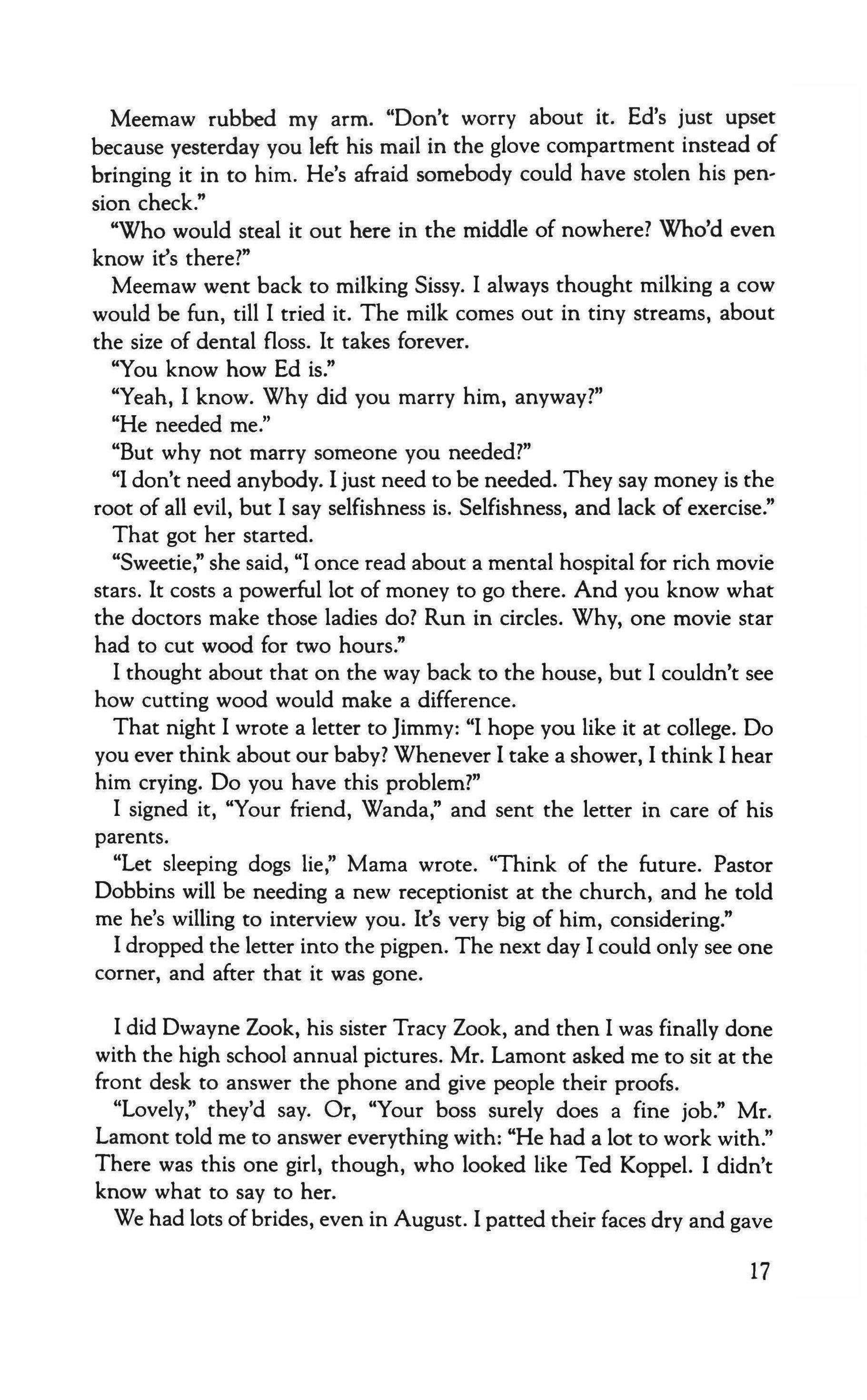
Meemaw rubbed my arm. "Don't worry about it. Ed's just upset because yesterday you left his mail in the glove compartment instead of bringing it in to him. He's afraid somebody could have stolen his pension check."
"Who would steal it out here in the middle of nowhere? Who'd even know it's there?"
Meemaw went back to milking Sissy. I always thought milking a cow would be fun, till I tried it. The milk comes out in tiny streams, about the size of dental floss. It takes forever.
"You know how Ed is."
"Yeah, I know. Why did you marry him, anyway?"
"He needed me."
"But why not marry someone you needed?"
"I don't need anybody. I just need to be needed. They say money is the root of all evil, but I say selfishness is. Selfishness, and lack of exercise."
That got her started.
"Sweetie," she said, "I once read about a mental hospital for rich movie stars. It costs a powerful lot of money to go there. And you know what the doctors make those ladies do? Run in circles. Why, one movie star had to cut wood for two hours."
I thought about that on the way back to the house, but I couldn't see how cutting wood would make a difference.
That night I wrote a letter to Jimmy: "I hope you like it at college. Do you ever think about our baby? Whenever I take a shower, I think I hear him crying. Do you have this problem?"
I signed it, "Your friend, Wanda," and sent the letter in care of his parents.
"Let sleeping dogs lie," Marna wrote. "Think of the future. Pastor Dobbins will be needing a new receptionist at the church, and he told me he's willing to interview you. It's very big of him, considering."
I dropped the letter into the pigpen. The next day I could only see one corner, and after that it was gone.
I did Dwayne Zook, his sister Tracy Zook, and then I was finally done with the high school annual pictures. Mr. Lamont asked me to sit at the front desk to answer the phone and give people their proofs.
"Lovely," they'd say. Or, "Your boss surely does a fine job." Mr. Lamont told me to answer everything with: "He had a lot to work with." There was this one girl, though, who looked like Ted Koppel. I didn't know what to say to her.
We had lots ofbrides, even in August. I patted their faces dry and gave
17

them crushed ice to eat. I spread their dresses in perfect circles around their feet.
One day Mr. Lamont asked if I'd like to come into his darkroom to see how he did color.
"It looks like pink," he said, "but we call it magenta." He held up another filter. "What would you call that?"
"Turquoise?"
"Cyan," he said.
"Sigh-ann,"
He let me do one, a baby sitting with its mother on the grass. The picture turned out too yellow, so I did another one.
"Perfect," he said. "You learn real quick."
"Thanks."
We goofed off the rest of the day. He showed me some wedding pictures that were never picked up. "A real shame," he said. "That's the best shot of the getaway car I've ever done."
He started going down to Food Heaven to get lunch for both of us. We'd eat Crescent City Melts and talk. He teased me about Ed, asking if it was true that he got kicked in the head by a mule when he was a kid. "Does he really have two Cadillacs?"
"Three. They just sit out back. He drives his pickup truck everywhere."
Sometimes Mr. Lamont would come into my darkroom. He'd check on my supply ofstop bath or Panalure. Then he'd lean in the corner and watch me work. He never touched me. We'd just stand there in the cool darkness.
He told me about his mother and why he couldn't leave her. "Cataracts," he said. "I read to her."
I told him about the book I got at the library, The Songwriter's Book of Rhymes. Also-ran rhymed with Peter Pan, Marianne, caravan, Yucatan, lumberman and about two hundred other words.
In Discovering Your America every state was pale pink, green or yellow. Nebraska had tiny bundles of wheat in one corner, and New Mexico had Indian headdresses. That night I dreamed I was high above Texas, watching the whole pink state come alive. Oil wells gushed. Fish flopped high in the air. Little men in hard hats danced around.
"I don't want to go to photography school," I told Meemaw the next morning. "I want to buy a car and drive to West Texas. Or maybe California."
"You can't do that," Meemaw said. "A young girl, alone."
"Why not?"
18
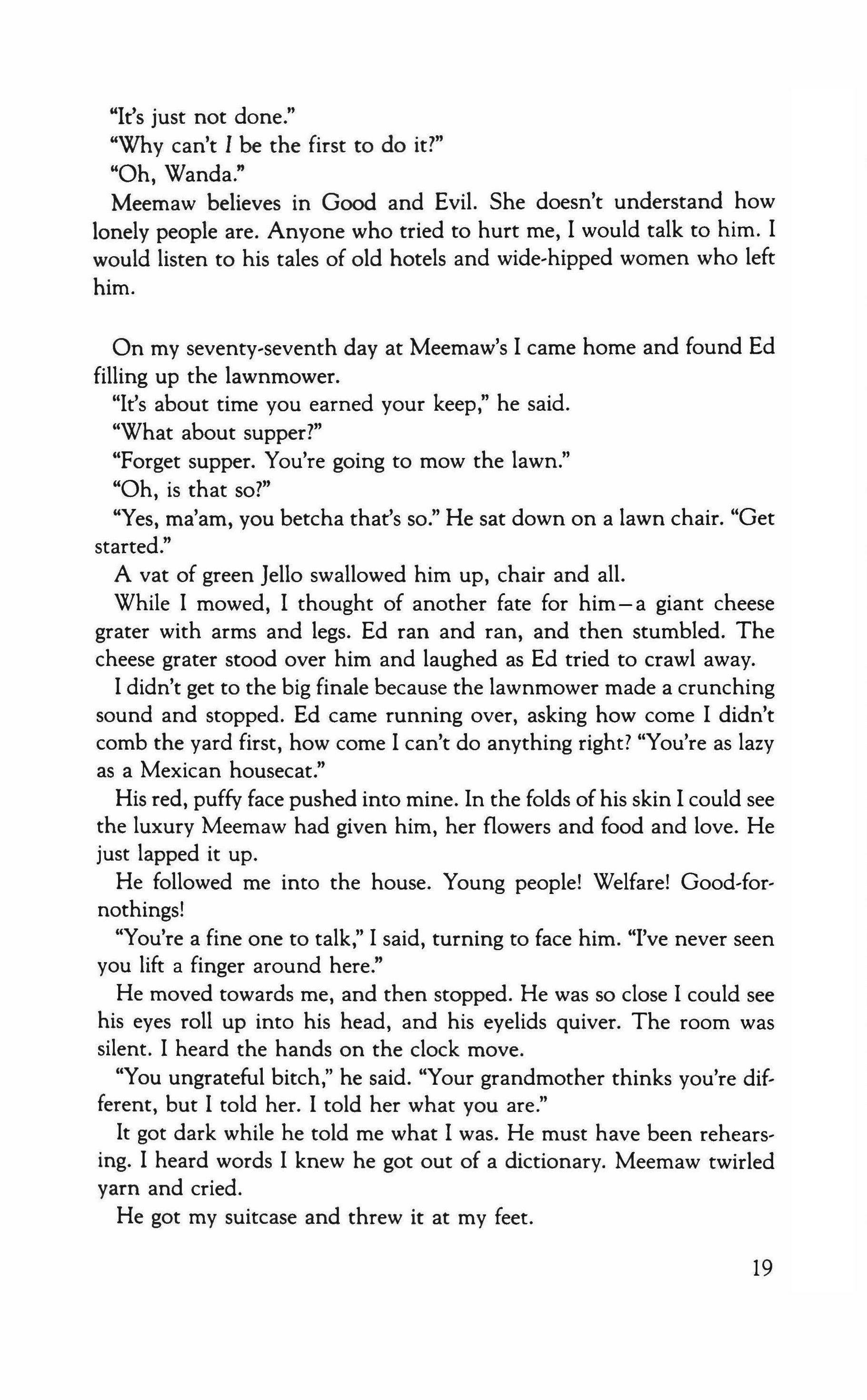
"It's just not done."
"Why can't I be the first to do it?"
"Oh, Wanda."
Meemaw believes in Good and Evil. She doesn't understand how lonely people are. Anyone who tried to hurt me, I would talk to him. I would listen to his tales of old hotels and wide-hipped women who left him.
On my seventy-seventh day at Meemaw's I came home and found Ed filling up the lawnmower.
"It's about time you earned your keep," he said.
"What about supper?"
"Forget supper. You're going to mow the lawn."
"Oh, is that so?"
"Yes, ma'am, you betcha that's so." He sat down on a lawn chair. "Get started."
A vat of green jello swallowed him up, chair and all.
While I mowed, I thought of another fate for him - a giant cheese grater with arms and legs. Ed ran and ran, and then stumbled. The cheese grater stood over him and laughed as Ed tried to crawl away.
I didn't get to the big finale because the lawnmower made a crunching sound and stopped. Ed came running over, asking how come I didn't comb the yard first, how come I can't do anything right? "You're as lazy as a Mexican housecat."
His red, puffy face pushed into mine. In the folds of his skin I could see the luxury Meemaw had given him, her flowers and food and love. He just lapped it up.
He followed me into the house. Young people! Welfare! Good-fornothings!
"You're a fine one to talk," I said, turning to face him. "I've never seen you lift a finger around here."
He moved towards me, and then stopped. He was so close I could see his eyes roll up into his head, and his eyelids quiver. The room was silent. I heard the hands on the clock move.
"You ungrateful bitch," he said. "Your grandmother thinks you're different, but I told her. I told her what you are."
It got dark while he told me what I was. He must have been rehearsing. I heard words I knew he got out of a dictionary. Meemaw twirled yarn and cried.
He got my suitcase and threw it at my feet.
19

"Get out. Now." He turned to Meemaw. "If she's here when I come back, I'll send for my things."
He slammed the door. His truck roared out, spitting gravel into the night.
"He's a child," Meemaw said. "A grown-up child, and I can't do any, thing about it." She held my face in her hands. "My little girl. My sweetie. What are we going to do?"
She put my head on her shoulder. We stood there, rocking. "I named my baby Fishbone," I said. "Did you know that?" She shushed me and patted my back.
He'd be eight months old now. In twenty years he'll come looking for me. We'll have iced tea and wonder how to act. I wanted you, I'll tell him, but I was young. I didn't know I was strong.
''There's a bus to Grand Saline in the morning," Meemaw said. "I'll call your mother."
We rode a taxi into town. Meemaw got me a room at the motel. She brushed my hair and put me in bed.
"You can go home now, Meemaw."
"Yes, I suppose I can."
She wouldn't leave until I pretended I was asleep. But I couldn't sleep at all. I found a Weekly World News under the bed. I read every story in it. Then the ads, about releasing the secret power within you and True Ranches for sale and the Laffs Ahoy Klown Kollege in Daytona Beach.
At five A.M. I went for a walk. The air was cool and clear as October. I breathed deep.
Waffle Emporium was open. Something about dawn at a coffee shop gets to me. Pink tabletops, and people too sleepy to talk. New things around the corner. Carlsbad Caverns. White Sands.
I thought about what I was going to do next. I had eight hundred dollars inside my shoes. I could go anywhere. San Francisco, to work at the Believe It or Not Museum. Or Miami - I could take care of dolphins. I thought about Indian reservations. Gas stations in the desert. Snake farms. The owner would be named Chuck, probably, or Buzz.
I walked to the bus station and read the destination board. I said each city twice, to see how it felt on my tongue.
20

1

2

3

4

5

6

7

8
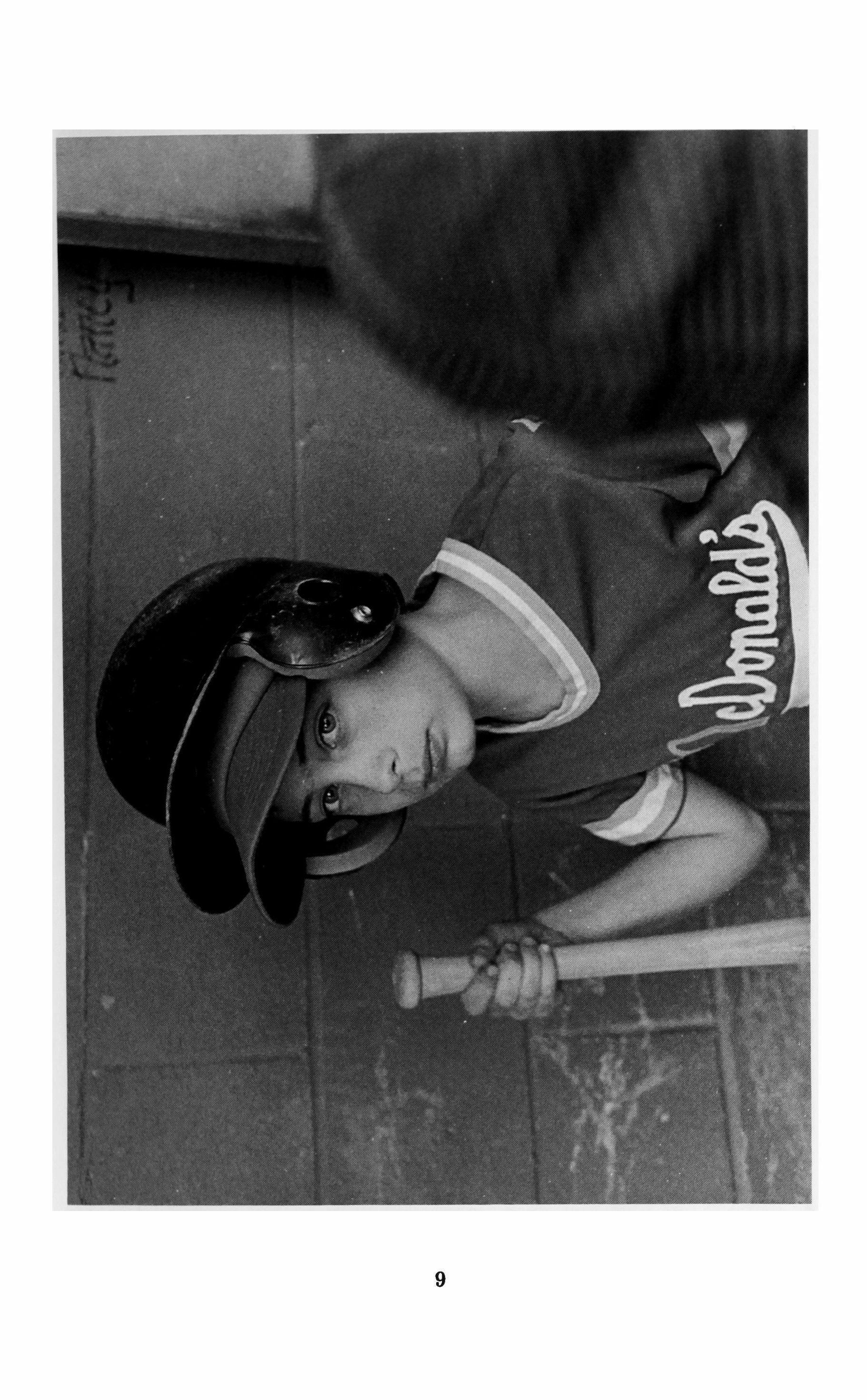
9
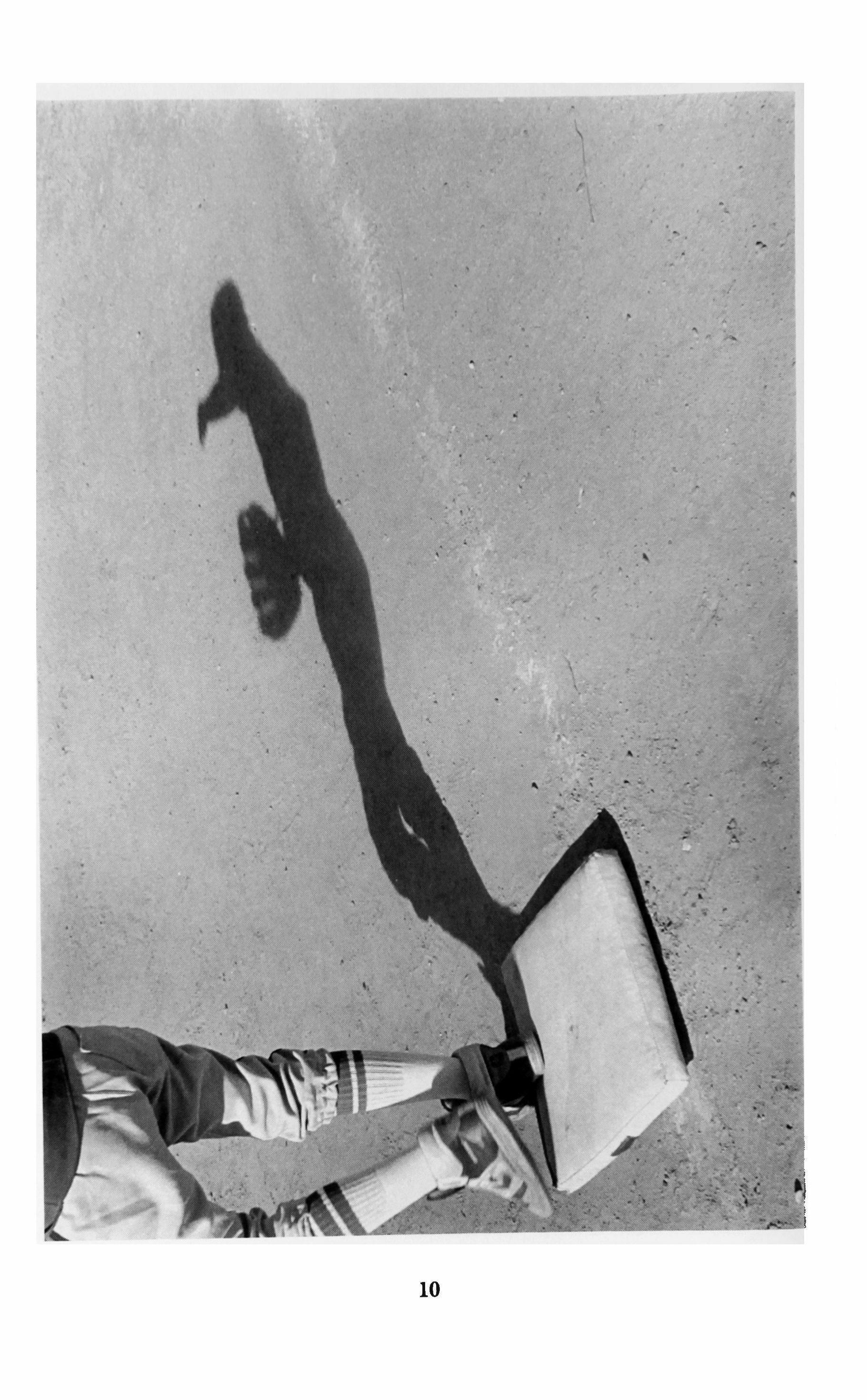
10

Captions
1. Les HaIles, Paris, 1985.
2. Paris, 1987.
3. Sandwich, Massachusetts, 1986.
4. Paris, 1986.
5. Boston, 1987.
6. Evanston, Illinois, 1988.
7. Chicago, 1988.
8. Chelsea, Massachusetts, 1987.
9. Medford, Massachusetts, 1986.
10. Malden, Massachusetts, 1986.
Cartography
Lynn Grossman
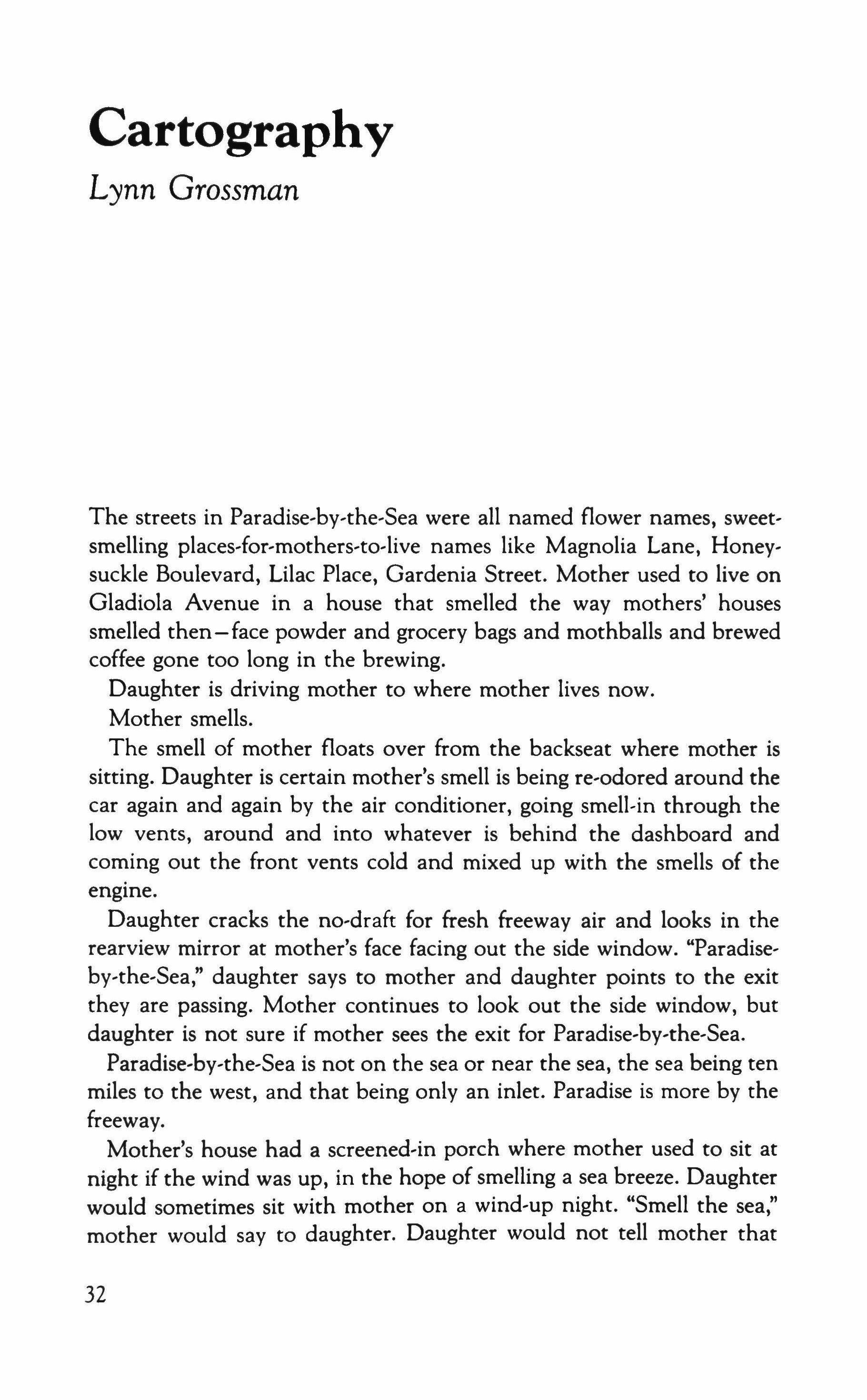
The streets in Paradise-by-the-Sea were all named flower names, sweet, smelling places-for-mothers-to-live names like Magnolia Lane, Honey, suckle Boulevard, Lilac Place, Gardenia Street. Mother used to live on Gladiola Avenue in a house that smelled the way mothers' houses smelled then - face powder and grocery bags and mothballs and brewed coffee gone too long in the brewing.
Daughter is driving mother to where mother lives now.
Mother smells.
The smell of mother floats over from the backseat where mother is sitting. Daughter is certain mother's smell is being re-odored around the car again and again by the air conditioner, going smell-in through the low vents, around and into whatever is behind the dashboard and coming out the front vents cold and mixed up with the smells of the engine.
Daughter cracks the no-draft for fresh freeway air and looks in the rearview mirror at mother's face facing out the side window. "Paradise, by-the-Sea," daughter says to mother and daughter points to the exit they are passing. Mother continues to look out the side window, but daughter is not sure if mother sees the exit for Paradise-by-the-Sea.
Paradise-by-the-Sea is not on the sea or near the sea, the sea being ten miles to the west, and that being only an inlet. Paradise is more by the freeway.
Mother's house had a screened,in porch where mother used to sit at night if the wind was up, in the hope of smelling a sea breeze. Daughter would sometimes sit with mother on a wind-up night. "Smell the sea," mother would say to daughter. Daughter would not tell mother that
32

what daughter smelled smelled to daughter like the rubbery smell of cars on a freeway going too fast.
When mother lived in Paradise-by-the-Sea, mother used to ride in the front seat. There was a time before that when mother used to be the driver.
Mother would drive daughter to the real sea past the inlet. Mother would pick up shells from the beach which mother said were dead but smelled the way they did to make you think something was still alive in them. Mother would hold the shells under the bubbling edge of the water and let the water go around and into the shells and when the shells were dripping with the wet sea, mother would hold the shells up to daughter's nose so that daughter would smell the sea smell.
Mother used to say a thing that is wet smells more of what it is than when it is dry.
At the real sea, mother smelled of sun and of seaweed and of coconut lotion she would drip on her body in white curlicues, and she would rub the lotion in and in until the white and the smell went into her body, and then mother would rub what was left on her hands of the coconut smell into daughter's back. Mother would put a sea-cracked rubber cap over her hair and go deep into the water to the place where mother told daughter the sea had no more smell, but tasted, instead.
Daughter thinks mother's smell today is a wet smell, not a dry smell. Daughter opens the front windows so that the air rushing into the car warm and oily and thick will be strong enough to carry the mother smell away with it.
Daughter off-ramps at the next exit, which is not the exit where mother lives now. Daughter opens all of the windows all the way down and she drives west to the real sea past the inlet.
In the rearview mirror, daughter can see mother's hair blowing away and off of mother's face, and daughter can see the shape of mother's skull beneath her face.
When daughter gets to the real sea, daughter drives the car off of the road and into the sand. Daughter smells the sea breeze coming into the car through all of the windows all at once, re-odoring around and around, bringing with it the smell of the sun and the smell of the seaweed and the rotten rowboat wooden smell of the almost wreck of a hull near where daughter has stopped in the sand.
Daughter gets out of the car and pulls the boat across the sand to the edge of the sea where the sand is not sandy, but dark and wet.
Daughter takes mother out ofthe car and helps mother onto the sand. Mother takes slow steps beside daughter, and the heels ofmother's shoes
33
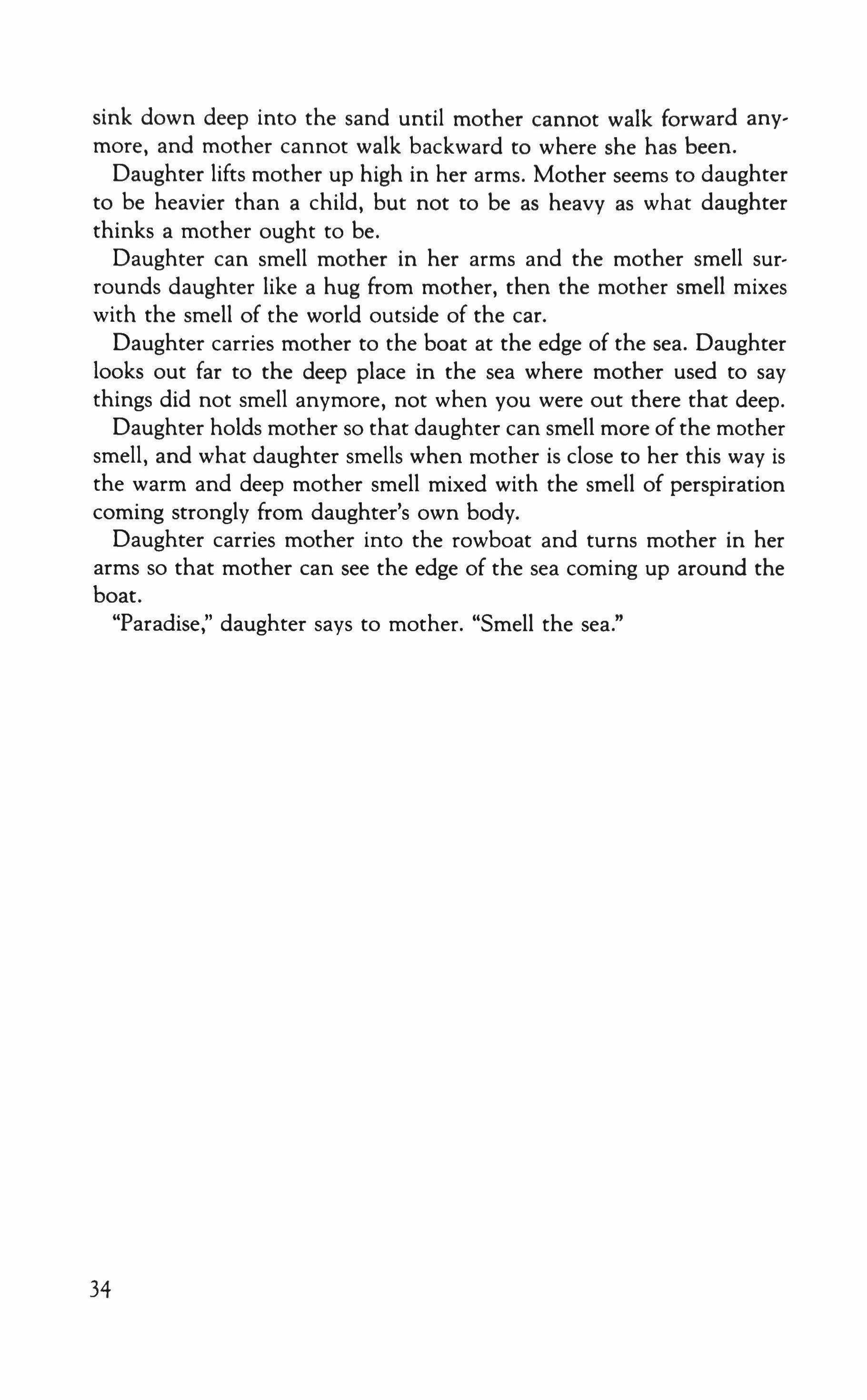
sink down deep into the sand until mother cannot walk forward anymore, and mother cannot walk backward to where she has been.
Daughter lifts mother up high in her arms. Mother seems to daughter to be heavier than a child, but not to be as heavy as what daughter thinks a mother ought to be.
Daughter can smell mother in her arms and the mother smell surrounds daughter like a hug from mother, then the mother smell mixes with the smell of the world outside of the car.
Daughter carries mother to the boat at the edge of the sea. Daughter looks out far to the deep place in the sea where mother used to say things did not smell anymore, not when you were out there that deep.
Daughter holds mother so that daughter can smell more of the mother smell, and what daughter smells when mother is close to her this way is the warm and deep mother smell mixed with the smell of perspiration coming strongly from daughter's own body.
Daughter carries mother into the rowboat and turns mother in her arms so that mother can see the edge of the sea coming up around the boat.
"Paradise," daughter says to mother. "Smell the sea."
34
From Treemont Stone
Angela Jackson
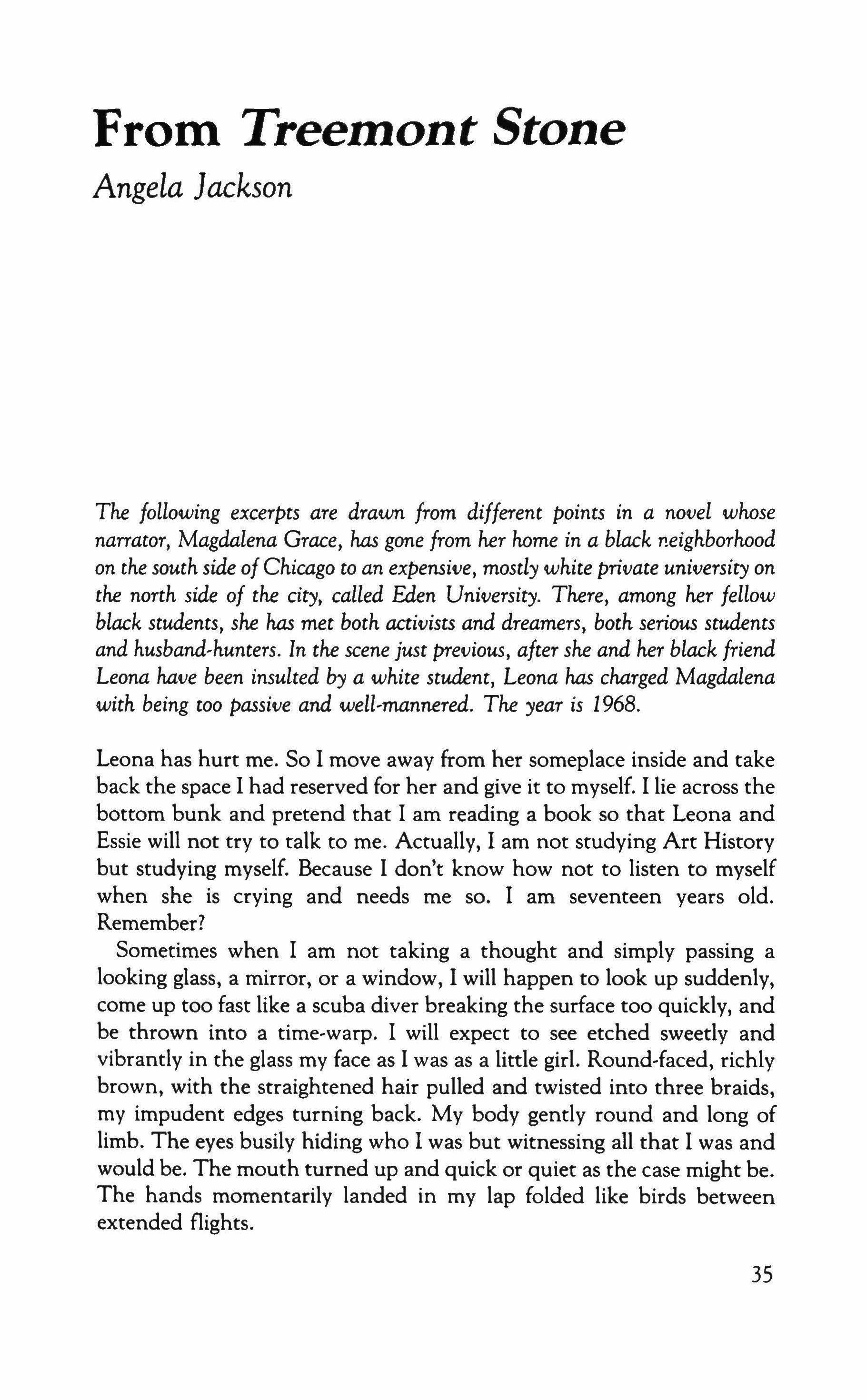
The following excerpts are drawn from different points in a novel whose narrator, Magdalena Grace, has gone from her home in a black neighborhood on the south side ofChicago to an expensive, mostly white private university on the north side of the city, called Eden University. There, among her fellow black students, she has met both activists and dreamers, both serious students and husband-hunters. In the scene just previous, after she and her black friend Leona have been insulted by a white student, Leona has charged Magdalena with being too passive and well-mannered. The year is 1968.
Leona has hurt me. So I move away from her someplace inside and take back the space I had reserved for her and give it to myself. I lie across the bottom bunk and pretend that I am reading a book so that Leona and Essie will not try to talk to me. Actually, I am not studying Art History but studying myself. Because I don't know how not to listen to myself when she is crying and needs me so. I am seventeen years old. Remember?
Sometimes when I am not taking a thought and simply passing a looking glass, a mirror, or a window, I will happen to look up suddenly, come up too fast like a scuba diver breaking the surface too quickly, and be thrown into a time-warp. I will expect to see etched sweetly and vibrantly in the glass my face as I was as a little girl. Round-faced, richly brown, with the straightened hair pulled and twisted into three braids, my impudent edges turning back. My body gently round and long of limb. The eyes busily hiding who I was but witnessing all that I was and would be. The mouth turned up and quick or quiet as the case might be. The hands momentarily landed in my lap folded like birds between extended flights.
35

Even today as an almost-woman 1 am surprised to find that 1 am not the little girl. Her presence is in me indelibly. Her voice talks in my head.
Cain't have no privacy. Tip in the bathroom wid my own bloody nose. Look in mirror at everything swellin. Lip fat. Nose big. Not wide like Mama say from diggin but big on top. Face hurt when 1 touch. I'm touchin anyway because this is my face hurt. 1 halfway cain't believe. So I'm comfortin myself, pattin myself off wid a cold towel. Water droppin over the bathroom floor. Here come Littleson wid his nosy self. Don't knock on the door just walk on in. 1 mighta been doin somethin important stead standin in the mirror. He come all up in my face. Lookin at me. Talkin bout:
"000 wwweeeee, who got you?"
My eyes be wet and 1 starta blinkin. He bringin the shame down front.
"None a yo business, monkevface,"
"Bet you didn't talk that bad to who ever beat yo head."
"I did too." 1 push him out the way between me and the sink. Wettin my towel again.
"Who you fight wid?"
"Ole bald-head Jean." I'm back in the mirror pattin my face. Littleson looking over my shoulder.
"Wha'chall fight for?"
"Stop breathin on my neck." 1 jerk myself so he move back. He move up again.
"Wha'chall fight about, Maggie?"
"She cheat."
"Everybody know that. What yall fight about today?"
"I told you she cheat." I'm tired a his nosy self. He know it. He just sit and look at me. Quiet. Then he say, "Who won?"
1 don't say nothin. Then he say again trying ta get in my business, "Who won, Maggie?"
"Didn't nobody win."
"0."
He watch me watch myself somemore and I'm watchin him out the corner a my eye.
"You wanna fix Jeannie so she don't mess wid you no more?"
1 don't say nothin.
"I said you wanta kick Jeannie's butt?"
1 fold my towel. And lay it on the radiator. I'm cool.
36

"I might be interested."
Then I say, "What I gotta do?"
And Littleson say, "It's my own scientific invention. Don't I win alIa my fights? Lemme teach you advanced technology."
I say, "How much this gonna cost me?"
"Maggie, you my sister. Besides you ruinin the family reputation on the block."
In the book they say when the man drown he go down three times. And his life keep passin before him every time. Same wid fights.
In the backyard me and Jeannie apart for the second time. She been whippin my tail. Eddie push us apart the first time. I say, "Uh uh. Now you goin git it lemme at her," I say to nobody, in the backa my heart wishin somebody would not let me at her. (Who like to hum anyway?)
Anyway that first time and we apart and the ground in my mouth and my hair cryin at the roots in the wind it been pulled so hard and me breathin the jerks in my body lookin at Jeannie and seein her like a twenty-leben times and fights and she half-kill me. And I never remember how the fights begin but know they happen all on top my head. The first time we come apart like a crazy machine comin apart for a second or so and I just look at her and don't know her except as a piece a memachine. And then we come up on each other again botha my arms swingin everyway through the air and Jeannie and her claws tearin every any place she want and her bite and pull and stuffbein hot stingy marks on me. We apart the second time. Is where we at and I'm shakin my eyes clear in my head clearin my lesson rememberin my science gonna whip some advanced technology on this heifer. And I think I got Littleson's voice in my ear sayin O.K. Maggie this called the power punch, O.K. Maggie make a fist make a good tight fist Maggie loose yo body O.K. Maggie think all yo strength in yo super hand swing Maggie swing Maggie go girl swing oooweee Maggie. And Jeannie lookin at me funny then her stomach goin soft around my fist and she double over screamin and I step back lookin at what I done don't believe and Jeannie rise up with double hate and slobbin a little at the mouth her eyes dark and watery like never cause I never hurt her before and Jeannie rise and kickin me and scratchin and spittin and cussin and everything and I don't believe it that this is worse than the first comin apart. And the ground in the mouth and spinnin seesaw in my eye and Littleson standin by the jumpin tree for real and all I can hear him say is, "Awh, Maggie, goddog." While he and Eddie pull us apart.
37
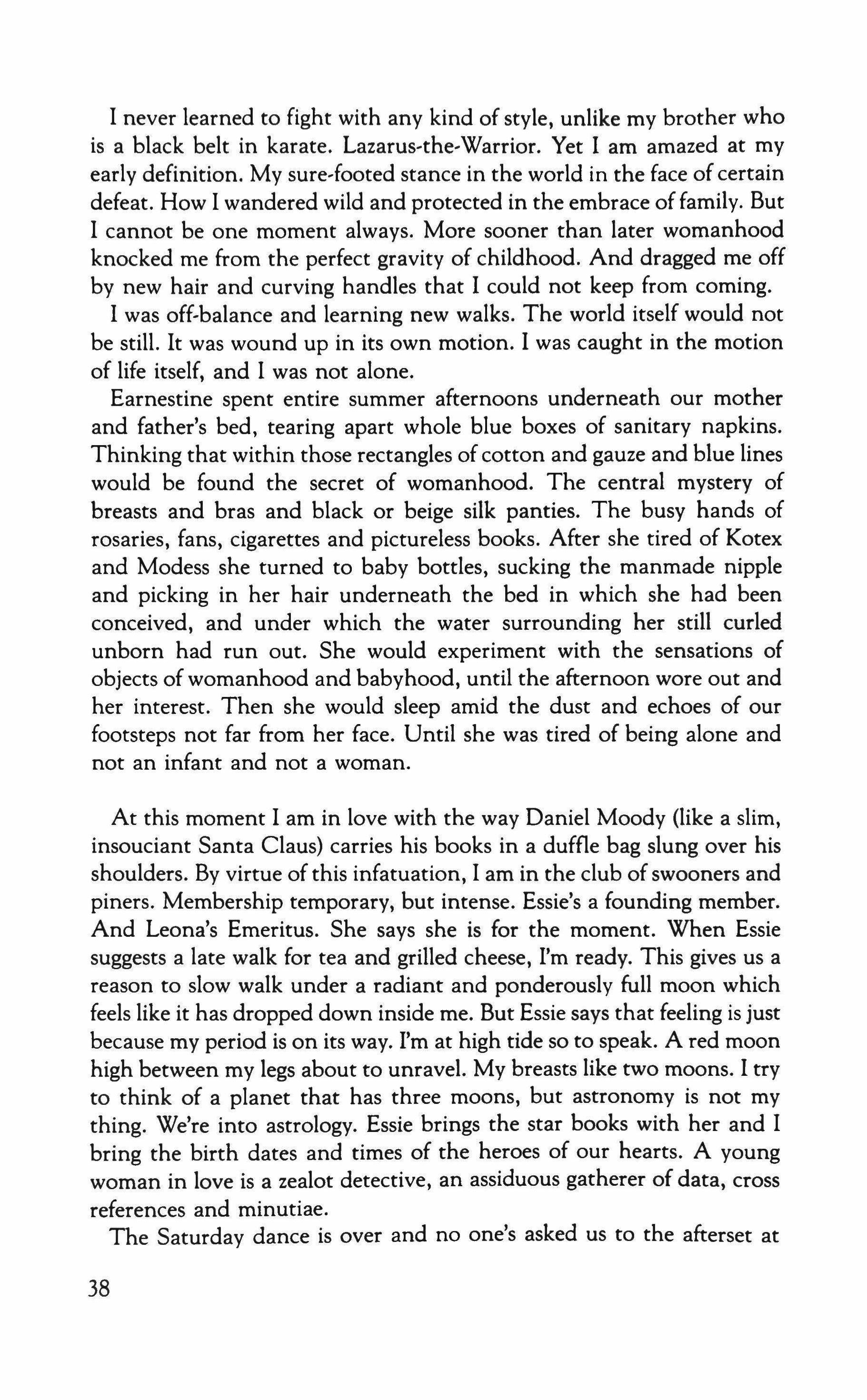
I never learned to fight with any kind of style, unlike my brother who is a black belt in karate. Lazarus-the-Warrior. Yet I am amazed at my early definition. My sure-footed stance in the world in the face of certain defeat. How I wandered wild and protected in the embrace of family. But I cannot be one moment always. More sooner than later womanhood knocked me from the perfect gravity of childhood. And dragged me off by new hair and curving handles that I could not keep from coming. I was off-balance and learning new walks. The world itself would not be still. It was wound up in its own motion. I was caught in the motion of life itself, and I was not alone.
Earnestine spent entire summer afternoons underneath our mother and father's bed, tearing apart whole blue boxes of sanitary napkins. Thinking that within those rectangles of cotton and gauze and blue lines would be found the secret of womanhood. The central mystery of breasts and bras and black or beige silk panties. The busy hands of rosaries, fans, cigarettes and pictureless books. After she tired of Kotex and Modess she turned to baby bottles, sucking the manmade nipple and picking in her hair underneath the bed in which she had been conceived, and under which the water surrounding her still curled unborn had run out. She would experiment with the sensations of objects of womanhood and babyhood, until the afternoon wore out and her interest. Then she would sleep amid the dust and echoes of our footsteps not far from her face. Until she was tired of being alone and not an infant and not a woman.
At this moment I am in love with the way Daniel Moody (like a slim, insouciant Santa Claus) carries his books in a duffle bag slung over his shoulders. By virtue of this infatuation, I am in the club of swooners and piners. Membership temporary, but intense. Essie's a founding member. And Leona's Emeritus. She says she is for the moment. When Essie suggests a late walk for tea and grilled cheese, I'm ready. This gives us a reason to slow walk under a radiant and ponderously full moon which feels like it has dropped down inside me. But Essie says that feeling is just because my period is on its way. I'm at high tide so to speak. A red moon high between my legs about to unravel. My breasts like two moons. I try to think of a planet that has three moons, but astronomy is not my thing. We're into astrology. Essie brings the star books with her and I bring the birth dates and times of the heroes of our hearts. A young woman in love is a zealot detective, an assiduous gatherer of data, cross references and minutiae.
The Saturday dance is over and no one's asked us to the afterset at
38

Blood Island. It's a secret rendezvous closed to singles, open mainly to the royal couples, cuddling consorts and the like. Leona has gone with Steve, because she loves to dance with him. Dancing is what they do. Slow Drag, Walk, Hesitation, Bop, Watusi, Funky Broadway, Jerk and African Twist. They do them all as if they were twins with complementary moves and style. William and Rhonda and the other couples do other things in corners, on the couches, in the closets of hot Blood Island. We, Essie and I, imagine what they do. We don't really know. Later Leona will tell us enough of what William and Rhonda did to send Essie to bed sick and insomniatic.
I feel unearthly and untimely-as if I'm looking back on myself-as we walk the downtown streets ofEden on our way to the quiet greasy spoon where we can spread our American Astrology, Horoscope, and Heaven Knows, and papers over the table, while we nibble grilled-cheese sandwiches and share a large order of salty, greasy fries, sip cherry-flavored Coca-Cola and chart the courses of true love through the heavens. Essie has plaited her hair and tied it with a scarf, so she looks tinier, more vulnerable, than usual. She carries no terrible thundercloud of hair to protect us from the night-terrors that scurry and scramble past midnight, lunatic and howling like frat boys who've drunk too much beer.
Stores hawking records, books, jeans and other fashions, ice cream, drugs and notions and fast snacks, line the neat streets which seem less narrow under the moonlight. As if night gives life here width and breadth. All other eateries, pizzerias and hamburger joints, are crowded or closed except the one we're heading for. Few people are about. And the world howls with such loneliness I feel heroic walking beside Essie. Together, but somehow separate, as we go.
Everything is spooky; pale mannequins in store windows lunge toward us like they want to tell us something heavy, or do us in. Shadows lead us. Yet Essie says tonight is a time for lovers; and why can't William be hers and here with her now? They are meant for each other. She's checked the stars. Too bad she can't do the higher math of it, I tell her, with all the exact degrees and minutes. Maybe then she could plot the inevitable time of their eternal and everlasting union.
Her eyes blur with the faith like some ancient mystic. She talks about the love match unceasingly like somebody hypnotized her and said the chief topic of her life should be William Satterfield. The acuity of her feeling infects me too and I try to stay with her by rhapsodizing about Daniel Moody who totes his duffle bag in such a romantic way. But my evidence is insufficient beside the masses of information Essie has accumulated over weeks. Hers is the love of a lifetime. She and William have
39

actual conversations. He caressed her as they sat on the manmade bluff that juts over the lake. Stroked her back and fit her petite breast into the palm of his hand, his tongue wiggled in her ear, sliding deep in her mouth over her tongue, but he's never done it to her. That would be too dirty. To sleep with both Essie and Rhonda. I guess.
Our game is guessing the identity of Fred (who we've never seen) of Fred's all-night restaurant. Fred Flintstone. Fred Mertz, Freddie the Freeloader. We reel off a list of every round-faced, jovial whiteman named Fred we ever knew from TV. Essie says Fred Weinberg and I never heard of him. He's the man who owns the building her mother cleans, she tells me.
Fredonia Witherspoon is the glamorous one of a crew of Black and Polish women who work the same hours as roaches. Sunset until clean, Fredonia scrubs like a queen, her iridescent red wig glowing in the vacated offices under the flourescent lights. "My mama working nights now," Essie ends.
"My mama do days," I say like we've never talked about any of this before. I launch into the tale of my stolen hair dryer Mama bought with her day-work money a day before I came to Eden. We go over again who might have stolen my hair dryer bought with my mama's red hands. Essie thinks it was the maid who got fired who stole it out of my closet. I thinks it was Truda or Oakland who did it for kicks, because in the early days I was quiet and was tight only with Leona and Essie. They called me ''boojie.'' Me. Because I wore tiny pearl earrings and was always polite enough to say "please," "thank you," "excuse me." And I wasn't free enough to say "shit," "bitch," "motherfucker," "bastard" and "niggah," which I can almost, if I ever open my mouth to do so, reel off rather deliciously by now. But it always happens. Whenever Essie, Leona and I talk about the work of our mothers, I think of the stolen hair dryer and I want to hunt down the person who stole it and with it my mother's sweat. I hope it is a white girl who's stolen from me, but that's unlikely. Someone would have seen her. A white girl going in three black girls' room. Even a friendly white girl.
As usual, Fred is nowhere for our eyes and I am more certain than ever that he doesn't exist outside the booths, the sizzling grill and the little square tables with the formica tops. He's only a figment of the sleepy waitress's imagination. She looks up at us grouchily as if she'd rather not. Only her paycheck is real. If we disappeared back into the dark she'd happily keep leaning on the counter dreaming of new shoes, compassionate kisses, shiny golden hair where the brunette roots don't
40
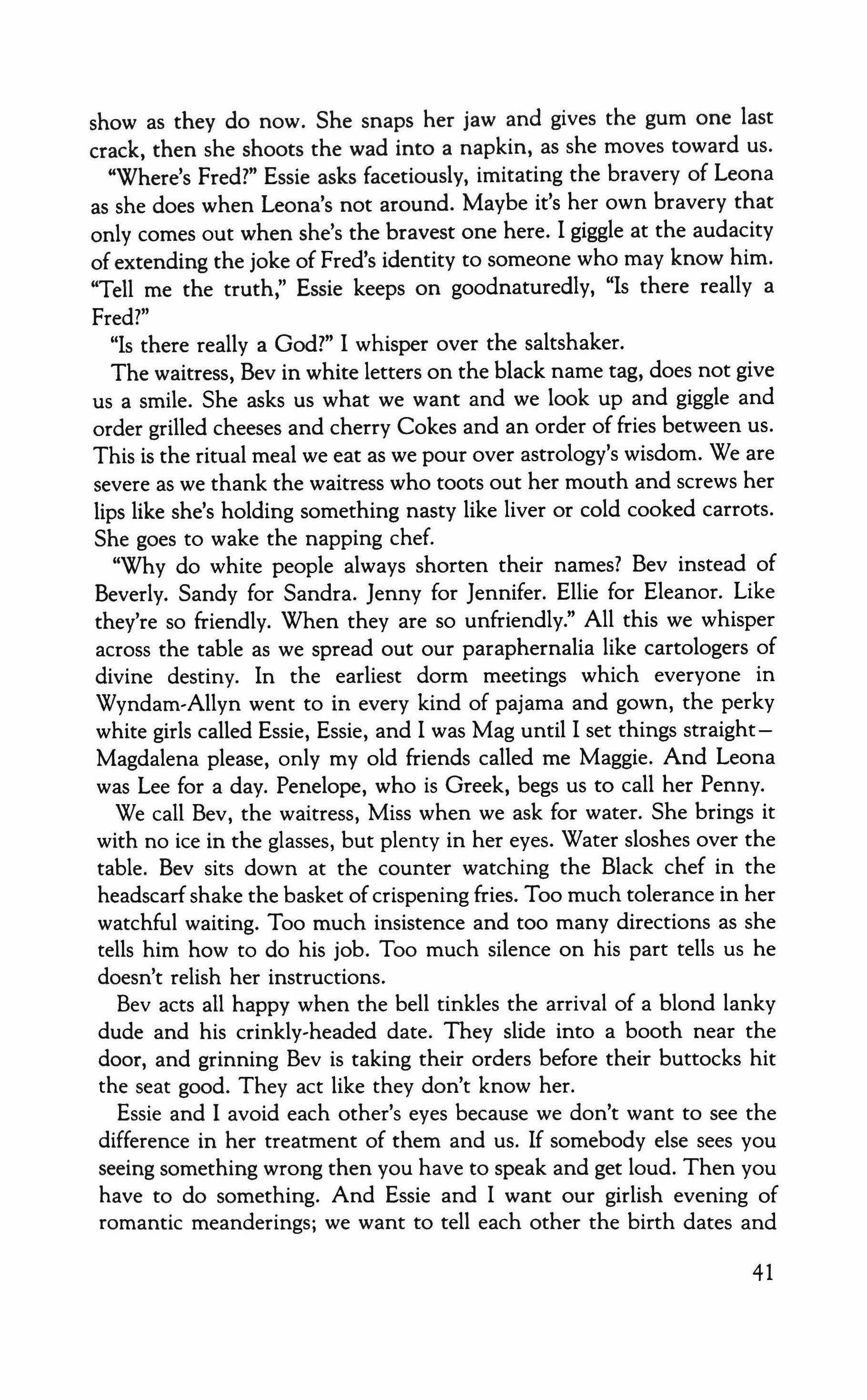
show as they do now. She snaps her jaw and gives the gum one last crack, then she shoots the wad into a napkin, as she moves toward us.
"Where's Fred?" Essie asks facetiously, imitating the bravery of Leona as she does when Leona's not around. Maybe it's her own bravery that only comes out when she's the bravest one here. I giggle at the audacity of extending the joke of Fred's identity to someone who may know him. "Tell me the truth," Essie keeps on goodnaturedly, "Is there really a Fred?"
"Is there really a God?" I whisper over the saltshaker.
The waitress, Bev in white letters on the black name tag, does not give us a smile. She asks us what we want and we look up and giggle and order grilled cheeses and cherry Cokes and an order of fries between us. This is the ritual meal we eat as we pour over astrology's wisdom. We are severe as we thank the waitress who toots out her mouth and screws her lips like she's holding something nasty like liver or cold cooked carrots. She goes to wake the napping chef.
"Why do white people always shorten their names? Bev instead of Beverly. Sandy for Sandra. Jenny for Jennifer. Ellie for Eleanor. Like they're so friendly. When they are so unfriendly." All this we whisper across the table as we spread out our paraphernalia like cartologers of divine destiny. In the earliest dorm meetings which everyone in Wyndam-Allyn went to in every kind of pajama and gown, the perky white girls called Essie, Essie, and I was Mag until I set things straightMagdalena please, only myoid friends called me Maggie. And Leona was Lee for a day. Penelope, who is Greek, begs us to call her Penny.
We call Bev, the waitress, Miss when we ask for water. She brings it with no ice in the glasses, but plenty in her eyes. Water sloshes over the table. Bev sits down at the counter watching the Black chef in the headscarf shake the basket ofcrispening fries. Too much tolerance in her watchful waiting. Too much insistence and too many directions as she tells him how to do his job. Too much silence on his part tells us he doesn't relish her instructions.
Bev acts all happy when the bell tinkles the arrival of a blond lanky dude and his crinkly-headed date. They slide into a booth near the door, and grinning Bev is taking their orders before their buttocks hit the seat good. They act like they don't know her.
Essie and I avoid each other's eyes because we don't want to see the difference in her treatment of them and us. If somebody else sees you seeing something wrong then you have to speak and get loud. Then you have to do something. And Essie and I want our girlish evening of romantic meanderings; we want to tell each other the birth dates and
41

times and places of the men we love. So we do that. Instead of breaking Bev the witch-waitress's face.
Essie opens the book and begins to read about William born on the cusp between two signs. I draw the symbols for the placements of his signs. If our breath is high in our throats, it is the excitement of love and not the tension of ignoring being ignored.
The waitress saunters to the phone in the corner. She hangs onto the receiver, leans against the wall as weariness watching herself, and listens. After a while she slams the receiver down. Essie and I look at each other to make sure we've both witnessed this business in the corner. We pretend to peruse our astrology charts spread out like ancient sea charts that end in cliffs into the abyss.
Bev, the waitress, picks up the phone again; money makes a lot of noise when the machine swallows it. Bev swallows, drums her long fingernails on the phone, then yells into the mouthpiece.
"Oh, you think you're so goddam smart. You're a stinking son of a bitch, Freddie."
There is a Fred and Bev is on his case. And Bev is about to cry. Essie and I giggle and whisper.
Bev lowers her volume, but we can hear anyway because intensity carries and we listen attentively to it. "Don't screw me like this, Freddie. I told you two weeks ago I need the time off. You may not have to go to your sister's wedding, Freddie, but my family is a family. I'm a bridesmaid."
Bev has won our sympathy now. She's got to dye her dress shoes a funny shade and look happy while her sister gets married and she works at a diner in the middle of the night. She looks like the type I've heard Penelope talk about "Always a bridesmaid, never a bride." I'd never heard that saying before Penelope said it. It's something no one ever said at the Grace house on Arbor. Maybe I didn't hear. It sounds sad, "never a bride." Bev acts like she would cry if she weren't at work. She hangs up the phone again. She flips her eyelash and passes over her wet nose with her index finger.
"I hope she washes her hands before she touches somebody's food," Essie says.
She doesn't. Bev's back at the counter. She pushes the bread down more firmly atop the reuben sandwich and carries it to a truckdriverlooking man across the room.
"Now you know that's nasty. Rubbing snot on that man's sandwich."
42

Essie pushes her plate away and sips the Coke to wash away the nasty taste of unsanitary thoughts.
"Fred better give her some time off before the health department close this place down," I say, just so Essie will choke on her Coke. She chokes. And coughs it all over the table.
Bev looks at our mess out the corner of her eye and I know being Black doesn't pay when a poor white girl's in pain. In a hassle with her boss. Bev walks over to us with a rag in her hand and an ugly look on her face like a squirrel in a trap.
The door opens and I hear it out the corner of my mind but none of us looks that way while Bev slams ketchup and plates around the table knocking our star books on the floor.
"Excuse me," I say as a reprimand.
Bev grunts like she's accepting an apology and is still mad about it.
"She's not the one apologizing," Essie says. "Miss, you messin with our property."
Bev says, "So sorry, big spenders." Then she walks away talking about how she hates to wait on us people because we don't tip from shit.
"I'm going to tip her upside the head," Essie promises and glares so hard at the woman's back I'm nervous she is going to jump on the woman's back and ride her like an addiction. Essie is usually less violent than this. All her injuries internal that she spends her time on; white, people's belligerence goes right past her usually. She lets the racism slide. Not like some of us who ready to jump to anybody white's chest when we having a bad day and somebody white cross that fine line. Somebody like Trixia would kick a white girl's behind on gpo
Trixia says, "Hey, now" from a table behind us. And Essie and I turn to salute them, her and three other sisters. It is they who've just arrived, whose entry we hadn't taken time to note. We don't try to mix company. They can tell I guess that we're in a slow mood, and they are still busy and boisterous from the afterset they went to and we didn't. We pick up pieces of their talk about how the afterset wasn't all that much fun. Couples cuddled up and boredom.
By the time Bev who is busier now makes to move to Trixia's table, Trixia is long past ready to eat. Everybody's starving.
Bev says, "Are you ready to order?"
They had a name for girls like me. They called us smart girls. They had other names for girls who went to all-girl Catholic high schools, who walked on the cutting edge of nuns' habits. They called us whores, nymphomaniacs and lesbians. They called us stuck-up. Sometimes they
43
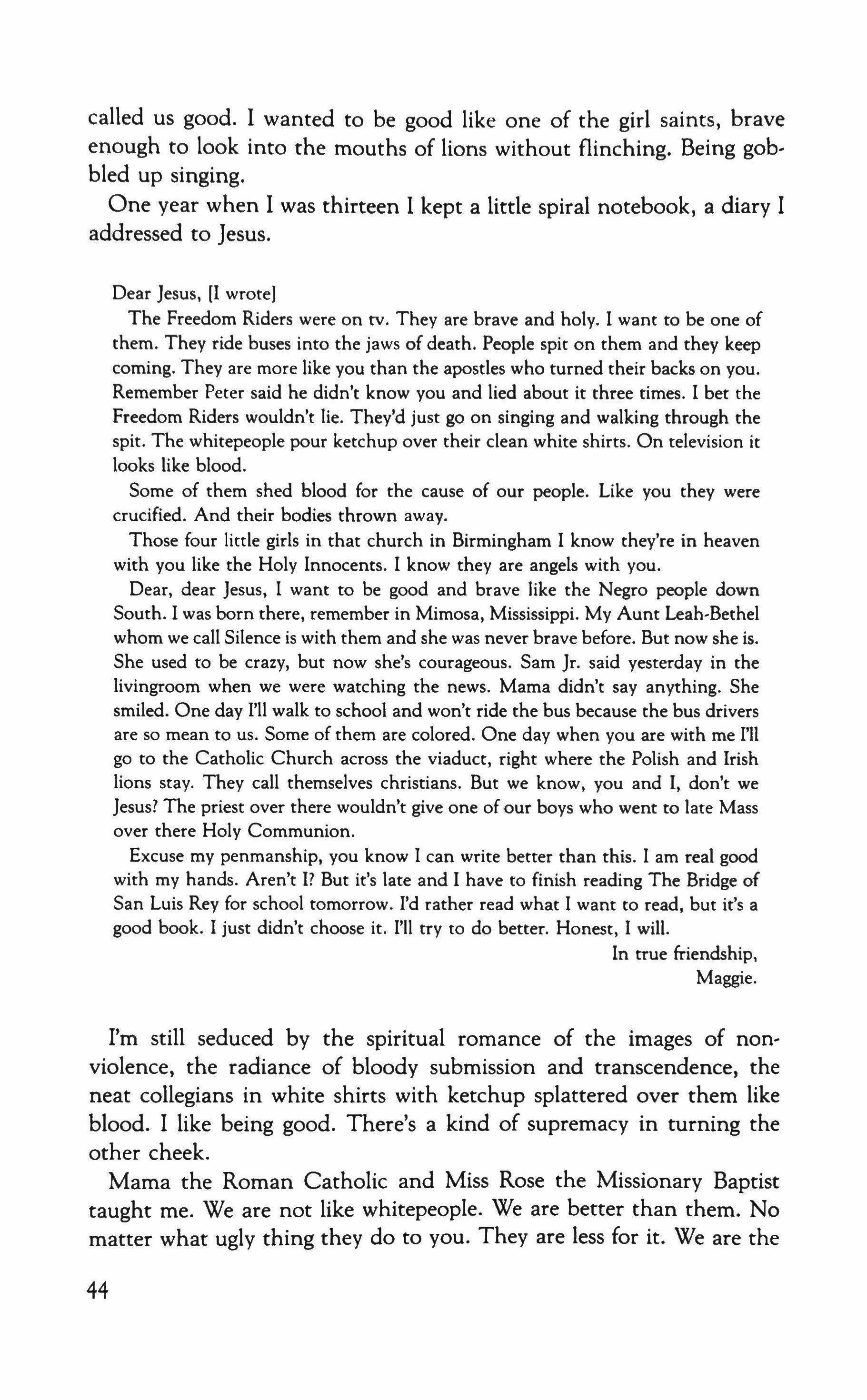
called us good. I wanted to be good like one of the girl saints, brave enough to look into the mouths of lions without flinching. Being gobbled up singing.
One year when I was thirteen I kept a little spiral notebook, a diary I addressed to Jesus.
Dear Jesus, [I wrote)
The Freedom Riders were on tv. They are brave and holy. I want to be one of them. They ride buses into the jaws of death. People spit on them and they keep coming. They are more like you than the apostles who turned their backs on you. Remember Peter said he didn't know you and lied about it three times. I bet the Freedom Riders wouldn't lie. They'd just go on singing and walking through the spit. The whitepeople pour ketchup over their clean white shirts. On television it looks like blood.
Some of them shed blood for the cause of our people. Like you they were crucified. And their bodies thrown away.
Those four little girls in that church in Birmingham I know they're in heaven with you like the Holy Innocents. I know they are angels with you.
Dear, dear Jesus, I want to be good and brave like the Negro people down South. I was born there, remember in Mimosa, Mississippi. My Aunt Leah-Bethel whom we call Silence is with them and she was never brave before. But now she is. She used to be crazy, but now she's courageous. Sam Jr. said yesterday in the livingroom when we were watching the news. Mama didn't say anything. She smiled. One day I'll walk to school and won't ride the bus because the bus drivers are so mean to us. Some of them are colored. One day when you are with me I1l go to the Catholic Church across the viaduct, right where the Polish and Irish lions stay. They call themselves christians. But we know, you and I, don't we Jesus? The priest over there wouldn't give one of our boys who went to late Mass over there Holy Communion.
Excuse my penmanship, you know I can write better than this. I am real good with my hands. Aren't I? But it's late and I have to finish reading The Bridge of San Luis Rey for school tomorrow. I'd rather read what I want to read, but it's a good book. I just didn't choose it. I'll try to do better. Honest, I will.
In true friendship, Maggie.
I'm still seduced by the spiritual romance of the images of nonviolence, the radiance of bloody submission and transcendence, the neat collegians in white shirts with ketchup splattered over them like blood. I like being good. There's a kind of supremacy in turning the other cheek.
Mama the Roman Catholic and Miss Rose the Missionary Baptist taught me. We are not like whitepeople. We are better than them. No matter what ugly thing they do to you. They are less for it. We are the
44
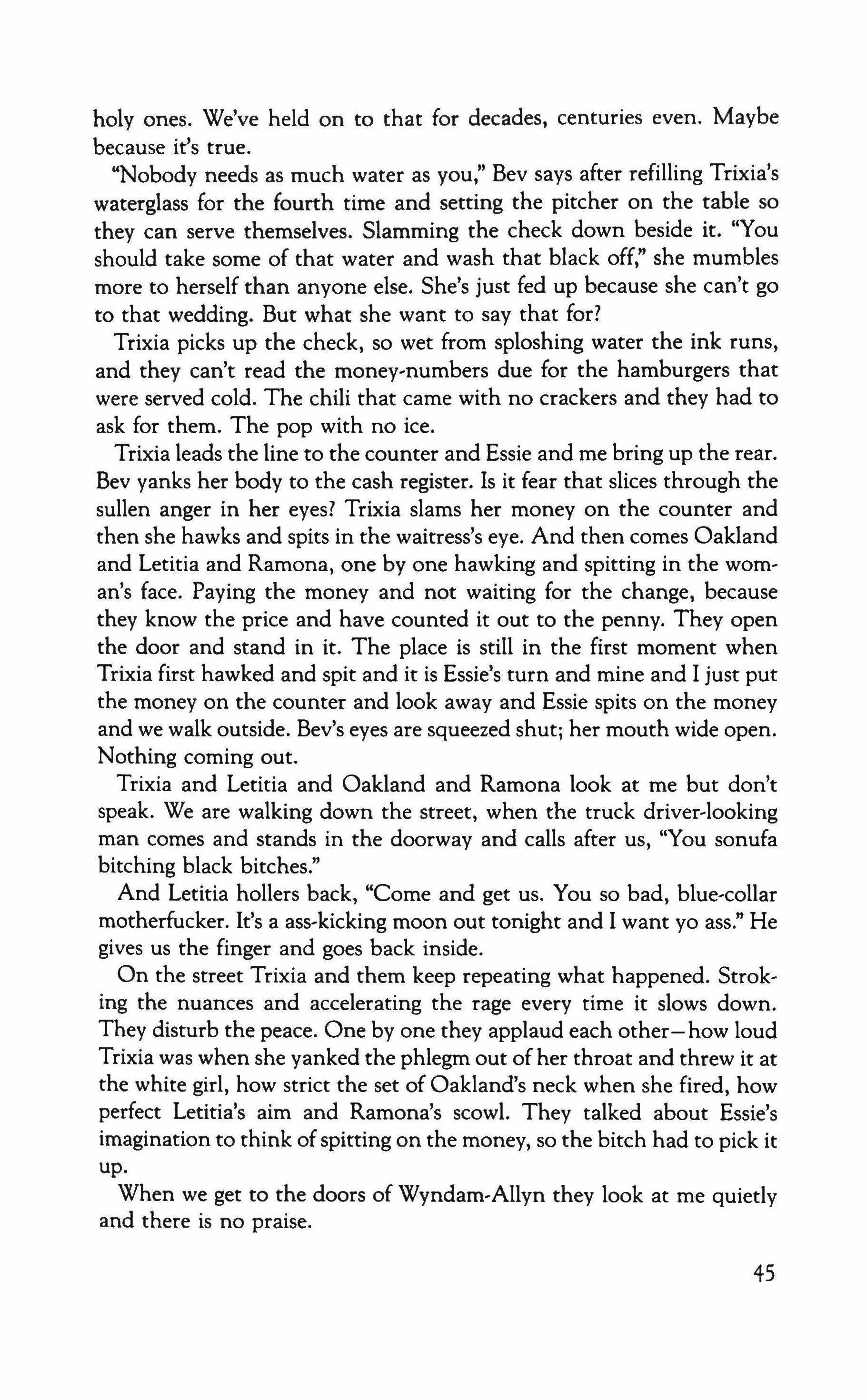
holy ones. We've held on to that for decades, centuries even. Maybe because it's true.
''Nobody needs as much water as you," Bev says after refilling Trixia's waterglass for the fourth time and setting the pitcher on the table so they can serve themselves. Slamming the check down beside it. "You should take some of that water and wash that black off," she mumbles more to herself than anyone else. She's just fed up because she can't go to that wedding. But what she want to say that for?
Trixia picks up the check, so wet from sploshing water the ink runs, and they can't read the money-numbers due for the hamburgers that were served cold. The chili that came with no crackers and they had to ask for them. The pop with no ice.
Trixia leads the line to the counter and Essie and me bring up the rear. Bev yanks her body to the cash register. Is it fear that slices through the sullen anger in her eyes? Trixia slams her money on the counter and then she hawks and spits in the waitress's eye. And then comes Oakland and Letitia and Ramona, one by one hawking and spitting in the worn, an's face. Paying the money and not waiting for the change, because they know the price and have counted it out to the penny. They open the door and stand in it. The place is still in the first moment when Trixia first hawked and spit and it is Essie's turn and mine and I just put the money on the counter and look away and Essie spits on the money and we walk outside. Bev's eyes are squeezed shut; her mouth wide open. Nothing coming out.
Trixia and Letitia and Oakland and Ramona look at me but don't speak. We are walking down the street, when the truck driver-looking man comes and stands in the doorway and calls after us, "You sonufa bitching black bitches."
And Letitia hollers back, "Come and get us. You so bad, blue-collar motherfucker. It's a ass-kicking moon out tonight and I want yo ass." He gives us the finger and goes back inside.
On the street Trixia and them keep repeating what happened. Stroking the nuances and accelerating the rage every time it slows down. They disturb the peace. One by one they applaud each other-how loud Trixia was when she yanked the phlegm out of her throat and threw it at the white girl, how strict the set of Oakland's neck when she fired, how perfect Letitia's aim and Ramona's scowl. They talked about Essie's imagination to think ofspitting on the money, so the bitch had to pick it up.
When we get to the doors of Wyndam,Allyn they look at me quietly and there is no praise.
45
We come to Letitia's room first on the corridor and she opens the door for all to fall in for a victory celebration, a recounting of the battle for the rest of the sisters.
"Come on in, Essie," Trixia says without looking at me who is next to Essie now, on my way back to the room. Essie looks at me sheepishly and follows them in.
"Tell Leona to come on down, Maggie," Oakland says with a casual fling of her scarf onto the bed.
The hall is quiet except for the noise escaping from Letitia's room. Everything is empty. And I am hollow inside except for the sloshing of like a gallon of water in my stomach and chest and I wish, I wish that I could spit.

Essie Witherspoon was a shy and fragile girl when I first met her. We had grown up in neighborhoods not far from each other. We knew the same bakeries by their smells that rode through our streets on the wings of the Hawk, the one movie house on the boulevard where Sunday shows were $.25 and the projectionist ran ads for the latest Brigitte Bardot movie during the kiddie shows, the same laundromats, grocery stores, churches, rib joints and taverns. The same vacant lots. We came upon the centralizing church steeple from different sides, distances and angels.
Essie knew Jeannie, my childhood friend who had one child at fifteen and another at seventeen. When Essie and I found each other it was as if we had found a new corner of home.
Essie is a tiny-boned girl with the biggest Afro I have ever seen. It stands richly around her head like the cap of a tropical tree. Each night she braids it from the center of her head and sends the twisted plaits down around her face like tamed snakes caught in a dance to a charmer's flute. But Essie is the charmed one. The one who is enchanted.
Essie was watching William and William was watching her while he danced with Rhonda. Rhonda was watching Essie too. She printed her body on William's and held him. Her breasts stabbing him in the ribs. Abruptly, Essie moved to another angle of the room and got too close to the four-foot-high speakers, so that the noise was making her nearly insensible. She watched the two of them, but she didn't see. She only saw herself, miserable and rejected, an ache inside her female organs, a deep sorrow. And she saw at that moment in which William slow-
* * *
46

dragged Rhonda across the floor, the turning points of her life. The points so sharp they pinned Essie in them forever.
"Honey, I like ta died!" Essie was saying into the phone to NeeNee, her best and only friend, when Fredonia's lick unpropped her hand from her imaginary hip and uncrossed her little legs.
"That's for actin grown," Fredonia said. "You ain't no woman." Fredonia scalded herself out of Essie with her eyes; she scolded her own cameo set in the girl's face. Then Fredonia turned back to her steaming stove, top works and to her company. Blinking her Liz Tavlor-as-Cleopatra mascara-ed eyes (a thick, wide black band that outlined the eyes and wound around the side of the head) and sighing, ruffling the coppery waves atop her head with her free and still-stinging hand, she made motions in a pot of chili beans, more concerned with conversation and company than food or child.
Essie's eyes were burning and she rolled them at Fredonia's spine and rounded rump. Fredonia was mouthing some delightful outrage.
"So I told that BLACK nigger, I told him, honey, I am not a player, I do not play."
"That's right, girl," her company said.
"I'm a woman."
"That's right."
"I'm a woman," hand on hip, face thrust forward, slanted eyes wide for emphasis.
You a woman. Ya gotta tell these niggers. That's right." Lorraine sipped Schlitz at the kitchen table.
Fredonia banged the stove with her soup spoon. A flurry of flecks of hot pot liquor popped onto her arm. She cursed, and reached for her towel, which she kept in a corner like a prizefighter. She caught Essie's eyes on her.
"Don't you look at me that way."
"What way?"
"The way you lookin at me now."
"I ain't even lookin at you."
"Don't cut your eyes at me, you little whore."
"Fredonia!" Lorraine incredulous. "Cool down, girl. Don't call the child no whore. Next thing you know she'll be in the bushes."
"She probably already been there
"You was From under Essie's breath.
"I was what? Little bitch. I shoulda left yo skinny ass with yo grandmama."
47
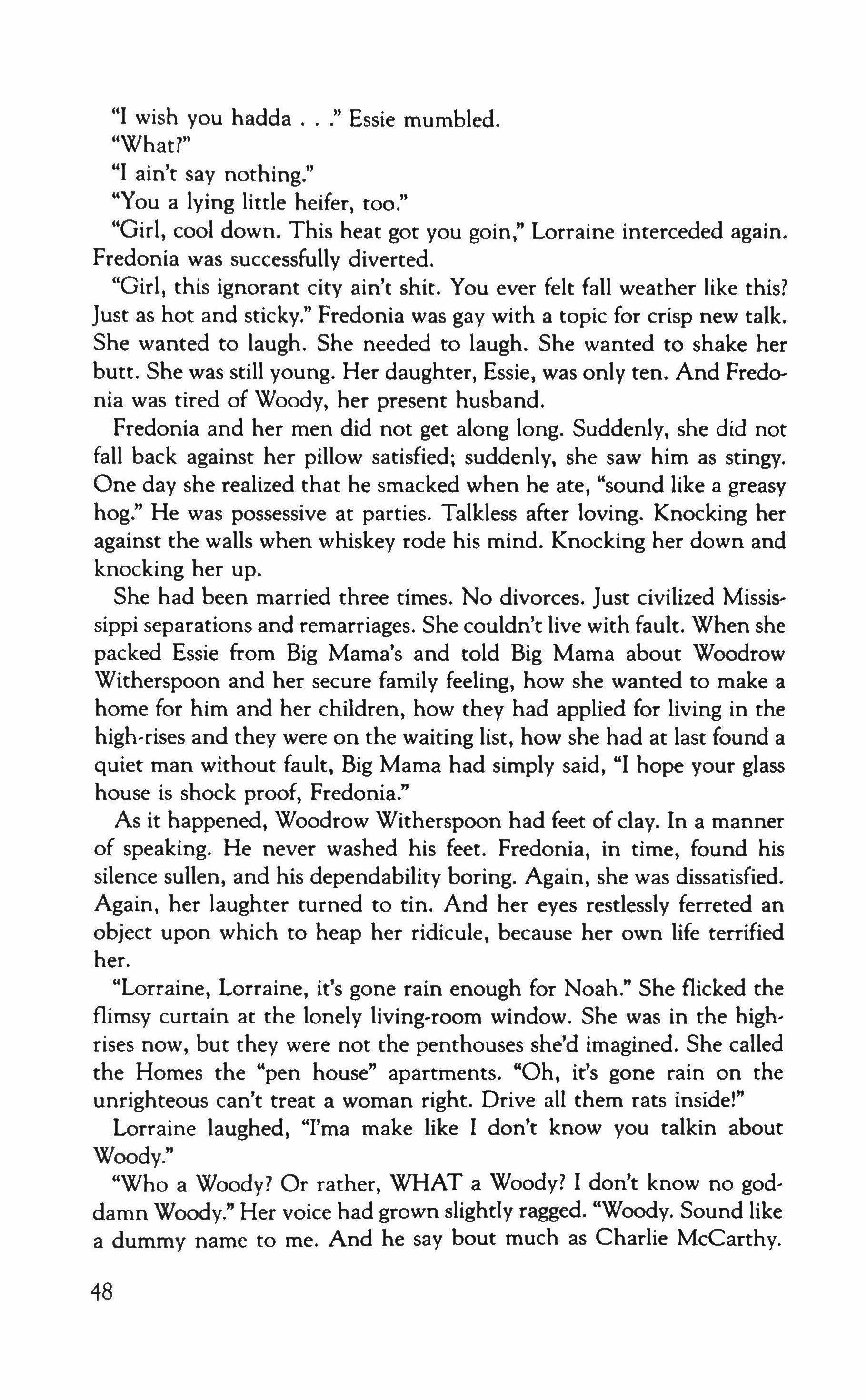
"I wish you hadda Essie mumbled.
"What?"
"I ain't say nothing."
"You a lying little heifer, too."
"Girl, cool down. This heat got you goin," Lorraine interceded again. Fredonia was successfully diverted.
"Girl, this ignorant city ain't shit. You ever felt fall weather like this? Just as hot and sticky." Fredonia was gay with a topic for crisp new talk. She wanted to laugh. She needed to laugh. She wanted to shake her butt. She was still young. Her daughter, Essie, was only ten. And Fredo-nia was tired of Woody, her present husband.
Fredonia and her men did not get along long. Suddenly, she did not fall back against her pillow satisfied; suddenly, she saw him as stingy. One day she realized that he smacked when he ate, "sound like a greasy hog." He was possessive at parties. Talkless after loving. Knocking her against the walls when whiskey rode his mind. Knocking her down and knocking her up.
She had been married three times. No divorces. Just civilized Missis-sippi separations and remarriages. She couldn't live with fault. When she packed Essie from Big Marna's and told Big Marna about Woodrow Witherspoon and her secure family feeling, how she wanted to make a horne for him and her children, how they had applied for living in the high-rises and they were on the waiting list, how she had at last found a quiet man without fault, Big Marna had simply said, "I hope your glass house is shock proof, Fredonia."
As it happened, Woodrow Witherspoon had feet of clay. In a manner of speaking. He never washed his feet. Fredonia, in time, found his silence sullen, and his dependability boring. Again, she was dissatisfied. Again, her laughter turned to tin. And her eyes restlessly ferreted an object upon which to heap her ridicule, because her own life terrified her.
"Lorraine, Lorraine, it's gone rain enough for Noah." She flicked the flimsy curtain at the lonely living-room window. She was in the highrises now, but they were not the penthouses she'd imagined. She called the Homes the "pen house" apartments. "Oh, it's gone rain on the unrighteous can't treat a woman right. Drive all them rats inside!"
Lorraine laughed, "I'ma make like I don't know you talkin about Woody."
"Who a Woody? Or rather, WHAT a Woody? I don't know no goddamn Woody." Her voice had grown slightly ragged. "Woody. Sound like a dummy name to me. And he say bout much as Charlie McCarthy.
48
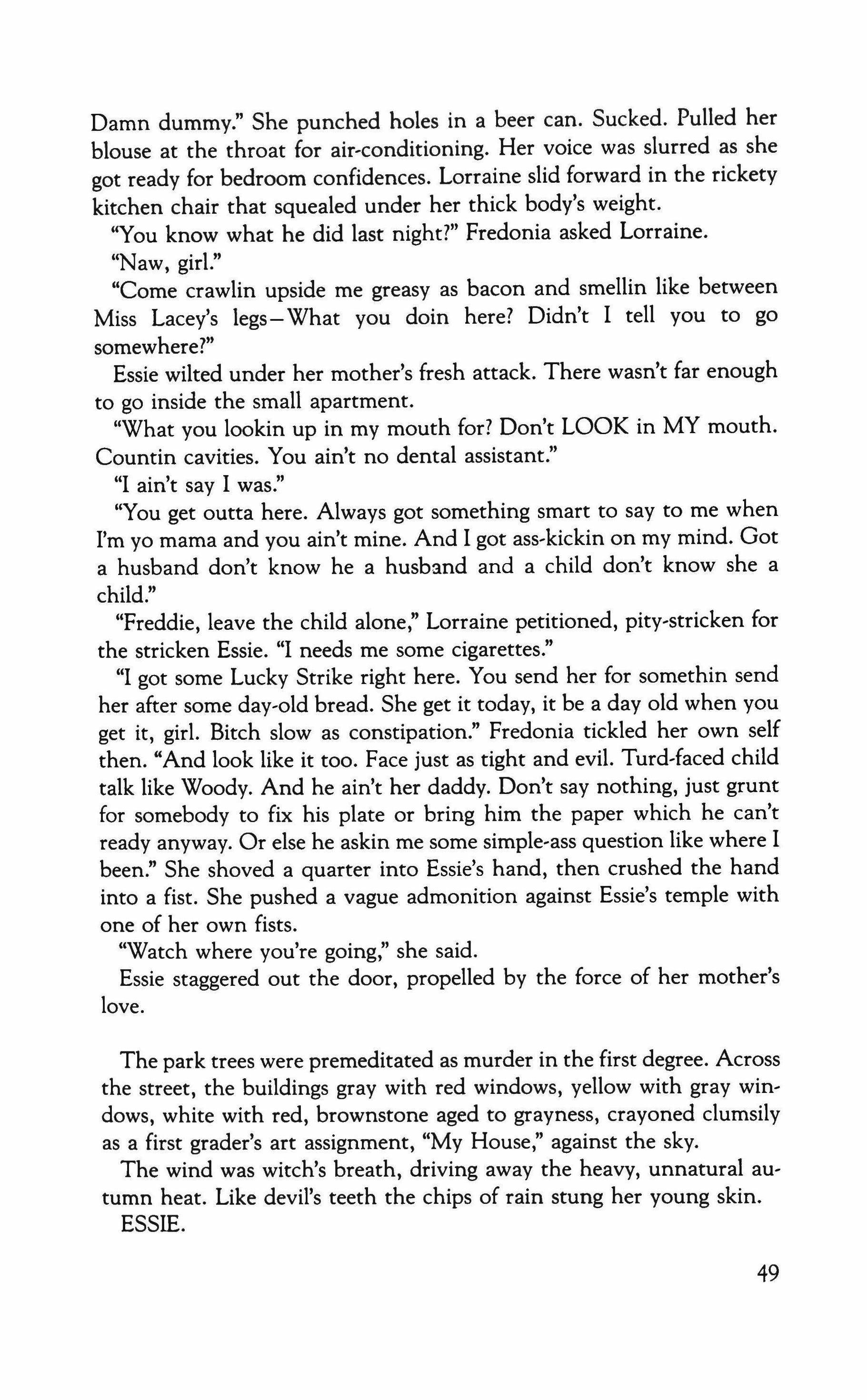
Damn dummy." She punched holes in a beer can. Sucked. Pulled her blouse at the throat for air-conditioning. Her voice was slurred as she got ready for bedroom confidences. Lorraine slid forward in the rickety kitchen chair that squealed under her thick body's weight.
"You know what he did last night?" Fredonia asked Lorraine.
"Naw, girl."
"Corne crawlin upside me greasy as bacon and smellin like between Miss Lacey's legs-What you doin here? Didn't I tell you to go somewhere?"
Essie wilted under her mother's fresh attack. There wasn't far enough to go inside the small apartment.
"What you lookin up in my mouth for? Don't LOOK in MY mouth. Countin cavities. You ain't no dental assistant."
"I ain't say I was."
"You get outta here. Always got something smart to say to me when I'm yo marna and you ain't mine. And I got ass-kickin on my mind. Got a husband don't know he a husband and a child don't know she a child."
"Freddie, leave the child alone," Lorraine petitioned, pity-stricken for the stricken Essie. "I needs me some cigarettes."
"I got some Lucky Strike right here. You send her for somethin send her after some day-old bread. She get it today, it be a day old when you get it, girl. Bitch slow as constipation." Fredonia tickled her own self then. "And look like it too. Face just as tight and evil. Turd-faced child talk like Woody. And he ain't her daddy. Don't say nothing, just grunt for somebody to fix his plate or bring him the paper which he can't ready anyway. Or else he askin me some simple-ass question like where I been." She shoved a quarter into Essie's hand, then crushed the hand into a fist. She pushed a vague admonition against Essie's temple with one of her own fists.
"Watch where you're going:' she said.
Essie staggered out the door, propelled by the force of her mother's love.
The park trees were premeditated as murder in the first degree. Across the street, the buildings gray with red windows, yellow with gray windows, white with red, brownstone aged to grayness, crayoned clumsily as a first grader's art assignment, "My House," against the sky.
The wind was witch's breath, driving away the heavy, unnatural autumn heat. Like devil's teeth the chips of rain stung her young skin. ESSIE.
49

She tracked through the thin strip of boulevard between the two bread factories where the smell of baking loaves hung from the trees like leavened leaves. Her sneakers crushed a trail of grass and leaves. Rain thrashing aslant along her back. Essie was running to beat the rain and her mama's wrath.
"Where do the moon go when it rain?" Questions permeated her mind like new smells. Her wide nostrils were flared in curiosity. Tantalized. Knowledge was a rich gumbo. She craved as children crave: earnestly and openly. She would question Fredonia, her questions like the sound of brash young metals, high and fast, incessantly beating against wooden love and tinsel nerve. "Do the moon be there when it rain and we don't see? Like I be there and my mama don't see me." Fredonia would wonder in annoyance where all Essie's curiosities came from, what curio-junk shop her mind traded in. This child's peculiar ways mocked her in half-hidden mirrors of gawky, gawking years. Fredonia would wonder where Essie came from, but she knew.
For some reason the moon roomed noisily in Essie's head tonight, like a clock frozen on a lonely orbit ofmissing hands. She was still sullen and aching from Fredonia's slap and more from Fredonia's corded tongue, but mostly she ached from the absence of tenderness.
She knew there was no hope. She would be skin-soaked and hairnappy by the time she made it home. But keep the bread dry no matter what. Yet even ifshe kept the bread dry, Fredonia would curse her kinky hair. (Who can love a knotted head? At best, one wants to straighten it.) It would be all her fault. It would all be her fault.
She daydreamed. A dream less complicated than hair, a tenderheaded dream. She may as well slow-walk through dream. She thought, "She blame me all the time anyway."
Lightning made an acid streak across the sky and thunder ruled the world. All the while Essie was looking near-blind through rain, searching for the moon.
Children in two-floor houses were huddled in hallways as she passed. Sooner or later some one of them would risk the rain, run out into it, defy it in the ritual dance. They would make a chanting ring, as the others joined the bravest one. "Rain, rain, go away. Come again some other day." Trying to make an appointment with misery because they knew it must come. And thinking a postponement was the best that they could do.
Essie was humming softly to herself, "Rain, rain go away." Her feet
50
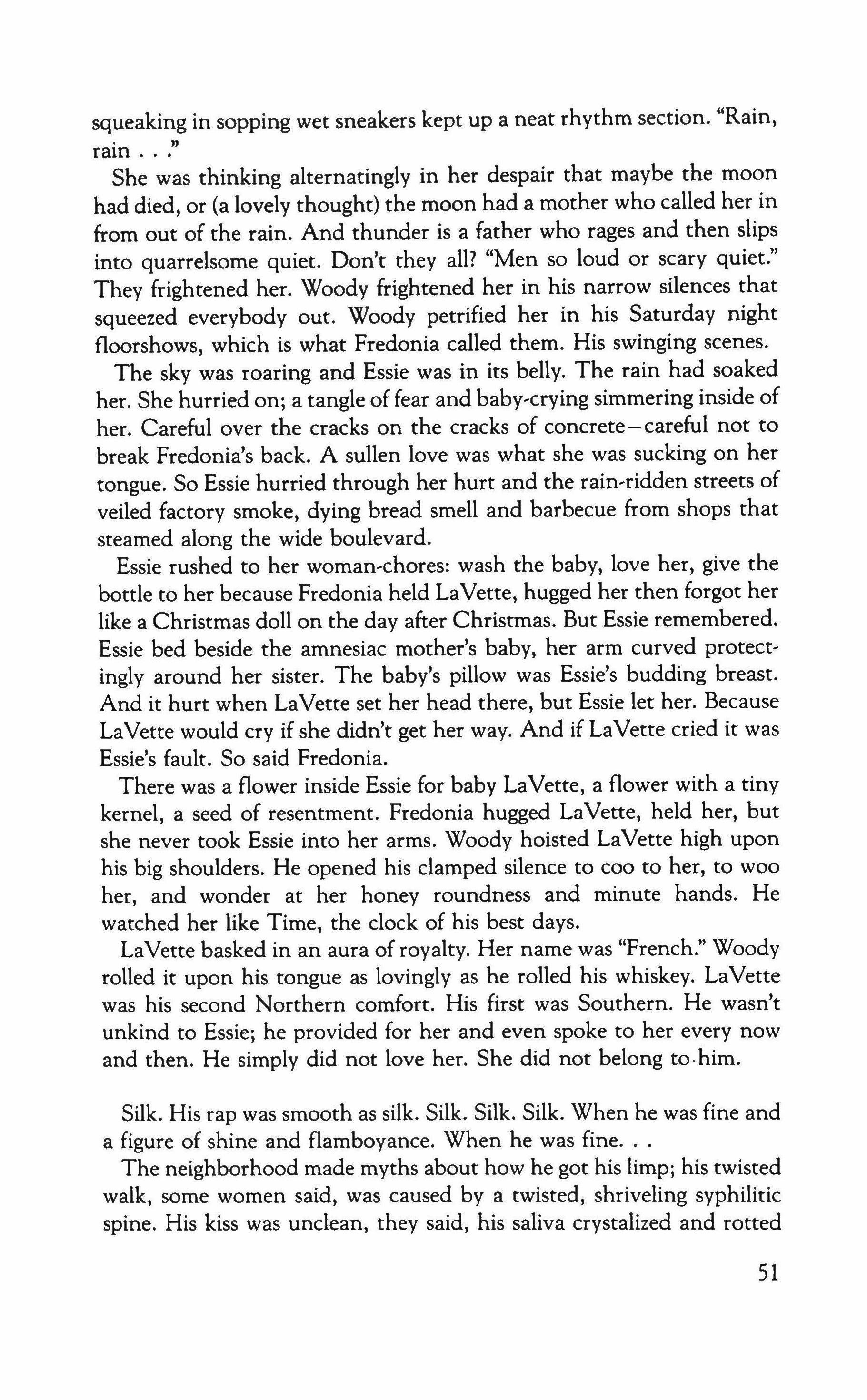
squeaking in sopping wet sneakers kept up a neat rhythm section. "Rain, ram
She was thinking alternatinglv in her despair that maybe the moon had died, or (a lovely thought) the moon had a mother who called her in from out of the rain. And thunder is a father who rages and then slips into quarrelsome quiet. Don't they all? "Men so loud or scary quiet." They frightened her. Woody frightened her in his narrow silences that squeezed everybody out. Woody petrified her in his Saturday night floorshows, which is what Fredonia called them. His swinging scenes.
The sky was roaring and Essie was in its belly. The rain had soaked her. She hurried on; a tangle offear and baby-crying simmering inside of her. Careful over the cracks on the cracks of concrete-careful not to break Fredonia's back. A sullen love was what she was sucking on her tongue. So Essie hurried through her hurt and the rain-ridden streets of veiled factory smoke, dying bread smell and barbecue from shops that steamed along the wide boulevard.
Essie rushed to her woman-chores: wash the baby, love her, give the bottle to her because Fredonia held LaVette, hugged her then forgot her like a Christmas doll on the day after Christmas. But Essie remembered. Essie bed beside the amnesiac mother's baby, her arm curved protectingly around her sister. The baby's pillow was Essie's budding breast. And it hurt when LaVette set her head there, but Essie let her. Because LaVette would cry if she didn't get her way. And if LaVette cried it was Essie's fault. So said Fredonia.
There was a flower inside Essie for baby LaVette, a flower with a tiny kernel, a seed of resentment. Fredonia hugged LaVette, held her, but she never took Essie into her arms. Woody hoisted LaVette high upon his big shoulders. He opened his clamped silence to coo to her, to woo her, and wonder at her honey roundness and minute hands. He watched her like Time, the clock of his best days.
LaVette basked in an aura of royalty. Her name was "French." Woody rolled it upon his tongue as lovingly as he rolled his whiskey. LaVette was his second Northern comfort. His first was Southern. He wasn't unkind to Essie; he provided for her and even spoke to her every now and then. He simply did not love her. She did not belong to-him.
Silk. His rap was smooth as silk. Silk. Silk. Silk. When he was fine and a figure of shine and flamboyance. When he was fine.
The neighborhood made myths about how he got his limp; his twisted walk, some women said, was caused by a twisted, shriveling syphilitic spine. His kiss was unclean, they said, his saliva crystalized and rotted
51
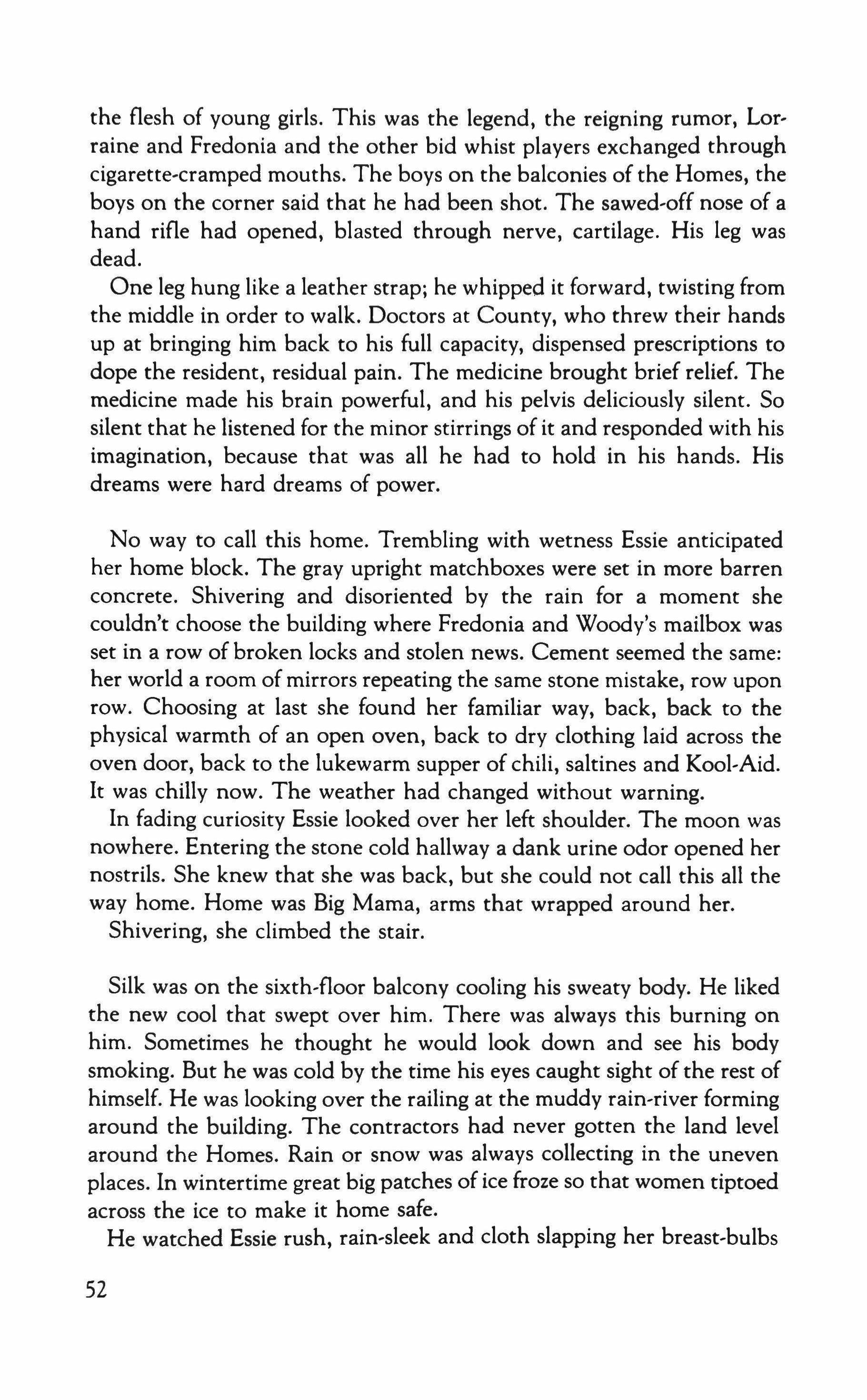
the flesh of young girls. This was the legend, the reigning rumor, Lorraine and Fredonia and the other bid whist players exchanged through cigarette-cramped mouths. The boys on the balconies of the Homes, the boys on the corner said that he had been shot. The sawed-off nose of a hand rifle had opened, blasted through nerve, cartilage. His leg was dead.
One leg hung like a leather strap; he whipped it forward, twisting from the middle in order to walk. Doctors at County, who threw their hands up at bringing him back to his full capacity, dispensed prescriptions to dope the resident, residual pain. The medicine brought brief relief. The medicine made his brain powerful, and his pelvis deliciously silent. So silent that he listened for the minor stirrings of it and responded with his imagination, because that was all he had to hold in his hands. His dreams were hard dreams of power.
No way to call this home. Trembling with wetness Essie anticipated her home block. The gray upright matchboxes were set in more barren concrete. Shivering and disoriented by the rain for a moment she couldn't choose the building where Fredonia and Woody's mailbox was set in a row of broken locks and stolen news. Cement seemed the same: her world a room of mirrors repeating the same stone mistake, row upon row. Choosing at last she found her familiar way, back, back to the physical warmth of an open oven, back to dry clothing laid across the oven door, back to the lukewarm supper of chili, saltines and Kool-Aid. It was chilly now. The weather had changed without warning.
In fading curiosity Essie looked over her left shoulder. The moon was nowhere. Entering the stone cold hallway a dank urine odor opened her nostrils. She knew that she was back, but she could not call this all the way home. Home was Big Mama, arms that wrapped around her.
Shivering, she climbed the stair.
Silk was on the sixth-floor balcony cooling his sweaty body. He liked the new cool that swept over him. There was always this burning on him. Sometimes he thought he would look down and see his body smoking. But he was cold by the time his eyes caught sight of the rest of himself. He was looking over the railing at the muddy rain-river forming around the building. The contractors had never gotten the land level around the Homes. Rain or snow was always collecting in the uneven places. In wintertime great big patches of ice froze so that women tiptoed across the ice to make it home safe.
He watched Essie rush, rain-sleek and cloth slapping her breast-bulbs
52
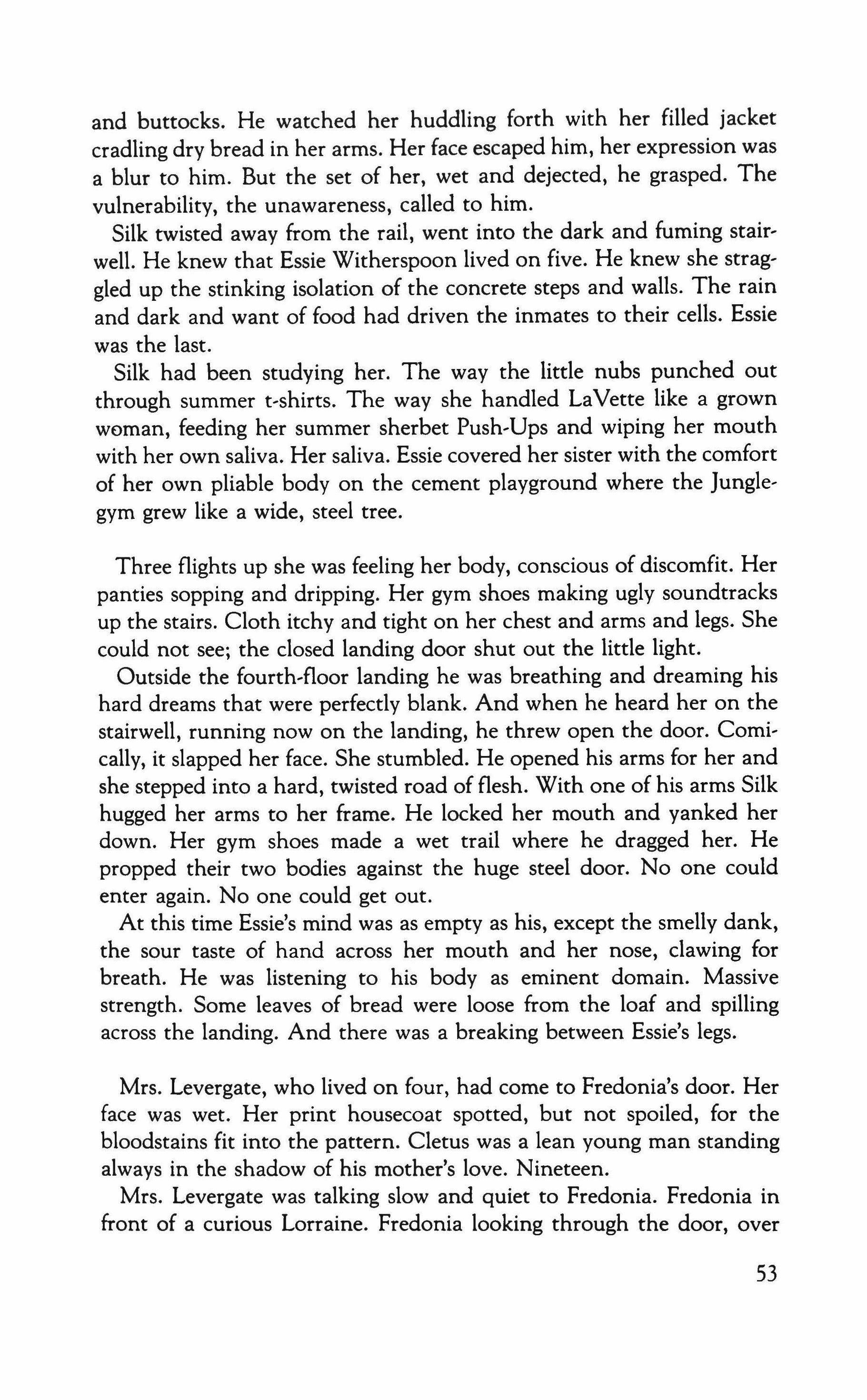
and buttocks. He watched her huddling forth with her filled jacket cradling dry bread in her arms. Her face escaped him, her expression was a blur to him. But the set of her, wet and dejected, he grasped. The vulnerability, the unawareness, called to him.
Silk twisted away from the rail, went into the dark and fuming stair, well. He knew that Essie Witherspoon lived on five. He knew she straggled up the stinking isolation of the concrete steps and walls. The rain and dark and want of food had driven the inmates to their cells. Essie was the last.
Silk had been studying her. The way the little nubs punched out through summer t-shirts. The way she handled LaVette like a grown woman, feeding her summer sherbet Push,Ups and wiping her mouth with her own saliva. Her saliva. Essie covered her sister with the comfort of her own pliable body on the cement playground where the Jungle, gym grew like a wide, steel tree.
Three flights up she was feeling her body, conscious of discomfit. Her panties sopping and dripping. Her gym shoes making ugly soundtracks up the stairs. Cloth itchy and tight on her chest and arms and legs. She could not see; the closed landing door shut out the little light.
Outside the fourth-floor landing he was breathing and dreaming his hard dreams that were perfectly blank. And when he heard her on the stairwell, running now on the landing, he threw open the door. Comically, it slapped her face. She stumbled. He opened his arms for her and she stepped into a hard, twisted road of flesh. With one of his arms Silk hugged her arms to her frame. He locked her mouth and yanked her down. Her gym shoes made a wet trail where he dragged her. He propped their two bodies against the huge steel door. No one could enter again. No one could get out.
At this time Essie's mind was as empty as his, except the smelly dank, the sour taste of hand across her mouth and her nose, clawing for breath. He was listening to his body as eminent domain. Massive strength. Some leaves of bread were loose from the loaf and spilling across the landing. And there was a breaking between Essie's legs.
Mrs. Levergate, who lived on four, had corne to Fredonia's door. Her face was wet. Her print housecoat spotted, but not spoiled, for the bloodstains fit into the pattern. Cletus was a lean young man standing always in the shadow of his mother's love. Nineteen.
Mrs. Levergate was talking slow and quiet to Fredonia. Fredonia in front of a curious Lorraine. Fredonia looking through the door, over
53

Mrs. Levergate's shoulder. Cletus in the shadows. Essie a dirty crumpled bundle of damp in Cletus's arms. Essie was clumsy in Cletus's arms. He was embarrassed; his mother's blanket did not cover well; Essie was naked from the waist down. Her eyes were wide open as if invisible fingers jacked the eyelids up. She looked into Fredonia's dazed face. Matter-of-factlv she said, "Somebody. Somebody mash the bread, Mama." She thought that was why Fredonia, weeping way in her throat, tore her from Cletus's good arms and rough-rocked her in curses.
Before a barnyard of high steel and stone the women were chickens whose eggs had been stolen, whose eggs cracked, clotted from cold in spite of their steady warmth. Battered old hens, they had seen the young yolks and whites of the children's broken eyes discarded and still throbbing yolky and milky mingling with wine and urine and blood and menstrual discharge from some discarded woman's discarded napkin wiping anybody else's cracked concrete.
And their faces too cracked with wise laughter and worry and knowing talk. Their clucking cluttering the air, climbing the projects floor by floor it grew so furious.
Two policemen cut them with the arcs of their nightsticks. The blue men made a path for themselves. And the women made a wake for the path with their words. "They betta be careful a them po-lease I tell you the time my cousin Ola Mae daughter went a one a them activity after school and her and her little girlfriends they was bout leven years old? Well they was comin home about seven o'clock at night and it was just barely dark comin from school and these two Negro po-leasernens crawl up long side them walkin down the sidewalk ask them they mama knowed where they was at. And quite natchelly Ola Mae daughter and her friends they scared and they shame say Naw. They was getting ready for they whippin as soon as they hit the doe. And these two Negro poleasemens say Git in the squad car. And quite natchellv them three little girls gone and do what they tell em to. Girl well do you know them two lowdown dirty dogs took them chilren up in one of them deserted parking lots down on Berry Street and raped them in the bushes? Now that don't make no kind a sense girl and then drop them on a corner near bouts they school and tell em they better now be stayin out at no nighttime and they better not see them no more or somethin might happen to em."
"Honey, you can't trust none a these dogs."
"Somebody oughtta go with them ain't no tellin if they get to the hospital. One of these mens needta go. Where that little girl daddy at?"
54

The speaker thrust her gaze toward her own husband accusingly. He was standing in the shadows around the assaulted mailboxes. The corners of his wide mouth folded down. Shaking his head from side to side rneditatively and spitting out the sour taste of his thoughts along with the chips of his chewed,up toothpick that poked out the corner of his bent mouth.
The moon was pouring a moving light that rinsed their raggedy faces. A torn strip of cloud tore the center of the moon's face, making puzzles of the light. A woman kept on talking, so loud she must have been chastizing the moon that saw it all and said nothing.
"Uhrnmrnp, uhmp, uhmp. I wish I could git in a snake's head. All this free stuff trottin around here begging and these whores steady traffickin and they wanna do something like that to a child. I wish I could get in a snake's head. I'd do me some brain surgery. They oughtta put his ass under the jail then open the sewers and flood him out and let him float on away with the rats. I mean it. I sure do mean it. It wouldn't be none too good for him. I wish I knowed what make folks do stuff like that. Messing up that child like that."
Fredonia was carrying Essie in her arms through a crowd of musk and whispering. Essie was floating under a raging moon. A circle of them. Some women were saying ''That little girl." The police were taking her. There was something she had done. She was dizzy with the sound of sirens that raked their way down the flooded street and up the wet boulevard. There was a blue stain across her eyes. She folded her painted face into Fredonia's breast. Fredonia was talking, unfolding cloth from her purse.
Saying, "Essie, step in these panties, baby. Move yo legs. They would be torn. This would be the torn pair." A new shame flooded Fredonia: her child had been raped and her underwear was raggedy.
The police car smelled of leather and grit. The odor slipped into their bodies from the seats, from the men in their blues. And they were marked. They were in the back of a police car, so they stank. They were riding in a police car and no one could be innocent.
"What I do?" Essie whispered. "What I do, Mama?"
Fredonia started to cry. Shsshing Essie. They were riding all the way to County. Essie adrift in an aura of humid leather and law, but for Fredonia's arms and aromas she would have drowned.
This jagged night everything was a puzzle jamming together. Fredonia's arms were holding her. Binding them together. LaVette she'd left with Mrs. Levergate. And if Essie was going to jail, Fredonia was going too. Fredonia was loving her. Loving her. Fredonia's fingers with their
55
bright red nails shut Essie's trembling lips. Her hands smelled sweet and spicy with chili seasoning that would be so hot it would burn Woody's insides. Essie was cupped and she closed herself in the aromas of sea' soned hands and colognes and Jergen's lotion and husky beer breath. All of these smells circled her now.
She kept heaving the torn feeling out of her head. Bramble branches of pain pushed through her. Fredonia would be angry soon - blood had soiled Essie's panties even as she'd put them on her. The white people at the hospital and the jail would see that she was dirty. Essie shook with sighs; her teeth rattled. She looked out the glass of the police car. They were at the hospital entrance alongside an ambulance unloading a stretcher. In the red glare of the white ambulance she saw the moon. It was watching her, the face unwinking. Solemn. Clear and clean after the rain and cloud. Startling. Secretive.
All she'd ever wanted was to be loved; to be held and cradled. Her hair felt like a brick on her head. She felt an overwhelming compassion for herself. She wanted to hug herself right on the hem of the dance floor where William danced with Rhonda. Her need was so visible to herself, she thought that everybody could see it. All the brothers who reached over her to dance with somebody else. Especially she thought William was acquainted with the bruised child who looked around the corner in her eyes. The thought of his knowing made Essie grit her teeth and walk through the middle ofthe dance floor. Her head held high and tilted back so far she seemed to look down her nose at the music, the dancers, the entire set. So her need seemed displayed arrogance. lover, heard some dark dudes put the word out that Essie Witherspoon "is a hincty broad. Looking down her Miss Siditv nose at everybody and her stuck-up ass come from the projects. She a refugee from the Homes." I wished that they could walk in her skin. I wished they knew her like I think I do.
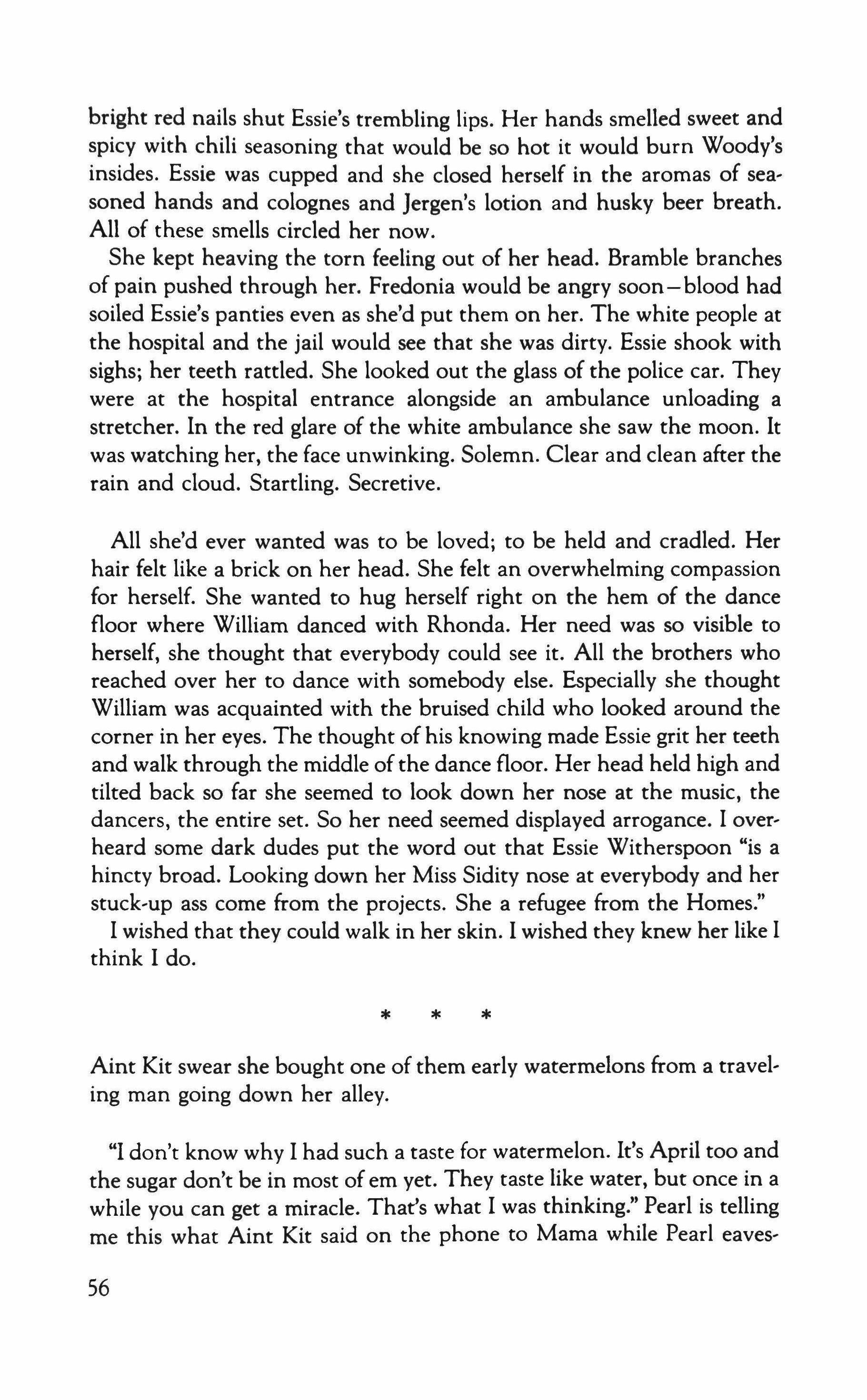
Aint Kit swear she bought one of them early watermelons from a travel, ing man going down her alley.
"I don't know why I had such a taste for watermelon. It's April too and the sugar don't be in most of em yet. They taste like water, but once in a while you can get a miracle. That's what I was thinking." Pearl is telling me this what Aint Kit said on the phone to Mama while Pearl eaves,
* * *
56

dropped because she could tell from Mama's face this was too good to miss. She sounds just like Aint Kit when she's telling how she prophecied after the fact. Her voice weighted down with foreboding. Her pauses nine months pregnant.
"You know you don't see that many of them watermelon trucks round here. That is most unusual. So when I heard my big dogs bark I knew they wasn't hungry cause I'd just cooked them up a coupla them r-bone steaks I keep in my freezer." ("You know them dogs was starving to death," Pearl interjects into her mimicry. "She keeps them hungry so they'll be as mean as she is.") "They was barking and howling something turrible. So I went on into the backyard and the garbagecans in the alley was running over. And here come this truck loaded down with melons drawin up the alley. My mouth started watering for one of them early watermelons. So the man stopped when I said gimme one of them melons. He give it to me real cheap. I should have KNOWN something. He was justa smiling. All I could see was the gold all over his teeth. Look like a street in Heaven. He had his hat pulled down over his eyes so I could barely see a little glint. Oooh, and he was black and uglyyyyyyyyyy. Ooooh. He was ugly. Look like somebody beat him when he came out the womb then shoved him back up in there are mixed him with the afterbirth." ("You ever notice how Aint Kit loves to call people ugly?" Pearl asked me.) "Anyway, I figure anybody that ugly got to be lucky. How much bad luck can a person have? So I picked that watermelon up like a baby. He ask me if I want a plug but I told him naw. {"Now I know this is made up," I tell Pearl. "When you ever know Aint Kit to miss getting something free much less pass up trying something out without parting with that money she keeps in her bra. Next to her heart." Pearl laughs so hard she almost can't get back into the Aint Kit voice. She clears the giggles and hoots from her voice.) "Now I had knocked on the melon to see if it sounded good and it sounded deep and wide inside and it was heavy. Ooh, it was heavy. But I carried it in my arms, the big dogs was lapping at my knees and the ugly man got back up in the truck and drove on down the alley. I thought it was strange the way he come down the alley directly to my house real slow and he drove offreal fast like he was making a getaway. Dust was jumping back offthe truck wheels; it couldn't hold on. He was flying down that alley. I went on inside.
"My mouth wasn't nothing but water by now. I set that watermelon on the kitchen sink. I put some newspapers down first cause I didn't want to make no mess and draw no ants." ("Ants my behind. Aint Kit knows she means roaches. Just like she's never seen them. They're older
57
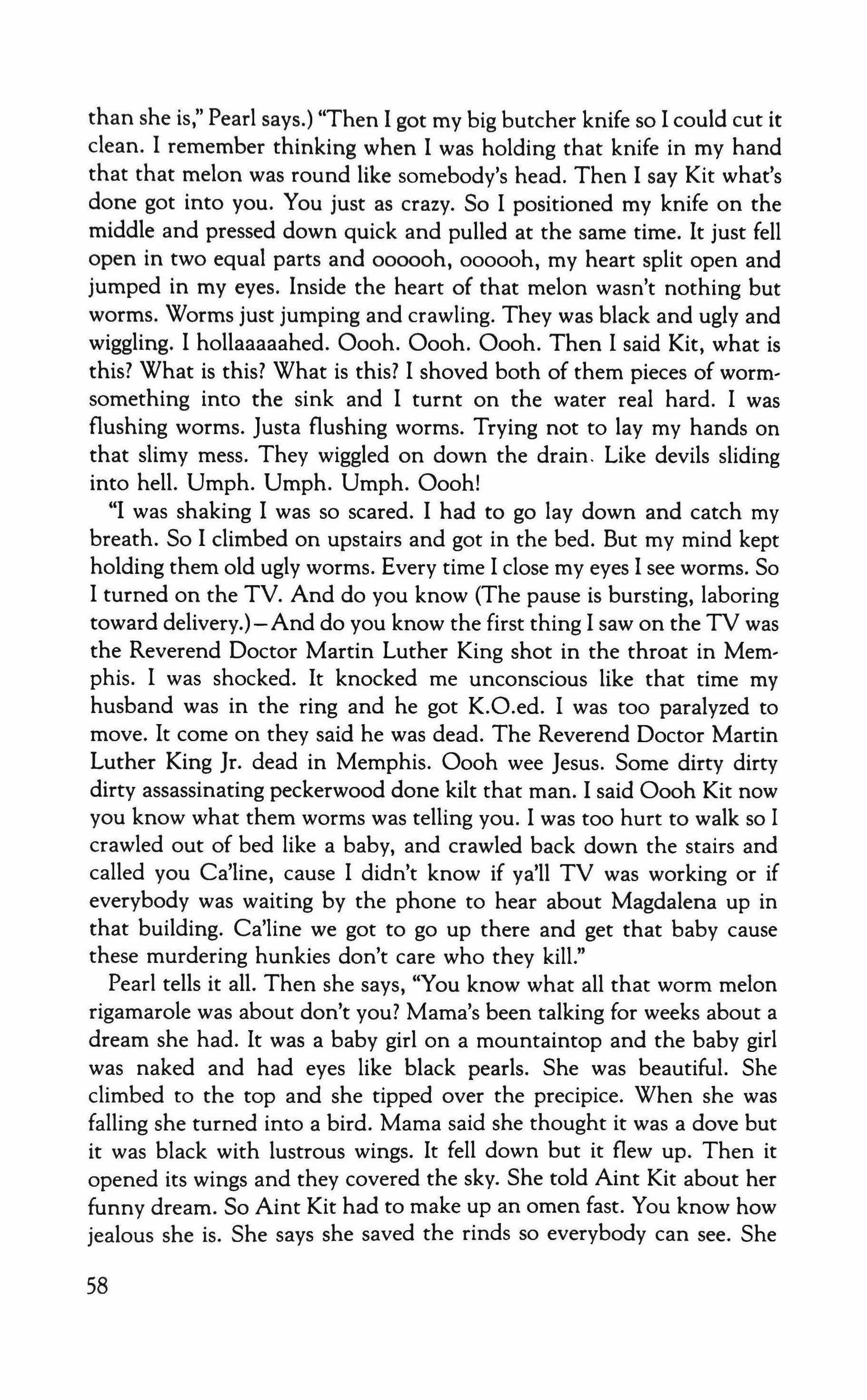
than she is," Pearl says.) "Then I got my big butcher knife so I could cut it clean. I remember thinking when I was holding that knife in my hand that that melon was round like somebody's head. Then I say Kit what's done got into you. You just as crazy. So I positioned my knife on the middle and pressed down quick and pulled at the same time. It just fell open in two equal parts and oooooh, oooooh, my heart split open and jumped in my eyes. Inside the heart of that melon wasn't nothing but worms. Worms just jumping and crawling. They was black and ugly and wiggling. I hollaaaaahed. Oooh. Oooh. Oooh. Then I said Kit, what is this? What is this? What is this? I shoved both of them pieces of wormsomething into the sink and I turnt on the water real hard. I was flushing worms. Justa flushing worms. Trying not to lay my hands on that slimy mess. They wiggled on down the drain. Like devils sliding into hell. Umph. Umph, Umph. Oooh!
"I was shaking I was so scared. I had to go lay down and catch my breath. So I climbed on upstairs and got in the bed. But my mind kept holding them old ugly worms. Every time I close my eyes I see worms. So I turned on the TV. And do you know (The pause is bursting, laboring toward delivery.)-And do you know the first thing I saw on the TV was the Reverend Doctor Martin Luther King shot in the throat in Memphis. I was shocked. It knocked me unconscious like that time my husband was in the ring and he got K.O.ed. I was too paralyzed to move. It come on they said he was dead. The Reverend Doctor Martin Luther King Jr. dead in Memphis. Oooh wee Jesus. Some dirty dirty dirty assassinating peckerwood done kilt that man. I said Oooh Kit now you know what them worms was telling you. I was too hurt to walk so I crawled out of bed like a baby, and crawled back down the stairs and called you Ca'line, cause I didn't know if ya'll TV was working or if everybody was waiting by the phone to hear about Magdalena up in that building. Ca'line we got to go up there and get that baby cause these murdering hunkies don't care who they kill."
Pearl tells it all. Then she says, "You know what all that worm melon rigamarole was about don't you? Mama's been talking for weeks about a dream she had. It was a baby girl on a mountaintop and the baby girl was naked and had eyes like black pearls. She was beautiful. She climbed to the top and she tipped over the precipice. When she was falling she turned into a bird. Mama said she thought it was a dove but it was black with lustrous wings. It fell down but it flew up. Then it opened its wings and they covered the sky. She told Aint Kit about her funny dream. So Aint Kit had to make up an omen fast. You know how jealous she is. She says she saved the rinds so everybody can see. She
58
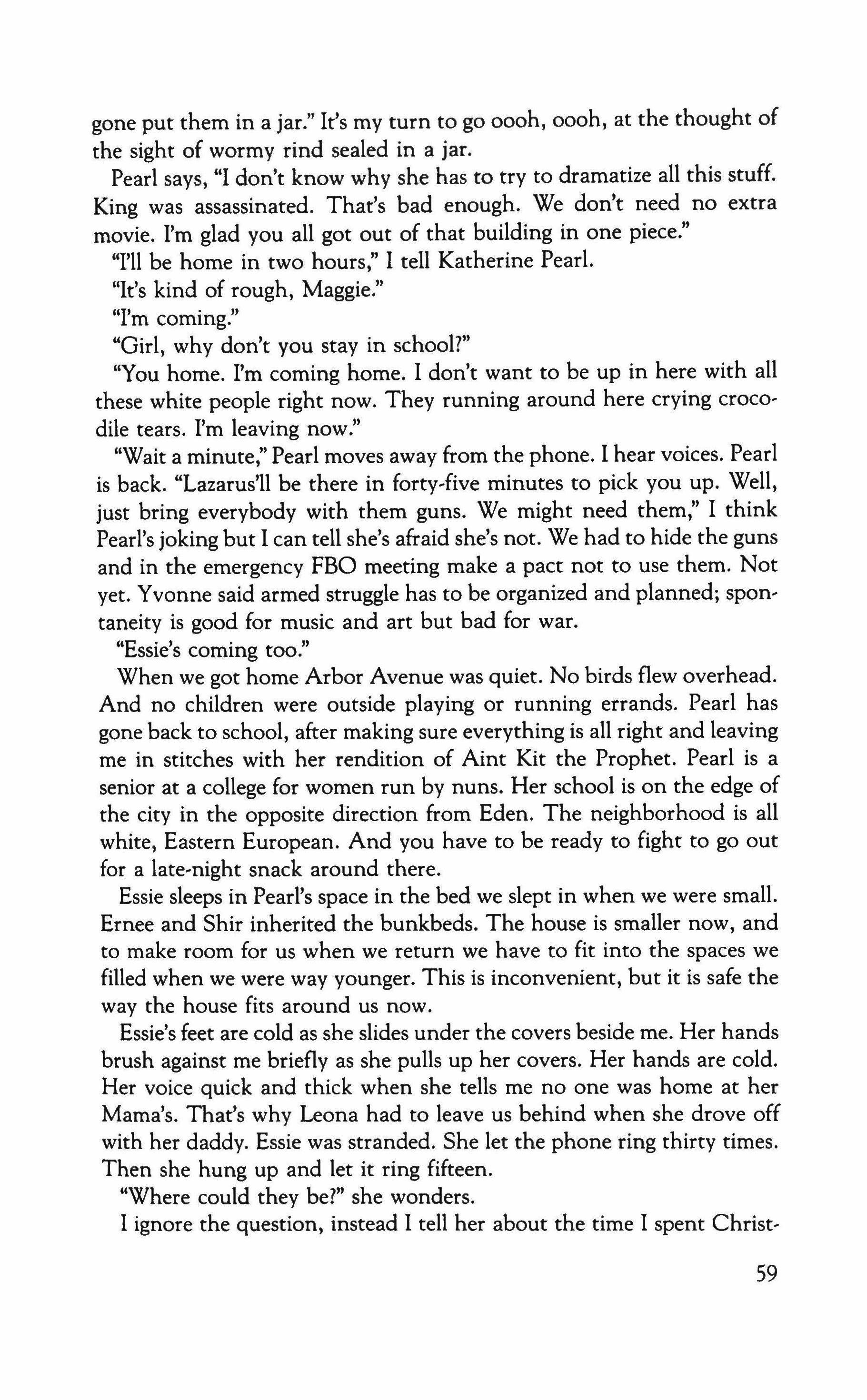
gone put them in a jar." It's my turn to go oooh, oooh, at the thought of the sight of wormy rind sealed in a jar.
Pearl says, "I don't know why she has to try to dramatize all this stuff. King was assassinated. That's bad enough. We don't need no extra movie. I'm glad you all got out of that building in one piece."
"I'll be home in two hours," I tell Katherine Pearl.
"It's kind of rough, Maggie."
"I'm coming."
"Girl, why don't you stay in school?"
"You home. I'm coming home. I don't want to be up in here with all these white people right now. They running around here crying crocodile tears. I'm leaving now."
"Wait a minute," Pearl moves away from the phone. I hear voices. Pearl is back. "Lazarus'll be there in forty-five minutes to pick you up. Well, just bring everybody with them guns. We might need them," I think Pearl's joking but I can tell she's afraid she's not. We had to hide the guns and in the emergency FBO meeting make a pact not to use them. Not yet. Yvonne said armed struggle has to be organized and planned; spontaneity is good for music and art but bad for war.
"Essie's coming too."
When we got home Arbor Avenue was quiet. No birds flew overhead. And no children were outside playing or running errands. Pearl has gone back to school, after making sure everything is all right and leaving me in stitches with her rendition of Aint Kit the Prophet. Pearl is a senior at a college for women run by nuns. Her school is on the edge of the city in the opposite direction from Eden. The neighborhood is all white, Eastern European. And you have to be ready to fight to go out for a late-night snack around there.
Essie sleeps in Pearl's space in the bed we slept in when we were small. Ernee and Shir inherited the bunkbeds. The house is smaller now, and to make room for us when we return we have to fit into the spaces we filled when we were way younger. This is inconvenient, but it is safe the way the house fits around us now.
Essie's feet are cold as she slides under the covers beside me. Her hands brush against me briefly as she pulls up her covers. Her hands are cold. Her voice quick and thick when she tells me no one was home at her Mama's. That's why Leona had to leave us behind when she drove off with her daddy. Essie was stranded. She let the phone ring thirty times. Then she hung up and let it ring fifteen.
"Where could they be?" she wonders.
I ignore the question, instead I tell her about the time I spent Christ-
59
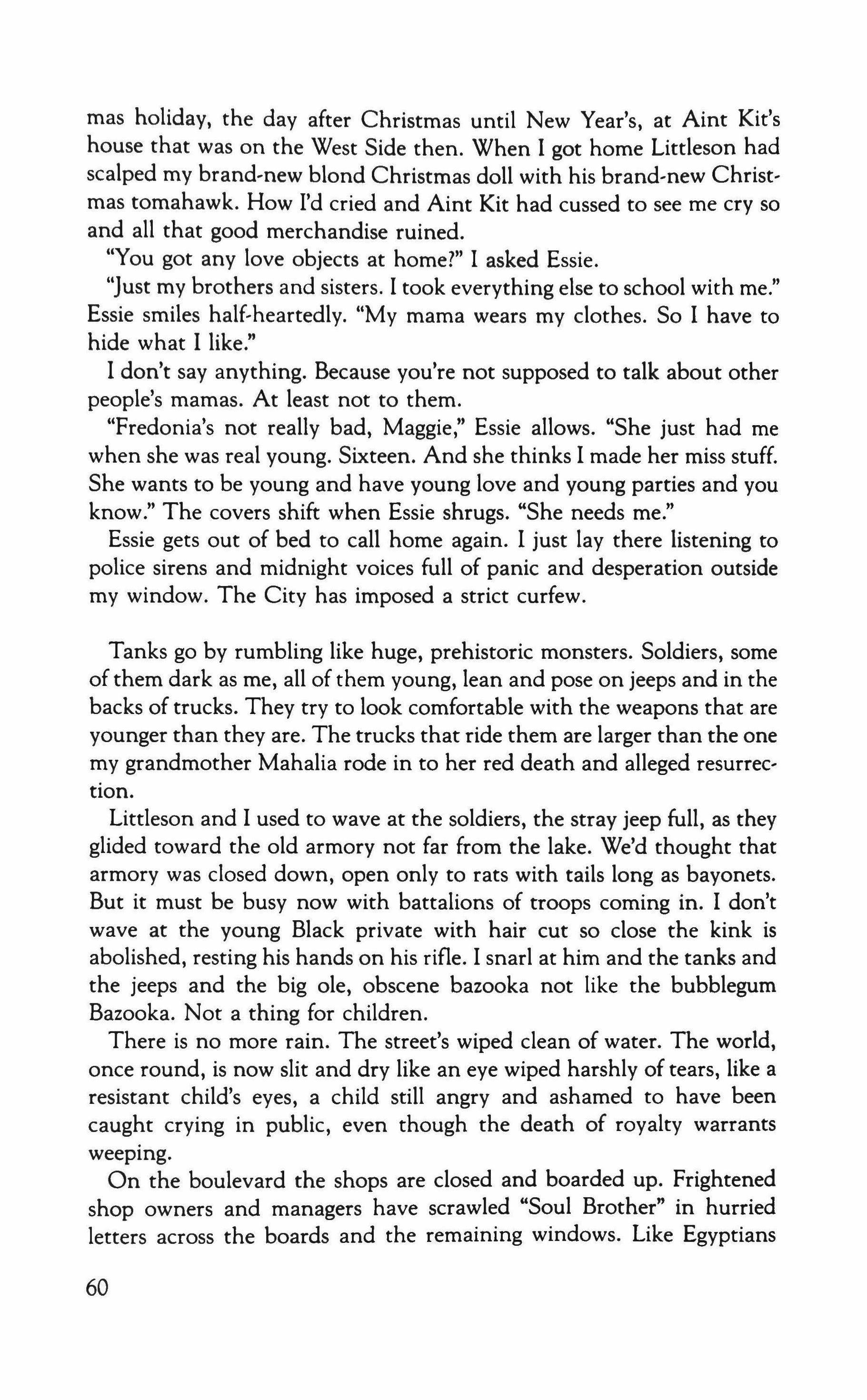
mas holiday, the day after Christmas until New Year's, at Aint Kit's house that was on the West Side then. When I got home Littleson had scalped my brand-new blond Christmas doll with his brand,new Christ, mas tomahawk. How I'd cried and Aint Kit had cussed to see me cry so and all that good merchandise ruined.
"You got any love objects at home?" I asked Essie.
"Just my brothers and sisters. I took everything else to school with me." Essie smiles half-heartedly, "My mama wears my clothes. So I have to hide what I like."
I don't say anything. Because you're not supposed to talk about other people's mamas. At least not to them.
"Fredonia's not really bad, Maggie," Essie allows. "She just had me when she was real young. Sixteen. And she thinks I made her miss stuff. She wants to be young and have young love and young parties and you know." The covers shift when Essie shrugs. "She needs me."
Essie gets out of bed to call home again. I just lay there listening to police sirens and midnight voices full of panic and desperation outside my window. The City has imposed a strict curfew.
Tanks go by rumbling like huge, prehistoric monsters. Soldiers, some of them dark as me, all of them young, lean and pose on jeeps and in the backs of trucks. They try to look comfortable with the weapons that are younger than they are. The trucks that ride them are larger than the one my grandmother Mahalia rode in to her red death and alleged resurrection.
Littleson and I used to wave at the soldiers, the stray jeep full, as they glided toward the old armory not far from the lake. We'd thought that armory was closed down, open only to rats with tails long as bayonets. But it must be busy now with battalions of troops coming in. I don't wave at the young Black private with hair cut so close the kink is abolished, resting his hands on his rifle. I snarl at him and the tanks and the jeeps and the big ole, obscene bazooka not like the bubblegum Bazooka. Not a thing for children.
There is no more rain. The street's wiped clean of water. The world, once round, is now slit and dry like an eye wiped harshly of tears, like a resistant child's eyes, a child still angry and ashamed to have been caught crying in public, even though the death of royalty warrants weeping.
On the boulevard the shops are closed and boarded up. Frightened shop owners and managers have scrawled "Soul Brother" in hurried letters across the boards and the remaining windows. Like Egyptians
60
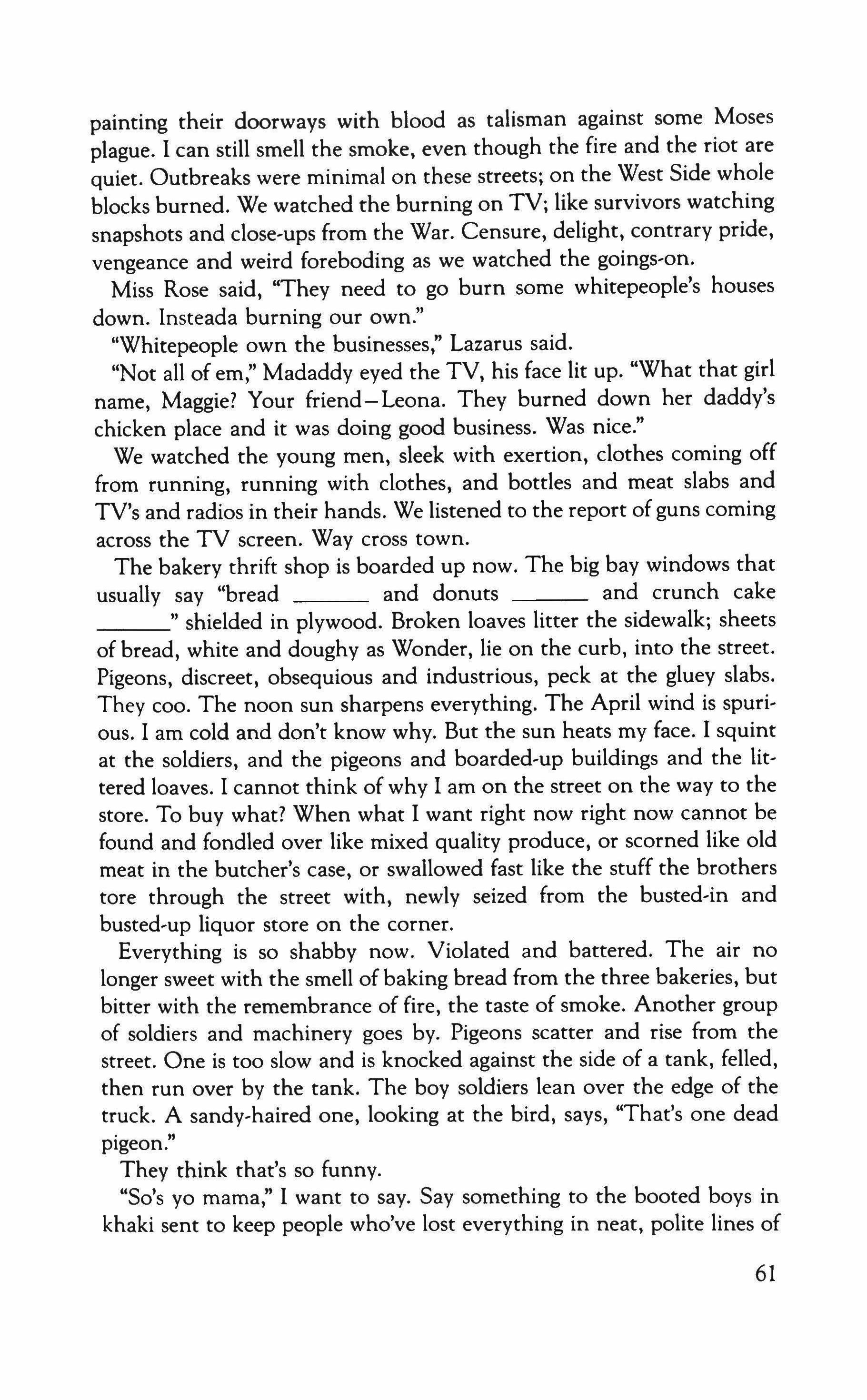
painting their doorways with blood as talisman against some Moses plague. I can still smell the smoke, even though the fire and the riot are quiet. Outbreaks were minimal on these streets; on the West Side whole blocks burned. We watched the burning on TV; like survivors watching snapshots and close-ups from the War. Censure, delight, contrary pride, vengeance and weird foreboding as we watched the goings-on.
Miss Rose said, "They need to go burn some whitepeople's houses down. lnsteada burning our own."
"Whitepeople own the businesses," Lazarus said.
"Not all of em:' Madaddv eyed the TV, his face lit up. "What that girl name, Maggie? Your friend-Leona. They burned down her daddy's chicken place and it was doing good business. Was nice."
We watched the young men, sleek with exertion, clothes coming off from running, running with clothes, and bottles and meat slabs and TV's and radios in their hands. We listened to the report of guns coming across the TV screen. Way cross town.
The bakery thrift shop is boarded up now. The big bay windows that usually say "bread and donuts and crunch cake shielded in plywood. Broken loaves litter the sidewalk; sheets of bread, white and doughy as Wonder, lie on the curb, into the street. Pigeons, discreet, obsequious and industrious, peck at the gluey slabs. They coo. The noon sun sharpens everything. The April wind is spurious. I am cold and don't know why. But the sun heats my face. I squint at the soldiers, and the pigeons and boarded-up buildings and the littered loaves. I cannot think of why I am on the street on the way to the store. To buy what? When what I want right now right now cannot be found and fondled over like mixed quality produce, or scorned like old meat in the butcher's case, or swallowed fast like the stuff the brothers tore through the street with, newly seized from the busted-in and busted-up liquor store on the corner.
Everything is so shabby now. Violated and battered. The air no longer sweet with the smell of baking bread from the three bakeries, but bitter with the remembrance of fire, the taste of smoke. Another group of soldiers and machinery goes by. Pigeons scatter and rise from the street. One is too slow and is knocked against the side of a tank, felled, then run over by the tank. The boy soldiers lean over the edge of the truck. A sandy-haired one, looking at the bird, says, "That's one dead pigeon."
They think that's so funny.
"So's yo mama," I want to say. Say something to the booted boys in khaki sent to keep people who've lost everything in neat, polite lines of
61

mourning. Sedate. Safe for someone else's democracy. (The Mayor says shoot to kill. The Mayor says he wants law and order. The soldiers came.) I can't remember now. When was Arbor or the streets around it safe? When was there law? What is the last order? When did anything make sense?
One August the whole street took to the pigeons. Mothers stoned them from backporch railings; their sons were Davids armed with slingshots or BB guns. Whatever. Their missiles landed between birds' eyes, so that the stricken birds toppled over like edible bowling pins. Then they were feathers turned motley between fingers, bellies gutted of an awful miscellanea: berries, organs, common seeds. Limbs were severed, and feathers and some feet discarded, but most amazingly to us children-drumsticks, like chicken or turkey, only diminutive, just right. "Oh, I want a little biddy baby bird leg!"
That year, I don't remember which one, I think was extra lean. Our neighbors lived bountifully on the edges of hunger. They flew in the face of it, while it gnawed their insides into blues that blasted up and down the block.
Some, like Caroline my mother, spoke out against the slaughter of the birds. They gave a thousand reasons for not doing what their ancient instincts understood to be "Just not right." They said that those birds had been born free and had raised themselves. They had not been bred to die. My mother said that pigeons were filthy, even the beige and silver-gray ones that people tried to say were so much better than the ordinary browns. My mama said no fowl was dirty as the pigeon. Pigeons walked anywhere. They were full of diseases. Whoever ate them ate disease.
Mama said, "That kind of fowl ain't fair game. Eating a pigeon is no different from eating your next-door neighbor. Cannibalism. That's what it is. Sheer and simple." The freedom of pigeons, beyond border, or hygiene she did not trust.
Cousin Bay (who was visiting, having run away from Aint Kit for the weekend and come running over to our house where the door and my mother's arms were always open until my father shut them-door and arms-after Charlotte, and sent Bay back to his sister's house) licked her fingers daintily, crumbling up the oily brown bag red and wet with hot sauce and gritty with potato-chip filings. "Pigeon's meat too tender to be a nigger. On the other hand, dark meat do be juicy and pigeons most time look pretty dark on the outside. Mama Kit cooked one once; it kept cooing and dooing outside her bedroom window so she caught him with
62

a butterfly net like the one she said they used on Aunt Leah-Bethel when they come to carry her to the crazyhouse."
"Kit knows better than that. She got two freezers full of meat. She don't need to be huntin nobody's pigeons," Mama sniffled over the raw onions she was cutting up to go on top of the black-eyed peas.
Miss Rose took the sniffle for a sniff of superiority or contempt. She sat up in the kitchen chair and talked all hot and huffy to Mama. "Caroline, you got a husband with two jobs. I'm a woman alone. If you got hongry enough you'd eat pigeons and feed your kids pigeons too."
Mama didn't say anything, but I could tell she was mad and stubborn. She stirred the big pot of black-eyed peas, then bent down with a towel in her hand to pull the black iron skillet of cornbread from the oven. The heat from the oven reddened her already red face.
Mama would fix a different kind of bean or soup Monday through Thursday. Saturday she'd cook greens, sweet potatoes, fried chicken or pork chops. And Sundays chicken baked or fried, pot roast, or steak in gravy, mashed potatoes or macaroni and cheese, peas or green beans with the potatoes cooked in them whole. The meatless Fridays of our rigidly abstinent Catholicism, she fried fish, or baked tuna casserole, or salmon croquettes which were really mackerel, or fish sticks and meat' less spaghetti. There was no place on her menus for pigeons.
Beans (pinto, thick, starchy butter beans, red beans always with rice, and navy beans before Uncle Blackstrap became a Black Muslim and made navy-bean soup every day and stunk up the house trying to digest it) filled our hunger pains and stretched our palates to distinguish the subtle difference in taste and texture, the sundry and succulent moods of beans. Mama the bean connoisseur would not touch Uncle Black, strap's Muslim bean pie.
She would not touch that bean pie, packaged perfectly in aluminum pie pan and wrapped in clearest plastic sold in the Muslim bakery further south from our house. Nor would she that summer eat those pigeons or allow us to. Eating pigeons was beneath my mother's idea of human dignity. My daddy agreed with her. No one should have to eat behind what walked in dog dung, ate garbage and pecked in sewer drains. That's what Madaddy said when he came home from work that midnight after Mama's clash with Miss Rose. He sat at the dining room table with a white Chinese food carton full of nicely spicily breaded and deep-fried shrimp from the fish place not far from the concrete ravine where the post office stood. "A pigeon," my daddy told my mama loud enough for me to make out in the dark curiosity of the bedroom where I still slept with Littleson because nothing yet could convince us we were
63
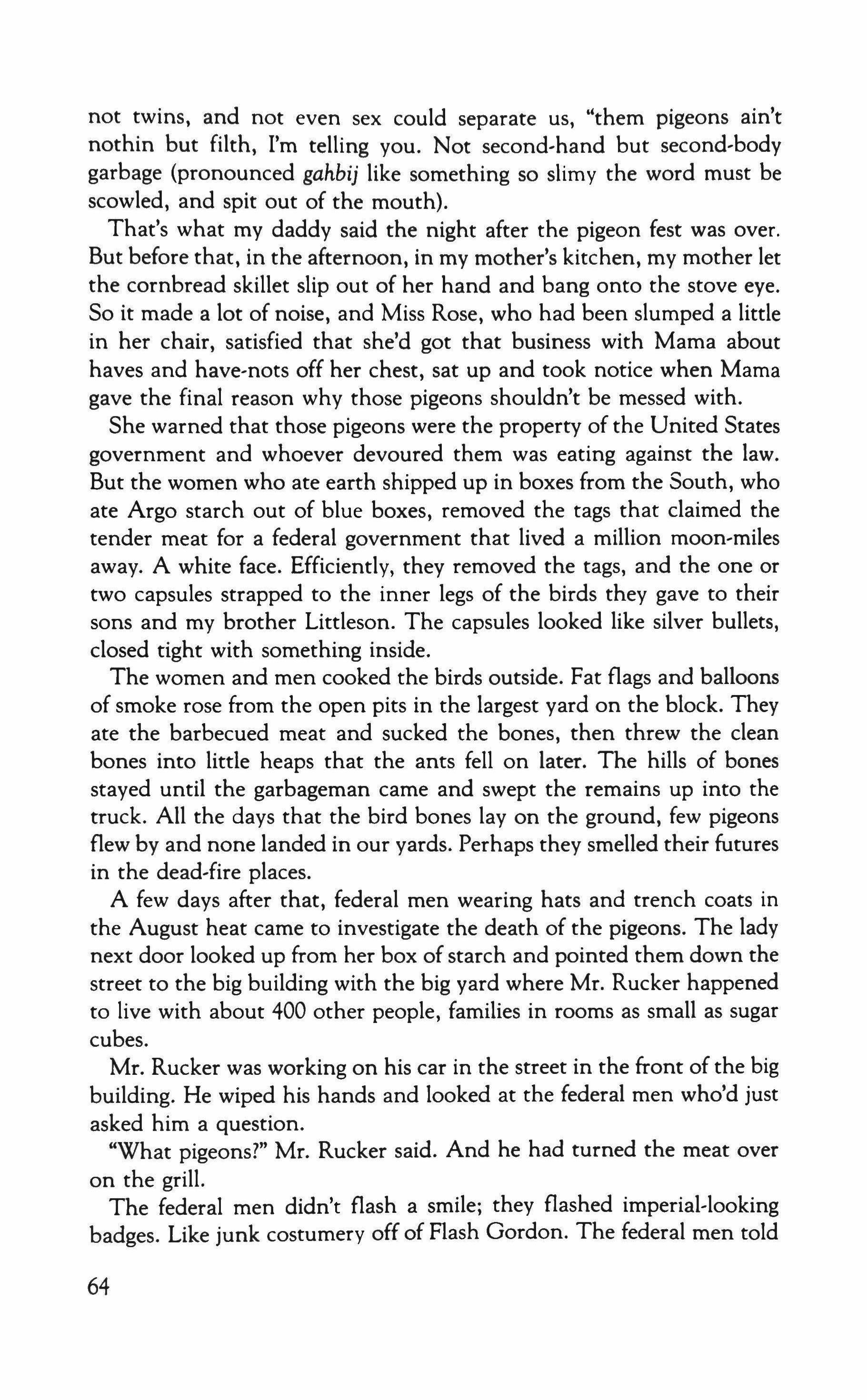
not twins, and not even sex could separate us, "them pigeons ain't nothin but filth, I'm telling you. Not second-hand but second-body garbage (pronounced gahbij like something so slimy the word must be scowled, and spit out of the mouth).
That's what my daddy said the night after the pigeon fest was over. But before that, in the afternoon, in my mother's kitchen, my mother let the cornbread skillet slip out of her hand and bang onto the stove eye. So it made a lot of noise, and Miss Rose, who had been slumped a little in her chair, satisfied that she'd got that business with Mama about haves and have-nets off her chest, sat up and took notice when Mama gave the final reason why those pigeons shouldn't be messed with.
She warned that those pigeons were the property of the United States government and whoever devoured them was eating against the law. But the women who ate earth shipped up in boxes from the South, who ate Argo starch out of blue boxes, removed the tags that claimed the tender meat for a federal government that lived a million moon-miles away. A white face. Efficiently, they removed the tags, and the one or two capsules strapped to the inner legs of the birds they gave to their sons and my brother Littleson. The capsules looked like silver bullets, closed tight with something inside.
The women and men cooked the birds outside. Fat flags and balloons of smoke rose from the open pits in the largest yard on the block. They ate the barbecued meat and sucked the bones, then threw the clean bones into little heaps that the ants fell on later. The hills of bones stayed until the garbageman came and swept the remains up into the truck. All the days that the bird bones lay on the ground, few pigeons flew by and none landed in our yards. Perhaps they smelled their futures in the dead-fire places.
A few days after that, federal men wearing hats and trench coats in the August heat came to investigate the death of the pigeons. The lady next door looked up from her box of starch and pointed them down the street to the big building with the big yard where Mr. Rucker happened to live with about 400 other people, families in rooms as small as sugar cubes.
Mr. Rucker was working on his car in the street in the front of the big building. He wiped his hands and looked at the federal men who'd just asked him a question.
"What pigeons?" Mr. Rucker said. And he had turned the meat over on the grill.
The federal men didn't flash a smile; they flashed imperial-looking badges. Like junk costumery off of Flash Gordon. The federal men told
64

Mr. Rucker that the pigeons had been the property of the United States government. He and all his neighbors could be imprisoned for destroying them.
Mr. Rucker said again, "What pigeons?" He aimed his rancid breath at the whitemen and the whitemen stepped back. Then they left walking inside the heat of those coats.
Two days later Mr. Rucker was back in front of the building working on that car. His face was in the belly ofthe car. A police car pulled up. A policeman yelled out the half-raised window. He told Mr. Rucker to move his "broken-down heap" out of the street. Mr. Rucker didn't show his face. A policeman got out of the car. He hitched up his gun and billy club when he hitched up his pants so the pants would grab his crotch.
The policeman tapped Mr. Rucker on the shoulder. He drew his head out of the bowels of the car, a "What now?" look on his face. The officer stood before him with his hand on his holster like John Wayne. He said, "I said move this shit out of the street."
Mr. Rucker said, "Shit."
Children are Nature's all-seeing journalists. There we stood observing at the closest range. We weren't sure if Mr. Rucker said "shit" out of defiance or if he was simply repeating the policeman's name for his raggedy car.
The whiteman took his word as challenge. He hauled Mr. Rucker by the back of his neckline. He threw him against the side of the car. Frisked him roughly. Then the policeman yanked his handcuffs out of his belt and he swung Mr. Rucker around so he could cuff him.
When Mr. Rucker saw the shackles he began to fight. He lashed out at the policeman, his oily knuckles leaving streaks on the whiteman's white face.
Amazed, the officer in the car radioed "officer needs assistance." Then he jumped out of the car into the fray.
We journalists became war correspondents witnessing the carnage and recording news briefs in our memories.
The second officer had his nightstick knocking Mr. Rucker in the head, while Mr. Rucker screamed, "Naw, naw," through the blood in his mouth. His mouth was full of blood like he'd taken a big swallow of a thick berry drink. "Goddamn you, bastard," he said, and blood with teeth in it trickled out of his mouth.
The two policemen wrestled him to the ground, heaving his hands behind his neck. The two men said in one voice, "Don't be cussin in front of these kids, motherfucker." "Stop this bullshit."
Mr. Rucker kept resurrecting himself half-way, Each time he tried they
65

called him "nigger." Like they were using "nigger" to push him into the earth. Nigger was everywhere, even in the sound of the siren on the paddy wagon that pulled up.
More sad cursing through blood in the mouth. The knots of Mr. Rucker's head seemed to rise under his kinky hair. Blood was in his eye. I had begun to whimper. And Littleson said, "Quit it! Quit it! You better stop!" But the policemen didn't listen.
They tossed Mr. Rucker like he was a bushel of rotten potatoes into the wagon. He rolled on the floor, insensible, but still rising up. The only thing he could lift was his head. So his head was resisting arrest.
The policeman turned to the cluster of cringing faces-wide, consuming eyes, potential mouths, and nostrils that could flare out. One policeman said, "You kids, get away from here. Move em out. Go home."
Then they drove away and left us in a thick silence.
On the way home, Littleson and I met a pigeon strolling along the curb. Littleson threw a pebble at the bird and hit him on his side just as it raised its wings and took to the air.
Grown people blamed the pigeons too. They said the Law had reached its hand from Washington, D.C., and the F.B.1. had fingered Mr. Rucker as trouble and sent the local authorities to smash him under their thumb.
Caroline said she had known that the eating of pigeon flesh would bring nothing good to any of us after our bellies were filled then halfempty again. Even those of us who had not eaten but had witnessed would fall under the luck. I believed what I was told and what I had seen. Pools of pigeons at the bases of statues downtown parted without blinking for the whitepeople who walked right on through. The pigeons could elevate themselves to the highest skyscraper and then swim downward into sewers without blinking those red eyes. The pigeons could make blood berry fill a man's mouth, and molehills of misery rise around his head like a crown of thorns.
Over the years I have offered them sacrifices, tossing torn bits ofbread down across the curb. But none of my offerings are enough.
After Essie was raped by Silk, she used to cry for her mama to move them away from the Homes. When the elevator wasn't working, she'd have to face those stairs, again stand in the door to the cavern that led up to pain beyond pain, a pressed-down feeling that surged up in her. She would wander nervous and agitated by the mailboxes and wait for a group of children to come galloping in from school or play; she would wait for women loaded down with brown paper sacks of groceries, the
66

smell of slightly tainted meat walking ahead of the laughing and complaining women. Behind the women Essie would climb the dark stairwell. Men, single or in groups, she would not follow. The shadows, the deep rumble of their voices that shook the air behind them in airquakes, the smell of them was too much like Silk, a net she couldn't work her way out of.
The crippled boy who raped Essie and two other girls served a sevenyear sentence for burglarizing an apartment near the lake. The woman, asleep behind those black sleep blinders, woke up to two black boys picking through her jewel box with the spinning ballerina on top spinning to music from Swan Lake. The music of the jewel box and the muffled protests of the woman as Silk and his buddy shoved her, outraged and frightened, into the closet, made up Silk's swan song. His friend left Silk behind and Silk was caught less than a block away from the apartment with a lunch bag full of costume jewelry. The woman who slept behind the blinders kept her precious stones in a safety vault in a downtown bank. So Silk went to jail for stealing fake ice, glass and paste, and sticking a white-looking woman in a closet that was big as a living room; he didn't go for what he did to Essie or the two other girls. One girl named Phillis. The other's name no one would say.
For the time that Silk was in jail, Essie was afraid. All those years mothering Fredonia's babies, rushing to the cry before it became a cry out of one of those sweet, tiny mouths, wiping eyes and behinds and noses and mouths; all those years of studying and doing homework, all those years of fixing dinner and cleaning up on Saturday morning and taking the clothes to the laundromat three blocks away instead of the one in the building because it was too lonely and quiet a place; all those years of looking through the glossy magazines and dreaming, dreaming over the shiny pages of Seventeen and laughing over "Boy, was my face red!" in Calling All Girls, all those years of reading books borrowed from the library and given to her by teachers who told her they saw the intelligence doing somersaults behind her eyes, intelligence to be trained and fed right, by teachers who recognized the wounded beauty of her spirit and believed and made her believe that logic was the surest salve for anything, including the fear; all those years, Essie was afraid.
But her mama, Fredonia, wouldn't move them away.
"She couldn't move us away," Essie says now that we are freshman at Eden, and in FBO and Black and conscious and home during the riots and King is dead. "Of course, Fredonia wouldn't ever tell me she wouldn't move because she couldn't. There was no place to go but a hole in some landlord's wall with mice and roaches running in and out of it,
67
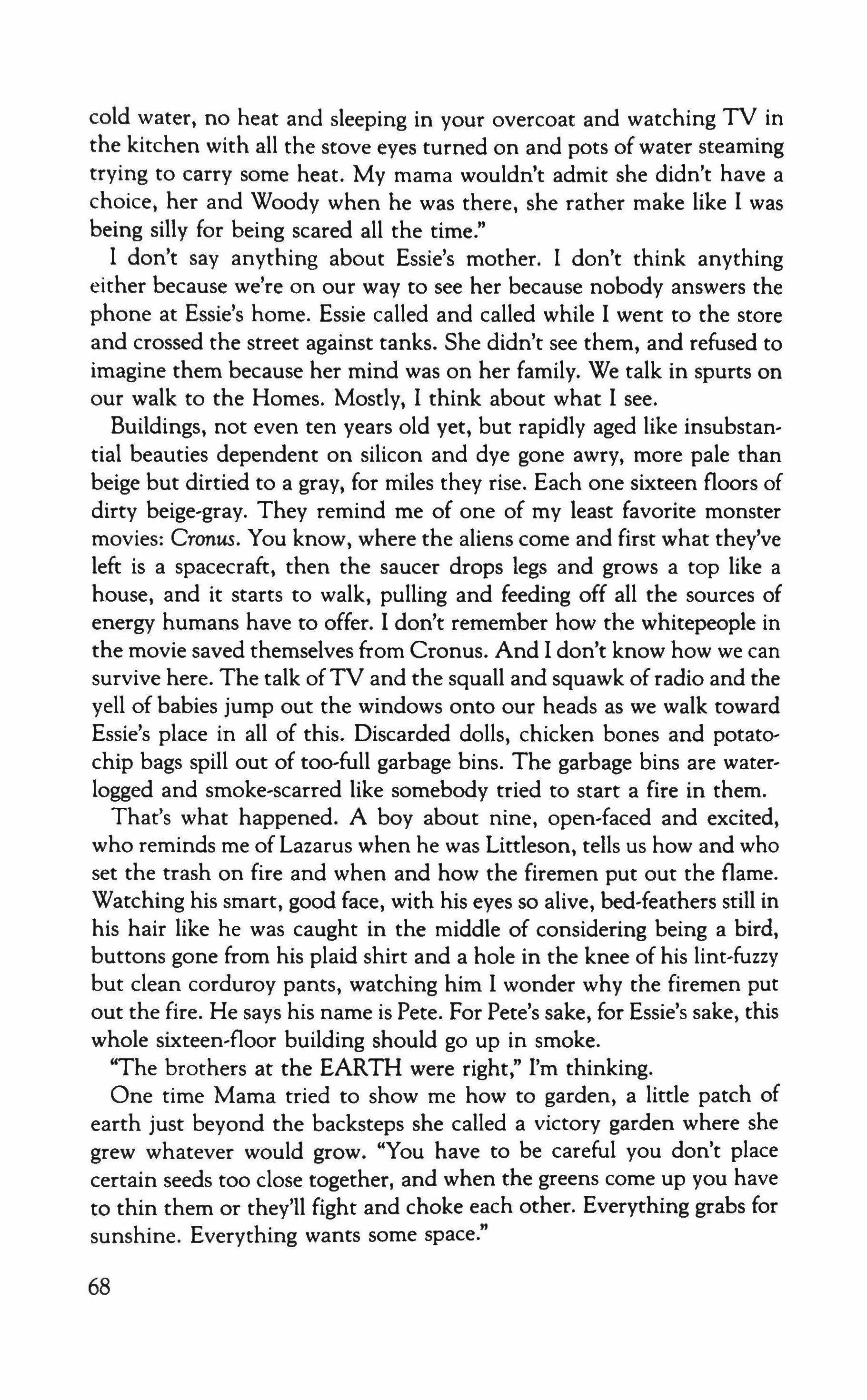
cold water, no heat and sleeping in your overcoat and watching TV in the kitchen with all the stove eyes turned on and pots of water steaming trying to carry some heat. My mama wouldn't admit she didn't have a choice, her and Woody when he was there, she rather make like I was being silly for being scared all the time."
I don't say anything about Essie's mother. I don't think anything either because we're on our way to see her because nobody answers the phone at Essie's home. Essie called and called while I went to the store and crossed the street against tanks. She didn't see them, and refused to imagine them because her mind was on her family. We talk in spurts on our walk to the Homes. Mostly, I think about what I see.
Buildings, not even ten years old yet, but rapidly aged like insubstantial beauties dependent on silicon and dye gone awry, more pale than beige but dirtied to a gray, for miles they rise. Each one sixteen floors of dirty beige-gray. They remind me of one of my least favorite monster movies: Cronus. You know, where the aliens come and first what they've left is a spacecraft, then the saucer drops legs and grows a top like a house, and it starts to walk, pulling and feeding off all the sources of energy humans have to offer. I don't remember how the whitepeople in the movie saved themselves from Cronus. And I don't know how we can survive here. The talk ofTV and the squall and squawk of radio and the yell of babies jump out the windows onto our heads as we walk toward Essie's place in all of this. Discarded dolls, chicken bones and potatochip bags spill out of too-full garbage bins. The garbage bins are waterlogged and smoke-scarred like somebody tried to start a fire in them.
That's what happened. A boy about nine, open-faced and excited, who reminds me of Lazarus when he was Littleson, tells us how and who set the trash on fire and when and how the firemen put out the flame. Watching his smart, good face, with his eyes so alive, bed-feathers still in his hair like he was caught in the middle of considering being a bird, buttons gone from his plaid shirt and a hole in the knee of his lint-fuzzy but clean corduroy pants, watching him I wonder why the firemen put out the fire. He says his name is Pete. For Pete's sake, for Essie's sake, this whole sixteen-floor building should go up in smoke.
"The brothers at the EARTH were right," I'm thinking.
One time Mama tried to show me how to garden, a little patch of earth just beyond the backsteps she called a victory garden where she grew whatever would grow. "You have to be careful you don't place certain seeds too close together, and when the greens come up you have to thin them or they'll fight and choke each other. Everything grabs for sunshine. Everything wants some space."
68
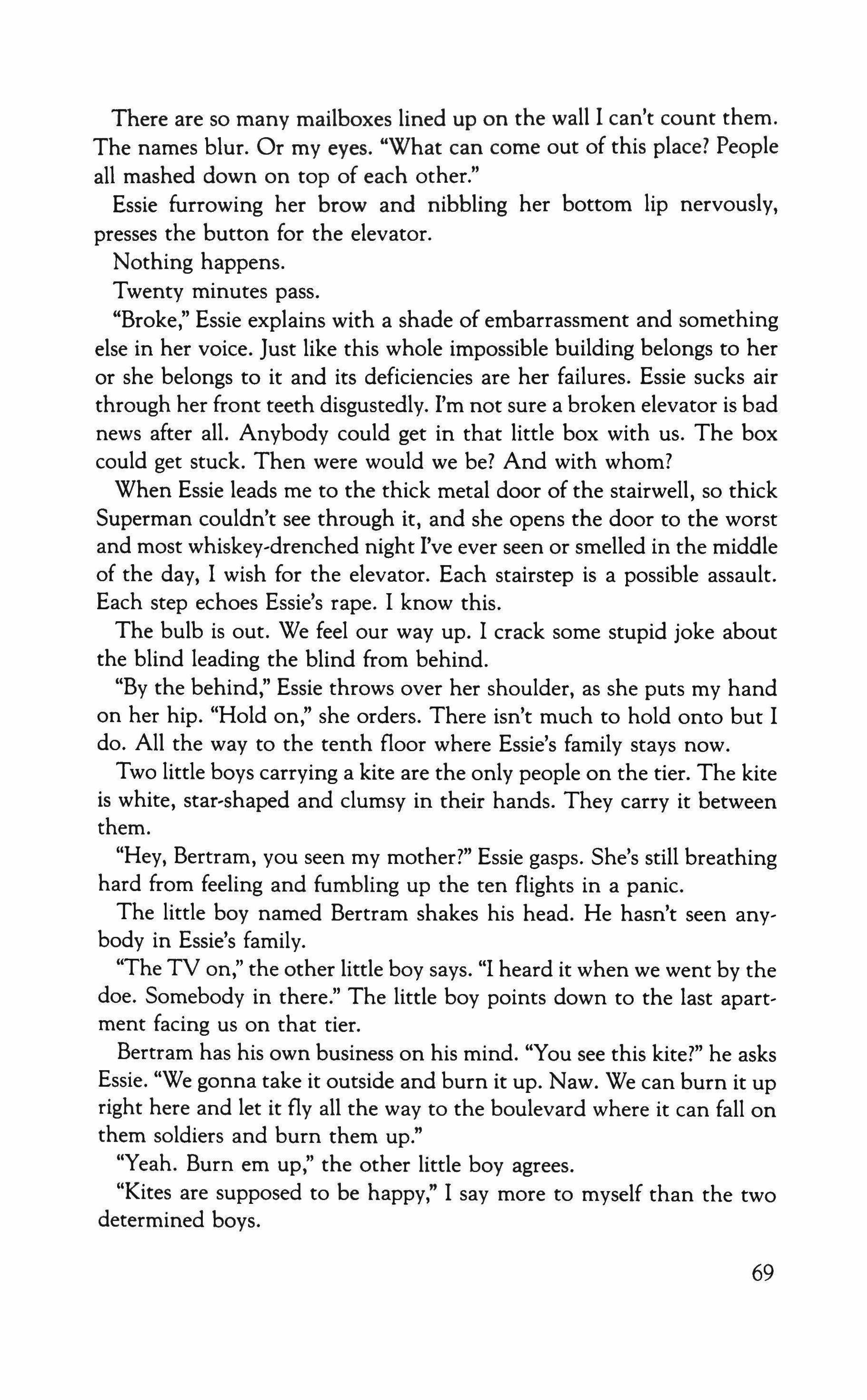
There are so many mailboxes lined up on the walll can't count them. The names blur. Or my eyes. "What can corne out of this place? People all mashed down on top of each other."
Essie furrowing her brow and nibbling her bottom lip nervously, presses the button for the elevator.
Nothing happens.
Twenty minutes pass.
"Broke," Essie explains with a shade of embarrassment and something else in her voice. Just like this whole impossible building belongs to her or she belongs to it and its deficiencies are her failures. Essie sucks air through her front teeth disgustedly. I'm not sure a broken elevator is bad news after all. Anybody could get in that little box with us. The box could get stuck. Then were would we be? And with whom?
When Essie leads me to the thick metal door of the stairwell, so thick Superman couldn't see through it, and she opens the door to the worst and most whiskey-drenched night I've ever seen or smelled in the middle of the day, 1 wish for the elevator. Each stairstep is a possible assault. Each step echoes Essie's rape. I know this.
The bulb is out. We feel our way up. I crack some stupid joke about the blind leading the blind from behind.
"By the behind," Essie throws over her shoulder, as she puts my hand on her hip. "Hold on," she orders. There isn't much to hold onto but I do. All the way to the tenth floor where Essie's family stays now.
Two little boys carrying a kite are the only people on the tier. The kite is white, star-shaped and clumsy in their hands. They carry it between them.
"Hey, Bertram, you seen my mother?" Essie gasps. She's still breathing hard from feeling and fumbling up the ten flights in a panic.
The little boy named Bertram shakes his head. He hasn't seen anybody in Essie's family.
"The TV on," the other little boy says. "I heard it when we went by the doe. Somebody in there." The little boy points down to the last apartment facing us on that tier.
Bertram has his own business on his mind. "You see this kite?" he asks Essie. "We gonna take it outside and burn it up. Naw. We can burn it up right here and let it fly all the way to the boulevard where it can fall on them soldiers and burn them up."
"Yeah. Burn ern up," the other little boy agrees.
"Kites are supposed to be happy," I say more to myself than the two determined boys.
69

They ignore my cue. "When I get big I'm gonna drive a airplane and I'm gone drop it on them soldiers and set them on fire."
"Why don't you save your pretty kite for a nice day?" I say while I watch Essie move to the door at the end of the tier and watch her knock.
The little boy named Bertram is tempted by my suggestion but only for a second. He is more determined than ever to set the kite on fire and drop it on whitepeople down below. Even though, right now, there are no whitepeople down below they are in his scenario.
"The problem is," I say, "if you set it on fire and throw it over the balcony it's not going to fly far and more than likely it's going to blow back in on somebody on the seventh floor."
"We gonna burn them up too," the other little boy says.
At the end of the tier, the door to Essie's home opens and a thin little girl stands on one foot like a skinny-legged bird. She's got a pleated skirt that looks like an old-fashioned cheerleader's outfit and she's twirling a baton. Essie hollers her name and I tear myself away from the junior bombadier-arsonists and go where my friend has gone.
"So this is where Essie Witherspoon comes from!" a tiny part of me takes time to exult as I lay eyes on the bare-walled flat, bare except for a flurry of photos rising from the top of and all up behind the TV. The TV top like an altar. They are school photos of the children and party photos of Fredonia and Woodrow Witherspoon and one photo of Fredonia and a man Essie calls Mr. Nobody who lived with Miss Fredonia for a time when she and Mr. Woody were broken up. Even though they're divorced now they're still joined and Essie says her mother tells Mr. Woody the picture stays there as a reminder that he has been replaced. "They waitin in the wings," Essie says her mama says just before the argument begins or ends.
"Maggie, this is my little sister Moneeka. That's a cross between Monica and Monique from Fredonia's french-fried phase. Moneek, this my friend Maggie. She my roommate at college."
"You go to college too?" the little girl with the baton oohs.
"Where is everybody?" Essie asks.
"They went to jail," Moneeka tosses over her shoulder as she tosses the baton toward the awful concrete ceiling and waits for it to fall into her hands like marvelous good luck she knows is on its way.
"Put that stick down and tell me what happened, Moneeka Fay Witherspoon!" Essie shrieks and snaps at the same time.
The baton slaps into Moneeka's palm. "Ernest got arrested for stealing a ham. And Mama and Daddy Woody went to get him out of jail.
70

Everybody else went over to Auntie Fay's house to stay except for me. I wasn't there when they left so I got left. I was at practice. We going to be in the parade."
"Yeh. Yeh. Yeh," Essie hushes and hurries her at the same time.
"What police station Fredonia them go to?"
"Essie, you know." Moneeka sounds exasperated and Essie looks at me like if I wasn't here she'd have that little girl by her hair and that baton upside her head.
"Martin Luther King dead," Moneeka says, her voice sounds too old for a nine-year-old girl in a cheerleading outfit, twirling a baton. Her eyes open wide in conspiratorial surprise.
"Just like we didn't know, Moneeka," Essie says.
"When we be in the parade in August we gone be real good for Reverend Doctor Martin Luther King, jr., and for everybody."
Moneeka is so earnest and sweet with her promise a lump jumps in my throat. And I stare around the room while Essie uses the phone. She calls over to her Aunt Fay's. The rest of the children are there.
"No, I wasn't up in that building, ma'am. It was some of the other Black students." Essie looks me dead in the eyes while she's whispering this reassuring lie over the phone to her grandmother. Looking at me while she's doing it is like crossing her fingers, negating the sin.
Moneeka puts her hand on her hip like a little old sassy woman. "Oooh, Essie. You told Auntie Fay a big old story," she says when Essie hangs up the receiver. The door to the apartment opens and a woman in a shiny red wig comes in with a hot chip on her shoulder. She starts with Essie.
"What lie you been tellin?" Fredonia Witherspoon greets her daughter instead of saying hello. "One in jail for stealing, another one want to be a liar. A liar and a thief."
A big hulk of a man comes in the door behind her and she points to him. "Poor man. Rich man. Poor man. Beggerman. Thief. Doctor. Lawyer. Indian Chief. All that shit to choose from and here come a liar a thief and a po man in one household."
So this is the legendary Fredonia. Legend enough to wear a Blackgama mink coat, like one of those women in the magazines that say "What becomes a legend most?" "Money," we say when we turned to that page. Fredonia takes off her well-worn imitation leather jacket and throws it over the back of a kitchen chair. Then she sits down.
She's out of her run-over heels and rubbing the balls of her feet. She squints at Essie. She squints at me. "Light me a cigarette, uh, Moneeka. And don't wet it all up."
71

Moneeka drops her baton into a chair and gets a cigarette from Fredonia's big purse and lights it at the stove eye. The big man who must be Woody touches Essie on the shoulder, he nods at me, then he goes through a bedroom door and into a deep masculine silence.
Fredonia has her cigarette now. It's dangling out the side of her mouth as she continues to rub her feet.
"Fredonia," Essie starts. "You know I told you about my roommate Magdalena Grace. This is she. She lives not too far from here. We didn't ever see each other before we got to the university though."
Miss Fredonia looks at me. "How are you?" she says. It's not a question. But it's not a flat statement either, because she's not out-and-out rude. Just in a real bad mood, which from what Essie tells me she been in for the last eighteen years. She's thirty-five years old.
The first time I remember seeing or knowing my mother Caroline she was thirty-five. Young and laughing and pregnant with somebody. I must have been five or six and I was standing up under her elbow while she sat at the kitchen table snapping green beans. The sunlight sprawled all over everything, picking up the freckles in my mama's face, the red highlights still hiding in the black and new gray of her hair. Even the sun was in love with Caroline. I could not be close enough to her.
"Maggie," my mother smiled at me, "How would you like to have a baby sister or brother?" I jumped up and down, shaking the arm that went up and down like a lever when she snapped the green beans. My mama was thirty-five then and she was young and laughing with the sun in love with her. My mama was thirty-five then and she was beginningless, Creatrix, matrix who pulled babies out of the ethers of her laughter and kissed a wound to quiet.
Fredonia Witherspoon is thirty-five and she is hard-faced, harshmouthed, panic-eyed and hiding under a wig. An old-young woman, jealous as a demon of her daughter's youth, growling like a gargoyle at the gates of Essie's tomorrows.
"You thought I wasn't going to say nothing to you about you being all up in that building, didn't you?" the gargoyle growls suddenly, shooting a quick stream ofcigarette smoke out of her mouth behind the question. "I ain't forget nothing. I guess if that buzzard hadna kilt King and scared the whitepeople to death thinking what the niggers going to do, you still be up in that building with them other fools."
"I guess so," Essie says.
"You look intelligent." Miss Fredonia glares at me now as if to say my looks have deceived her.
"If you all want to imprison yourselves you all can bring your black
72

asses down here to these projects and try to live. Take over this shit talking about taking over somebody's building." She's out of the chair and tapping her foot. "That's got to be the stupidest thing I ever heard of," she shakes her head and dips it at the same time, like she's got Parkinson's disease, an aggressive case.
"As a matter of fact, Madame Essie and Maggie, I'm busting loose out of this prison tonight. I am going outside and find me something to laugh about for a change. Do you hear me? I'm laughing. Huh!" She is at the door to a well-stuffed hall closet, pulling out dresses that don't look bad. Dramatic and different. Essie's told me Fredonia is a wonderful seamstress, even if Essie can't sew a lick. Essie's grandmother was always after Fredonia to try to do something for herself with "the gift of her hands." Fredonia makes dresses to party in.
Bathwater is running and I am sitting in the room they call the living room. Let's just say it's a communal existing room. I search for knick, knacks of Essie. There she is in a small photo on top of the TV. A little golden girl with two long braids that dive past her shoulders, and a nostalgic grin at that age. Nostalgia for something that should have been. This concrete room makes me feel heavy inside. Mrs. Wither, spoon is keeping up a steady monologue from the bathroom. About the Mayor commanding the police to shoot to kill any looters. About Ernest over her sister's house because she didn't want him back in this building for a while. At least not till curfew was over. About the curfew for everybody under eighteen.
"You better have a good reason to be out or the police will arrest your ass. They lockin up Negroes wholesale," Mrs. Fredonia Witherspoon yells from the bathroom. "Essie, you and your friend can stay here with Moneeka till I get back. Maggie might wanna spend the night. If it's curfew time by the time I get back. Woody, you going to take me on that run?"
Woody mumbles something and all I hear is that old record about curfew time in my head, "Night owl strolling down the street about the break of day. Night owl strolling boy what you think yo mama goin say. She say boy you must be out your mind. Ain't you heard of curfew time. 00000, 0000, night owl."
Mama and Madaddy will have a fit if I'm out after curfew over in the Homes while riots keep breaking out and the National Guard goes cruising down the boulevard like the Germans moving into France. Madaddy has held off some because Essie was at our house and so much was going on in the world. Staying out after curfew would be just the
73

thing to set him and Mama off. A real chance to give me the grief they don't know what else to do with.
Nervously I sit in the existing room of Essie's project apartment. Listening to the justly infamous Fredonia Witherspoon screaming through the bubbles in her bath about Moneeka twirling that gotdamn baton in the house and breaking that furniture she's still paying Brothers for. You know the ones. " loves me. loves me. Brothers. Oh, they love me so." "Especially when you paying them incredible interest on that sorry-looking merchandise," Lazarus would say every time that commercial came on.
"Essie, may I use your phone to call home for a minute?" I ask. Wordlessly she brings it to me. I can tell by the screwed shutness of her mouth ifshe opened it she would cry like a baby. Embarrassed beyond words by her mother. By the simple ugliness of the apartment. The cold furies racing between her and Fredonia embarrass me, as bad as when I'm in the company of Aint Kit and Bay. Moneeka sits hunched in a plasticwrapped chair, gazing at the television set. People on TV are crying. There is a special on called "Assassination America: Killers of the Dream." They show clips from the assassination of John F. Kennedy. They mention Medgar Evers. And throw in Malcolm X. Then they end on Dr. King. By this time Fredonia, in bra and half-slip, is in the room rubbing deodorant in a fuzzy armpit.
She says, "I wonder who they going to blow away next? These folks ain't playing out there."
She watches me as I dial the number to home. "Essie said I could call home, Mrs. Witherspoon. I hope it's O.K."
"Just so long as you ain't from Albuquerque, New Mexico, or somewhere." She's rubbing under the other fuzzy armpit now, heading for the closed door, behind which is the stone-quiet Woody.
Anne Perpetua answers the phone and she says Mama's at a memorial mass for Martin Luther King and Madaddv's still at work. "You better get here, Maggie," she orders with the complete authority some little kids think they have before school and stuff knocks that autonomy out of them. "You know you can't be out after no curfew. The Mayor going to shoot to kill you."
"Tell Mama I'm waiting on a ride," I lie. "Back to school," I lie some more.
"You better not take no building again, Maggie. Madaddy say you gone to get it."
"O.K. O.K.," I say. Then I hang up.
Anne Perpetua has a nose for news and a mouth for judgment, full of
74

what I better not do. People are always telling her what she better not do. She gives orders in self-defense. To protect her personal authority against a constant barrage of commandments.
Everybody has something "to serve and protect," even if it's just pro' tection against the fact; like posting a sentry at a hurt or a fear. Guard, ing a wound against scab-picking eyes.
Now I know what Essie tries to hide from some of the most bourjie members in FBO, the ones who talk most cool and stand and walk like jazz musicians past,high on music or drugs. Hand and head movements in a kind of syncopated slow-motion. Their collegiate vocabularies sequined with dig, dig up, man, Jim, listen here, like hey and shit (the pronunciation squandered over three syllables, three octaves). The children of the middle class are the most militantly poor. They do a lot of what Miss Rose used to call po-mouthing. Now Miss Rose would shake her head to see the offspring of the new and old Black middle class assuming the dress and elegant musical slouch of the least of our brethen.
Essie is the child of those whose costumes they jump into. But she'd never admit it to too many people. We all know these class games are pretend and the worst thing she could be on campus is who she is.
Essie (I can see this now as she moves around the would-be living room tidying up, then putting empty Budweiser cans in the grocery bags turned garbage bags in the too'tiny kitchen that is not really separate from the so-called living room) must hide these rented stone rooms. Or be assigned here forever by herself.
I can't see a thing out of the big window. It is as if someone has taken black paint and painted impenetrable night over the view. The lights are out on what is called the balcony but is a tier. And the balcony resonates with the heavy patter of gvm-shoed children running like swift imps. Names they call each other punctuate the blackened night air. This is a night that has no beginning. This is a night that has no end.
It's all so unnameably sad I begin to shake. I want to do something, something more than sit in the classrooms of Eden in touch with the prolific foliage. I want to do something more than sit in FBO meetings and squabble and plot. I want to do more than break glass and come away with a piecemeal wardrobe, a few pounds of meat, or bottles of Canadian Mist, like the brothers I've seen on TV. I want to do some, thing more than break the lock on the TV repair shop and come out with a black-and-white color set, the picture tubes thick with ghosts. More than a brief Molotov cocktail in the window of a patrol car or jeep, though that would feel good and make a short, hot light.
75
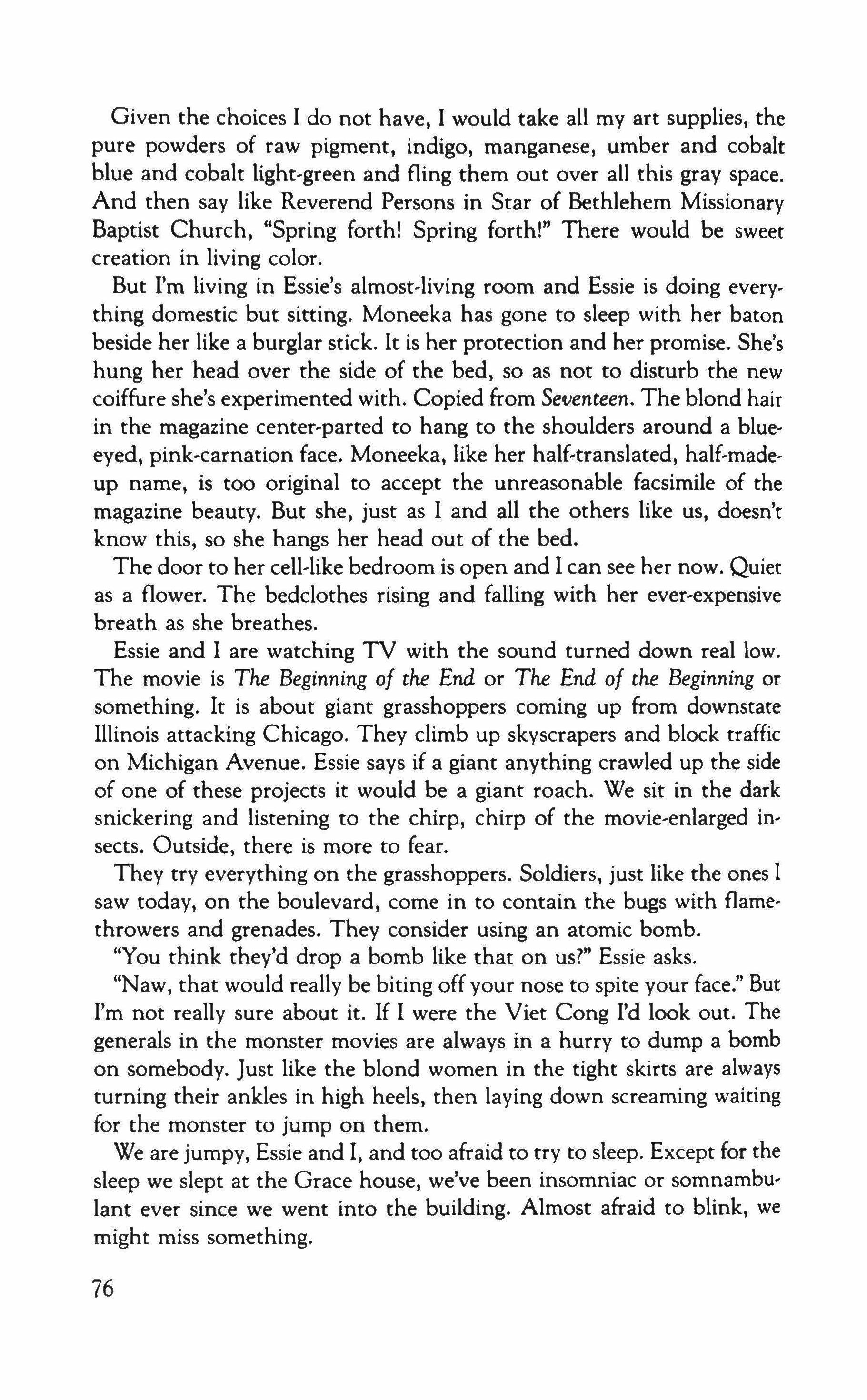
Given the choices I do not have, I would take all my art supplies, the pure powders of raw pigment, indigo, manganese, umber and cobalt blue and cobalt light-green and fling them out over all this gray space. And then say like Reverend Persons in Star of Bethlehem Missionary Baptist Church, "Spring forth! Spring forth!" There would be sweet creation in living color.
But I'm living in Essie's almost-living room and Essie is doing everything domestic but sitting. Moneeka has gone to sleep with her baton beside her like a burglar stick. It is her protection and her promise. She's hung her head over the side of the bed, so as not to disturb the new coiffure she's experimented with. Copied from Seventeen. The blond hair in the magazine center-parted to hang to the shoulders around a blueeyed, pink-carnation face. Moneeka, like her half-translated, half-madeup name, is too original to accept the unreasonable facsimile of the magazine beauty. But she, just as I and all the others like us, doesn't know this, so she hangs her head out of the bed.
The door to her cell-like bedroom is open and I can see her now. Quiet as a flower. The bedclothes rising and falling with her ever-expensive breath as she breathes.
Essie and I are watching TV with the sound turned down real low. The movie is The Beginning of the End or The End of the Beginning or something. It is about giant grasshoppers coming up from downstate Illinois attacking Chicago. They climb up skyscrapers and block traffic on Michigan Avenue. Essie says if a giant anything crawled up the side of one of these projects it would be a giant roach. We sit in the dark snickering and listening to the chirp, chirp of the movie-enlarged insects. Outside, there is more to fear.
They try everything on the grasshoppers. Soldiers, just like the ones I saw today, on the boulevard, come in to contain the bugs with flamethrowers and grenades. They consider using an atomic bomb.
"You think they'd drop a bomb like that on us?" Essie asks.
"Naw, that would really be biting off your nose to spite your face." But I'm not really sure about it. If I were the Viet Cong I'd look out. The generals in the monster movies are always in a hurry to dump a bomb on somebody. Just like the blond women in the tight skirts are always turning their ankles in high heels, then laying down screaming waiting for the monster to jump on them.
We are jumpy, Essie and I, and too afraid to try to sleep. Except for the sleep we slept at the Grace house, we've been insomniac or somnambulant ever since we went into the building. Almost afraid to blink, we might miss something.
76

"Let's call, Leona," I suggest. It's late but Leona has her own phone and we know she must be up watching the end of the movie. The scientists have discovered that the grasshoppers may be lured by sound. So they hook up some loud mating music to a high building and trick the bugs into the Chicago River.
"Did you see that?" Leona hollers into the receiver. "You know them bugs wasn't nothing but niggers. Falling for that old loud music!"
When the movie ends, after the man and woman kiss, Leona tells us about her father's store. Things are worse than he thought at first. Nothing can be reclaimed from the wreckage.
"He's real upset," Leona says. "He's mad too, but he's more hurt than anything. He does a lot of good for the community. He really does, but you know."
Today Leona went down with her father to his restaurant; they swept up ashes and glass. Waded through a pool of mambo sauce thick as blood. "Remember when that fool threw that mambo sauce on that boy, Hamla's cousin, at Roscoe's?" Leona says.
"I wonder if they burned Roscoe's," Essie says. Her face next to mine on the phone.
Leona says Roscoe was posted at the barbecue house door like Governor Wallace at the schoolhouse door. He was heavily armed. That's real funny to us. We make fun ofeverybody because everybody's hurting and we don't know what side we're on. When we can color everything black and white it's easy.
It's past midnight and Leona is too tired to laugh anymore. She says her father will give us a ride back to school tomorrow, which is today after the sun comes back.
Next, I call home. My father's at work, and my mother's angry with me.
"I'll talk to you when you get home, young lady," she says quietly. "I can't get home. It's curfew time."
"Why did you stay over in those projects until curfew time, Magdalena?" Unlike my father my mother knows my name and it doesn't sound so nice now.
I don't answer her question. My mouth is full of tears. Why'd I wait so late to call? I can't think of the lie I told Anne Perpetua earlier.
Mama is short, "Let me see if I can get Honeybabe or Junior or somebody to come get you. You be ready when they get there."
"Bye," we both say like we're sick oftalking to each other. Essie doesn't look at me anymore after she looks at me once. I am misery personified,
77
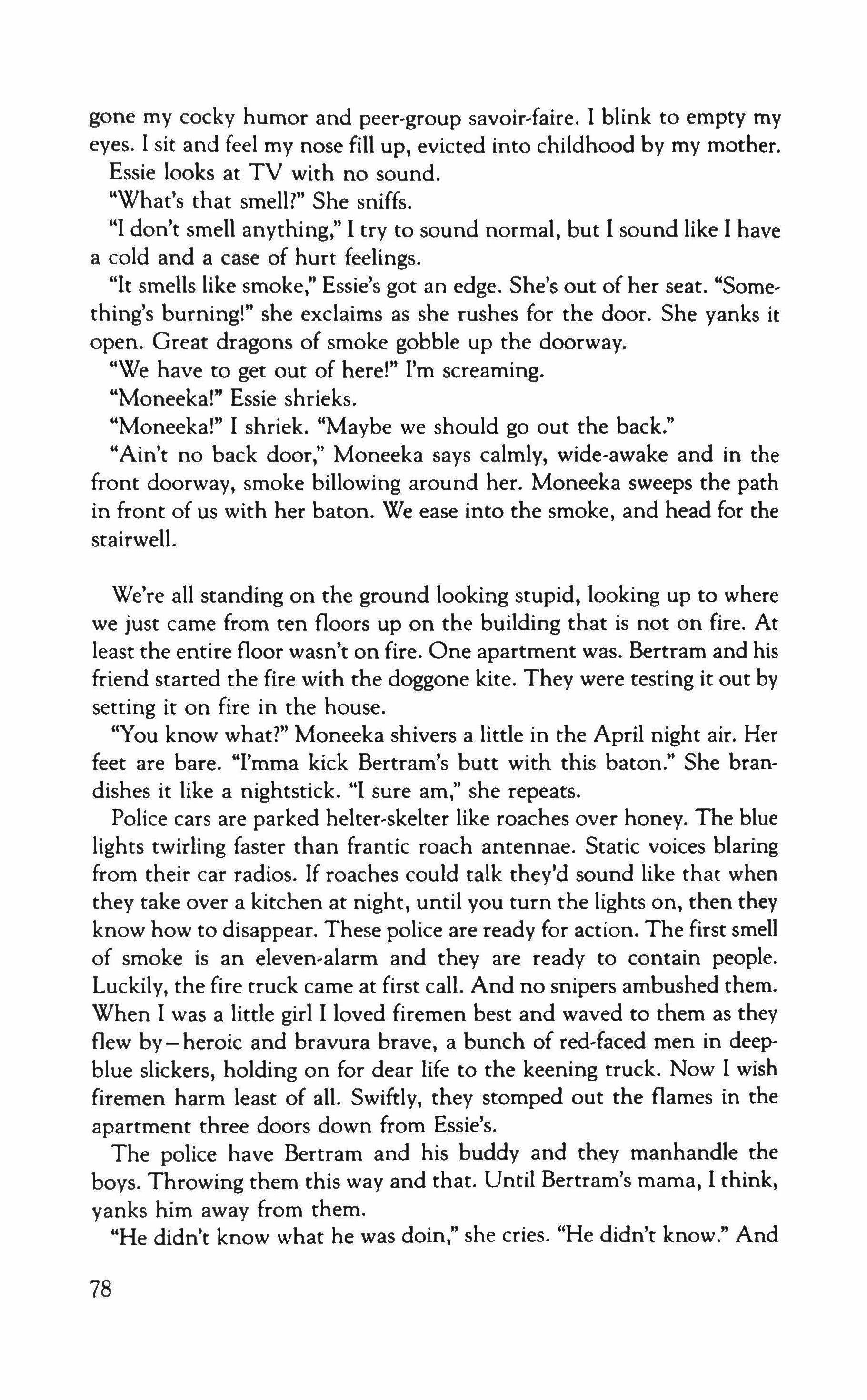
gone my cocky humor and peer-group savoir-faire. I blink to empty my eyes. I sit and feel my nose fill up, evicted into childhood by my mother.
Essie looks at TV with no sound.
"What's that smell?" She sniffs.
"I don't smell anything," I try to sound normal, but I sound like I have a cold and a case of hurt feelings.
"It smells like smoke," Essie's got an edge. She's out of her seat. "Something's burning!" she exclaims as she rushes for the door. She yanks it open. Great dragons of smoke gobble up the doorway.
"We have to get out of here!" I'm screaming.
"Moneeka!" Essie shrieks.
"Moneeka!" I shriek. "Maybe we should go out the back."
"Ain't no back door," Moneeka says calmly, wide-awake and in the front doorway, smoke billowing around her. Moneeka sweeps the path in front of us with her baton. We ease into the smoke, and head for the stairwell.
We're all standing on the ground looking stupid, looking up to where we just came from ten floors up on the building that is not on fire. At least the entire floor wasn't on fire. One apartment was. Bertram and his friend started the fire with the doggone kite. They were testing it out by setting it on fire in the house.
"You know what?" Moneeka shivers a little in the April night air. Her feet are bare. "I'mma kick Bertram's butt with this baton." She brandishes it like a nightstick. "I sure am," she repeats.
Police cars are parked helter-skelter like roaches over honey. The blue lights twirling faster than frantic roach antennae. Static voices blaring from their car radios. If roaches could talk they'd sound like that when they take over a kitchen at night, until you turn the lights on, then they know how to disappear. These police are ready for action. The first smell of smoke is an eleven-alarm and they are ready to contain people. Luckily, the fire truck came at first call. And no snipers ambushed them. When I was a little girl I loved firemen best and waved to them as they flew by-heroic and bravura brave, a bunch of red-faced men in deepblue slickers, holding on for dear life to the keening truck. Now I wish firemen harm least of all. Swiftly, they stomped out the flames in the apartment three doors down from Essie's.
The police have Bertram and his buddy and they manhandle the boys. Throwing them this way and that. Until Bertram's mama, I think, yanks him away from them.
"He didn't know what he was doin," she cries. "He didn't know." And
78
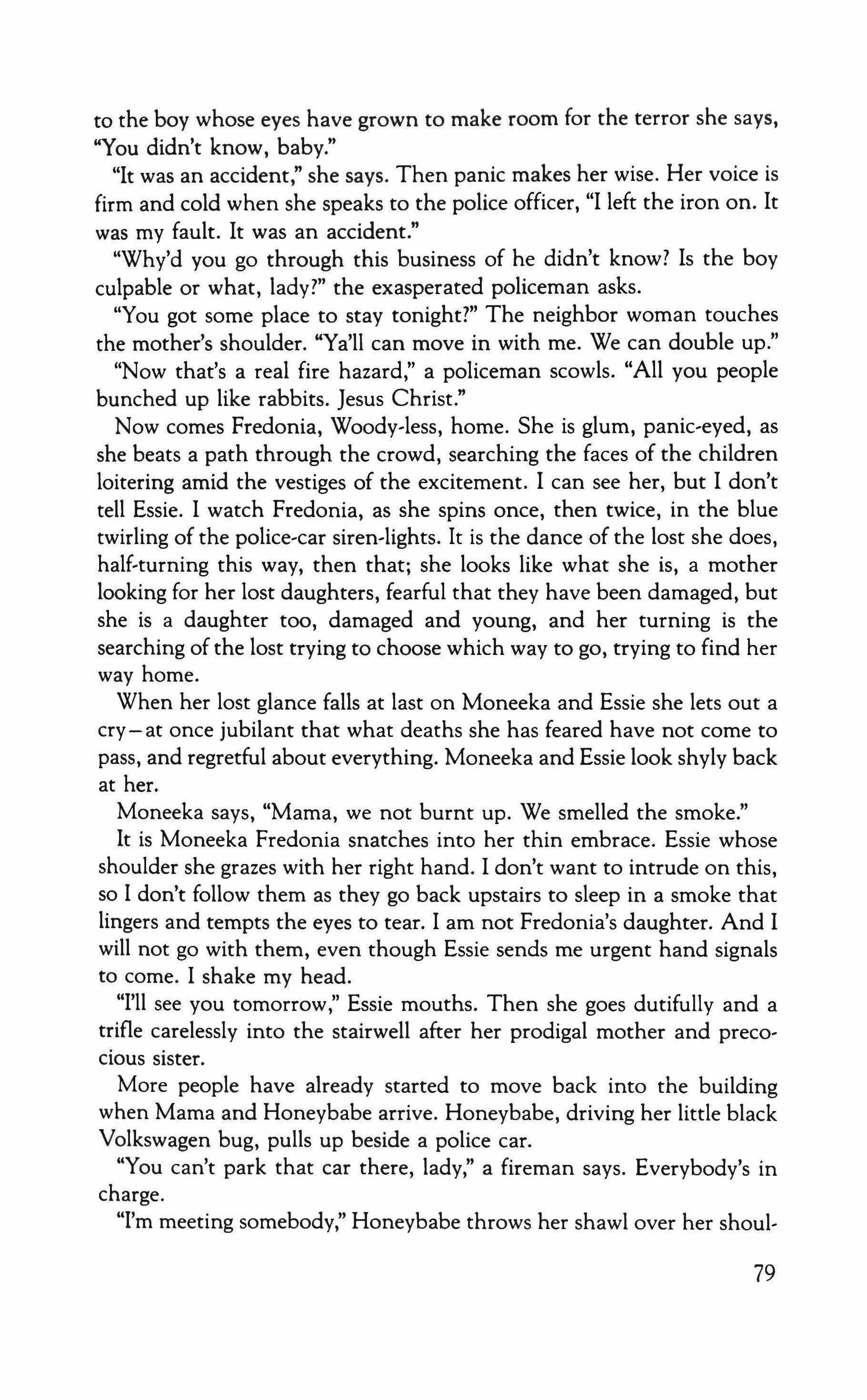
to the boy whose eyes have grown to make room for the terror she says, "You didn't know, baby."
"It was an accident," she says. Then panic makes her wise. Her voice is firm and cold when she speaks to the police officer, "I left the iron on. It was my fault. It was an accident."
"Why'd you go through this business of he didn't know? Is the boy culpable or what, lady?" the exasperated policeman asks.
"You got some place to stay tonight?" The neighbor woman touches the mother's shoulder. "Ya'll can move in with me. We can double up."
"Now that's a real fire hazard," a policeman scowls. "All you people bunched up like rabbits. Jesus Christ."
Now comes Fredonia, Woody�less, home. She is glum, panic-eyed, as she beats a path through the crowd, searching the faces of the children loitering amid the vestiges of the excitement. I can see her, but I don't tell Essie. I watch Fredonia, as she spins once, then twice, in the blue twirling of the police-car siren-lights. It is the dance of the lost she does, half-turning this way, then that; she looks like what she is, a mother looking for her lost daughters, fearful that they have been damaged, but she is a daughter too, damaged and young, and her turning is the searching of the lost trying to choose which way to go, trying to find her way home.
When her lost glance falls at last on Moneeka and Essie she lets out a cry-at once jubilant that what deaths she has feared have not come to pass, and regretful about everything. Moneeka and Essie look shyly back at her.
Moneeka says, "Mama, we not burnt up. We smelled the smoke."
It is Moneeka Fredonia snatches into her thin embrace. Essie whose shoulder she grazes with her right hand. I don't want to intrude on this, so I don't follow them as they go back upstairs to sleep in a smoke that lingers and tempts the eyes to tear. I am not Fredonia's daughter. And 1 will not go with them, even though Essie sends me urgent hand signals to come. 1 shake my head.
"I'll see you tomorrow," Essie mouths. Then she goes dutifully and a trifle carelessly into the stairwell after her prodigal mother and precocious sister.
More people have already started to move back into the building when Mama and Honeybabe arrive. Honeybabe, driving her little black Volkswagen bug, pulls up beside a police car.
"You can't park that car there, lady," a fireman says. Everybody's in charge.
"I'm meeting somebody," Honeybabe throws her shawl over her shoul-
79

ders. Mama sits in the little round-headed car. The blue from the policecar's light splashes across her face. I walk toward the car a little sheepishly. It's the middle of the night and my mother is displeased with me.
After the Africans graduated and went back to their newly independent nations or went to Texas to make money-mammy with their homegovernment-paid-for-degrees, after Charlotte was well on her way to giving birth to her baby instead of a modeling career and went to stay with her aunt who sold God from door to door in a magazine that yelled at people to quit sleeping, Honeybabe got together with Cornelius Chestnutt, her eighth-grade sweetheart. They married in spite of his last name and occupation. He was a career soldier with the United States Army.
Honeybabe went with him to serve his country in Germany and France. She saw Paris and Berlin which Madaddy loved to remember from his days and nights in the Occupation Forces after World War II. Honeybabe was a good Army wife who went everywhere her husband went; just like the little lamb Mary had. She didn't go to Vietnam though. He is there now. And she's here waiting. And saving money. They will open a record shop and/or hardware store when C. C. (our name for Cornelius) retires at thirty-eight, after twenty years in the service. "Nuts and bolts and music, that's all the people need," Honeybabe said C. C. wrote home in a letter.
"Wait'll he finds out they have burned down the record shops and the hardware stores. Wonder what he'll say then," Honeybabe said this morning. I think C. C. will leave music alone, and go with the steady supply of household and garden needs. He chose a career based on the steady supply of war, didn't he?
We all like C. C., but his business in Vietnam is the cause of a lot of throat-clearing around the dinner table. Lazarus, like Stokely Carmichael, has said, "Hell no, we won't go." And C. C. wrote to Honeybabe that he was really hurt by Lazarus's statement that a Blackman in Vietnam is a dead fool. C. C. told Honeybabe he was fighting for the only country he knew. When Honeybaby told Lazarus what her husband said, Lazarus said C. C. ought to try fighting for his life. Everybody is a little hurt and disenchanted with relatives over the whole mess. Mama even thought out loud one time that the service would make a man out of Lazarus, whom she calls Littleson sometimes.
"A dead man," I said, sounding a lot like Lazarus.
We gave up discussing the war and trying to eat at the same table on Sundays too.
80
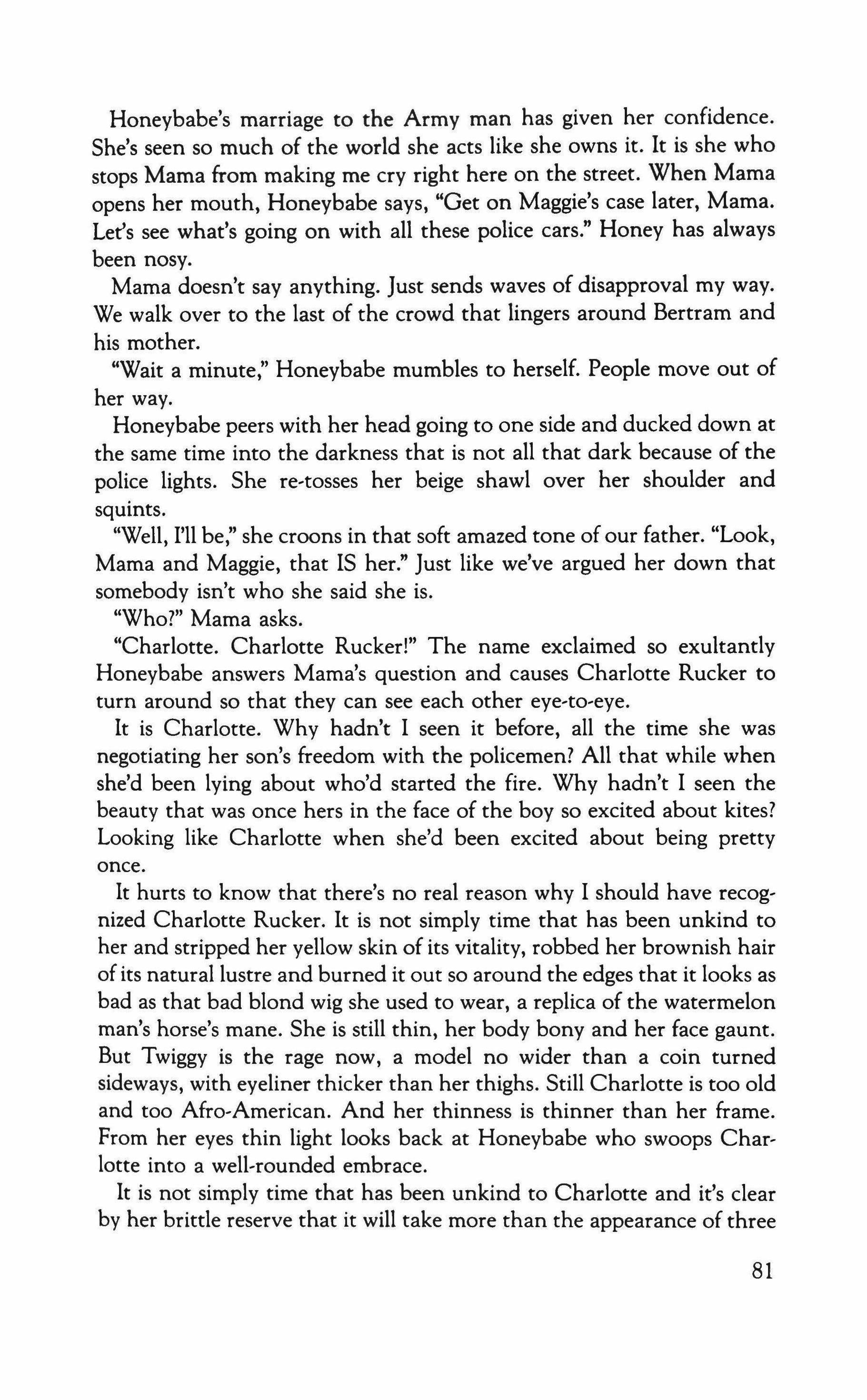
Honeybabe's marriage to the Army man has given her confidence. She's seen so much of the world she acts like she owns it. It is she who stops Marna from making me cry right here on the street. When Marna opens her mouth, Honeybabe says, "Get on Maggie's case later, Marna. Let's see what's going on with all these police cars." Honey has always been nosy.
Marna doesn't say anything. Just sends waves of disapproval my way. We walk over to the last of the crowd that lingers around Bertram and his mother.
"Wait a minute," Honeybabe mumbles to herself. People move out of her way.
Honeybabe peers with her head going to one side and ducked down at the same time into the darkness that is not all that dark because of the police lights. She re-tosses her beige shawl over her shoulder and squints.
"Well, I'll be:' she croons in that soft amazed tone of our father. "Look, Marna and Maggie, that IS her." Just like we've argued her down that somebody isn't who she said she is.
"Who?" Marna asks.
"Charlotte. Charlotte Rucker!" The name exclaimed so exultantly Honeybabe answers Marna's question and causes Charlotte Rucker to turn around so that they can see each other eye-to-eye.
It is Charlotte. Why hadn't I seen it before, all the time she was negotiating her son's freedom with the policemen? All that while when she'd been lying about who'd started the fire. Why hadn't I seen the beauty that was once hers in the face of the boy so excited about kites? Looking like Charlotte when she'd been excited about being pretty once.
It hurts to know that there's no real reason why I should have recognized Charlotte Rucker. It is not simply time that has been unkind to her and stripped her yellow skin of its vitality, robbed her brownish hair of its natural lustre and burned it out so around the edges that it looks as bad as that bad blond wig she used to wear, a replica of the watermelon man's horse's mane. She is still thin, her body bony and her face gaunt. But Twiggy is the rage now, a model no wider than a coin turned sideways, with eyeliner thicker than her thighs. Still Charlotte is too old and too Afro-American. And her thinness is thinner than her frame. From her eyes thin light looks back at Honeybabe who swoops Charlotte into a well-rounded embrace.
It is not simply time that has been unkind to Charlotte and it's clear by her brittle reserve that it will take more than the appearance of three
81

females from the prornise-davs of her young and arrogant beauty to bring back the self-adoring bloom that made other people adore her.
She grabs her son by the shoulders and shows him to us. She smiles rather sillily, a smile not unlike her smiles at her private joke in the days when she sat on our couch for hours and did and said nothing but smile and get on our immature and condemnatory nerves.
"This is Bertram, my son," she says. Her voice too hospitable and gay in a fake way. "I made the mistake of telling him go fly a kite."
The joke is lost on Mama and Honeybabe. Honeybabe jumps right in. "Did I hear you right? Do you need a place to stay? Come stay with me, so I won't be lonesome while my man's at war." Honeybabe is gracious enough to make it seem like she's making the invitation because she is in need. "Girl, we got a million things to catch up on."
Charlotte says, "I can show you everything that's happened to me right here." She bumps both Bertram's shoulders with the palms of her hands.
"He's so handsome and intelligent acting," Mama praises. "Isn't he, Maggie?"
"Uh huh," I say, trying to get back into my mother's good graces. Bertram and I just look at each other. I don't say a word about the kite, the fire, or killing soldiers. Especially not killing soldiers in front of Honeybabe. She's sensitive about that. Bertram grins at me-a flash-fire grin charmingly designed to keep me quiet. It is enough.
I'll let him be a little boy again, and maybe his mother will be Charlotte again, instead of this hank of hunger, a silly grin, and hair that looks worse than a wig.
Charlotte's apartment is as big as the living room of our house on Arbor Avenue. For the concrete walls, she has made collages out of magazine ads featuring the top models of the day. A half collage devoted to Naomi Sims. A whole one devoted to Twiggy. Both cardboard treasures trampled on by firemen, then water,logged until the photos pucker on the cardboard, run and tear.
Charlotte rummages through the wet ashes and scorched ends of clothing and memorabilia; we take what can be saved in egg-shaped hobo bundles. Each of us, Mama, Honeybabe and I, looks hurt in the face by the fire that has taken everything away. We trek down the stairs with the soggy bundles. We stuff the front trunk of the Volkswagen. Then we stuff ourselves into the miniature car. By now, too tired to talk, we sit in silence. Each one of us dazed in front of the maps of our own heartbreaks and prayed-for healings. Mama severs the silence with a gentle inanity about it being best to
82

move at night, that way the burglars won't be able to see what you have in your new apartment. Everybody smiles real hard.
After we've pulled away, I must look back. But it's not me who is turned into a pillar of salt. It's each and everyone of those buildings. Pillars and pillars of salt. Salt blocks framing the ice babies. A locked ocean of longing and entrapment.
There are no mountains here. The only height achieved through the climbing of dirty stairs.
Bertram is asleep in his mother's arms. I sit next to them in the back, so it's easy for me to see that Charlotte can bearly hold herself together, much less the boy. How she trembles, as if each pulse were a low-grade earthquake! Easy for me to see but hard to look at.
83
The Eleventh Edition
Leo E. Litwak
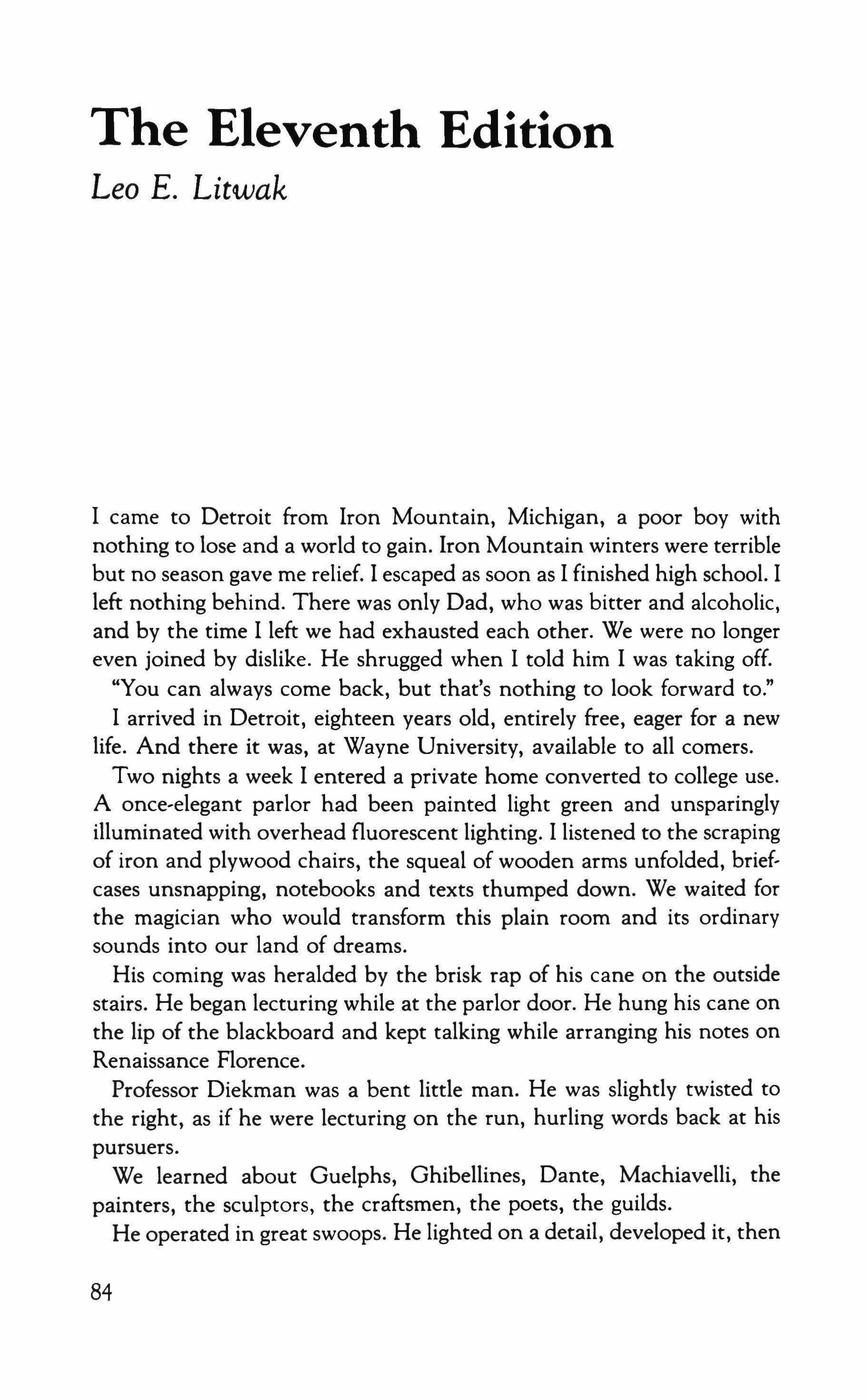
I came to Detroit from Iron Mountain, Michigan, a poor boy with nothing to lose and a world to gain. Iron Mountain winters were terrible but no season gave me relief. I escaped as soon as I finished high school. I left nothing behind. There was only Dad, who was bitter and alcoholic, and by the time I left we had exhausted each other. We were no longer even joined by dislike. He shrugged when I told him I was taking off.
"You can always come back, but that's nothing to look forward to."
I arrived in Detroit, eighteen years old, entirely free, eager for a new life. And there it was, at Wayne University, available to all comers.
Two nights a week I entered a private home converted to college use. A once-elegant parlor had been painted light green and unsparingly illuminated with overhead fluorescent lighting. I listened to the scraping of iron and plywood chairs, the squeal of wooden arms unfolded, brief, cases unsnapping, notebooks and texts thumped down. We waited for the magician who would transform this plain room and its ordinary sounds into our land of dreams.
His coming was heralded by the brisk rap of his cane on the outside stairs. He began lecturing while at the parlor door. He hung his cane on the lip of the blackboard and kept talking while arranging his notes on Renaissance Florence.
Professor Diekman was a bent little man. He was slightly twisted to the right, as if he were lecturing on the run, hurling words back at his pursuers.
We learned about Guelphs, Ghibellines, Dante, Machiavelli, the painters, the sculptors, the craftsmen, the poets, the guilds.
He operated in great swoops. He lighted on a detail, developed it, then
84
leaped elsewhere. Over the weeks the direction of his narrative became clear.
The Florentine bankers lent to monasteries, took the sheep as collateral, traveled Europe without regard for boundaries, and finally controlled the wool market. Diekman followed the vagaries of capitalism from its beginnings in fourteenth-century Florence to its consummation on the Detroit assembly line.
There was nothing so odd that he couldn't find a link to our experience. He clarified what was opaque, made coherent what seemed alien and terrifying.
I studied with Diekman for three years, then entered the graduate program. I enrolled in whatever he taught. I took his three-semester history of philosophy sequence, his course in esthetics, dabbled at Homeric Greek to become eligible for his Iliad seminar, learned German in preparation for his lectures on Goethe.
During those years I was employed at Brant's Import and Export. Each morning I reported to the warehouse and checked inventory. I counted slabs of Italian marble. I unwrapped delicate wall sconces, examined them for defects, rewrapped them. I counted boxes of cut crystal to make sure that Brant had received the full order. I measured bolts of English linen, stacked Polish carpets, opened crates of Mexican glassware. By late afternoon I had finished. The rest of my time belonged to Diekman.

I lost all connection to Iron Mountain. I was no longer that boy. But who was I and where was l? I was out of touch. I didn't allow myself to touch. There was no ground under my feet. I felt that I belonged nowhere until I established myself on campus.
I moved whenever I found a cheaper room and finally ended at Tuchler's place, a few blocks from the Wayne campus. I had a room on the second floor, next to the bath. I was utterly concentrated on my studies. My vision narrowed. My hearing, though, became omnivorous. I devoured sound, greedy for it, straining like a hungry fledgling for any word that could bring me ease.
All I heard was old Walsh coughing in the room next to mine. He desperately harrumphed, trying to clear his throat of a death that was already beyond his throat.
His memory was erratic and he sometimes forgot that we'd met. The wispy old fellow would knock on my door to introduce himself again.
* * *
85

"Hi, there. My name is Frank Walsh. I'm your neighbor." We met regularly but no use clarifying matters, so once more I'd say, "Russell Hansen."
"What?"
"Hansen."
"Hansen. That's a good simple name. I didn't catch the first name." "Russell."
"Russell? I had a partner named Russell. I was in the seed business, you know. Volunteer Seed." And he was off. Till the moment when he could again describe the one agony that remained fresh and unforgotten. "My wife died last year. We were married fifty-three years. And when you lose a companion of fifty-three years, oh golly," he said, "oh, golly. You don't get over it in a day."
More than a day had elapsed; in fact, more than a year. His wife was long dead. The old man couldn't distinguish days and years. He was a retired pensioner. He slept when sleep came. He once knocked at my door after midnight. "Sorry, sir. I thought I heard you dining. I wonder if you could use this bottle of wine. It was a gift to me but I don't touch the stuff." It was an ancient bottle, opened years ago, and long since become vinegar. I thanked him, took the bottle, but didn't allow him to stay.
His radio sputtered out at night and then self-ignited in a jarring burst of breakfast music at five in the morning. I heard the confused old man call out, "Yes? Yes? What time is it?"
He wasn't the neighbor I'd have chosen. I avoided distraction. Professor Gerard Diekman ruled my life. The austere little man didn't suffer fools. I labored to stay in his good graces. When he mentioned a text during class, I checked it out. At his beckoning I entered deep waters. I floundered but learned to swim. When he wrote a critique of my paper and concluded, "Very good," I felt confirmed. But his disapproval, dis, played in that same precise, crabbed script, could take the ground from under my feet. Four years his student and I was still unacknowledged. He called my name at the beginning of each semester but there was no further recognition. I had no idea where I stood, and there were times when I choked on books.
I was as desperate as Walsh for human connection. Even the old man would sometimes serve.
I knocked on his door, beat hard to penetrate the sound of his radio. He finally called out, "Hello? Is someone there?"
When he opened up I reminded him that I was his neighbor, Russell Hansen.
"Of course you're Russell Hansen. I know that."
86

His room was crammed with furnishings gathered over a lifetime. I noticed a Seth Thomas pendulum clock, a massive oak wardrobe, a glass-enclosed bookcase containing a leatherbound edition of the Encyclopedia Britannica. The room was dominated by a radio phonograph console, tuned to the news.
He invited me to sit. He told me again of his arrival in Detroit at the turn of the century. He came by steamer from Buffalo with his bride, Louise. He landed at a slip later occupied by an excursion boat. He rented a duplex on Bagley Street and started the Volunteer Seed Company.
Everyone loved Louise, he said. She had the best heart in the world. This was the preliminary of a story I heard him tell more than once. They were young. Louise was expecting. The business struggled but prospects were good. It would have been paradise except for the man next door who had converted a backyard toolshed into a machine shop. He made a terrific racket but Walsh was reluctant to complain. The fellow was skinny as death and clanged away with intimidating earnestness. Louise urged her husband to talk to the man.
"'Tell the gentleman I can't get to sleep, Frank. He's disturbing the neighborhood.'
Walsh told Louise it was his policy to live and let live and he did nothing about the noise until one night the racket went on and onsteel on steel-and it was too much. He put on a buffalo-plaid robe over his pajamas. The man was in his garage, working at his lathe. Walsh pleaded with him.
"'Have a heart, sir. I have to be up at five in the morning and it's already ten-thirty.'
"This fellow pulls away from the lathe. He pushes back his goggles. 'Ten-thirty, you say? It can't be ten-thirty. Only a loony would be out at ten-thirty in his pajamas. And you don't look like a loony to me.' I didn't want to make a fuss. I admired his industry. If it was only a case of my pleasure I'd say, 'Go on till the rooster crows.' But I told him my Louise was expecting and she wasn't having an easy time of it.
"'Well, sir,' this skinny gentleman said to me, 'I know your missus and if she wants me to shut down business-' He turned off the lathe, took off his gloves, stuck out his hand and introduced himself.
'Henry Ford of the Edison Illuminating Company.'
"Yessir! Henry Ford. Isn't that a piece of history, young man? He was working on a model of the internal combustion engine in that shed. We became friends. Not so much me and Henry - no one ever called him Hank-but his wife Clara and my Louise. Everyone loved Louise. It was
87
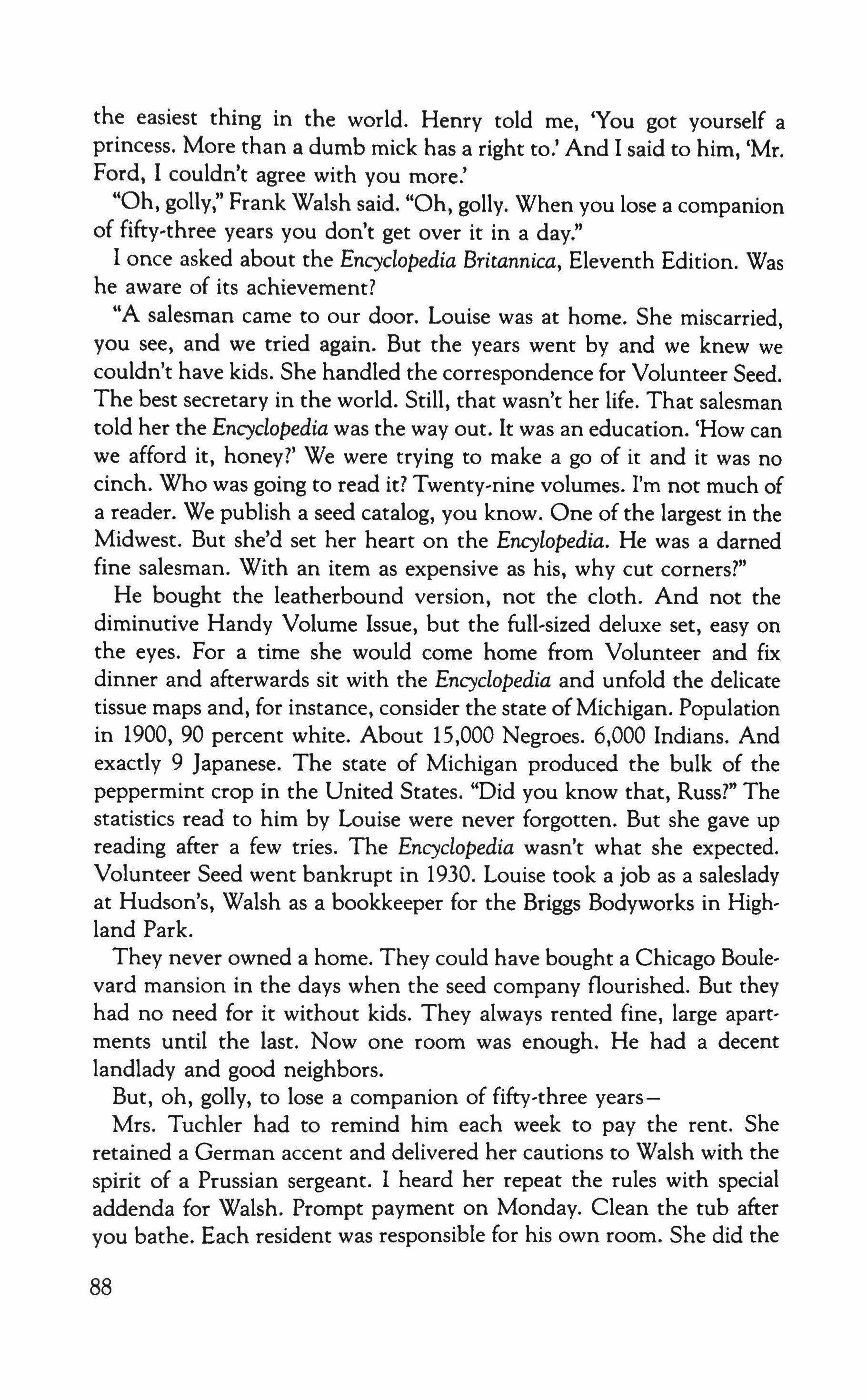
the easiest thing in the world. Henry told me, 'You got yourself a princess. More than a dumb mick has a right to.' And I said to him, 'Mr. Ford, I couldn't agree with you more.'
"Oh, golly," Frank Walsh said. "Oh, golly. When you lose a companion of fifty-three years you don't get over it in a day."
I once asked about the Encyclopedia Britannica, Eleventh Edition. Was he aware of its achievement?
"A salesman came to our door. Louise was at home. She miscarried, you see, and we tried again. But the years went by and we knew we couldn't have kids. She handled the correspondence for Volunteer Seed. The best secretary in the world. Still, that wasn't her life. That salesman told her the Encyclopedia was the way out. It was an education. 'How can we afford it, honey?' We were trying to make a go of it and it was no cinch. Who was going to read it? Twentv-nine volumes. I'm not much of a reader. We publish a seed catalog, you know. One of the largest in the Midwest. But she'd set her heart on the Encylopedia. He was a darned fine salesman. With an item as expensive as his, why cut corners?"
He bought the leatherbound version, not the cloth. And not the diminutive Handy Volume Issue, but the full-sized deluxe set, easy on the eyes. For a time she would come home from Volunteer and fix dinner and afterwards sit with the Encyclopedia and unfold the delicate tissue maps and, for instance, consider the state ofMichigan. Population in 1900, 90 percent white. About 15,000 Negroes. 6,000 Indians. And exactly 9 Japanese. The state of Michigan produced the bulk of the peppermint crop in the United States. "Did you know that, Russ?" The statistics read to him by Louise were never forgotten. But she gave up reading after a few tries. The Encyclopedia wasn't what she expected. Volunteer Seed went bankrupt in 1930. Louise took a job as a saleslady at Hudson's, Walsh as a bookkeeper for the Briggs Bodyworks in High, land Park.
They never owned a home. They could have bought a Chicago Boule, vard mansion in the days when the seed company flourished. But they had no need for it without kids. They always rented fine, large apartments until the last. Now one room was enough. He had a decent landlady and good neighbors.
But, oh, golly, to lose a companion of fifty-three yearsMrs. Tuchler had to remind him each week to pay the rent. She retained a German accent and delivered her cautions to Walsh with the spirit of a Prussian sergeant. I heard her repeat the rules with special addenda for Walsh. Prompt payment on Monday. Clean the tub after you bathe. Each resident was responsible for his own room. She did the
88

hallways and bathroom. No loud music. No loud parties. All calls reported on the pad by the phone. She warned that excessive use of electricity or gas would bring a rent increase.
The rules, hand-lettered on green matting paper, were mounted next to the phone. She told us she didn't apologize for being strict. It was a declining neighborhood and she meant to hold the fort. She kept after the old man. He was hard of hearing, his memory dimmed. She spoke at full-volume in an accent that refused to acknowledge w's. She came upstairs, hitting every tread with authority, disciplining the wood beneath her.
"Mr. Walsh? Mr. Walsh?" (Pronounced "Valsch.") Hard raps, then letting herself in. I heard her clearly through the wall. "You must raise the toilet seat. The other roomers complain." I hadn't complained, nor, I'm sure, had Betty McCarthy. "You get the seat dirty, you get the floor dirty. You don't clean the tub neither."
Walsh was abject. "Sorry," he said. Sorry wasn't enough. He said again, "I'm sorry, Missus," She occupied an apartment directly below. When she heard the nighttime pacing and the radio at full-volume she stepped into the vestibule, braced on the newel post, and shouted, "Quiet!" Then the trek upstairs to discipline him face-to-face.
She called me "Professor." I corrected her a few times. "Only a student, Mrs. Tuchler." Perhaps she imagined that if a professor were in residence the encroaching ghetto would stop a block away and not incorporate her house.
"The Professor is preparing his lessons," she warned Walsh. "He wants quiet."
I told her the old man didn't bother me. "Old age is our destiny, too, Mrs. Tuchler."
"Ah," she said. "What would you know from old age? You learn it in books? You think I am the hard-hearted landlady, but do you know, for three months that man has not paid his rent? His pension check doesn't come. I write for him and they promise to send new checks. Maybe it will come. Maybe not. My bills come for sure."
He'd been with her for five years. His wife was already dead when he arrived. He said she died last year but his memory was jumbled. He had no one. Who was he to Mrs. Tuchler? Not her kin. She knew there was no pleasure growing old. She knew far better than I that there were no happy endings. She was preparing for her own bad time. She began by hardening her heart. If he didn't pay the rent-out! If he continued bothering other tenants, he had to go.
Walsh usually managed to soften her. When she stomped upstairs to
89
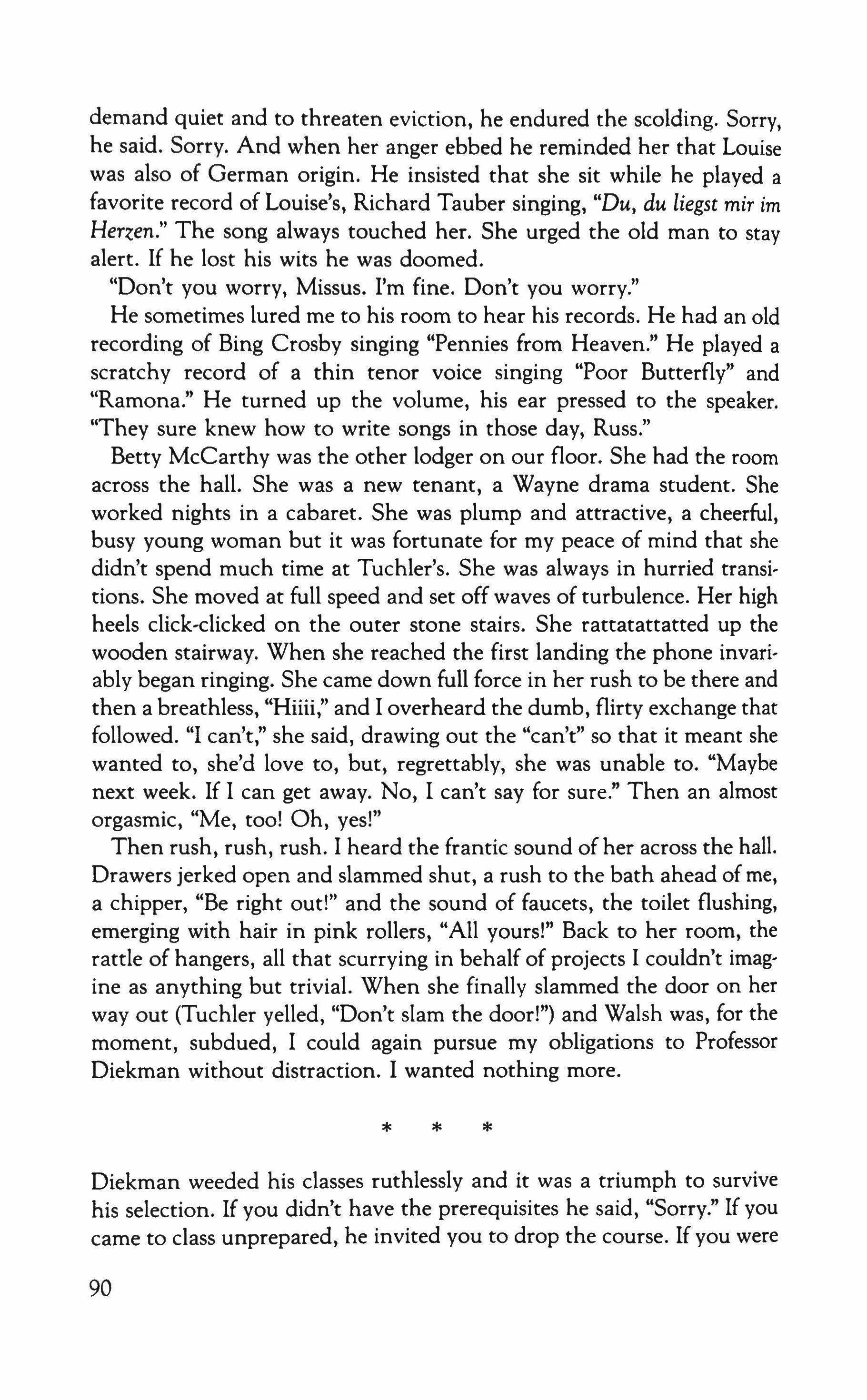
demand quiet and to threaten eviction, he endured the scolding. Sorry, he said. Sorry. And when her anger ebbed he reminded her that Louise was also of German origin. He insisted that she sit while he played a favorite record of Louise's, Richard Tauber singing, "Du, du liegst miT im Herzen," The song always touched her. She urged the old man to stay alert. If he lost his wits he was doomed.
"Don't you worry, Missus. I'm fine. Don't you worry."
He sometimes lured me to his room to hear his records. He had an old recording of Bing Crosby singing "Pennies from Heaven." He played a scratchy record of a thin tenor voice singing "Poor Butterfly" and "Ramona." He turned up the volume, his ear pressed to the speaker. "They sure knew how to write songs in those day, Russ."
Betty McCarthy was the other lodger on our floor. She had the room across the hall. She was a new tenant, a Wayne drama student. She worked nights in a cabaret. She was plump and attractive, a cheerful, busy young woman but it was fortunate for my peace of mind that she didn't spend much time at Tuchler's. She was always in hurried transitions. She moved at full speed and set off waves of turbulence. Her high heels click-clicked on the outer stone stairs. She rattatattatted up the wooden stairway. When she reached the first landing the phone invariably began ringing. She came down full force in her rush to be there and then a breathless, "Hiiii," and I overheard the dumb, flirty exchange that followed. "I can't," she said, drawing out the "can't" so that it meant she wanted to, she'd love to, but, regrettably, she was unable to. "Maybe next week. If I can get away. No, I can't say for sure." Then an almost orgasmic, "Me, too! Oh, yes!"
Then rush, rush, rush. I heard the frantic sound of her across the hall. Drawers jerked open and slammed shut, a rush to the bath ahead of me, a chipper, "Be right out!" and the sound of faucets, the toilet flushing, emerging with hair in pink rollers, "All yours!" Back to her room, the rattle of hangers, all that scurrying in behalf of projects I couldn't imagine as anything but trivial. When she finally slammed the door on her way out (Tuchler yelled, "Don't slam the door!") and Walsh was, for the moment, subdued, I could again pursue my obligations to Professor Diekman without distraction. I wanted nothing more. * * *
Diekman weeded his classes ruthlessly and it was a triumph to survive his selection. If you didn't have the prerequisites he said, "Sorry." If you came to class unprepared, he invited you to drop the course. If you were
90
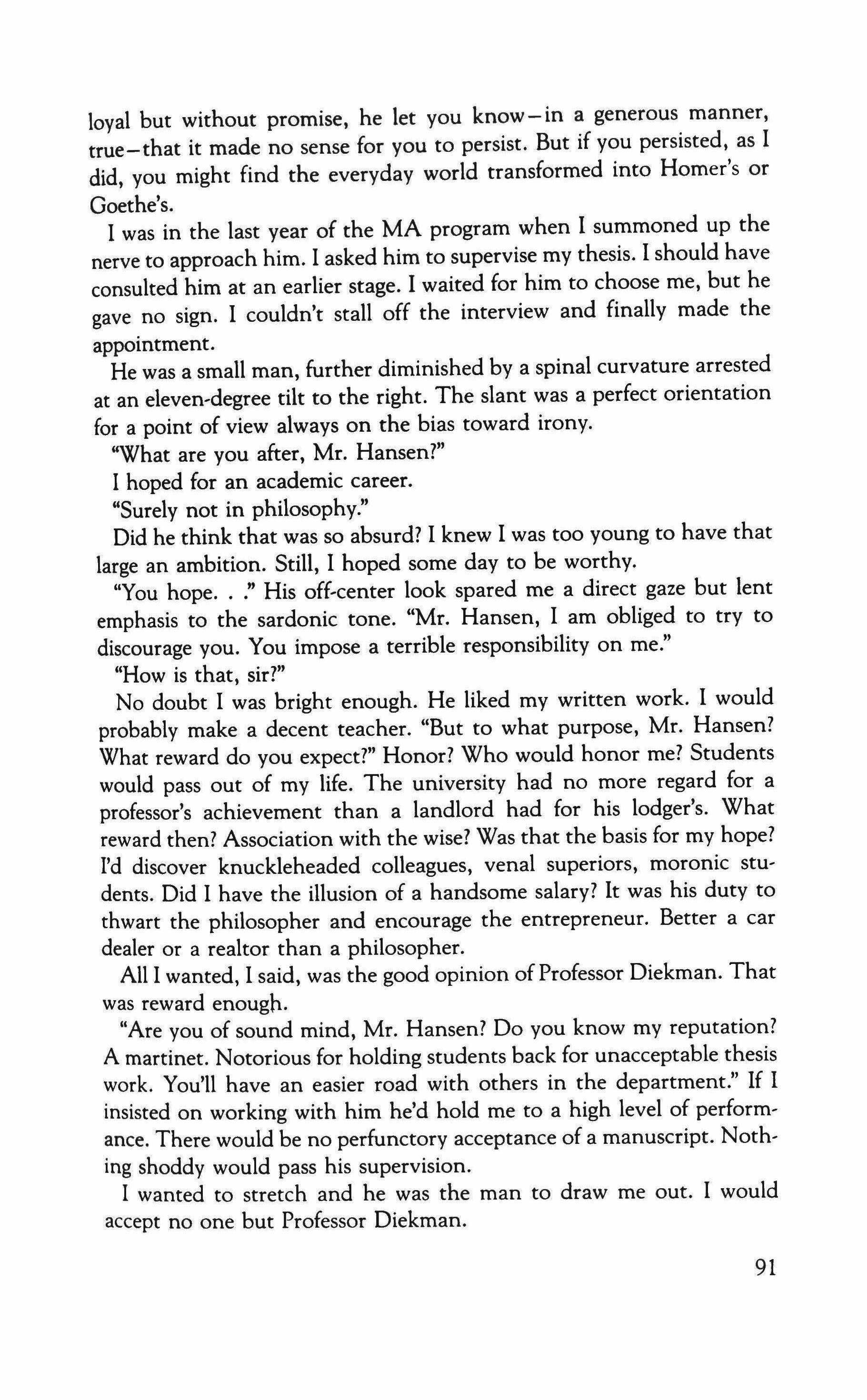
loyal but without promise, he let you know-in a generous manner, true-that it made no sense for you to persist. But if you persisted, as I did, you might find the everyday world transformed into Homer's or Goethe's.
I was in the last year of the MA program when I summoned up the nerve to approach him. I asked him to supervise my thesis. I should have consulted him at an earlier stage. I waited for him to choose me, but he gave no sign. I couldn't stall off the interview and finally made the appointment.
He was a small man, further diminished by a spinal curvature arrested at an eleven-degree tilt to the right. The slant was a perfect orientation for a point of view always on the bias toward irony.
"What are you after, Mr. Hansen?"
I hoped for an academic career.
"Surely not in philosophy."
Did he think that was so absurd? I knew I was too young to have that large an ambition. Still, I hoped some day to be worthy.
"You hope. ." His off-center look spared me a direct gaze but lent emphasis to the sardonic tone. "Mr. Hansen, I am obliged to try to discourage you. You impose a terrible responsibility on me."
"How is that, sir?"
No doubt I was bright enough. He liked my written work. I would probably make a decent teacher. "But to what purpose, Mr. Hansen? What reward do you expect?" Honor? Who would honor me? Students would pass out of my life. The university had no more regard for a professor's achievement than a landlord had for his lodger's. What reward then? Association with the wise? Was that the basis for my hope? I'd discover knuckleheaded colleagues, venal superiors, moronic students. Did I have the illusion of a handsome salary? It was his duty to thwart the philosopher and encourage the entrepreneur. Better a car dealer or a realtor than a philosopher.
AlII wanted, I said, was the good opinion of Professor Diekman. That was reward enough.
"Are you of sound mind, Mr. Hansen? Do you know my reputation? A martinet. Notorious for holding students back for unacceptable thesis work. You'll have an easier road with others in the department." If I insisted on working with him he'd hold me to a high level of performance. There would be no perfunctory acceptance of a manuscript. Nothing shoddy would pass his supervision.
I wanted to stretch and he was the man to draw me out. I would accept no one but Professor Diekman.
91

It was then he used my first name. "What is your topic, Russell?" 'Descartes's Dream of a Demon.'''
I was, of course, familiar with Descartes's famous dreams that preceded the Meditations, wasn't l?
I was.
There was no dream of a demon.
I referred to the demon whom Descartes invited us to dream, the subverter of the material world.
Wasn't that too labored a topic? Did I have something new to add? But we would talk, he said, and agreed to supervise my thesis.
He invited me to join a circle of students who met at his home Friday nights. lilt means giving up more robust Friday night pleasures, Russell. I'll understand perfectly if you find that's too great a sacrifice."
I was delighted to make the sacrifice. I was more than delighted. Ecstatic. And I joined the Diekman circle.
There were six of us, all graduate students, all male. I was the youngest and the least schooled. We met in Diekman's apartment Friday evening for supper. A topic emerged while we were eating, apparently at random. Then for several hours Diekman guided us along the path we had chosen.
We read for him. We adopted his aloof ironic style. Perhaps I even began tilting to the right.
On Friday night I'd leave my barren, mildewed room and the sound of Walsh harrumphing and the cascade of Betty's heels and enter the formality of Diekman's apartment off Jefferson Avenue. Diekman was heir to a Grand Rapids stove factory and very well off. There was a uniformed doorman in the plush lobby. I rose in a gilded elevator to the fifth floor. The apartment was furnished with old family pieceseighteenth-century pine cabinets, hefty armoires, leather-topped desks, copper lamps hooded by steeply sloped silk shades with beaded fringes. Everything was placed with a precision that was the signature of one ordering sensibility. No wife, no mother, no decorator, only Diekman. There were walls of graphics, one room specializing in Orientals, elsewhere Rembrandt miniatures, Italian views, French contemporaries.
He prepared careful suppers. He himself ate little. Eating was for him a matter of discipline rather than appetite.
One night he watched a portly graduate student, Jules Vincenti, lavish preserves on Breton crepes then take the pancakes in a few massive bites, his chewing thoughtful and bovine. Diekman asked, "Do you like sweets, Mr. Vincenti?"
"They're my undoing."
92

Vincenti stopped eating while Diekman mused on sweets. Could a world open on a tea-softened madeleine? A coffee-dunked cruller? He didn't think so. Sugar wasn't a thoughtful food. The gratification was too immediate and conclusive. A subtle cuisine carried with it the threat of decay, an ambiguous texture, the tongue made cautious, the pace of eating slowed, all our senses marshalled as we carefully ventured into the next bite. The French and Chinese offered a metaphysical cuisine whose purpose wasn't merely to gratify the palate but to chasten it. The sauces that lingered on the edge of decay reminded the palate that it masticated death, not only the death of what was ingested, but the death of the chewing machine itself-teeth, tongue, palate.
"When we're children we have the blissful conviction that there is nothing beyond the heaven of distilled sweetness. But as we age, Mr. Vincenti, we begin to taste our dying and our appetite matures. We are on the treadmill of generation and decay and if we are to become wise there's no return to the simple connection to sugar."
He formalized the needs of his body. He transformed such necessities as eating into an artful practice. He dressed with great care, not to hide his crookedness-that was out of the question-but to make it irrelevant, to establish that he was the author of himself and not the mere effect of his scoliosis.
Stripped of his tailored tweeds and striped shirt and red bow tie and built-up oxfords he would have appeared as grotesque as a crab without its carapace. He didn't allow himself to be stripped. He maintained austere control. He called us by first name. We would never think of calling him "Gerard." It was always "Sir" or "Professor Diekman."
His aloofness veiled a passionate nature that he could expose in the safety of the Diekman circle.
He once began a reading from Faust. He was powerfully moved. He trembled, the verse barely audible. He was obviously having trouble continuing. There were only the six of us to see him make a fool of himself, but these six were his entire dominion. He stopped, closed his eyes, then rushed for his Baldwin Grand. He weaved back and forth as he played, and sang.
Meine Ruhe ist hin
Mein Herz ist schwer
Ich linde sie nimmer
Und nimmer
Und nimmermehr
93

A high tenor voice. He was first Marguerite, then stepped into the shoes of Faust. He observed the mad Gretchen. He grieved, but there was no going back. The compact was made. Her madness was the price he paid en route to power.
I was at first embarrassed by the release of his voice. He stretched to the breaking point to accommodate the final NIMmermehr, hovering near an uncontrolled tremolo. What idea did he have of himself? But then, entirely composed, he went on to observe how Faust, shaken by pity, is tempted to give up the struggle for transcendence. He is kept on track by the necessary devil.
So lang man auf die Erde lebt, So lang sei dir nichts verboten. Es irrt der Mensch so lang er strebt.
The risk must be taken. The striving will not be arrested. Poor lunatic Gretchen is the sacrifice to the God he serves.
Er bedient euch in besondere Weise.
He came from Grand Rapids. His origins were Dutch Reform. He'd long since abandoned the creed but retained a sense of a grievous past and an apocalyptic future. This was the position that structured his courses: we were inextricably embedded in history, fixed there by our station and its duties, doomed whatever our struggles to consummate the destinies of our fathers. The past was fossilized in our character and language: nothing new under the sun. And then, for those elected, a release from bondage through the miracle of art. Grace conferred, not by God in heaven, but by Homer and Mozart and Rembrandt and Goethe.
Our crooked Mephisto led us to the Detroit Institute of Art, prepared to go to any length to open our eyes. He once stood in front of a Mondrian, tucked his cane under his arm and made surprising staccato motions like an East Indian dancer. A group of passing teenagers giggled. A museum guard moved toward us. The dapper little man, tilted off-center, flapped his arms, shuffled his feet, danced his response to Mondrian, scorning a dogmatic formalism that insisted on the sufficiency of the painting within its frame. He didn't care who saw or heard. He spoke in full voice.
"I reflect the force in the painting. The tension between line and color is in me. I experience the stress. It is resolved inside me. The harmony in
94

the Mondrian I find in myself. Where it is hot, I am hot. Where the line thickens, I thicken. I experience the thickening."
He broke into a peculiar jig, his cane fell, his arms mimed vectors working through the Mondrian checkerboard, his pace regulated by the intensity of color. He ignored the gigglers. He didn't allow the possibility of our embarrassment. The guard saw that it was Professor Diekman and withdrew.
"When you face the work of art your obligation is to experience the work, not make judgments. Risk yourselves. Be fools if necessary."
I was tremendously excited by these sessions. The ordinary world seemed illuminated and transformed.
Wasn't the luminous vision worth any sacrifice? Even family? Even Gretchen's? There was no Gretchen for Diekman. He had his Rembrandt lithographs, his Utamaros, his Wunderlichs, his Hundertwassers. Above all, his library.
He had turned a large parlor into a cylinder of books. A lBO-degree arc was occupied by philosophy. There was a large segment for classics. There were leather-bound collections and massive art books. The middle shelf above his desk featured the Encyclopedia Britannica, Eleventh Edition.
I mentioned that my neighbor owned the same edition.
One of the grand human achievements, Diekman said. The world orchestrated by an extraordinary assembly of scholars, acting in concert, as if there were a single author with a single vision and a single voice and that voice offered a universal design, history unrolling, purposefully directed. Was there any need for updating? All that had happened since the 1911 publication could be extrapolated. Was there any novelty? The scale of events had changed. Otherwise the Eleventh Edition was sufficient.
From the fifth floor at Diekman's, I glimpsed Canada across the Detroit River. At this height-the windows closed-we couldn't hear traffic. We had no inkling of neighborhoods in convulsion. When Diekman went to his piano and illustrated Apollonian grace with a phrase of Mozart, the turbulence below disappeared. I forgot my mornings at Brant's warehouse and the sound of death in Frank Walsh's throat.
But then down the elevator, out into the street, winter coming, a sharp edge in the air, and back to the commonplace world of Tuchler's rooming house.
95
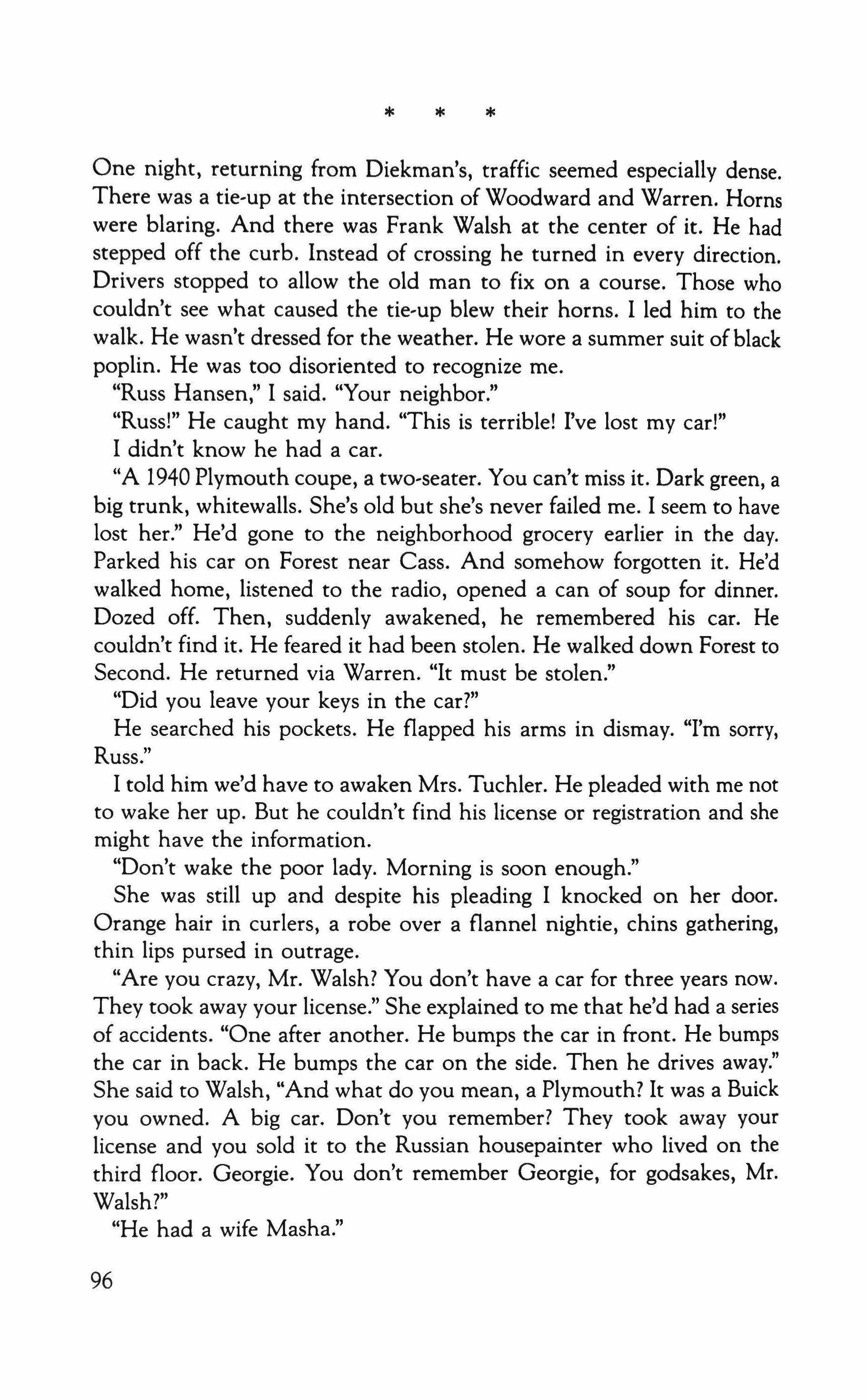
One night, returning from Diekman's, traffic seemed especially dense. There was a tie-up at the intersection of Woodward and Warren. Horns were blaring. And there was Frank Walsh at the center of it. He had stepped off the curb. Instead of crossing he turned in every direction. Drivers stopped to allow the old man to fix on a course. Those who couldn't see what caused the tie-up blew their horns. I led him to the walk. He wasn't dressed for the weather. He wore a summer suit ofblack poplin. He was too disoriented to recognize me.
"Russ Hansen," I said. "Your neighbor."
"Russ!" He caught my hand. "This is terrible! I've lost my car!"
I didn't know he had a car.
"A 1940 Plymouth coupe, a two-seater. You can't miss it. Dark green, a big trunk, whitewalls. She's old but she's never failed me. I seem to have lost her." He'd gone to the neighborhood grocery earlier in the day. Parked his car on Forest near Casso And somehow forgotten it. He'd walked home, listened to the radio, opened a can of soup for dinner. Dozed off. Then, suddenly awakened, he remembered his car. He couldn't find it. He feared it had been stolen. He walked down Forest to Second. He returned via Warren. "It must be stolen."
"Did you leave your keys in the car?"
He searched his pockets. He flapped his arms in dismay. "I'm sorry, Russ."
I told him we'd have to awaken Mrs. Tuchler. He pleaded with me not to wake her up. But he couldn't find his license or registration and she might have the information.
"Don't wake the poor lady. Morning is soon enough."
She was still up and despite his pleading I knocked on her door. Orange hair in curlers, a robe over a flannel nightie, chins gathering, thin lips pursed in outrage.
"Are you crazy, Mr. Walsh? You don't have a car for three years now. They took away your license." She explained to me that he'd had a series of accidents. "One after another. He bumps the car in front. He bumps the car in back. He bumps the car on the side. Then he drives away." She said to Walsh, "And what do you mean, a Plymouth? It was a Buick you owned. A big car. Don't you remember? They took away your license and you sold it to the Russian housepainter who lived on the third floor. Georgie. You don't remember Georgie, for godsakes, Mr. Walsh?"
"He had a wife Masha."
* * *
96

"Yes, Masha. You sold him your Buick. The Plymouth was your car maybe when your missus was alive. You're losing your head, Mr. Walsh. You made the professor walk up and down the street for nothing."
"Oh, dear, I'm sorry." It must have been a dream. He'd awakened suddenly, recalling that he'd gone to the grocery and left his car. He hurriedly dressed, rushed over, and it was gone. Of course. He sold his car to the Russian housepainter who lived upstairs with Masha. Georgie. Completely forgotten. Could it have been a dream? It was so vivid. He was so sure. The Buick and not the Plymouth? The Plymouth long gone?
He came to my door before dawn and woke me up. "Something's happening, Russ. I'm sure I parked the Plymouth outside the A&P. I know it's there."
He faded fast. Not even memories held him in place. A week later I heard him cry out in the hall. ''No,'' he shouted. "Oh, no!" He shrunk away from me. He was in his pajamas, a trail from the middle of the hallway to his door. The hall carpet was a mess. I smelled death in his spoor. It was an awful smell. "I'm sorry," he groaned, "I'm so sorry," then started weeping and ran to his room.
I knocked on the door. "It's O.K., Mr. Walsh. Anybody can have an accident. Let me help you clean up."
I walked in. He was standing with his pajama bottoms around his ankles. He begged me to leave.
"It could happen to anyone. We'll clean up before Mrs. Tuchler finds out."
"Please! Please!"
I stooped to get his pajama bottoms. He tried to push me away.
''No reason to be embarrassed," I told him. There was every reason and I struggled to keep disgust out of my voice. I bundled his pajama bottoms and lifted them gingerly.
"I got lost," he mourned.
I assured him it could happen to anyone.
I led him to the bathroom and ran a tub. His legs were smeared. I helped him into the tub. I talked to keep down the disgust. "It's O.K. It's not so terrible." And, in fact, as I worked it stopped being terrible.
His feet and hands seemed huge because the rest of him had dwindled to skin and bones. He leaned on my shoulder. I held him around the waist and mopped him with a washcloth hanging on the rack, probably Betty McCarthy's. I drained the tub, then filled it again. I told him to sit and relax while I cleaned the hallway.
I went downstairs to the utility closet beneath the stairs, looking for a
97
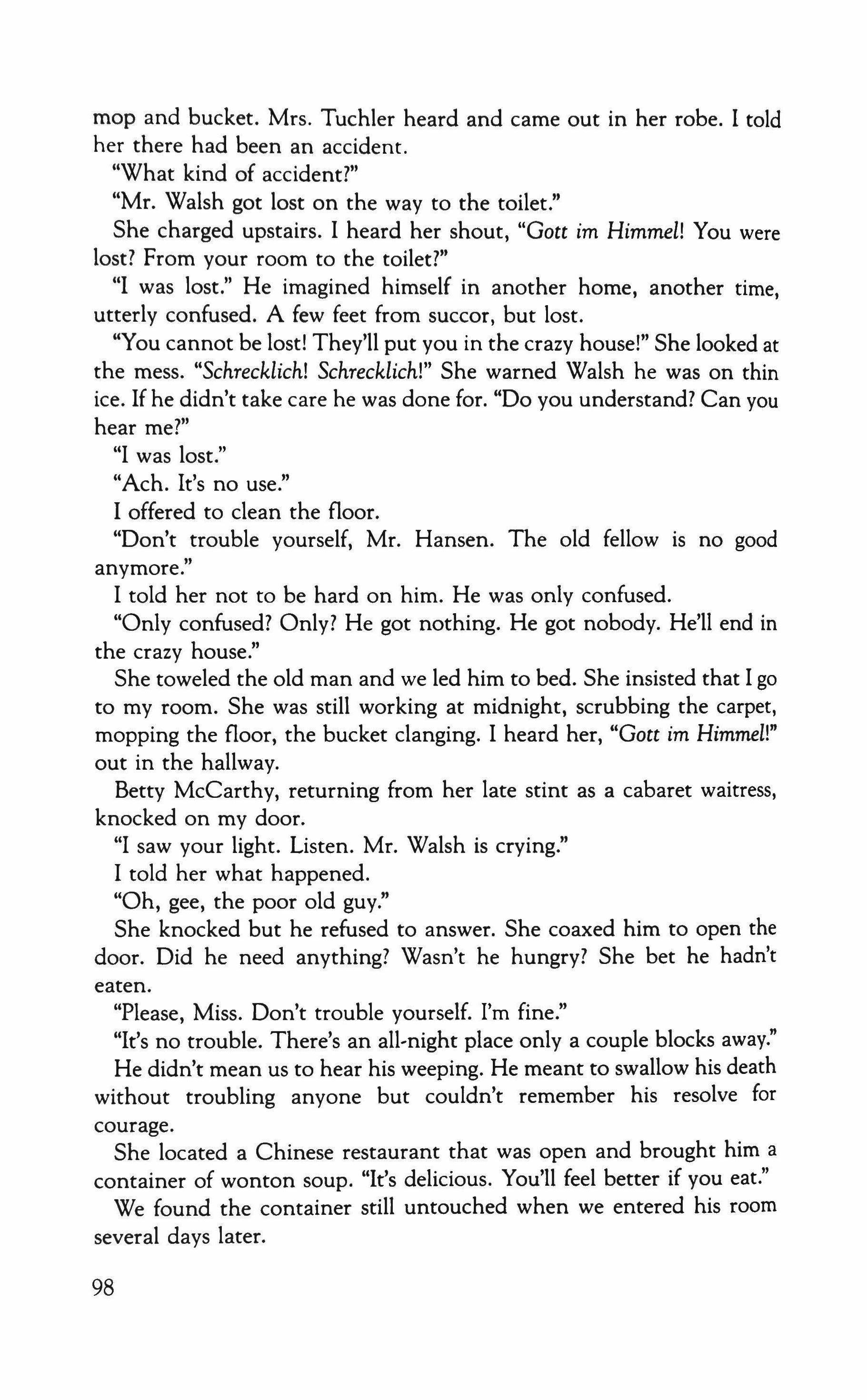
mop and bucket. Mrs. Tuchler heard and came out in her robe. I told her there had been an accident.
"What kind of accident?"
"Mr. Walsh got lost on the way to the toilet."
She charged upstairs. I heard her shout, "Gott im Himmel! You were lost? From your room to the toilet?"
"I was lost." He imagined himself in another home, another time, utterly confused. A few feet from succor, but lost.
"You cannot be lost! They'll put you in the crazy house!" She looked at the mess. "Schrecklich! Schrecklich!" She warned Walsh he was on thin ice. If he didn't take care he was done for. "Do you understand? Can you hear me?"
"I was lost."
"Ach. It's no use."
I offered to clean the floor.
"Don't trouble yourself, Mr. Hansen. The old fellow is no good anymore."
I told her not to be hard on him. He was only confused.
"Only confused? Only? He got nothing. He got nobody. He'll end in the crazy house."
She toweled the old man and we led him to bed. She insisted that I go to my room. She was still working at midnight, scrubbing the carpet, mopping the floor, the bucket clanging. I heard her, "Gott im Himmel!" out in the hallway.
Betty McCarthy, returning from her late stint as a cabaret waitress, knocked on my door.
"I saw your light. Listen. Mr. Walsh is crying."
I told her what happened.
"Oh, gee, the poor old guy."
She knocked but he refused to answer. She coaxed him to open the door. Did he need anything? Wasn't he hungry? She bet he hadn't eaten.
"Please, Miss. Don't trouble yourself. I'm fine."
"It's no trouble. There's an all-night place only a couple blocks away."
He didn't mean us to hear his weeping. He meant to swallow his death without troubling anyone but couldn't remember his resolve for courage.
She located a Chinese restaurant that was open and brought him a container of wonton soup. "It's delicious. You'll feel better if you eat."
We found the container still untouched when we entered his room several days later.
98
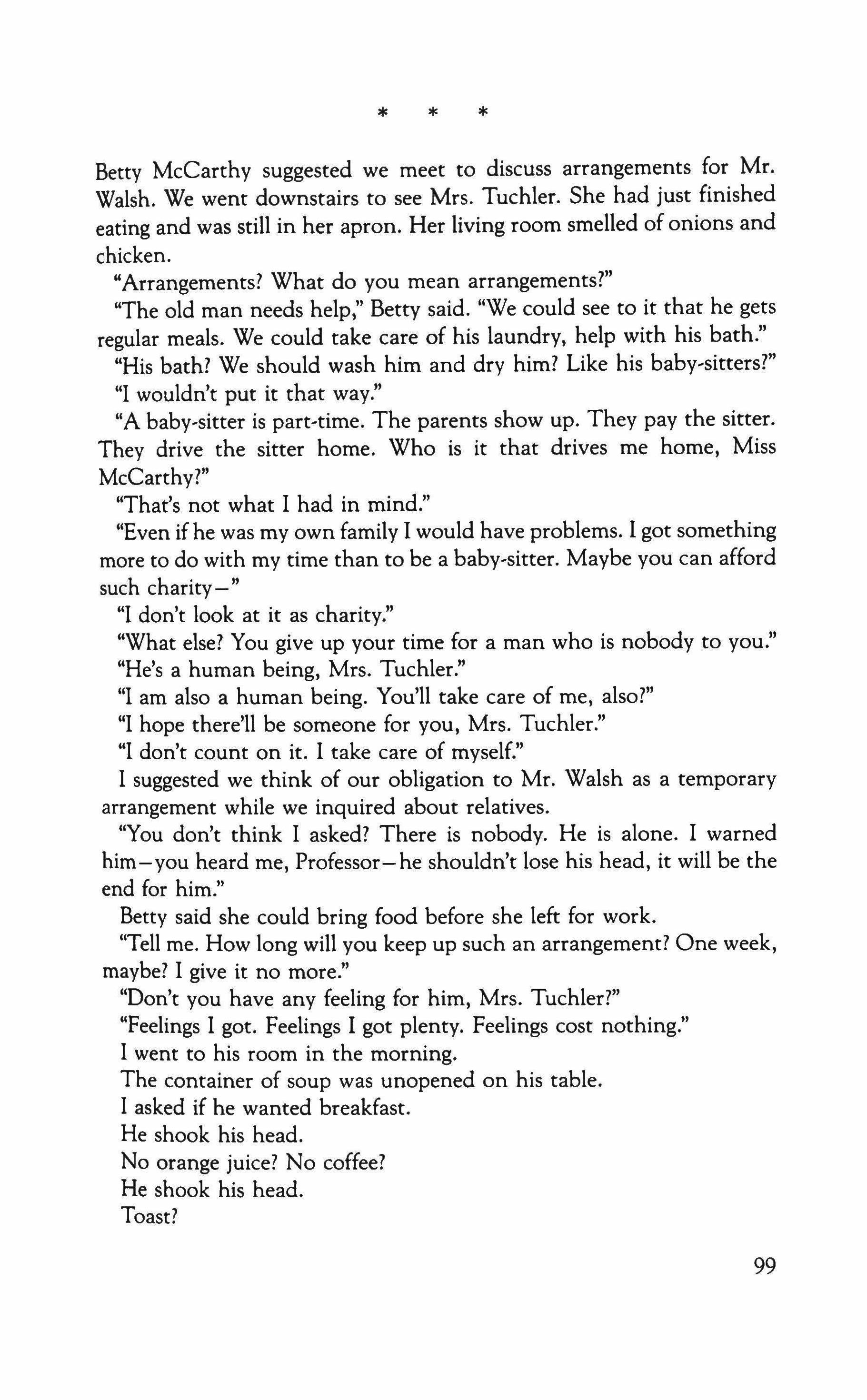
Betty McCarthy suggested we meet to discuss arrangements for Mr. Walsh. We went downstairs to see Mrs. Tuchler. She had just finished eating and was still in her apron. Her living room smelled of onions and chicken.
"Arrangements? What do you mean arrangements?"
"The old man needs help," Betty said. "We could see to it that he gets regular meals. We could take care of his laundry, help with his bath."
"His bath? We should wash him and dry him? Like his baby-sitters?"
"I wouldn't put it that way."
"A baby-sitter is part-time. The parents show up. They pay the sitter. They drive the sitter home. Who is it that drives me home, Miss McCarthy?"
"That's not what I had in mind."
"Even if he was my own family I would have problems. I got something more to do with my time than to be a baby-sitter. Maybe you can afford such charity -
"I don't look at it as charity."
"What else? You give up your time for a man who is nobody to you."
"He's a human being, Mrs. Tuchler."
"I am also a human being. You'll take care of me, also?"
"I hope there'll be someone for you, Mrs. Tuchler."
"I don't count on it. I take care of myself."
I suggested we think of our obligation to Mr. Walsh as a temporary arrangement while we inquired about relatives.
"You don't think I asked? There is nobody. He is alone. I warned him-you heard me, Professor-he shouldn't lose his head, it will be the end for him."
Betty said she could bring food before she left for work.
"Tell me. How long will you keep up such an arrangement? One week, maybe? I give it no more."
"Don't you have any feeling for him, Mrs. Tuchler?"
"Feelings I got. Feelings I got plenty. Feelings cost nothing."
1 went to his room in the morning.
The container of soup was unopened on his table.
1 asked if he wanted breakfast.
He shook his head.
No orange juice? No coffee?
He shook his head.
Toast?
* * *
99
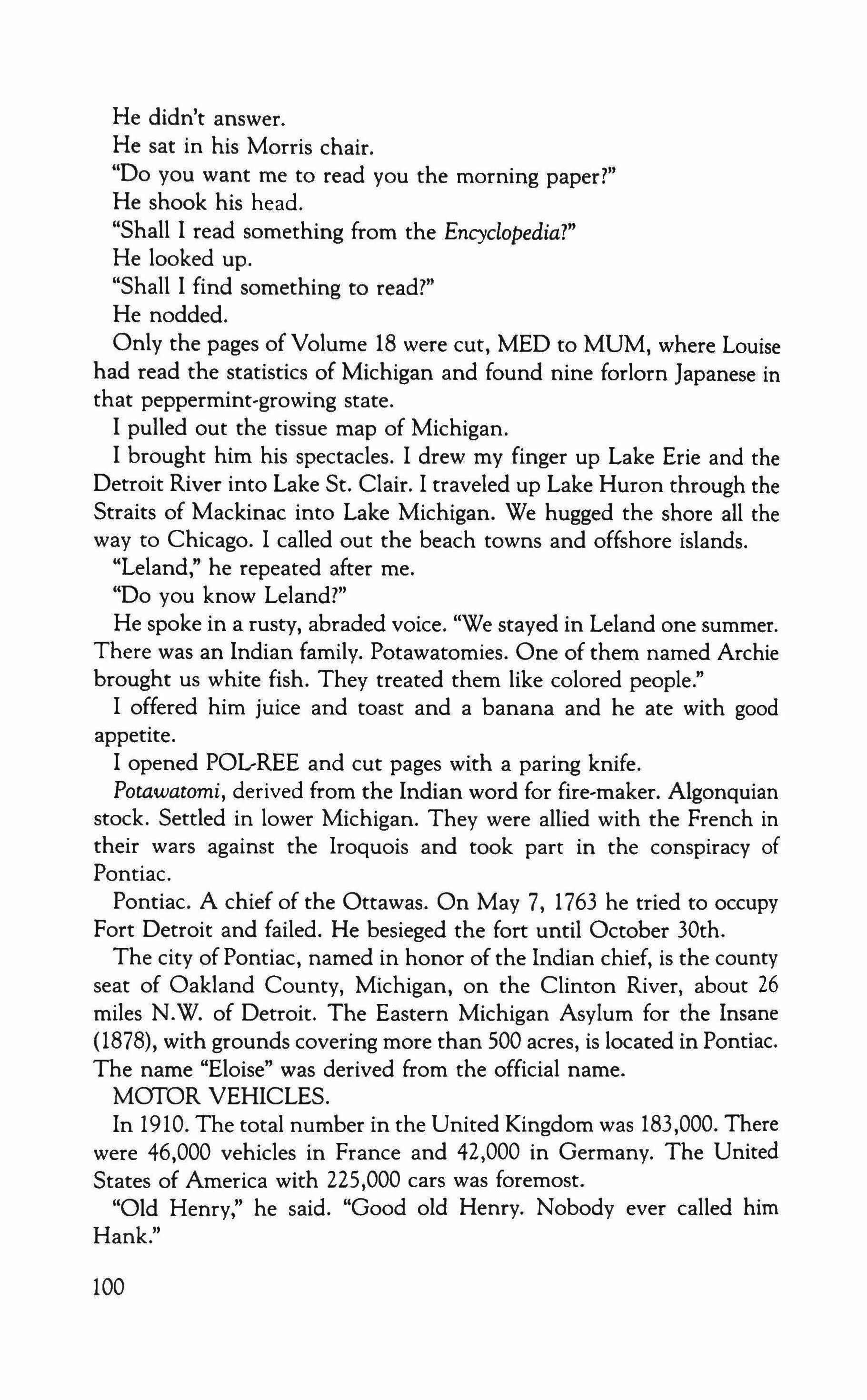
He didn't answer.
He sat in his Morris chair.
"Do you want me to read you the morning paper?"
He shook his head.
"Shall I read something from the Encyclopedia?"
He looked up.
"Shall I find something to read?"
He nodded.
Only the pages of Volume 18 were cut, MED to MUM, where Louise had read the statistics of Michigan and found nine forlorn Japanese in that peppermint-growing state.
I pulled out the tissue map of Michigan.
I brought him his spectacles. I drew my finger up Lake Erie and the Detroit River into Lake St. Clair. I traveled up Lake Huron through the Straits of Mackinac into Lake Michigan. We hugged the shore all the way to Chicago. I called out the beach towns and offshore islands.
"Leland," he repeated after me.
"Do you know Leland?"
He spoke in a rusty, abraded voice. "We stayed in Leland one summer. There was an Indian family. Potawatomies. One of them named Archie brought us white fish. They treated them like colored people."
I offered him juice and toast and a banana and he ate with good appetite.
I opened POL-REE and cut pages with a paring knife.
Potawatomi, derived from the Indian word for fire-maker. Algonquian stock. Settled in lower Michigan. They were allied with the French in their wars against the Iroquois and took part in the conspiracy of Pontiac.
Pontiac. A chief of the Ottawas. On May 7, 1763 he tried to occupy Fort Detroit and failed. He besieged the fort until October 30th.
The city of Pontiac, named in honor of the Indian chief, is the county seat of Oakland County, Michigan, on the Clinton River, about 26 miles N.W. of Detroit. The Eastern Michigan Asylum for the Insane (1878), with grounds covering more than 500 acres, is located in Pontiac. The name "Eloise" was derived from the official name.
MOTOR VEHICLES.
In 1910. The total number in the United Kingdom was 183,000. There were 46,000 vehicles in France and 42,000 in Germany. The United States of America with 225,000 cars was foremost.
"Old Henry," he said. "Good old Henry. Nobody ever called him Hank." 100
There was no mention of Ford in 1910. The invention of the internal combustion engine was attributed to a German, Gottlieb Daimler.
"Henry worked on the internal combustion engine in a garage on Bagley Street. He was with the Edison Illuminating Company."
I opened DEM,EDW and located Detroit, founded in 1701 by Antoine de la Mothe Cadillac (c.1661-1730). Cadillac arrived on the 24th ofJuly with about 1600 followers. They at once built a palisade fort about 200-feet-square south of what is now Jefferson Avenue between Griswold and Shelby Street. Cadillac named it Fort Pontchartrain in honor of the French Colonial Minister.
Betty called to say she might be late and I told her not to rush. The old man seemed back to his ordinary state of unworldliness.
"I'll bring him a bite to eat."
"No wonton soup," I told her. "He's well-stocked."
I checked again that evening before leaving for Diekman's and he was in his chair, nodding off with the radio on.
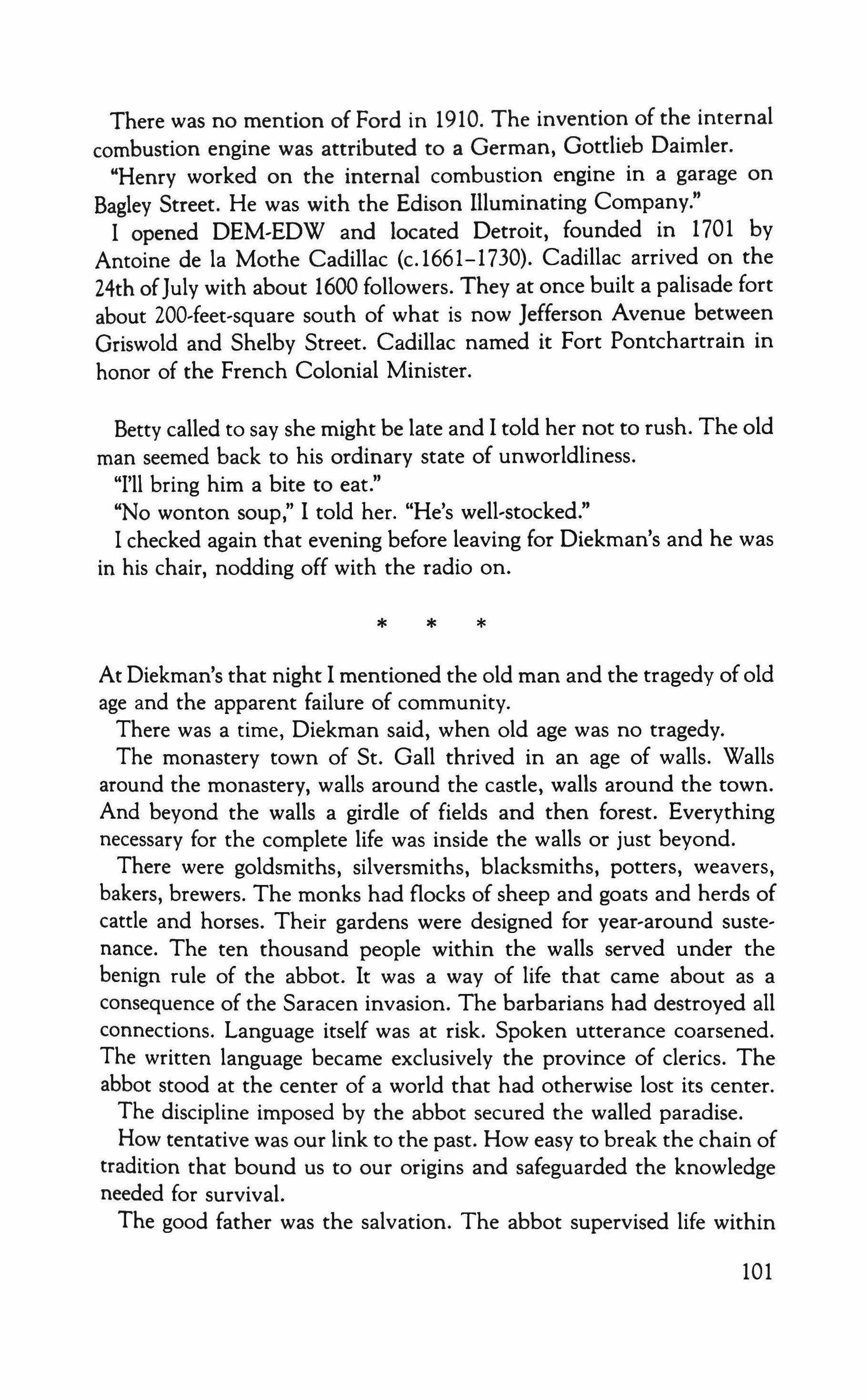
At Diekman's that night I mentioned the old man and the tragedy of old age and the apparent failure of community.
There was a time, Diekman said, when old age was no tragedy.
The monastery town of St. Gall thrived in an age of walls. Walls around the monastery, walls around the castle, walls around the town. And beyond the walls a girdle of fields and then forest. Everything necessary for the complete life was inside the walls or just beyond.
There were goldsmiths, silversmiths, blacksmiths, potters, weavers, bakers, brewers. The monks had flocks of sheep and goats and herds of cattle and horses. Their gardens were designed for year-around sustenance. The ten thousand people within the walls served under the benign rule of the abbot. It was a way of life that came about as a consequence of the Saracen invasion. The barbarians had destroyed all connections. Language itself was at risk. Spoken utterance coarsened. The written language became exclusively the province of clerics. The abbot stood at the center of a world that had otherwise lost its center. The discipline imposed by the abbot secured the walled paradise. How tentative was our link to the past. How easy to break the chain of tradition that bound us to our origins and safeguarded the knowledge needed for survival.
The good father was the salvation. The abbot supervised life within
* * *
101
the walls. Every moment had its definition. Time was marked by the seasons and the sacraments and the holy days. There was no confusion of estates. Every position was clear and distinct.
Diekman said that if he could have arrested history he would have chosen a time before Henry Ford bound us together in a chain of highways and made us one. Divisions were overcome, boundaries removed. Making us one, Ford made us nothing. Letting everyone in, he breached the walls of community, destroyed the distinction between inside and outside, hastened the entropy that would in its final stage bring us again to chaos.
The university should have been our tower, our fortress, our St. Gall. But Wayne was penetrated by city streets, everyone allowed to enter, the university turned from its vocation to safeguard the life of the spirit.
Diekman saw himself, I suppose, as our abbot and Friday nights in his apartment a recreation of St. Gall.
I was ready to settle for a good father.
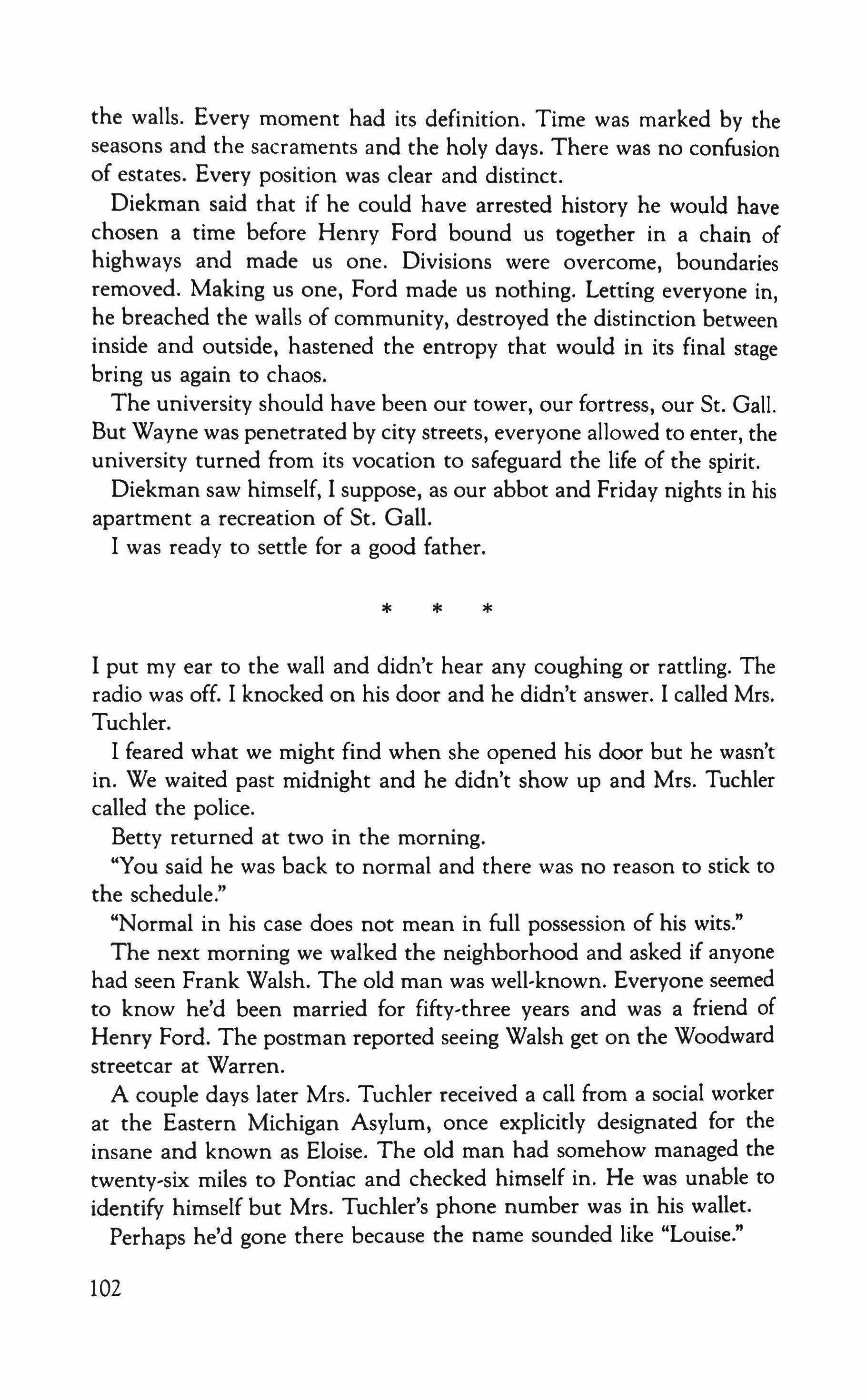
I put my ear to the wall and didn't hear any coughing or rattling. The radio was off. I knocked on his door and he didn't answer. I called Mrs. Tuchler.
I feared what we might find when she opened his door but he wasn't in. We waited past midnight and he didn't show up and Mrs. Tuchler called the police.
Betty returned at two in the morning.
"You said he was back to normal and there was no reason to stick to the schedule."
"Normal in his case does not mean in full possession of his wits."
The next morning we walked the neighborhood and asked if anyone had seen Frank Walsh. The old man was well-known. Everyone seemed to know he'd been married for fifty-three years and was a friend of Henry Ford. The postman reported seeing Walsh get on the Woodward streetcar at Warren.
A couple days later Mrs. Tuchler received a call from a social worker at the Eastern Michigan Asylum, once explicitly designated for the insane and known as Eloise. The old man had somehow managed the twenty-six miles to Pontiac and checked himself in. He was unable to identify himself but Mrs. Tuchler's phone number was in his wallet.
Perhaps he'd gone there because the name sounded like "Louise."
* * *
102

Betty borrowed a 1950 powder-blue Ford coupe and we drove to Pontiac to visit Walsh.
I didn't find out until we were underway that she was a novice driver with only a temporary permit. She leaned forward, clenched the wheel.
"Are you sure you can drive?"
"What's to it?"
I had never learned, myself.
Her chatter ebbed and flowed with the conditions of traffic. She became more confident as we drove out Woodward beyond the zoo. We passed the Wigwam restaurant, the Shrine of the Little Flower where Father Coughlin once presided. She relaxed as traffic diminished. Her conversation steadied. She was a drama student at Wayne. She had played Irina in The Three Sisters. She had been Miriam in Winterset. She'd been enthusiastically reviewed in the college newspaper. Philoso' phy wasn't her thing and she'd never heard of Professor Diekman.
She rattled on and I pretended to listen.
The asylum came into view off the road, a red-brick castle, steep pitched roof clutched by gables, towers with witches' hats. It was the kind of redness you'd get if the brick clay never dried. Inside that red building you felt as if you were underground, even on the top floor in the tiny rooms beneath the plunging roof.
"Well, we're here. Shall we go in?"
Smoke curled from the chimneys of Eloise. The day was cold and the brittle grass cracked when we stepped on it.
The smell of the place must have come from a desperate effort to purge what had been in the red clay from the beginning and could never be removed unless the site were leveled and the remains either carted off or buried.
We were stopped at Reception and told we couldn't see the old man since we weren't relatives but Betty led the way down a corridor. We drifted with visitors and crazy people and old folks. We mingled with the robed and the pajama-ed and those in overcoats and mufflers. We walked up broad stairways illuminated by dull globes, past red lights marking exits, through wards of the ambulant. We came to a corridor where the old folks were seated on cane benches in a glassed-in porch. We found old Walsh in a wheelchair. He wore a threadbare robe. He was so faded and withered we would have passed without recognizing him. A custodian told us, "That's him. That's your grandpa."
* * *
103
"It's Russ Hansen," I told him, "and Betty McCarthy." His lips fluttered, his eyes wouldn't focus.
Betty, who had hardly spoken more than words of greeting to the old man, tried to prod him into response.
"How do you like it here, Mr. Walsh? Do they feed you O.K.? I bet the food's terrible. Do you remember that soup I brought you, Mr. Walsh?" On and on, as if she imagined she could talk him out of senility.
I think he said, "Russ?" The voice was unused and choked and the sound not coherent. I'm not sure he spoke my name.
"We're holding your things for you."
The pale blue eyes didn't record a thing.
I asked if he wanted the picture of Louise in his room. It might make the room more like horne. He didn't respond.
I held his hand for a few moments then placed it on the arm of the chair. He took no further notice and I had nothing to say.
Betty whispered, "Let's go."
Outside her breath frosted. Her long muffler carne loose. She furled it securely. She tugged down on her green tam-o-shanter. "Well," she said, "at least someone saw him."
"What did we see? There's no one there."

He bequeathed Eloise his shadow. The substance remained with Mrs. Tuchler.
There was the Seth Thomas pendulum clock, the wardrobe with the lion's claw feet, his Zenith console, an oak highboy, a gilt-framed photo of himself as a young Irishman-tinted blond, red-cheeked-a companion photo of a corseted Louise with splendid curls and a firm sensible mouth. There were other items that Mrs. Tuchler disposed of-a paperweight with a Currier and Ives snow scene, a signed Maxfield Parrish "Dawn," a hand-crocheted bedspread. And so on. The treasure for me was the Eleventh Edition, in pristine condition.
An Eloise doctor said that Walsh would never be back. He walked when set in motion but the spirit had left the machine. Tuchler said she'd have to get rid of his things. She had no place to store them. Betty wanted the old man's room with its exterior windows. There was already a prospective tenant for the vacancy. There weren't any relatives to assume debts or assets. He owed Mrs. Tuchler several months' back rent. A lawyer advised her she could sell the "junk" - the clock, the wardrobe, the bedstead, the chest of drawers, the dresser with the oval mirror. The
* * *
104
sale would cover her expenses. As for the Encyclopedia, any dealer would be glad to pay a few dollars, but why not keep it in the family?
"You take it, Professor. Give me ten dollars and it is done."
We stalked his dying, and now closed in to feed.
I arranged the Encylopedia on my windowsills, ten volumes to a window and entered its pages.
REF-SAl was still uncut.
The town of St. Gall owes its origin to St. Gall, an Irish hermit, who in 614, built his cell in the thick forest which then covered the site of the future monastery, and lived there, with a few companions, till his death in 640. Many pilgrims later found their way to his cell, and about the middle of the eighth century the collection of hermits' dwellings was transformed into a regularly organized Benedictine monastery. For the next three centuries this was one of the chief centers of learning and education in Europe. About 954 the monastery and its buildings were surrounded by walls as a protection against the Saracens, and this was the origin of the town.
The Encyclopedia offered whatever anyone wanted in the way of towns, cities, continents, even the starry universe. Walsh wanted nothing. He only claimed a bed in a ward at Eloise.
Mrs. Tuchler gave Betty the photographs of Walsh and Louise, valuable for the elaborate, gilt frames.
The poor old guy, Betty said. No one cared. And we were already divvying up the spoils.
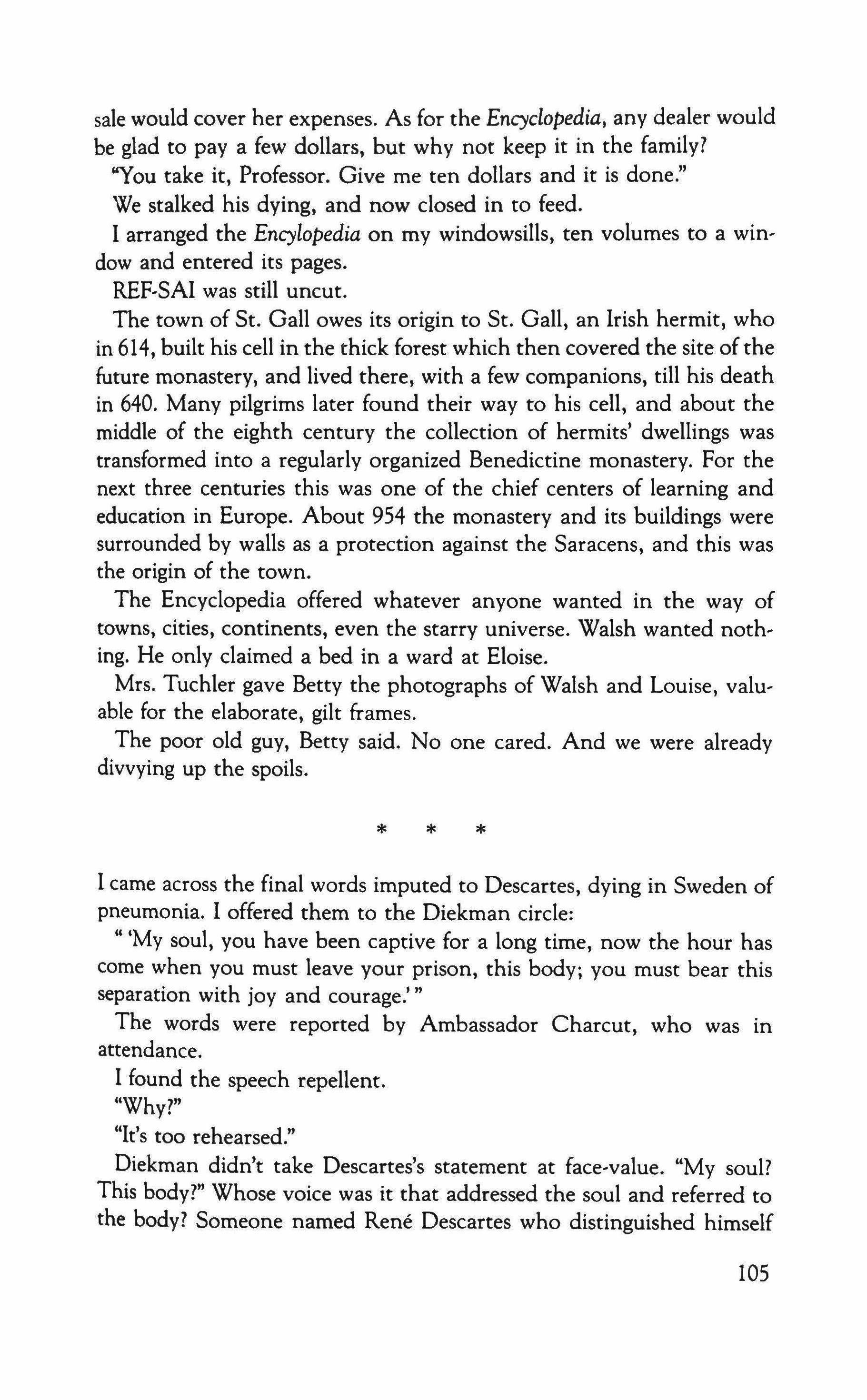
I came across the final words imputed to Descartes, dying in Sweden of pneumonia. I offered them to the Diekman circle:
"'My soul, you have been captive for a long time, now the hour has come when you must leave your prison, this body; you must bear this separation with joy and courage.'''
The words were reported by Ambassador Charcut, who was in attendance.
I found the speech repellent.
"Why?"
"It's too rehearsed."
Diekman didn't take Descartes's statement at face-value. "My soul? This body?" Whose voice was it that addressed the soul and referred to the body? Someone named Rene Descartes who distinguished himself
* * *
105

from his soul and body? "Where is the voice housed that speaks to 'my sour? Who is the third man who intrudes between body and soul?"
Vincenti suggested that the voice of Ego occurs at a higher level of language than the mention of body and soul and so doesn't intrude between them.
Diekman dismissed this solution. "It's simpler to not accept the speech at its face-value. Though clearness and distinctness are everything to Descartes, he doesn't have time to make his meaning clear when he's dying. His language becomes condensed, ambiguous, poetic. Surely he doesn't mean to say that the soul of Rene Descartes will survive disembodiment as a ghost of himself. Who would the ghost resemble? There is no single Descartes. He has passed-as we all do-through a series of transformations, from youth to age, from health to illness. So even if there were cameras available, no single representation would serve. There's no fixing him once and for all. Isn't he simply foretelling what in fact turns out to be the case? Descartes tells us, as he's dying, that he welcomes his disembodiment and his coming immortality. Cartesianism will survive, he tells us."
I offered a simpler explanation. Descartes didn't make the deathbed speech. A man dying of pneumonia wouldn't have had enough wind for that speech. It must have been composed by Charcut, an avid Cartesian.
"That, too," Diekman said, "is irrelevant. The separation of body and soul is a fable. The fable holds that we are victims of our appetites and only free when appetite diminishes. Glaucon, for example, welcomes old age and the ebbing of desire. We have other uses for a fable than to question its truth."
"The truth about dying," I said, "is that it leaves you speechless."
I was hooted down for offering "the truth about dying." They weren't tempted to move the discussion in a morbid direction. It was raining; snow was on the way; we were cozy inside, dining by candlelight, a fire crackling in a frame of ceramic tiles.
The supper that night featured a seafood pasta, served in a porcelain tureen. Prawns and scallops and crabmeat were added to each portion of pasta and the dish topped with sauteed peas and carrots.
Vincenti asked for grated cheese but the Professor told him grated cheese was not served with seafood pasta.
Diekman's bathroom was a large, tiled room, entered through a dressing alcove. I opened a cabinet and saw thick towels rolled in the shape of loaves of bread in hues of red, blue, green, yellow. Above the double basin of pink porcelain there was a large mirror circled by flourescence.
106
The medicine cabinet revealed a man who must have suffered in every part. There were capsules for muscle spasm. He used sedatives and laxatives. There were medicines for eyes, skin, feet, rectum.
He clearly took great care before presenting himself. There was a tub with an aluminum railing and a separate shower stall. A shelf, straddling the bath, contained bath oil, skin lotion, pumice stone. On the lip of the tub there were shampoos and moisturizers. On the marble commode there were soaps in a variety of shapes, little balls in gaudy wrappers, rounds of soap, rectangles of soap, a green-flecked soap in the form of a fish, another shaped from transparent, pink gel into the form of a cupid. A basket of potpourri on the water tank shed a cinnamon, ginger odor.

There was little evidence ofshit in that room and hardly any evidence in the Eleventh Edition. I opened SAl,SHU and didn't find a listing. There were no entries for excreta or feces in EVA,PRA.
The encyclopedia contained the world in almost every feature but only a Latinate mention of shit under sewage where there was a discus, sion of the use of "excreta" as manure and the storing of excreta in middens and cesspools. The method for disposing of feces in 1910 was the same as ours today, dilution and defecation through pipes four to six inches in diameter.
I shoved open the bathroom door. Either the latch didn't hold or she was neglectful. Betty was poised at the sink in an open kimono, her left leg extended, foot in the basin, leaning forward soaping painted toes, red hair floating down over her eyes, a glimpse of freckled breasts, the rusty thatch below, the tensed right leg sturdy and muscular. "Sorry," I said and shut the door.
I apologized when she came out.
"No problem. I should have made sure the door was locked."
"Anyway," I said, "it's a gorgeous view."
She moved into Walsh's room, her bed against the wall dividing us. We were separated by six inches of lathe and air and plasterboard. I could hear the rustle of her sheets and the squeal of springs.
One early morning before dawn I knocked at her door.
"Who is it?"
I whispered, "Russ," and she opened to me.
* * *
* * *
107

I knew that the charges I brought against Diekman in the court of my mind wouldn't hold. Was his john too lavish? Was he to blame for the way Vincenti ate, for Descartes's foolish death, for the absence of any reference to Iron Mountain or lost fathers or shit in the Eleventh Edition? The grievances were trivial but suddenly his walled city closed in on me and I felt entombed and couldn't bear listening to him tidy up the world.
I dropped out of the Diekman circle. I left without saying a word to Diekman. I had nothing to say. I couldn't give an account of a defection I didn't understand. I abandoned campus. I didn't answer Vincenti's messages. I prepared to move from the neighborhood. I was with Betty so it's not entirely true that I was in despair.
I met him again, possibly for the last time, shortly after Christmas. Trees were still up, stars still in windows, there was new snow on the ground. I was shopping at the Kroger's Market. I walked down the soup aisle and there he was in overcoat, muffler, gloves, a basket in his hand, his cane hooked on an arm, wearing a Russian-style fur hat.
It wasn't his neighborhood or his kind of store and I didn't expect to meet him there.
Yes, he said, a surprising place to meet. He didn't ordinarily shop here. He was careful about food, as he was sure I knew, but he felt a cold coming on and didn't have time or energy for refined shopping. At any rate, the objects he carried were only apparently trivial. He held up the soup can glorified by Andy Warhol. He spoke in full voice, no evidence of a cold. He praised Warhol for transforming banality and demonstrating that food had become something other than food. A citizen of midtwentieth-century America was free of the necessity imposed by brute hunger and didn't have to spend a major effort tracking down the next meal. The package was now more important than the soup.
He had once scorned salesmen as purveyors of kitsch and schlock. Now he understood that they were, in fact, visionaries of the commonplace, true esthetes who awakened us to neglected beauty and enlarged our world. We could enter Kroger's as we once entered a gallery of art.
He denied the food he craved and passed off the denial as art.
I was outraged by the show he put on for random shoppers who had stopped traffic in the aisle to listen. He didn't ask me where I'd been. He didn't give me a chance to make excuses.
"Food isn't a priority with me and I don't care how it comes wrapped."
He nodded, smiled. It was the betrayal he expected. He offered me a
* * *
108
slanted, mocking look. "We welcome the moment when our children instruct us so we can cut them free."
He acknowledged me as his child and there are times when I can imagine pleading, "Take me back. I've lost my way."
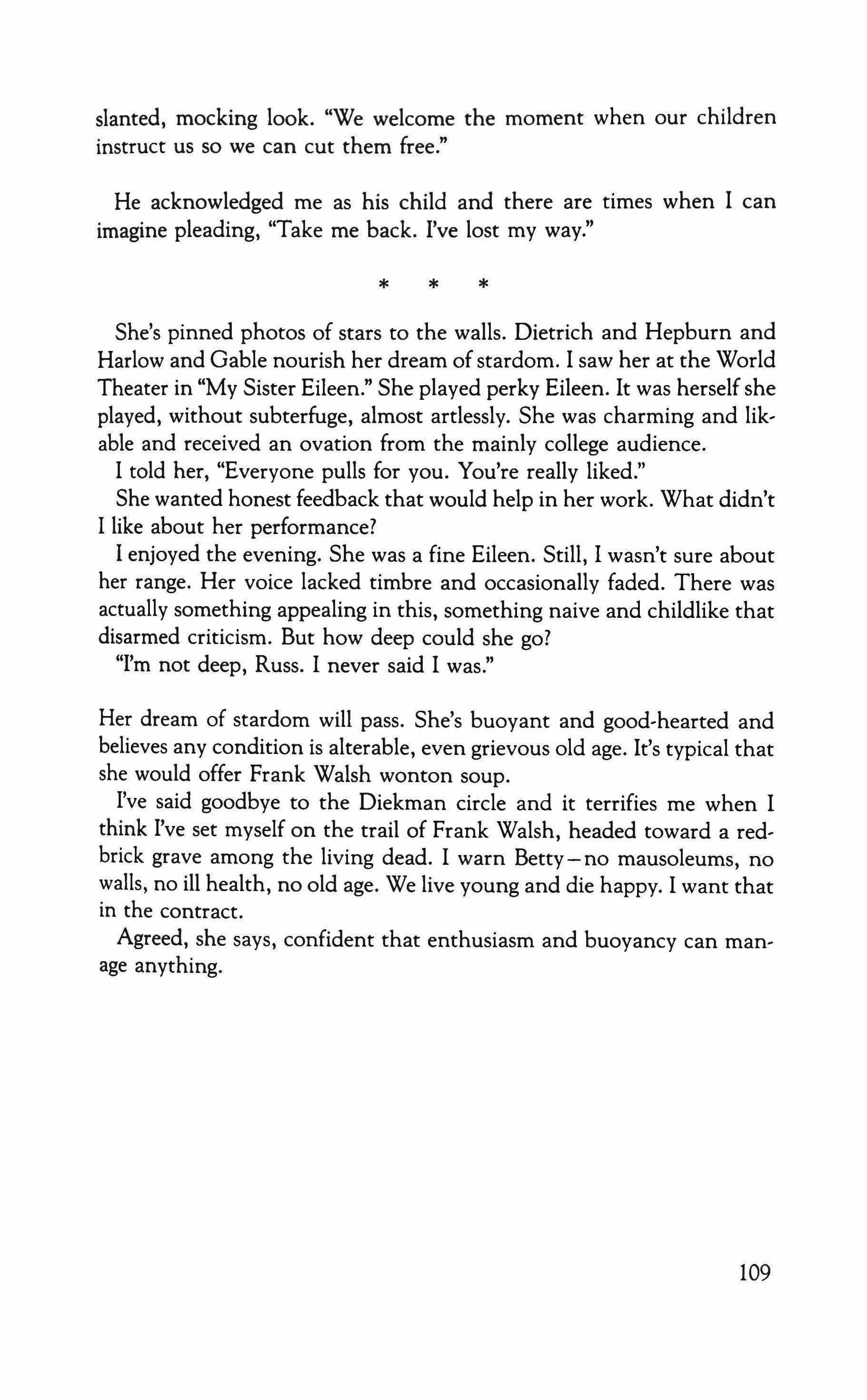
She's pinned photos of stars to the walls. Dietrich and Hepburn and Harlow and Gable nourish her dream of stardom. I saw her at the World Theater in "My Sister Eileen." She played perky Eileen. It was herselfshe played, without subterfuge, almost artlessly. She was charming and likable and received an ovation from the mainly college audience.
I told her, "Everyone pulls for you. You're really liked."
She wanted honest feedback that would help in her work. What didn't I like about her performance?
I enjoyed the evening. She was a fine Eileen. Still, I wasn't sure about her range. Her voice lacked timbre and occasionally faded. There was actually something appealing in this, something naive and childlike that disarmed criticism. But how deep could she go?
"I'm not deep, Russ. I never said I was."
Her dream of stardom will pass. She's buoyant and good-hearted and believes any condition is alterable, even grievous old age. It's typical that she would offer Frank Walsh wonton soup.
I've said goodbye to the Diekman circle and it terrifies me when I think I've set myself on the trail of Frank Walsh, headed toward a redbrick grave among the living dead. I warn Betty - no mausoleums, no walls, no ill health, no old age. We live young and die happy. I want that in the contract.
Agreed, she says, confident that enthusiasm and buoyancy can manage anything.
* * *
109
Engraver's Cove
Kate Kaufman

On the night of the toboggan accident, there was a full moon. I remember that, and I remember how it made too much light and too little color, so that the woods looked like a faded photograph, something already half-forgotten. I remember how the tree seemed to materialize in front of us, and how I lost my place in the world, feeling like I was falling from a height instead of being thrown sideways. When I landed, the earth was made of wood. I had been second in the toboggan and anyone might have thought that the woman sitting in front of me would have cushioned the impact of the blow, but I seem to have sailed over the top of her and hit the tree midway on its trunk. She was killed; she was, I've been told, my best friend since childhood.
Coming out of the coma, I heard someone beg me for my name. Just to keep her quiet, I said, "Ann Davidian." So it was reported that I had only partial memory loss, even though my own hands did not look familiar to me. For days, my mother and father brought people into my room, hoping for the face that would break down the dam and flood the room with my memories. One young man sat all day, every day, in a chair in the corner, and asked me from time to time if I was thirsty or wanted to watch TV. After four days, I asked, "Who are you?" He bit his bottom lip and after a minute explained that we were close; close, in fact, to becoming engaged. He left then, and I did not see him often again.
My mother was a persistent, red-haired woman, and she sat by my bed for hours, showing me snapshots and asking, "Do you remember anything else?" Anything else besides my name, she meant. I remembered quite a bit, I thought: algebra equations and word definitions and questions I'd been asked on my college-board tests. But I didn't seem to
110

remember anything she wanted me to know, and she cried quite a bit until I learned to pretend, just a little, to calm her and make her happier.
It was not one of my mother's photographs that brought the place back to me, but a dream of my own, one evening when I fell asleep. It was a row ofcottages facing the water, and the sun streamed through the trees on a late summer afternoon. People waved to me; people knew me, and in the dream I seemed to know them, too, and liked them all. After I woke, the dream gathered force, until I ached with the longing to go there, to this place I felt certain was my home. I remembered other things about it: that beyond the cottages on a point, there was a lighthouse. That there was an inn facing a town square, and the square had a bronze statue of a nineteenth-century man. That there was a bay of unusual depth, half-hemmed-in by an island, and that the water there was a strange inky color, and cold. Remembering it, I started to cry. "What's the matter, sweetheart?" asked my mother. "Engraver's Cove," I said, the name shocking me, a filling fallen out of my mouth. "I want to go back there."
My mother started to cry, too, and then my father walked into the room and she said, "Darling, Ann remembers Susan, and the summers they spent at Engraver's Cove."
It was a lie that my mother told herself. I didn't remember Susan, the woman who had been killed in the toboggan accident. In my memories of Engraver's Cove, I seemed to be alone. But it was so important to them, to be able to say to people, "Of course, she remembers Susan." And when Susan's mother came to visit me, in her black wool coat and paper-white face, she said, "I wish we hadn't sold the house at the Cove. I would take you back there, if I could," and I loved her.
After a month, I was allowed to leave the hospital. There was no question then of my returning to college, where it seemed I was only a semester away from graduation. I spent a year and a half with my parents, going on shopping trips with my mother, looking at home movies with my father, sitting in the backyard in the summer with a photograph album on my lap, to please them. I was treated cautiously, with great care, like old fabric that might tear in one's hands if tweaked the wrong way.
My life and my memory seemed to travel together on the same plateau until my grandmother, who was somewhere in a hospital or nursing home, died. My mother and I inherited equal portions of money. After the funeral, I told my parents I wanted to go on a trip, to Engraver's Cove. "Ann is terribly upset about her grandmother," I heard my
III
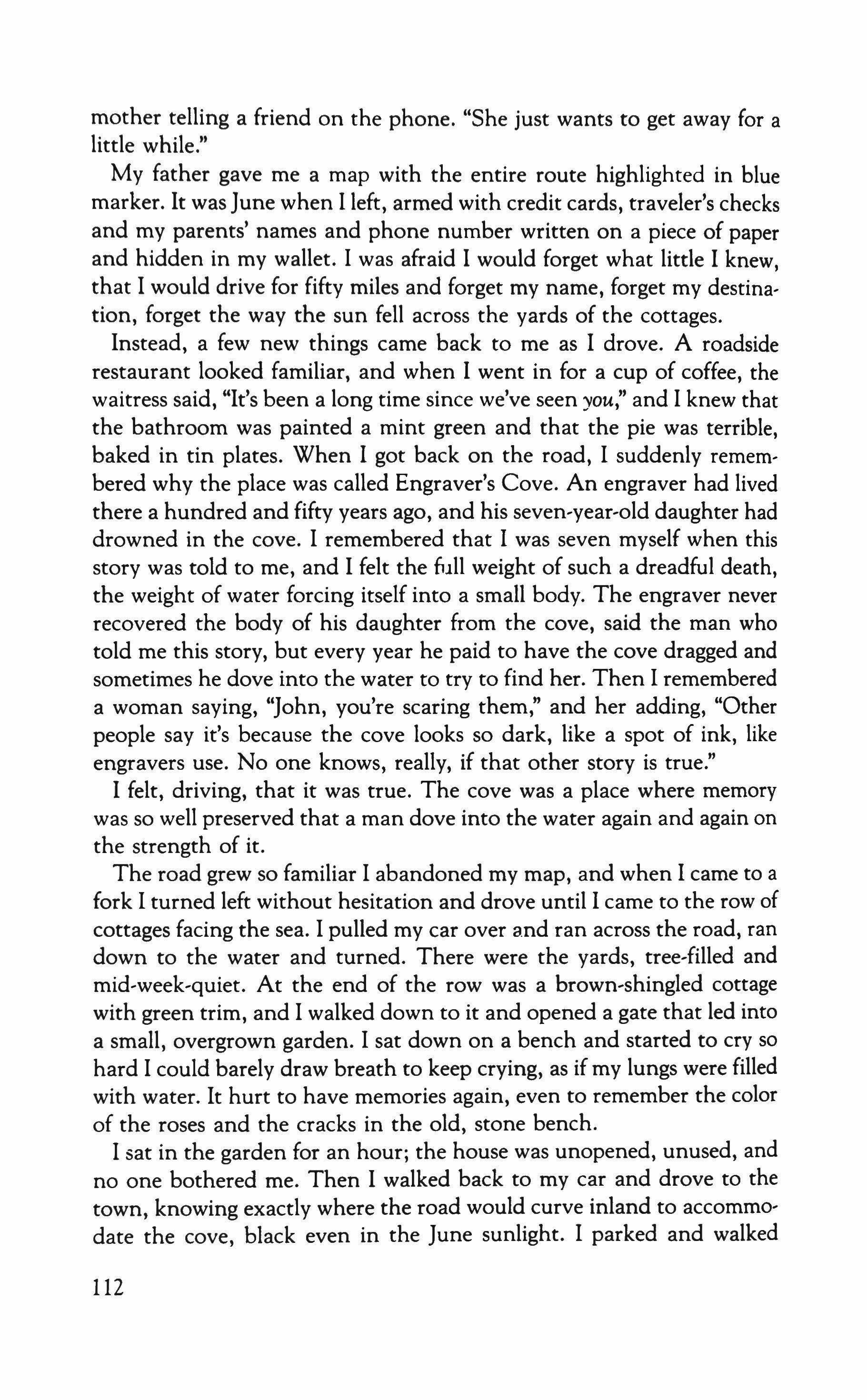
mother telling a friend on the phone. "She just wants to get away for a little while."
My father gave me a map with the entire route highlighted in blue marker. It was June when I left, armed with credit cards, traveler's checks and my parents' names and phone number written on a piece of paper and hidden in my wallet. I was afraid I would forget what little I knew, that I would drive for fifty miles and forget my name, forget my destination, forget the way the sun fell across the yards of the cottages.
Instead, a few new things came back to me as I drove. A roadside restaurant looked familiar, and when I went in for a cup of coffee, the waitress said, "It's been a long time since we've seen you," and I knew that the bathroom was painted a mint green and that the pie was terrible, baked in tin plates. When I got back on the road, I suddenly remembered why the place was called Engraver's Cove. An engraver had lived there a hundred and fifty years ago, and his seven-year-old daughter had drowned in the cove. I remembered that I was seven myself when this story was told to me, and I felt the full weight of such a dreadful death, the weight of water forcing itself into a small body. The engraver never recovered the body of his daughter from the cove, said the man who told me this story, but every year he paid to have the cove dragged and sometimes he dove into the water to try to find her. Then I remembered a woman saying, "John, you're scaring them," and her adding, "Other people say it's because the cove looks so dark, like a spot of ink, like engravers use. No one knows, really, if that other story is true."
I felt, driving, that it was true. The cove was a place where memory was so well preserved that a man dove into the water again and again on the strength of it.
The road grew so familiar I abandoned my map, and when I came to a fork I turned left without hesitation and drove until I came to the row of cottages facing the sea. I pulled my car over and ran across the road, ran down to the water and turned. There were the yards, tree-filled and mid-week-quiet. At the end of the row was a brown-shingled cottage with green trim, and I walked down to it and opened a gate that led into a small, overgrown garden. I sat down on a bench and started to cry so hard I could barely draw breath to keep crying, as if my lungs were filled with water. It hurt to have memories again, even to remember the color of the roses and the cracks in the old, stone bench.
I sat in the garden for an houri the house was unopened, unused, and no one bothered me. Then I walked back to my car and drove to the town, knowing exactly where the road would curve inland to accommodate the cove, black even in the June sunlight. I parked and walked
112

down the street. I passed the inn and remembered going to a party there, remembered Japanese lanterns and candle torches outside. I looked in the windows of several shops, and when I reached a store that sold antique maps and engravings, I walked in.
A tall, blond man glanced at me as I entered, and the color left his face. "Ann!" he said, stunned. I felt the blankness on my face, and a terrible grief came over his. "You act like you don't even remember me," he said.
Not to be remembered. I had come to think of it as the worst abandonment in the world, and I couldn't hurt one more person with it, not here, not home. "Of course I remember you," I said. "I just wasn't expect' ing to see you here." Patrick, I wanted to say. Patrick; but I didn't say it, I was afraid it would be wrong.
"That's right," he said. "You wouldn't have known I bought this place, from Brock. A year ago, I took it over. Oh, God, Ann," he said, and came out from behind the counter and put his hands on my shoulders. "I know you must have felt awful about Susan, so did I, but I never thought you'd just cut me off like that."
"I'm sorry," I said. "I'm really sorry."
He looked down at me for a long time and seemed to be fighting back tears. "I forgive you," he said finally. "I always forgave you everything, didn't l?"
"Yes," I said.
His hands still on my shoulders, he looked at the clock. "I still take the mail to the island. Do you want to come?"
"Oh, yes," I said. I followed him out the door, and we walked down the street to the docks. When we passed the inn, I said, "I remember the party here."
He looked shocked, as if it was something that no one ever men' tioned. "Yes," he said. ''The engagement party for Susan and me."
"Yes," and before I could stop myself, I added, "The Japanese lanterns."
He smiled a little. "Your pink dress," he said. Then we walked down to the docks in silence, the rest of the way. I helped him untie a Boston Whaler from the farthest dock, and a man handed us a canvas mailbag. "What are you doing back here?" he asked me.
"I've inherited some money," I said. "From my grandmother." Then, as the thought came to me, I added, "I'm thinking of buying a house here."
"Your grandmother's dead?" From his voice I could tell he had known her. "Was it another heart attack?"
"Yes," I said. "In the end. Another heart attack."
113

"I'm sorry," he said. "She was a great lady. I'll never forget her."
Tell me about her, I wanted to say, and I wanted to say, Patrick. But I didn't.
We crossed the cove, cutting a white path on the black surface. I knew suddenly that, as soon as we rounded the island, we would see a long dock. A man stood on the dock, and his shape against the sky was so familiar that I waved to him. "Ann!" he shouted, and when the Boston Whaler pulled up to the dock, I let him lift me out of the boat and I hugged him. I knew his face, crosshatched with wrinkles, and I knew his name. "Jerry," I said.
"You've got her back again, I see, Pat," said Jerry.
"She came back on her own," said Patrick and he smiled. "She's looking for a house in the cove."
"We've missed you, Ann," said Jerry. "Last summer, without you. It seemed real strange, your not being here."
"It seemed strange to me, too," I said. "I wanted to come. But I couldn't."
"Yes," said Jerry. "Susan. What a terrible thing that was. What a terrible thing for her parents."
"It was awful for them," I said.
''They should have let her stay here, like she wanted," said Jerry. "They should have let her take that year off from school, like she asked. They shouldn't have sold the place."
"I guess not," I said.
Jerry took the mailbag from Patrick, and punched him gently on the shoulder. ''Now that she's back, you keep an eye on her," he said.
"Count on it," Patrick answered.
I looked over to my right, and saw the lighthouse on the point, out beyond the cottages. Patrick helped me back into the boat, and I stumbled a little, looking at the lighthouse. I needed to remember something about it. I couldn't, but I felt calm. I had the feeling you have when you lose something inside your own home, when you say, "It will turn up. It's here somewhere." I cast off from the dock and gave the piling a push, and the Whaler moved effortlessly beneath me. Suddenly, I felt that fear of falling I'd had from time to time since the accident, and I sat down abruptly. "All set?" asked Patrick, and when I nodded, he started the engine.
When we came back up to the cove dock, he said, "What are you going to do now?"
"Look for a house, I guess. Start to look for one."
114

"You'll go to Maggie Kelsey?" he asked. I nodded. "She's got a new office. It's on that block behind the inn."
"Thanks," I said.
He jumped onto the dock, and helped me up. He held onto my arm. "You're not going to leave this afternoon, are you? You won't leave without telling me?"
"No." I wondered what exactly I'd done to him, that he trusted me so little.
"Ann," he said, and then looked away, back toward the island. "Turner?"
The young man who had sat in the chair at the hospital. I didn't answer, but when he looked back to me, I shook my head. "When did you stop seeing him?" Patrick asked.
"About a year and a half ago," I said. "Right after Susan died."
He held my arm while we walked back to the village, and then I turned at the inn and went to the real-estate office. "Why, Ann Davidian," said the woman sitting behind the desk.
"Hello, Maggie Kelsey," I said. "I've come to buy a house from you."
She showed me photographs and then drove me to two houses. One was back in the woods, away from the sea, and the second was past the row of cottages I remembered, on the other side of the lighthouse. "Maybe you remember this house:' Maggie said, unlocking the door. "The Wagners owned it until you were, oh, about sixteen, I'd say." We walked into the hallway. "I remember:' I said. "Sally Wagner." The hallway was empty, but once it had held an old, oak chest, and there were always flowers on it, yellow flowers in a pewter vase.
"Sally's married now, you know," said Maggie, walking into the living room.
"I didn't know that," I said. I felt I hadn't liked Sally Wagner, but I wasn't sure why.
"She and Susan fought like cats and dogs, didn't they? All the way through high school."
"Yes," I said. "That's right."
"I'm sorry," said Maggie. "Maybe you don't want to talk about Susan. I forgot, really, for a minute. About her passing away."
"No," I said. "I don't mind talking about her."
Maggie drove me back to town. I drank a cup of coffee at the corner restaurant. At five o'clock, I walked back to Patrick's shop.
"I'm here," I said. "I haven't left."
"I see that," he said. "Let's go get some dinner."
We went to a place for pizza, and Patrick talked about his year in 115
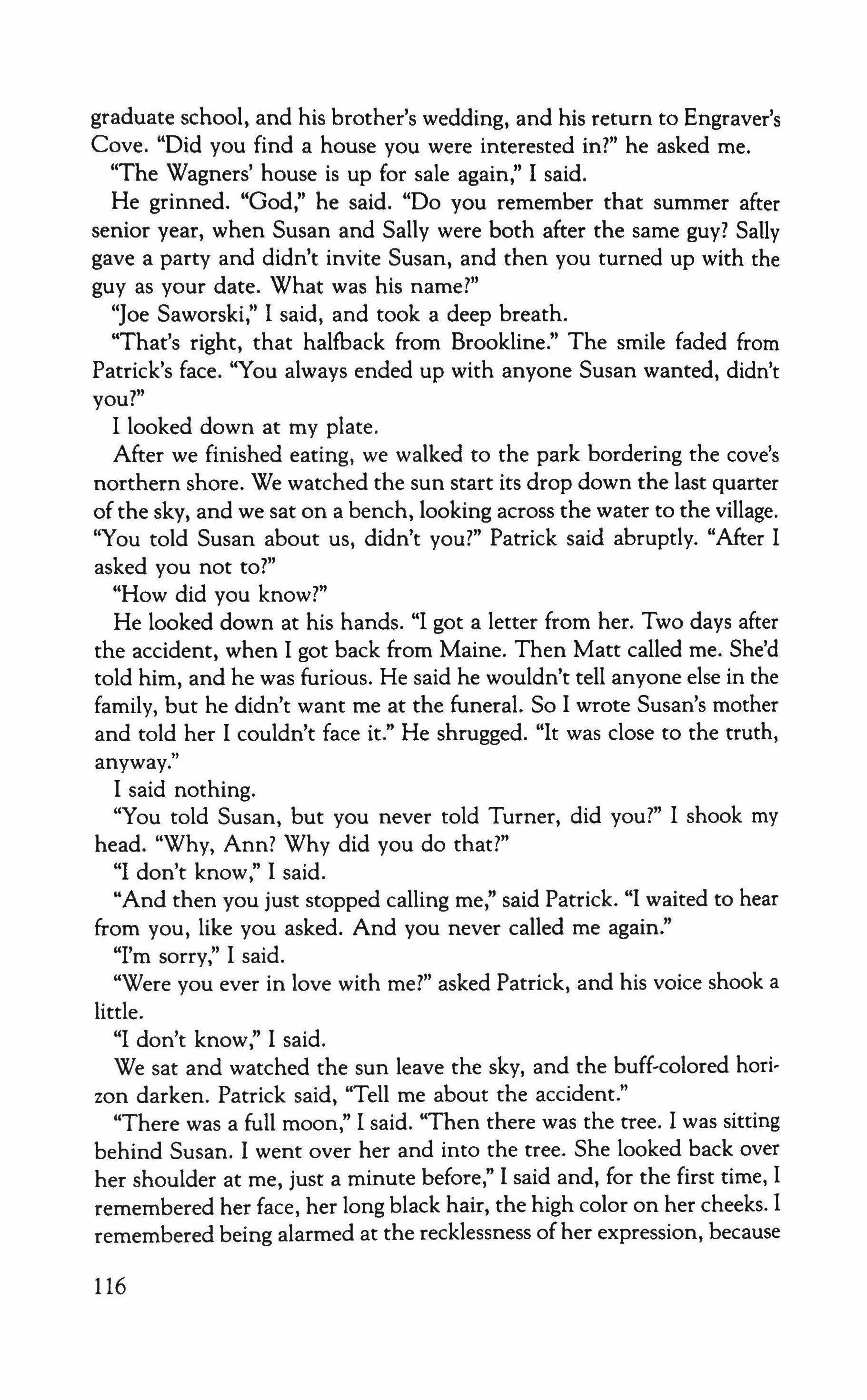
graduate school, and his brother's wedding, and his return to Engraver's Cove. "Did you find a house you were interested in?" he asked me.
"The Wagners' house is up for sale again," I said.
He grinned. "God," he said. "Do you remember that summer after senior year, when Susan and Sally were both after the same guy? Sally gave a party and didn't invite Susan, and then you turned up with the guy as your date. What was his name?"
"Joe Saworski," I said, and took a deep breath.
"That's right, that halfback from Brookline." The smile faded from Patrick's face. "You always ended up with anyone Susan wanted, didn't you?"
I looked down at my plate.
After we finished eating, we walked to the park bordering the cove's northern shore. We watched the sun start its drop down the last quarter of the sky, and we sat on a bench, looking across the water to the village. "You told Susan about us, didn't you?" Patrick said abruptly. "After I asked you not to?"
"How did you know?"
He looked down at his hands. "I got a letter from her. Two days after the accident, when I got back from Maine. Then Matt called me. She'd told him, and he was furious. He said he wouldn't tell anyone else in the family, but he didn't want me at the funeral. So I wrote Susan's mother and told her I couldn't face it." He shrugged. lilt was close to the truth, anyway."
I said nothing.
"You told Susan, but you never told Turner, did you?" I shook my head. "Why, Ann? Why did you do that?"
"I don't know," I said.
"And then you just stopped calling me," said Patrick. "I waited to hear from you, like you asked. And you never called me again."
"l'm sorry," I said.
"Were you ever in love with me?" asked Patrick, and his voice shook a little.
"I don't know," I said.
We sat and watched the sun leave the sky, and the buff-colored horizon darken. Patrick said, "Tell me about the accident."
"There was a full moon," I said. "Then there was the tree. I was sitting behind Susan. I went over her and into the tree. She looked back over her shoulder at me, just a minute before," I said and, for the first time, I remembered her face, her long black hair, the high color on her cheeks. I remembered being alarmed at the recklessness of her expression, because
116
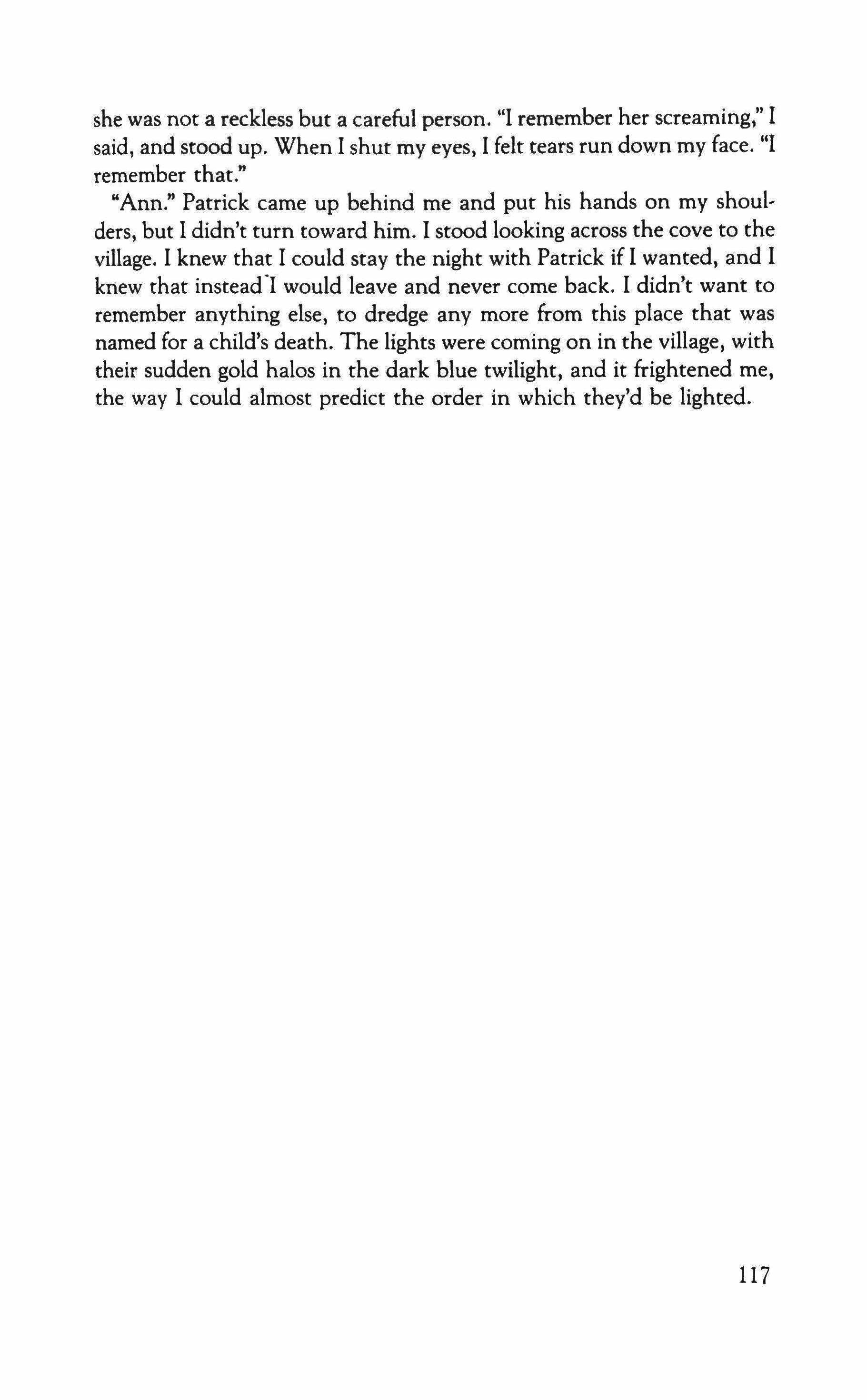
she was not a reckless but a careful person. "I remember her screaming," I said, and stood up. When I shut my eyes, I felt tears run down my face. "I remember that."
"Ann." Patrick came up behind me and put his hands on my shoulders, but 1 didn't turn toward him. 1 stood looking across the cove to the village. I knew that I could stay the night with Patrick if I wanted, and 1 knew that insteadI would leave and never come back. 1 didn't want to remember anything else, to dredge any more from this place that was named for a child's death. The lights were coming on in the village, with their sudden gold halos in the dark blue twilight, and it frightened me, the way 1 could almost predict the order in which they'd be lighted.
117
Alvin Jones's Ignorant Wife
Margaret Broucek

I work with a young gal who don't think her husband is gon fool around, hmmm? She's not a stupid gal, just ignorant. I know he will. But she ain't married yet, not even a boyfriend around, so she's got this vision, see, how it's gonna be for her.
She cornered me and Alice and Yvonne in the emulsion room one day and I knew she was gon bring it up again. She says to us, "Hey now, here's my pointyou all haven't fooled around on your husbands, have you?" She didn't get an answer right off, so she asked Yvonne-"Yvonne, see I know you haven't fooled around." Yvonne was standing at the counter next to me and I see her pocked chin's hanging lower than usual. Well, Alice pipes right up. "Let's all say we have!" And me and Yvonne didn't have a choice, had to go along with that. Girl's eyes peeled open, slow, and she looked so she like to had a baby! I sure felt bad for her-just dropped her big lip, turned around and left. And I know what'll happen to her. She'll be running round in her yard; she'll draw a crowd, like that woman we all saw dancing with the gun.
I messed with Alvin Jones a while back, when my kids was young. He lived across the street with his string bean, Carla? Karen?, don't know what it was. Alvin was a big man, see, and built so nice. I could make an afternoon watching him wax his car in his small shorts and nothing else. And he always had a good word for me. Well it didn't last long, now, and really I just wanted to smell him up close (didn't Yvonne laugh when I told her that). He helped me in with my grocery bags one day. That was the start. I told him "just set them on the kitchen counter and thanks a lot." But he wanted a powdered doughnut out of one of those long boxes with the cellophane window. That was the start.
118
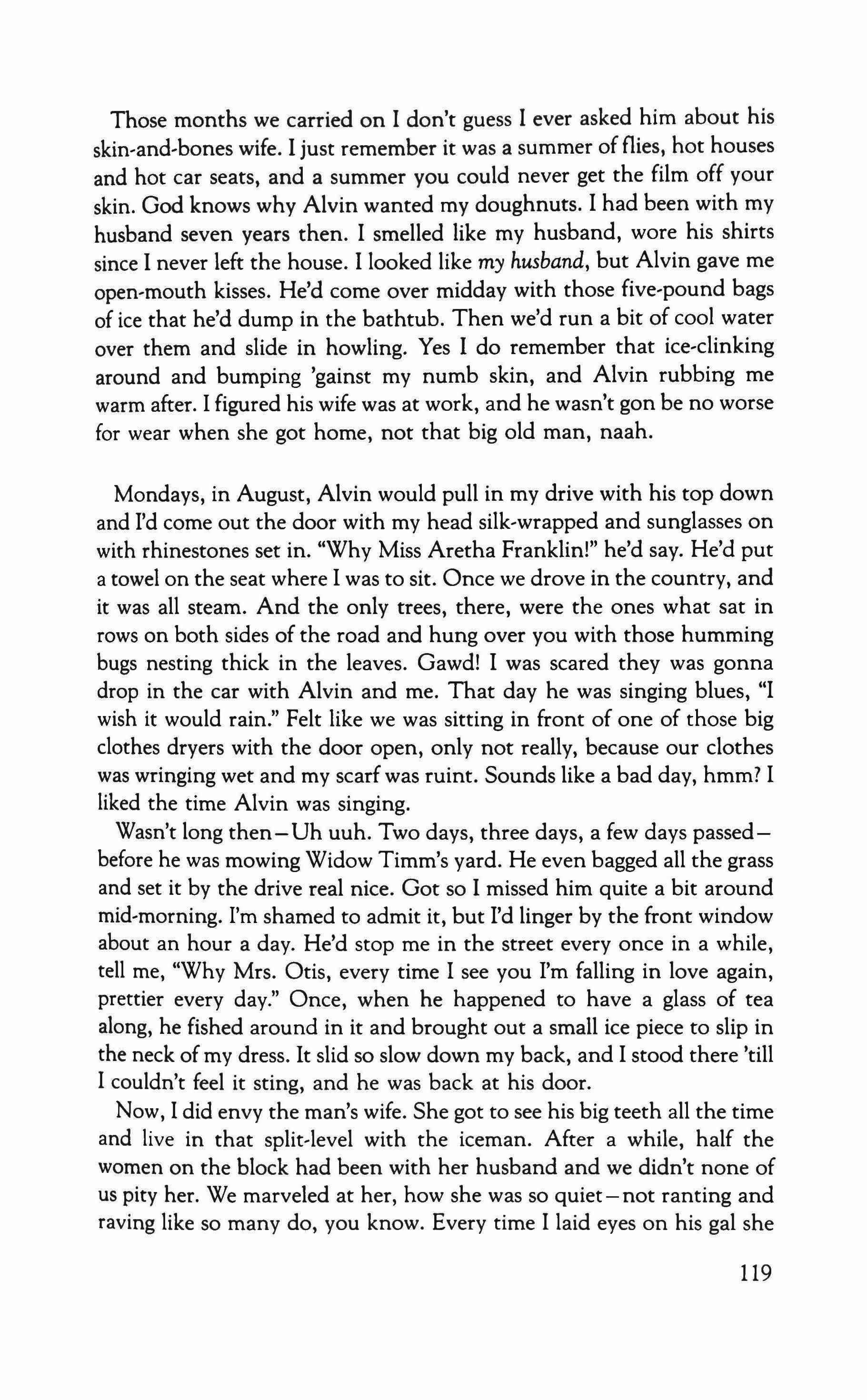
Those months we carried on I don't guess I ever asked him about his skin-and-bones wife. I just remember it was a summer of flies, hot houses and hot car seats, and a summer you could never get the film off your skin. God knows why Alvin wanted my doughnuts. I had been with my husband seven years then. I smelled like my husband, wore his shirts since I never left the house. I looked like my husband, but Alvin gave me open-mouth kisses. He'd come over midday with those five-pound bags of ice that he'd dump in the bathtub. Then we'd run a bit of cool water over them and slide in howling. Yes I do remember that ice-clinking around and bumping 'gainst my numb skin, and Alvin rubbing me warm after. I figured his wife was at work, and he wasn't gon be no worse for wear when she got home, not that big old man, naah.
Mondays, in August, Alvin would pull in my drive with his top down and I'd come out the door with my head silk-wrapped and sunglasses on with rhinestones set in. "Why Miss Aretha Franklin!" he'd say. He'd put a towel on the seat where I was to sit. Once we drove in the country, and it was all steam. And the only trees, there, were the ones what sat in rows on both sides of the road and hung over you with those humming bugs nesting thick in the leaves. Gawd! I was scared they was gonna drop in the car with Alvin and me. That day he was singing blues, "I wish it would rain." Felt like we was sitting in front of one of those big clothes dryers with the door open, only not really, because our clothes was wringing wet and my scarf was ruint. Sounds like a bad day, hmm? I liked the time Alvin was singing.
Wasn't long then - Uh uuh. Two days, three days, a few days passedbefore he was mowing Widow Timm's yard. He even bagged all the grass and set it by the drive real nice. Got so I missed him quite a bit around mid-morning. I'm shamed to admit it, but I'd linger by the front window about an hour a day. He'd stop me in the street every once in a while, tell me, "Why Mrs. Otis, every time I see you I'm falling in love again, prettier every day." Once, when he happened to have a glass of tea along, he fished around in it and brought out a small ice piece to slip in the neck of my dress. It slid so slow down my back, and I stood there 'till I couldn't feel it sting, and he was back at his door.
Now, I did envy the man's wife. She got to see his big teeth all the time and live in that split-level with the iceman. After a while, half the women on the block had been with her husband and we didn't none of us pity her. We marveled at her, how she was so quiet-not ranting and raving like so many do, you know. Every time I laid eyes on his gal she
119

was to and from the car, kind of running up on her toes and not looking to see what the neighbors was about.
This one evening, late, I was picking up bits of cake out the backyard 'cause James, my husband, threw half his dinner onto the grass, didn't want that corn bread that come in a box and tossed the pan out the kitchen door. It was too sweet, see, got to make it all by hand. Well, I got about all the pieces back in the pan when I heard a radio blasting across the street. Wasn't like Alvin to turn his music up so I walked around to see. I was hearing someone singing along too and I thought, "Lord, that wife of his sure can't carry a tune." First person I saw was Widow Timms pressed up against her window, sliding herself around to get a good look at something, then Ginny Meyer and all her children sitting in their parked car, rolling up the windows, poking the locks down. Then I make it around to see the show: Alvin's gal swinging her hair, leaping about that yard with a gun above her head. She fired the whole round off before the police came, put her in their car.
Well, she didn't kill Alvin. He was gone, with some woman from two blocks down who won money suing the police. And either Alvin left a note or somebody told his wife what she never suspected. She hadn't known any of it, see.
And this young gal I work with had two men in mind that she was sure would never fool around. Her father, she said, and her brother-inlaw, that was her list, and she nodded as if to say the case was closed. She'd met my husband at a company picnic and wanted to add him to her list too, asked me, "Uh, does your husband go out on you?"
Girl, we're lucky to see him home one night a week, and his women call the house.
I didn't tell her that about him, 'cause I'm not one to be pitied, you know. She's the one. She'll be running around in her yard, draw a crowd-entire families watching her from the car.
120

1
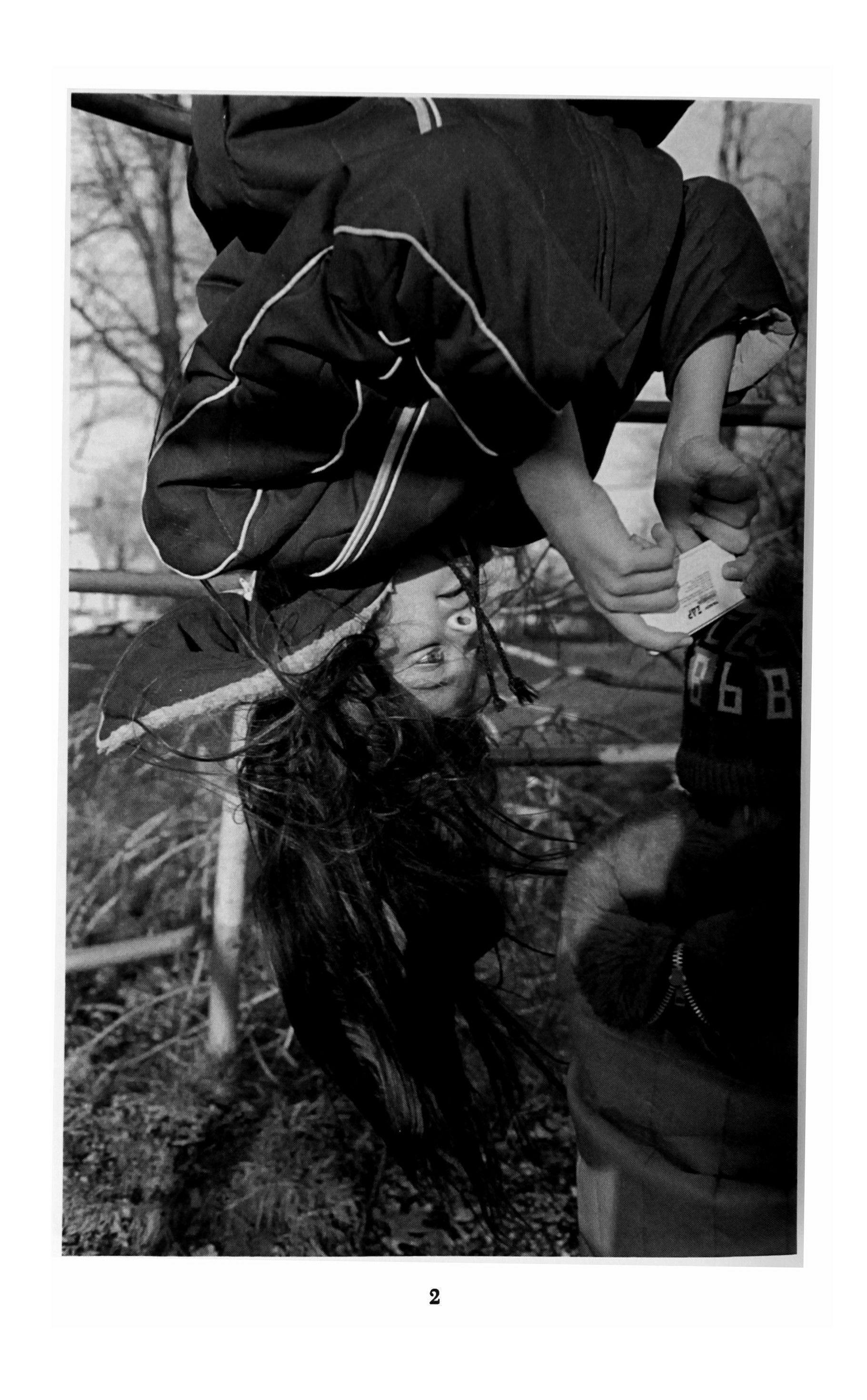
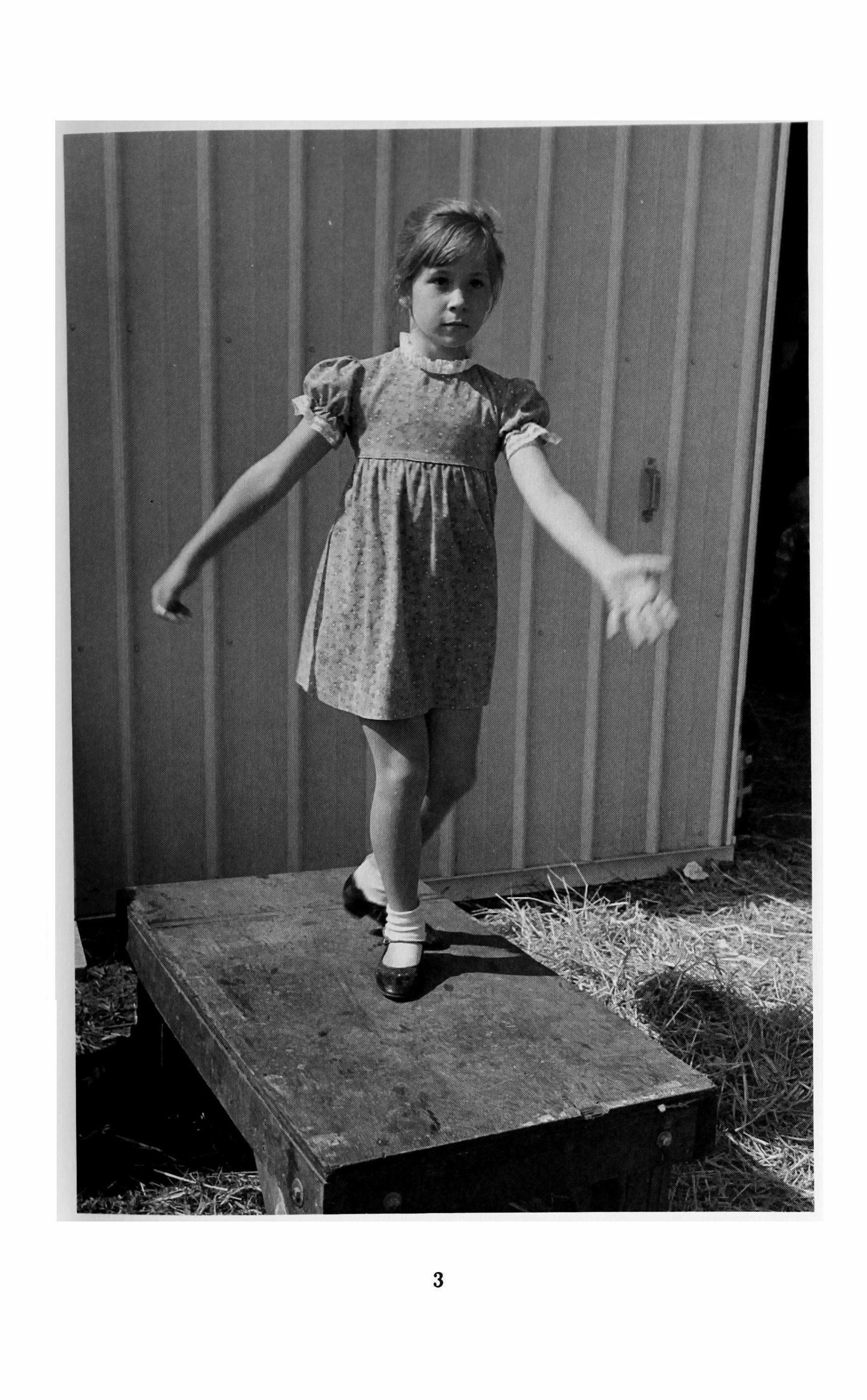
3

4

5

Captions

1. Paris, 1987.
2. East Haven, Connecticut, 1985.
3. Durham Fair, Durham, Connecticut, 1984.
4. Middletown, Connecticut, 1987.
5. Evanston, Illinois, 1988.
6. Winsted, Connecticut, 1987.
From The Brothers Karamazov
Fyodor Dostoevsky
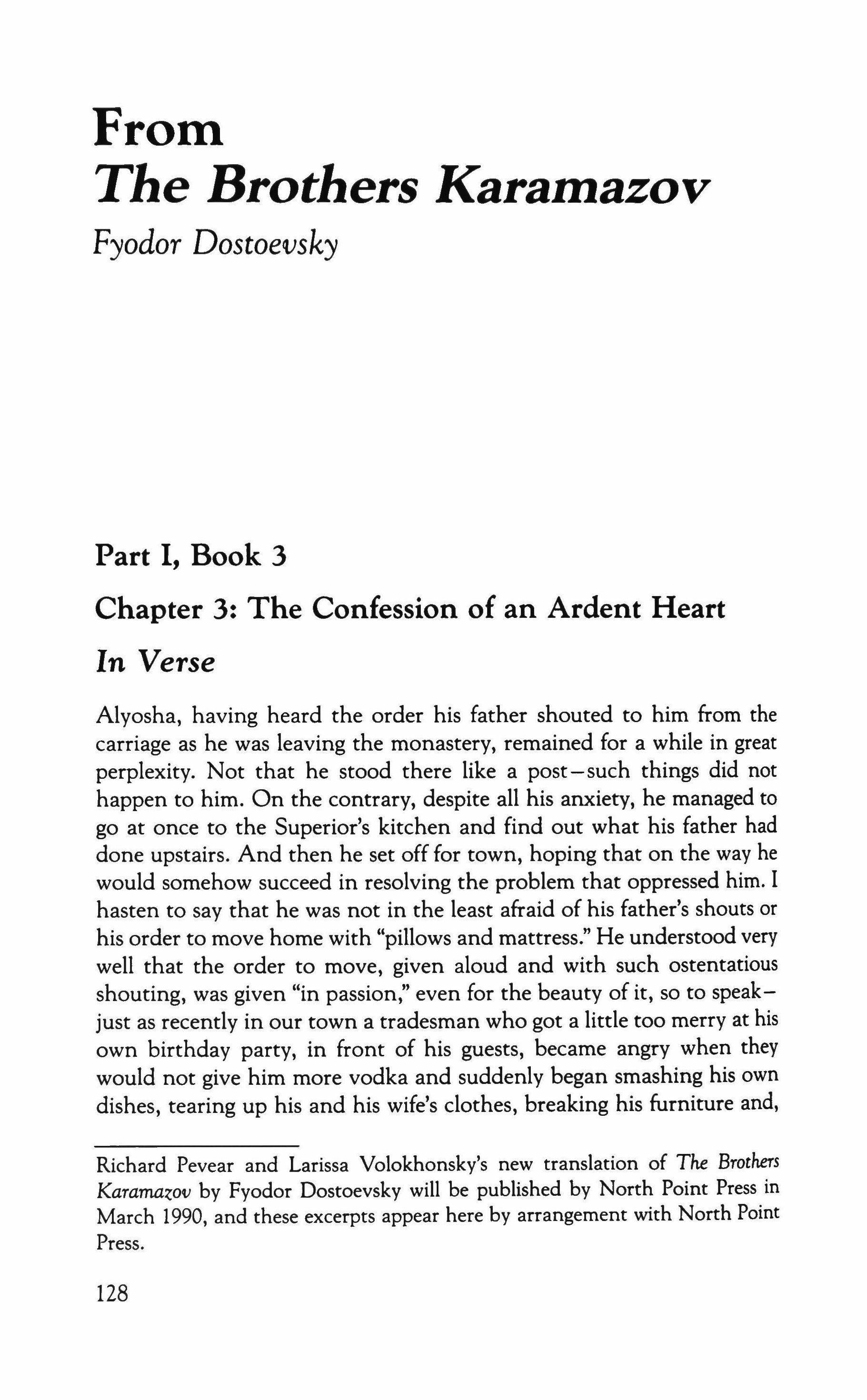
Part I, Book 3
Chapter 3: The Confession of an Ardent Heart
In Verse
Alyosha, having heard the order his father shouted to him from the carriage as he was leaving the monastery, remained for a while in great perplexity. Not that he stood there like a post-such things did not happen to him. On the contrary, despite all his anxiety, he managed to go at once to the Superior's kitchen and find out what his father had done upstairs. And then he set off for town, hoping that on the way he would somehow succeed in resolving the problem that oppressed him. I hasten to say that he was not in the least afraid of his father's shouts or his order to move home with "pillows and mattress." He understood very well that the order to move, given aloud and with such ostentatious shouting, was given "in passion," even for the beauty of it, so to speakjust as recently in our town a tradesman who got a little too merry at his own birthday party, in front of his guests, became angry when they would not give him more vodka and suddenly began smashing his own dishes, tearing up his and his wife's clothes, breaking his furniture and,
Richard Pevear and Larissa Volokhonsky's new translation of The Brothers Karamazov by Fyodor Dostoevsky will be published by North Point Press in March 1990, and these excerpts appear here by arrangement with North Point Press.
128
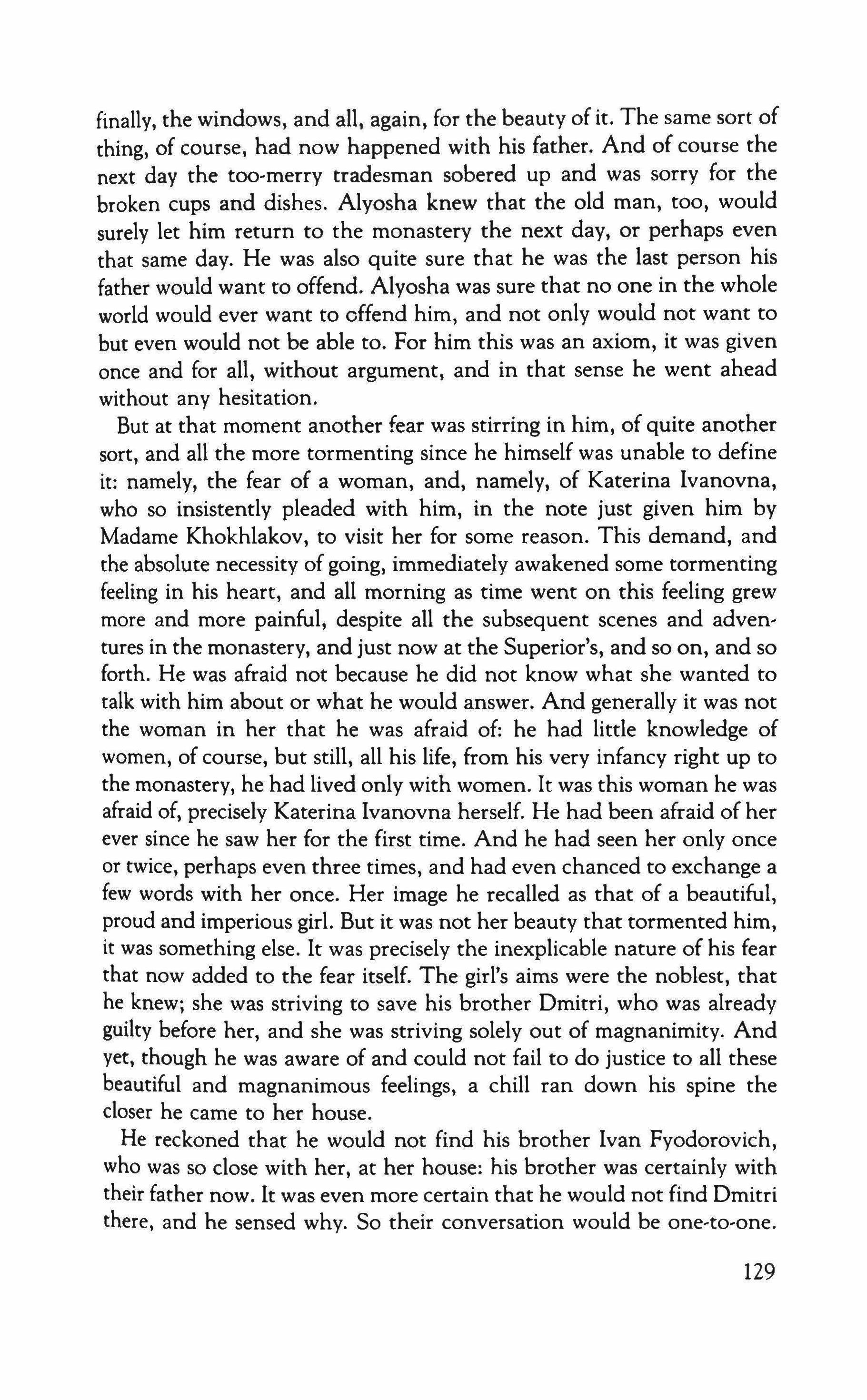
finally, the windows, and all, again, for the beauty of it. The same sort of thing, of course, had now happened with his father. And of course the next day the too-merry tradesman sobered up and was sorry for the broken cups and dishes. Alvosha knew that the old man, too, would surely let him return to the monastery the next day, or perhaps even that same day. He was also quite sure that he was the last person his father would want to offend. Alyosha was sure that no one in the whole world would ever want to offend him, and not only would not want to but even would not be able to. For him this was an axiom, it was given once and for all, without argument, and in that sense he went ahead without any hesitation.
But at that moment another fear was stirring in him, of quite another sort, and all the more tormenting since he himself was unable to define it: namely, the fear of a woman, and, namely, of Katerina Ivanovna, who so insistently pleaded with him, in the note just given him by Madame Khokhlakov, to visit her for some reason. This demand, and the absolute necessity of going, immediately awakened some tormenting feeling in his heart, and all morning as time went on this feeling grew more and more painful, despite all the subsequent scenes and adventures in the monastery, and just now at the Superior's, and so on, and so forth. He was afraid not because he did not know what she wanted to talk with him about or what he would answer. And generally it was not the woman in her that he was afraid of: he had little knowledge of women, of course, but still, all his life, from his very infancy right up to the monastery, he had lived only with women. It was this woman he was afraid of, precisely Katerina Ivanovna herself. He had been afraid of her ever since he saw her for the first time. And he had seen her only once or twice, perhaps even three times, and had even chanced to exchange a few words with her once. Her image he recalled as that of a beautiful, proud and imperious girl. But it was not her beauty that tormented him, it was something else. It was precisely the inexplicable nature of his fear that now added to the fear itself. The girl's aims were the noblest, that he knew; she was striving to save his brother Dmitri, who was already guilty before her, and she was striving solely out of magnanimity. And yet, though he was aware of and could not fail to do justice to all these beautiful and magnanimous feelings, a chill ran down his spine the closer he came to her house.
He reckoned that he would not find his brother Ivan Fyodorovich, who was so close with her, at her house: his brother was certainly with their father now. It was even more certain that he would not find Dmitri there, and he sensed why. So their conversation would be one-to-one.
129
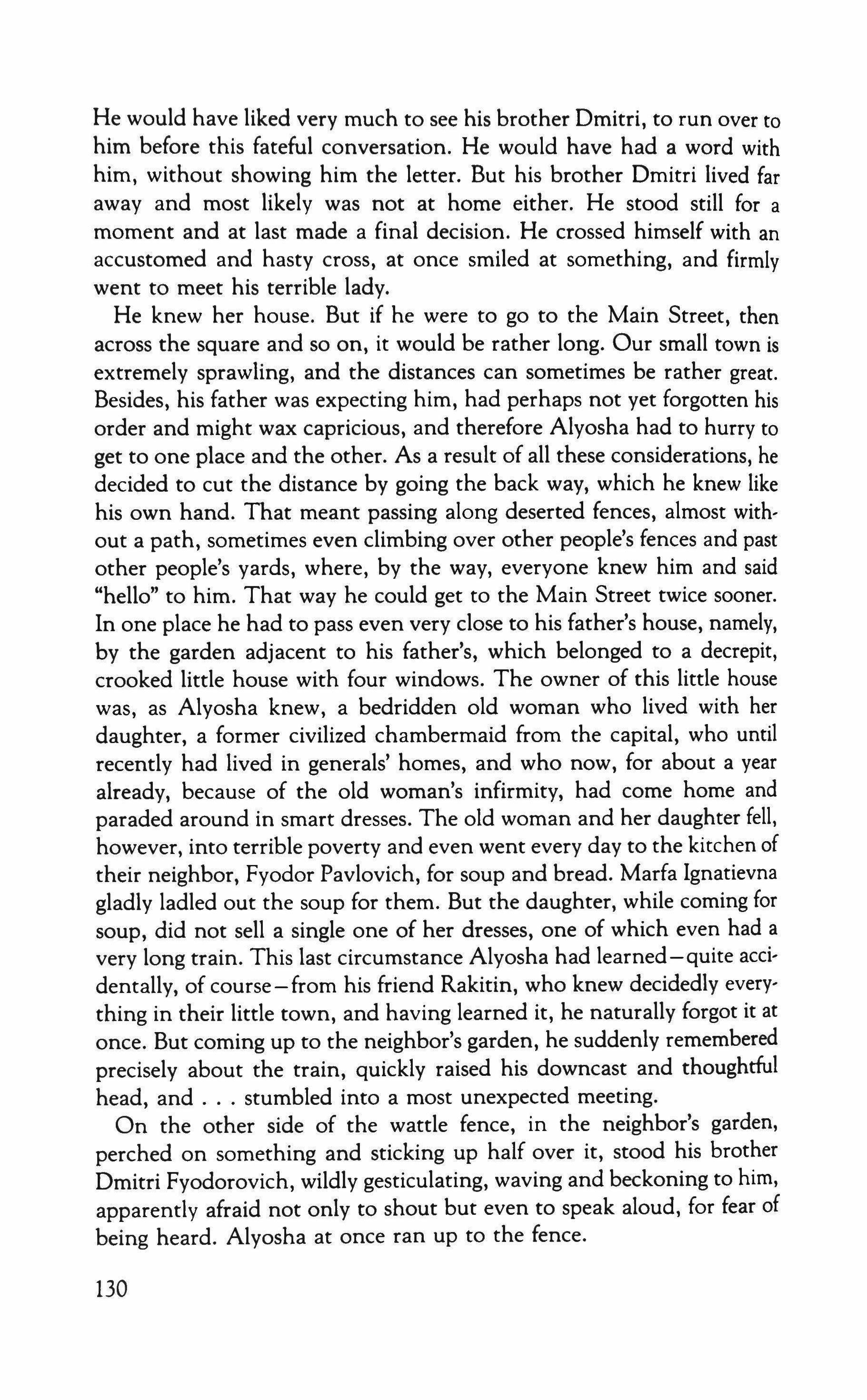
He would have liked very much to see his brother Dmitri, to run over to him before this fateful conversation. He would have had a word with him, without showing him the letter. But his brother Dmitri lived far away and most likely was not at home either. He stood still for a moment and at last made a final decision. He crossed himself with an accustomed and hasty cross, at once smiled at something, and firmly went to meet his terrible lady.
He knew her house. But if he were to go to the Main Street, then across the square and so on, it would be rather long. Our small town is extremely sprawling, and the distances can sometimes be rather great. Besides, his father was expecting him, had perhaps not yet forgotten his order and might wax capricious, and therefore Alyosha had to hurry to get to one place and the other. As a result of all these considerations, he decided to cut the distance by going the back way, which he knew like his own hand. That meant passing along deserted fences, almost without a path, sometimes even climbing over other people's fences and past other people's yards, where, by the way, everyone knew him and said "hello" to him. That way he could get to the Main Street twice sooner. In one place he had to pass even very close to his father's house, namely, by the garden adjacent to his father's, which belonged to a decrepit, crooked little house with four windows. The owner of this little house was, as Alyosha knew, a bedridden old woman who lived with her daughter, a former civilized chambermaid from the capital, who until recently had lived in generals' homes, and who now, for about a year already, because of the old woman's infirmity, had come home and paraded around in smart dresses. The old woman and her daughter fell, however, into terrible poverty and even went every day to the kitchen of their neighbor, Fyodor Pavlovich, for soup and bread. Marfa Ignatievna gladly ladled out the soup for them. But the daughter, while coming for soup, did not sell a single one of her dresses, one of which even had a very long train. This last circumstance Alyosha had learned-quite accidentally, of course-from his friend Rakitin, who knew decidedly everything in their little town, and having learned it, he naturally forgot it at once. But coming up to the neighbor's garden, he suddenly remembered precisely about the train, quickly raised his downcast and thoughtful head, and stumbled into a most unexpected meeting.
On the other side of the wattle fence, in the neighbor's garden, perched on something and sticking up half over it, stood his brother Dmitri Fyodorovich, wildly gesticulating, waving and beckoning to him, apparently afraid not only to shout but even to speak aloud, for fear of being heard. Alyosha at once ran up to the fence.
130

"It's a good thing you looked up yourself-I was just about to call out to you," Dmitri Fyodorovich whispered to him joyfully and hurriedly. "Climb up here! Quick! Ah, how good that you've come. I was just thinking about you
Alyosha was glad himself and was only wondering how to get over the fence. But "Mitya," with his powerful hand, caught hold of his elbow and helped him to jump. Alyosha tucked up his cassock and jumped over with the agility of a barefoot street urchin.
"Bravo! Let's go!" Mitya burst out in a delighted whisper.
"Where?" Alyosha also whispered, looking around on all sides and finding himself in a completely deserted garden with no one there but the two of them. The garden was small, but even so the owner's little house stood no less than fifty paces away from them. "Why are you whispering? There's no one here."
"Why am I whispering? Devil take it," Dmitri Fyodorovich suddenly shouted at the top of his lungs, "why am I whispering! You see what confusion nature can suddenly get you into? I'm here in secret, I'm guarding a secret. Explanation to follow; but knowing it's a secret, I suddenly began to speak secretly, whispering like a fool when there's no need to. Let's go! Over there! Till then, silence. I want to kiss you!
Glory to the Highest in the world, Glory to the Highest in me !
I was sitting here reciting that just before you came."
The garden was about three acres or a little less, but there were trees planted only around it, along all four fences-apple trees, maples, lindens, birches. The middle of the garden was empty, a meadow which yielded several hundred pounds of hay in the summer. The owner rented the garden out for a few roubles each spring. There were rows of raspberries, gooseberries, currants, all near the fence as well; there was a vegetable garden up next to the house, started, in fact, quite recently. Dmitri Fyodorovich led his guest to the corner of the garden farthest from the house. Suddenly, amid a thicket of lindens and old bushes of currant, elder, snowball and lilac, something that looked like the ruins of an ancient green gazebo appeared, blackened and lopsided, with lattice sides, but with a roof under which it was still possible to find shelter from the rain. The gazebo had been built God knows when, about fifty years ago according to tradition, by the then-owner of the house, Alexander Karlovich von Schmidt, a retired lieutenant-colonel. But everything was already decayed, the floor was rotted, all the planks
131

were loose, the wood smelled of dampness. Inside the gazebo stood a green wooden table, fixed in the ground, and around it were benches, also green, on which it was still possible to sit. Alyosha had noticed at once his brother's exalted state, but as he entered the gazebo, he saw on the table half a bottle of cognac and a liqueur glass.
"It's cognac!" Mitya laughed loudly. "I see your look: 'He's drinking again!' Do not believe the phantom.
Do not believe the empty, lying crowd, Forget your doubts
I'm not drinking, I'm just relishing, as that pig of yours, Rakitin, says; and he'll become a state councilor and still say 'relishing'. Sit down. I could take you, Alyoshka, and press you to my heart until I crushed you, for in all the world I really re-al-ly (understand?) love only you!"
He spoke this last line almost in a sort of ecstasy.
"Only you, and also one other, a 'low creature' I've fallen in love with and it was the end of me. But to fall in love does not mean to love. One can fall in love and still hate. Remember that! I say it now while I'm still in good spirits. Sit down here at the table, I'll be right beside you, and I'll look at you and go on talking. You'll keep quiet and I'll keep talking, for the time has come. And by the way, you know, I've decided we really ought to speak softly, because here here the most unexpected ears may turn up. I'll explain everything: sequel to follow, as they say. Why was I longing for you, thirsting for you now, all these days and now? (It's five days already since I dropped anchor here.) Why all these days? Because I will tell everything to you alone, because it's necessary, because you're necessary, because tomorrow I will fall from the clouds, because tomorrow life will end and begin. Have you ever felt, have you ever dreamed that you were falling off a mountain into a deep pit? Well, I'm falling now, and not in a dream. And I'm not afraid, and don't you be afraid either. That is, I am afraid, but I'm delighted! That is, not delighted, but ecstatic Oh, to hell with it, it's all the same, whatever it is. Strong spirit, weak spirit, woman's spirit-whatever it is! Let us praise nature: see how the sun shines, how clear the sky is, it's still summer, four o'clock in the afternoon, so still! Where were you going?"
"To father's, but first I wanted to stop and see Katerina Ivanovna."
"To her, and to father! Whew! A coincidence! Why was I calling you, wishing for you, why was I longing and thirsting for you with every curve of my soul and even with my ribs? Because I wanted to send you precisely to father, and then to her as well, to Katerina Ivanovna, to
132
have done with her and with father. To send an angel. 1 could have sent anybody, but I need to send an angel. And here you are going to her and father yourself."
"Did you really want to send me?" Alyosha let fall, with a pained expression on his face.
"Wait! You knew it! And I see that you understood everything at once. But not a word, not a word now. Don't pity me, and don't cry!"
Dmitri Fyodorovich stood up, thought for a moment, and put his finger to his forehead:
"She summoned you herself, she wrote you a letter or something like that, and that's why you were going to see her, otherwise why would you go?"
"Here's the note." Alvosha took it from his pocket. Mitya quickly read it over.
"And you were going the back way! Oh, gods! I thank you that you sent him the back way and he got caught, like the golden fish in the tale who gets caught by an old fool of a fisherman. Listen, Alyosha, listen, brother! Now I'm going to tell you everything. For I surely must tell at least somebody. I've already told it to an angel in heaven, but I must also tell it to an angel on earth. You will listen, you will judge, and you will forgive And that is what I need, that someone higher forgive me. Listen: if two beings suddenly break away from everything earthly and fly off into the extraordinary, or at least one of them does, and before that, as he flies off or perishes, he comes to someone else and says: do this or that for me, something that one would never ask of anybody except on one's deathbed-can that person refuse to do it if he's a friend, a brother?"
"I'll do it, but tell me what it is, and quickly," said Alyosha.
"Quickly - Hm. Don't be in a hurry, Alyosha: you hurry and worry. There's no rush now. Now the world has come out onto a new street. Hey, Alyosha, it's a pity you never hit on ecstasy! But what am I saying? As if you hadn't hit on it! What a babbler I am:
o man, be noble!

Whose line is that?"
Alyosha decided to wait. He realized that all his business was now, indeed, perhaps only here. Mitva thought for a moment, leaning his elbow on the table and resting his head in his hand. Both were silent. "Lyosha," said Mirya, "you alone will not laugh. I wanted to begin my confession with Schiller's 'Hymn to Joy.' An die Freude! But 1
133
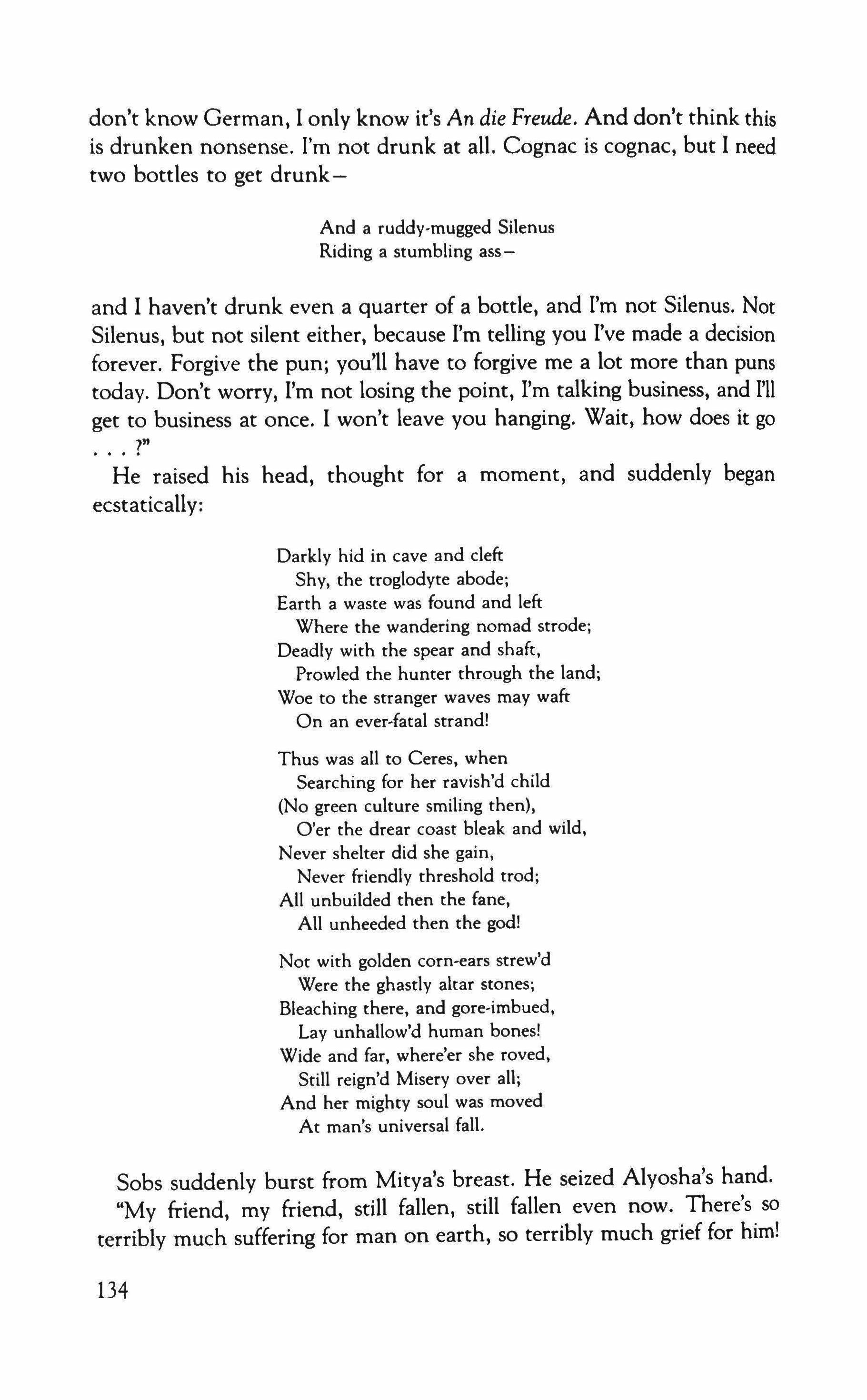
don't know German, I only know it's An die Freude. And don't think this is drunken nonsense. I'm not drunk at all. Cognac is cognac, but I need two bottles to get drunk-
And a ruddy-mugged Silenus Riding a stumbling ass-
and I haven't drunk even a quarter of a bottle, and I'm not Silenus. Not Silenus, but not silent either, because I'm telling you I've made a decision forever. Forgive the pun; you'll have to forgive me a lot more than puns today. Don't worry, I'm not losing the point, I'm talking business, and I'll get to business at once. I won't leave you hanging. Wait, how does it go ?"
He raised his head, thought for a moment, and suddenly began ecstatically:
Darkly hid in cave and cleft Shy, the troglodyte abode; Earth a waste was found and left Where the wandering nomad strode; Deadly with the spear and shaft, Prowled the hunter through the land; Woe to the stranger waves may waft On an ever-fatal strand!
Thus was all to Ceres, when Searching for her ravish'd child (No green culture smiling then), O'er the drear coast bleak and wild, Never shelter did she gain, Never friendly threshold trod; All unbuilded then the fane, All unheeded then the god!
Not with golden corn-ears strew'd Were the ghastly altar stones; Bleaching there, and gore-imbued, Lay unhallow'd human bones! Wide and far, where'er she roved, Still reign'd Misery over all; And her mighty soul was moved At man's universal fall.
Sobs suddenly burst from Mitva's breast. He seized Alyosha's hand. "My friend, my friend, still fallen, still fallen even now. There's so terribly much suffering for man on earth, so terribly much grief for him!
134

Don't think I'm just a brute of an officer who drinks cognac and goes whoring. No, brother, I hardly think of anything else, of anything but that fallen man, if only I'm not lying now. God keep me from lying, and from praising myself! I think about that man, because I myself am such a man.
That men to man again may soar, Let man and Earth with one another Make a compact evermoreMan the son, and Earth the mother
There's just one thing: how can I make a compact with the earth evermore? I don't kiss the earth, I don't tear open her bosom; what should I do, become a peasant or a shepherd? I keep going, and I don't know: have I gotten into stench and shame, or into light and joy? That's the whole trouble, because everything on earth is a riddle. And whenever I happened to sink into the deepest, the very deepest shame of depravity (and that's all I ever happened to do), I always read that poem about Ceres and man. Did it set me right? Never! Because I'm a Karamazov. Because when I fall into the abyss, I go straight into it, head down and heels up, and I'm even pleased that I'm falling in just such a humiliating position, and for me I find it beautiful. And so in that very shame I suddenly begin a hymn. Let me be cursed, let me be base and vile, but let me also kiss the hem of that garment in which my God is clothed; let me be following the devil at the same time, but still I am also your son, Lord, and I love you, and I feel a joy without which the world cannot stand and be.
Joy is the mainspring of the whole Of endless Nature's calm rotation; Joy moves the dazzling wheels that roll Within the great heart of creation; Joy breathes on buds, and flowers they are; Joy beckons, suns come forth from heaven; Joy moves the spheres in realms afar, Ne'er to thy glass, dim wisdom, given!
All being drinks the mother-dew Of joy from Nature's holy bosom; And good and evil both pursue Her steps that strew the rose's blossom. The brimming cup, love's loyalty Joy gives to us; beneath the sod, To insects-sensuality; In heaven the cherub looks on God!
135

But enough poetry! I shed tears; well, then, let me cry. Maybe everyone will laugh at this foolishness, but you won't. Your eyes are shining, too. Enough poetry. I want to tell you now about the 'insects,' about those to whom God gave sensuality:
To insects-sensuality!
I am that very insect, brother, and those words are precisely about me. And all of us Karamazovs are like that, and in you, an angel, the same insect lives and stirs up storms in your blood. Storms, because sensuality is a storm, worse than a storm! Beauty is a fearful and terrible thing! Fearful because it's undefinable, and it cannot be defined, because here God gave us only riddles. Here the shores converge, here all contradictions live together. I'm a very uneducated man, brother, but I've thought about it a lot. So terribly many mysteries! Too many riddles oppress man on earth. Solve them if you can without getting your feet wet. Beauty! Besides, I can't bear it that some man, even with a lofty heart and the highest mind, should start from the ideal of the Madonna and end with the ideal of Sodom. It's even more fearful when someone who already has the ideal of Sodom in his soul, does not deny the ideal of the Madonna either, and his heart burns with it, verily, verily burns, as in his young, blameless years. No, man is broad, even too broad, I would narrow him down. Devil knows even what to make of him, that's the thing! What is shame for the mind, is beauty all over for the heart. Can there be beauty in Sodom? Believe me, for the vast majority of people, that's just where beauty lies-did you know that secret? The terrible thing is that beauty is not only fearful but also mysterious. Here the devil is struggling with God, and the battlefield is the human heart. But everyone likes to talk about his own troubles. Listen, now to real business."
Chapter 4: The Confession of an Ardent Heart
In Anecdotes
"I was leading a wild life there. Father said I used to pay several thousand to seduce girls. That's a swinish phantom, it never happened, and as for what did happen, 'that,' in fact, never required any money. For me, money is an accessory, a fever of the soul, an ambience. Today, here she is, my lady-tomorrow a little street girl is in her place. I entertained the one and the other. I threw fistfuls of money around-music, noise, gypsy
136
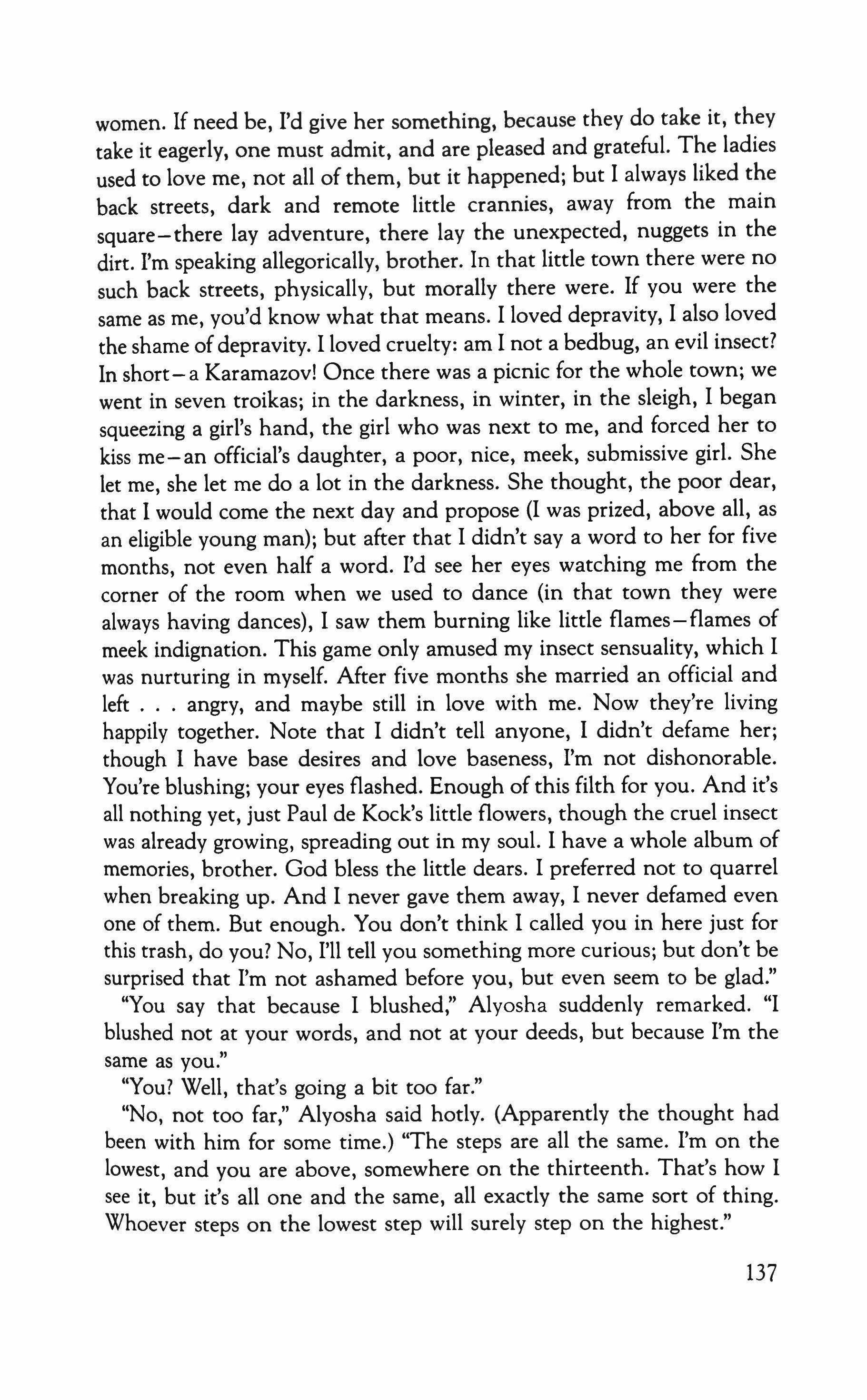
women. If need be, I'd give her something, because they do take it, they take it eagerly, one must admit, and are pleased and grateful. The ladies used to love me, not all of them, but it happened; but I always liked the back streets, dark and remote little crannies, away from the main square-there lay adventure, there lay the unexpected, nuggets in the dirt. I'm speaking allegorically, brother. In that little town there were no such back streets, physically, but morally there were. If you were the same as me, you'd know what that means. I loved depravity, I also loved the shame ofdepravity. I loved cruelty: am I not a bedbug, an evil insect? In short-a Karamazov! Once there was a picnic for the whole town; we went in seven troikas; in the darkness, in winter, in the sleigh, I began squeezing a girl's hand, the girl who was next to me, and forced her to kiss me-an official's daughter, a poor, nice, meek, submissive girl. She let me, she let me do a lot in the darkness. She thought, the poor dear, that 1 would come the next day and propose (I was prized, above all, as an eligible young man); but after that 1 didn't say a word to her for five months, not even half a word. I'd see her eyes watching me from the corner of the room when we used to dance (in that town they were always having dances), 1 saw them burning like little flames-flames of meek indignation. This game only amused my insect sensuality, which 1 was nurturing in myself. After five months she married an official and left angry, and maybe still in love with me. Now they're living happily together. Note that 1 didn't tell anyone, 1 didn't defame her; though 1 have base desires and love baseness, I'm not dishonorable. You're blushing; your eyes flashed. Enough of this filth for you. And it's all nothing yet, just Paul de Kock's little flowers, though the cruel insect was already growing, spreading out in my soul. 1 have a whole album of memories, brother. God bless the little dears. I preferred not to quarrel when breaking up. And 1 never gave them away, 1 never defamed even one of them. But enough. You don't think 1 called you in here just for this trash, do you? No, I'll tell you something more curious; but don't be surprised that I'm not ashamed before you, but even seem to be glad."
"You say that because 1 blushed," Alyosha suddenly remarked. "I blushed not at your words, and not at your deeds, but because I'm the same as you."
"You? Well, that's going a bit too far."
"No, not too far," Alyosha said hotly. (Apparently the thought had been with him for some time.) ''The steps are all the same. I'm on the lowest, and you are above, somewhere on the thirteenth. That's how I see it, but it's all one and the same, all exactly the same sort of thing. Whoever steps on the lowest step will surely step on the highest."
137
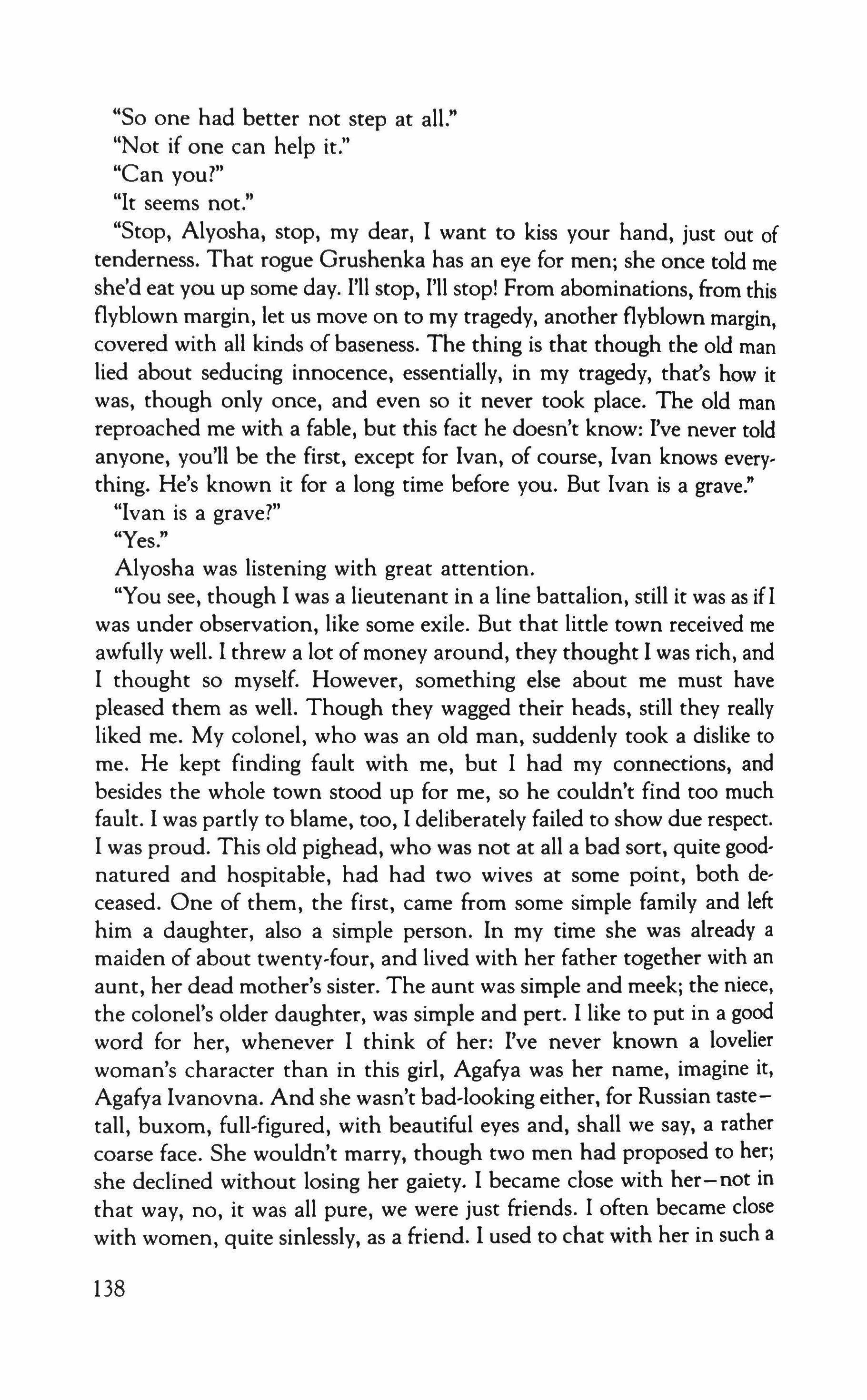
"So one had better not step at all."
"Not if one can help it."
"Can you?"
"It seems not."
"Stop, Alyosha, stop, my dear, I want to kiss your hand, just out of tenderness. That rogue Grushenka has an eye for men; she once told me she'd eat you up some day. I'll stop, I'll stop! From abominations, from this flyblown margin, let us move on to my tragedy, another flyblown margin, covered with all kinds of baseness. The thing is that though the old man lied about seducing innocence, essentially, in my tragedy, that's how it was, though only once, and even so it never took place. The old man reproached me with a fable, but this fact he doesn't know: I've never told anyone, you'll be the first, except for Ivan, of course, Ivan knows everything. He's known it for a long time before you. But Ivan is a grave."
"Ivan is a grave?"
"Yes."
Alyosha was listening with great attention.
"You see, though I was a lieutenant in a line battalion, still it was as ifI was under observation, like some exile. But that little town received me awfully well. I threw a lot of money around, they thought I was rich, and I thought so myself. However, something else about me must have pleased them as well. Though they wagged their heads, still they really liked me. My colonel, who was an old man, suddenly took a dislike to me. He kept finding fault with me, but I had my connections, and besides the whole town stood up for me, so he couldn't find too much fault. I was partly to blame, too, I deliberately failed to show due respect. I was proud. This old pighead, who was not at all a bad sort, quite goodnatured and hospitable, had had two wives at some point, both deceased. One of them, the first, came from some simple family and left him a daughter, also a simple person. In my time she was already a maiden of about twenty-four, and lived with her father together with an aunt, her dead mother's sister. The aunt was simple and meek; the niece, the colonel's older daughter, was simple and pert. I like to put in a good word for her, whenever I think of her: I've never known a lovelier woman's character than in this girl, Agafya was her name, imagine it, Agafva Ivanovna. And she wasn't bad-looking either, for Russian tastetall, buxom, full-figured, with beautiful eyes and, shall we say, a rather coarse face. She wouldn't marry, though two men had proposed to her; she declined without losing her gaiety. I became close with her-not in that way, no, it was all pure, we were just friends. I often became close with women, quite sinlessly, as a friend. I used to chat with her in such a
138

frank way-whew!-and she just laughed. Many women like frankness, make a note of that, and besides she was a virgin, which I found very amusing. And another thing: it was quite impossible to call her a young lady. She and her aunt lived with her father in some sort of voluntary humility, not putting themselves on a par with the rest of society. Every, one loved her and needed her, because she was a great dressmaker: she had talent, asked no money for her services, did it all as a favor, but if they gave her presents she wouldn't refuse them. But the colonel was something else again! He was one of the big men ofthe place. He lived in grand style, entertained the whole town, gave dinners, dances. When I came and joined the battalion, the talk all over the little town was that we were about to have a visitor from the capital, the colonel's second daughter, a beauty of beauties, who had just finished one of the institutes for well-born young ladies there. This second daughter was none other than Katerina Ivanovna, born of the colonel's second wife. And this second wife, already dead, was from the great, noble family of some general, though, by the way, I know for certain that she didn't bring the colonel any money either. So she had her relatives, but that was all; some hopes, maybe, but nothing in her hands. And yet, when the institute girl came (to visit, not to stay), our whole little town seemed to revive: our noblest ladies-two general's wives, one colonel's wife, and after them everyone, everyone immediately got into it, and kept inviting her right and left, entertaining her, she was the queen of the balls, the picnics, they cooked up tableaux vivants for the benefit of some govern, esses. I said nothing. I went on carousing. Just then I fetched off such a stunt that the whole town was squawking about it. I saw her sizing me up, it was at the battery commander's, but I didn't go up to her then: I scorn your acquaintance, thought I. I went up to her a bit later on, also at a party; I began talking; she barely looked at me, pressed her con' temptuous lips together. Well, thought I, just wait, I'll get my revenge! I was a terrible boor then, on most occasions, and I felt it. Mainly I felt that 'Katenka' was not like some innocent institute girl, but a person of character, proud and truly virtuous, and above all intelligent and educated, while I was neither the one nor the other. You think I wanted to propose? Not at all, I simply wanted revenge because I was such a fine fellow and she didn't feel it. Meanwhile, riot and ruin! The colonel finally put me under arrest for three days. It was just then that father sent me six thousand, after I'd sent him a formal renunciation of all and all, that is, saying we were 'quits' and I would make no further demands. I didn't understand a thing then: not until I came here, brother, and even not until these very last present days, maybe even not until today,
139

did I understand anything in all these financial squabbles between me and father. But to hell with it, save that for later. Then, when I received that six, I suddenly learned from a friend's letter something that interested me very much, namely, that there was some dissatisfaction with regard to our colonel, that there was a suspicion that things were not in good order, in short, that his enemies were arranging a little surprise for him. And indeed the division commander came and hauled him over the coals. Then, a little later, he was ordered to apply for retirement. I won't go into detail about how it all went, he certainly had enemies, but suddenly the town became extremely cool towards him and his whole family, everyone suddenly withdrew. It was then that I did my first stunt: I met Agafva Ivanovna, with whom I had always remained friends, and said: 'Your papa, by the way, is short forty-five hundred roubles of government money.' 'What do you mean? Why do you say that? The general came recently and the cash was all there .' 'It was there then, but it isn't now.' She was terribly frightened: 'Please don't frighten me! Who told you?' 'Don't worry,' I said, 'I won't tell anyone, and you know that on that account I'm like the grave, but I wanted to say something more on that account, "just in case," as it were: when they ask your papa for the forry-five hundred and he hasn't got it, then instead of having him face court-martial and end up as a foot soldier in his old age, why don't you secretly send me your institute girl? I've just received money; maybe I'll fork out some four thousand to her, and keep it a holy secret.' 'Oh, what a scoundrel!' (She actually said that.) 'What a wicked scoundrel!' she said. 'How dare you!' She went away terribly indignant, and I shouted after her once more that I'd keep it a holy and inviolable secret. Both women, that is, Agafva and her aunt, I'll tell you beforehand, turned out to be pure angels in this whole story, and indeed adored this sister, haughty Katya, humbled themselves before her, were like her maids Only Agafva then went and told her all about this stunt, I mean our conversation. I learned that later in full detail. She didn't conceal it, and I well, naturally, that was just what I needed. "Suddenly a new major arrived to take command of the battalion. He took command. And the old colonel suddenly took ill, couldn't move, stayed home for two days, did not turn over the government money. Our doctor Kravchenko gave assurances that he really was ill. Only here's what I knew thoroughly and secretly, and even for a long time: that for four years in a row, as soon as the authorities finished going over the accounts, the money disappeared for a while. The colonel used to loan it to a most reliable man, a local merchant, the old widower Trifonov, a bearded man with gold spectacles. Trifonov would go to the
140

fair, put the money out as he liked, and return the whole amount to the colonel immediately, with some little presents from the fair besides, and along with the presents a little interest as well. Only this last time (I learned of it quite by chance from a boy, Trifonov's driveling son, his son and heir, one ofthe most depraved lads the world has yet produced), this time, as I said, when Trifonov returned from the fair, he didn't return anything. The colonel rushed to him. 'I never received anything from you, and could not have received anything,' came the answer. So our colonel sat at home like that, with his head wrapped in a towel, and all three women putting ice to it; suddenly an orderly arrived with the books and an order to turn over the government funds at once, immediately, in two hours. He signed - I saw his signature afterwards in the book-stood up, said he would go and put on his uniform, ran to the bedroom, took his double-barreled shotgun, loaded it, rammed home a service bullet, took off his right boot, propped the gun against his chest, and began feeling for the trigger with his foot. But Agafva was already suspicious; she remembered what I had told her, stole over and peeked into the room just in time: she rushed in, threw herself on him from behind, the gun fired into the ceiling, no one was hurt; the others ran in, seized him, took the gun away, held him by the arms All this I learned afterwards to the last detail. I was sitting at home at the time, it was dusk, I was just about to go out, I got dressed, combed my hair, put scent on my handkerchief, picked up my cap, when suddenly the door opened-and there, in my room, stood Katerina lvanovna.
"Strange things do happen: no one in the street then noticed her coming into my place, so for the town it just vanished. I rented my lodgings from two widows of local officials, two ancient crones, they also served me, respectful women, they obeyed me in everything, and this time, on my orders, they were as silent as iron posts. Of course, I at once understood everything. She came in and looked squarely at me, her dark eyes resolute, defiant even, but on her lips and around her mouth I noticed some irresolution.
"'My sister told me you would give us forty-five hundred roubles if I came to get them myself. I have come give me the money !' She couldn't keep it up, she choked, got frightened, her voice broke off, and the corners of her mouth and the lines around her mouth trembled. Alyoshka, are you listening or sleeping?"
"Mitya, I know you will tell me the whole truth," Alyosha said with emotion.
"So I will. If you want the whole truth, this is it, I won't spare myself. My first thought was a Karamazov thought. Once, brother, I was bitten
141

by a spider, and was laid up with a fever for two weeks; it was the same now, I could feel the spider bite my heart, an evil insect, understand? I sized her up. Have you seen her? A real beauty. And she was beautiful then, but for a different reason. She was beautiful at that moment because she was noble, and I was a scoundrel; she was there in the majesty of her magnanimity and her sacrifice for her father, and I was a bedbug. And on me, a bedbug and a scoundrel, she depended entirely, all of her, all of her entirely, body and soul. No way out. I'll tell you honestly: this thought, this spider's thought, so seized my heart that it almost poured out from the sheer sweetness of it. It seemed there could even be no struggle: I had to act precisely like a bedbug, like an evil tarantula, without any pity I was breathless. Listen: naturally I would come the next day to ask for her hand, so that it would all end, so to speak, in the noblest manner, and no one, therefore, would or could know of it. Because although I'm a man of base desires, I am honest. And then suddenly, at that very second, someone whispered in my ear: 'But tomorrow, when you come to offer your hand, a girl like this will not even see you, she'll have the coachman throw you out: Go cry it all over town, I'm not afraid of you!' I glanced at the girl. The voice was right: that was certainly what she would do. I'd be thrown out, you could see it in the look on her face. Anger boiled up in me. I wanted to pull some mean, piggish, merchant's trick: to give her a sneering look, and right there, as she stood before me, to stun her with the tone of voice you only hear from some petty merchant: 'But four thousand is much too much! I was joking, how could you think it? You've been too gullible, madam. Perhaps two hundred, even gladly and with pleasure, but four thousand-it's too much money, miss, to throwaway on such trifles. You have gone to all this trouble for nothing.'
"You see, I'd lose everything, of course, she would run away, but on the other hand, such infernal revenge would be worth it all. I might have spent the rest of my life howling with remorse, but right then I just wanted to pull this little stunt. Believe me, never in such a moment have I looked at any woman, not a single one, with hatredsee, I'm making the sign of the cross- but I looked at this one for three or five seconds, then, with terrible hatred - the kind of hatred that is only a hair's breadth from love, the maddest love! I went to the window, leaned my forehead on the frozen glass, and I remember that the ice burned my forehead like fire. I didn't keep her long, don't worry; I turned around, went to the table, opened the drawer and took out a five-percent bank note for five thousand roubles, with no name filled in (it was stuck in a
142
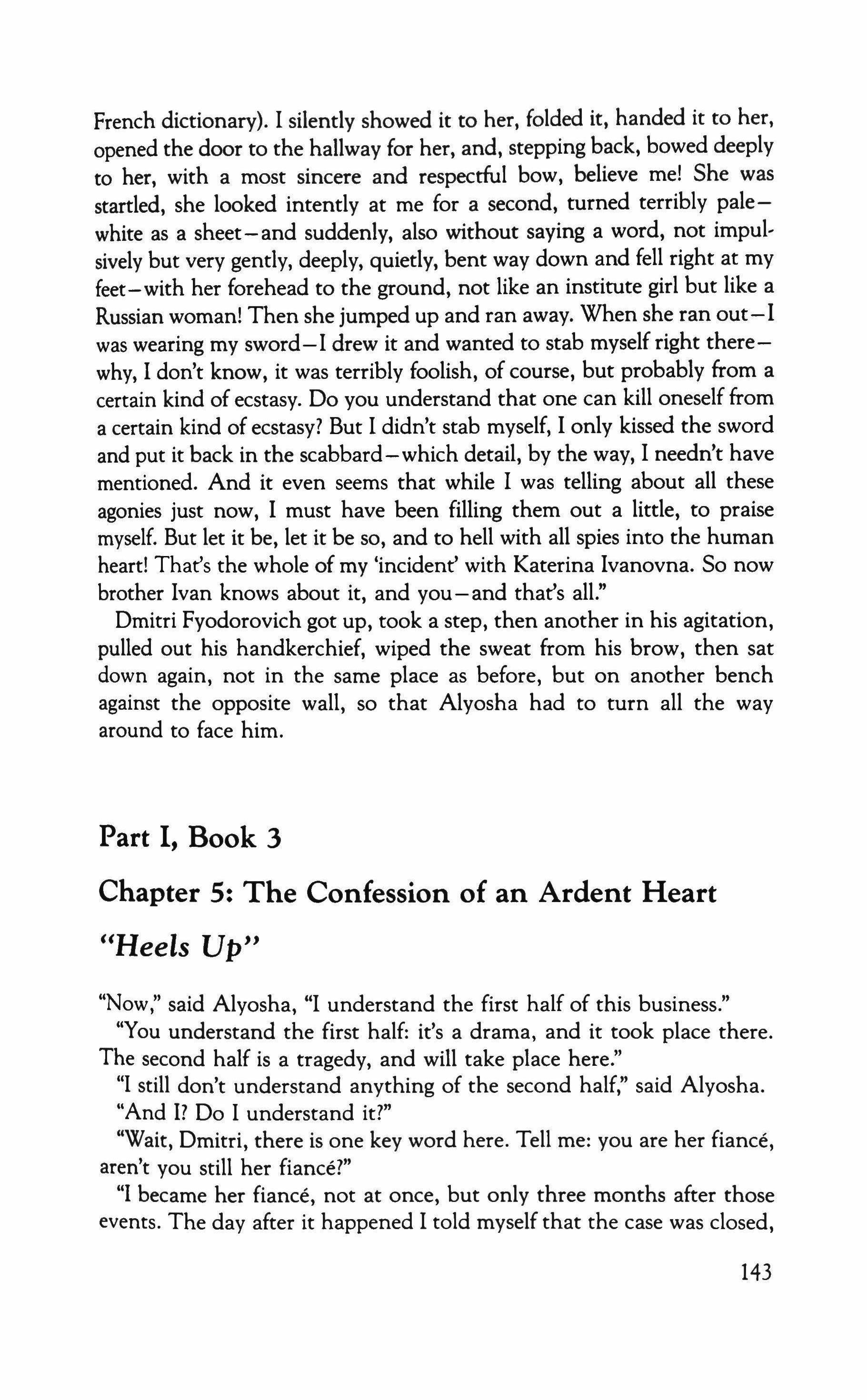
French dictionary). I silently showed it to her, folded it, handed it to her, opened the door to the hallway for her, and, stepping back, bowed deeply to her, with a most sincere and respectful bow, believe me! She was startled, she looked intently at me for a second, turned terribly palewhite as a sheet-and suddenly, also without saying a word, not impulsively but very gently, deeply, quietly, bent way down and fell right at my feet - with her forehead to the ground, not like an institute girl but like a Russian woman! Then she jumped up and ran away. When she ran out-I was wearing my sword-I drew it and wanted to stab myselfright therewhy, I don't know, it was terribly foolish, of course, but probably from a certain kind of ecstasy. Do you understand that one can kill oneself from a certain kind of ecstasy? But I didn't stab myself, I only kissed the sword and put it back in the scabbard-which detail, by the way, I needn't have mentioned. And it even seems that while I was telling about all these agonies just now, I must have been filling them out a little, to praise myself. But let it be, let it be so, and to hell with all spies into the human heart! That's the whole of my 'incident' with Katerina Ivanovna. So now brother Ivan knows about it, and you - and that's all."
Dmitri Fyodorovich got up, took a step, then another in his agitation, pulled out his handkerchief, wiped the sweat from his brow, then sat down again, not in the same place as before, but on another bench against the opposite wall, so that Alyosha had to turn all the way around to face him.
Part I, Book 3
Chapter 5: The Confession of an Ardent Heart
"Heels Up"
"Now," said Alyosha, "I understand the first half of this business."
"You understand the first half: it's a drama, and it took place there. The second half is a tragedy, and will take place here."
"1 still don't understand anything of the second half," said Alyosha.
"And I? Do 1 understand it?"
"Wait, Dmitri, there is one key word here. Tell me: you are her fiance, aren't you still her fiance?"
"1 became her fiance, not at once, but only three months after those events. The day after it happened I told myself that the case was closed,
143

done with, there would be no sequel. To come with an offer of my hand seemed a base thing to do. For her part, during all the six weeks she then spent in our town, she never once let me hear a word of herself. Except, indeed, in one instance: on the day after her visit, their maid slipped into my room, and without saying a word handed me an envelope. It was addressed to me. I opened it - there was the change from the fivethousand-rouble bank note. They needed only forty-five hundred, and there was a loss of about two hundred and something on the sale of the note. She sent me back only two hundred and sixty roubles, I think, I don't quite remember, and just the money-no note, no word, no explanation. I looked into the envelope for some mark of a pencil-n-nothingl So meanwhile I went on a spree with the rest of my roubles, until the new major also finally had to reprimand me. And the colonel did hand over the government funds-satisfactorily and to everyone's surprise, because nobody believed any longer that he had them intact. He handed them over, and came down sick, lay in bed for about three weeks, then suddenly he got a softening of the brain, and in five days he was dead. He was buried with military honors, since his discharge hadn't come through yet. Katerina Ivanovna, her sister, and her aunt, having buried their father, set out for Moscow ten days later. And just before their departure, on the very day they left (I didn't see them or say goodbye), I received a tiny letter, a blue one, on lacy paper, with only one line penciled on it: 'I'll write to you. Wait. K.' That was all.
"I'll explain the rest in two words. Once they were in Moscow, things developed in a flash and as unexpectedly as in an Arabian tale. The widow of the general, her main relative, suddenly lost both of her closest heirs, her two closest nieces, who died of smallpox in one and the same week. The shaken old woman welcomed Katya like her own daughter, like a star of salvation, fell upon her, changed her will at once in her favor, but that was for the future, and meanwhile she gave her eighty thousand roubles outright - here's a dowry for you, she said, do as you like with it. An hysterical woman, I observed her later in Moscow. So then suddenly I received forty-five hundred roubles in the mail; naturally, I was bewildered and struck dumb. Three days later came the promised letter as well. It's here with me now, I always keep it with me, and shall die with it-do you want to see it? You must read it: she offers to be my fiancee, she offers herself, 'I love you madly,' she says, 'even if you do not love me-no matter, only be my husband. Don't be afraid, I won't hinder you in any way, I'll be your furniture, the rug you walk on I want to love you eternally, I want to save you from yourself .' Alvosha, I'm not worthy even to repeat those lines in my means words
144

and in my mean tone, in my eternally mean tone which I can never get cured of! This letter pierced me even to this day, and is it easy for me now, is it easy for me today? I wrote a reply at once (I couldn't manage to go to Moscow in person). I wrote it in tears. One thing I am eternally ashamed of: I mentioned that she was now rich and had a dowry, and I was just a poverty-stricken boor-I mentioned money! I should have borne it, but it slipped off my pen. Then I wrote at once to Ivan, in Moscow, and explained everything to him, as far as I could in a letter, it was a six-page letter, and sent Ivan to her. Why are you looking, why are you staring at me? So, yes, Ivan fell in love with her, is in love with her still, I know it, I did a foolish thing, in your worldly sense, but maybe just this foolishness will now save us all! Ah! Don't you see how she reveres him, how she respects him? Can she compare the two of us and still love a man like me, especially after all that's happened here?"
"But I'm sure she does love a man like you, and not a man like him."
"She loves her own virtue, not me," the words suddenly escaped, inadvertently and almost maliciously, from Dmitri Fyodorovich. He laughed, but a moment later his eyes flashed, he blushed all over and pounded his fist violently on the table.
"I swear, Alyosha," he exclaimed with terrible and sincere anger at himself, "believe it or not, but I swear as God is holy and Christ is the Lord, that even though I sneered just now at her lofty feelings, still I know that I am a million times more worthless in my soul than she is, and that her lofty feelings-are as sincere as a heavenly angel's! That's the tragedy, that I know it for certain. What's wrong with declaiming a little? Am I not declaiming? But I am sincere, I really am sincere. As for Ivan, I can understand with what a curse he must look at nature now, and with his intelligence, too! To whom, to what has the preference been given? It has been given to a monster, who even here, already a fiance and with all eyes looking at him, was not able to refrain from debaucheries-and that right in front of his fiancee, right in front of his fiancee! And a man like me is preferred, and he is rejected. Why? Because a girl wants to violate her life and destiny, out of gratitude! Absurd! I've never said anything of the sort to Ivan; Ivan, of course, has never said half a word about it to me, either, not the slightest hint; but destiny will be fulfilled, the worthy man will take his place, and the unworthy one will disappear down his back lane-his dirty back lane, his beloved, his befitting back lane, and there, in filth and stench, will perish of his own free will, and revel in it. I seem to be rambling; all my words are worn out, as if I were just joining them at random; but I've
145
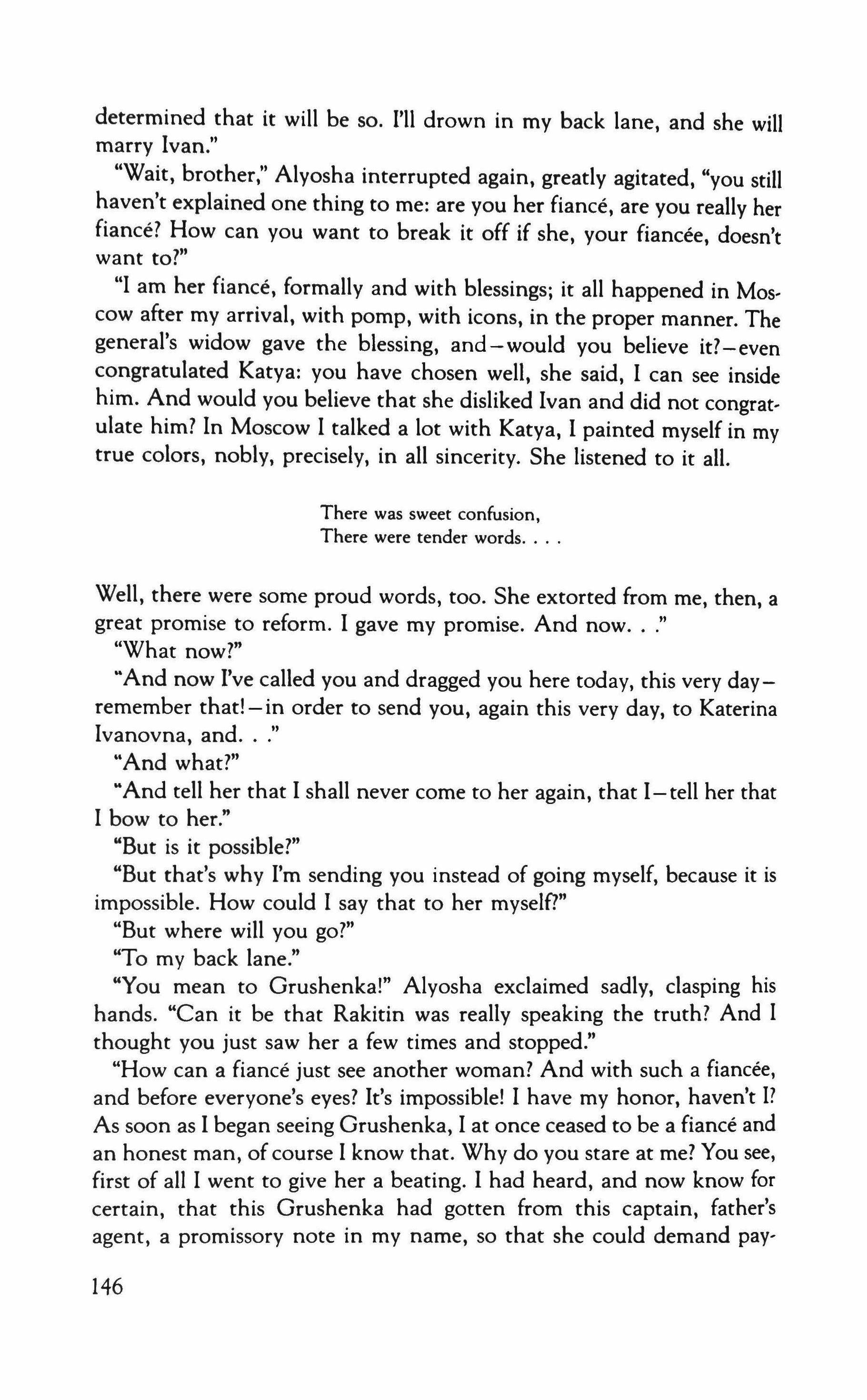
determined that it will be so. I'll drown in my back lane, and she will marry Ivan."
"Wait, brother," Alyosha interrupted again, greatly agitated, "you still haven't explained one thing to me: are you her fiance, are you really her fiance? How can you want to break it off if she, your fiancee, doesn't want to?"
"I am her fiance, formally and with blessings; it all happened in Moscow after my arrival, with pomp, with icons, in the proper manner. The general's widow gave the blessing, and-would you believe it?-even congratulated Katya: you have chosen well, she said, I can see inside him. And would you believe that she disliked Ivan and did not congratulate him? In Moscow I talked a lot with Katya, I painted myself in my true colors, nobly, precisely, in all sincerity. She listened to it all.
There was sweet confusion, There were tender words.
Well, there were some proud words, too. She extorted from me, then, a great promise to reform. I gave my promise. And now ,"
"What now?"
"And now I've called you and dragged you here today, this very dayremember that! - in order to send you, again this very day, to Katerina Ivanovna, and
"And what?"
"And tell her that I shall never come to her again, that I - tell her that I bow to her."
"But is it possible?"
"But that's why I'm sending you instead of going myself, because it is impossible. How could I say that to her myself?"
"But where will you go?"
"To my back lane."
"You mean to Grushenka!" Alyosha exclaimed sadly, clasping his hands. "Can it be that Rakitin was really speaking the truth? And I thought you just saw her a few times and stopped."
"How can a fiance just see another woman? And with such a fiancee, and before everyone's eyes? It's impossible! I have my honor, haven't I? As soon as I began seeing Grushenka, I at once ceased to be a fiance and an honest man, of course I know that. Why do you stare at me? You see, first of all I went to give her a beating. I had heard, and now know for certain, that this Grushenka had gotten from this captain, father's agent, a promissory note in my name, so that she could demand pay-
146
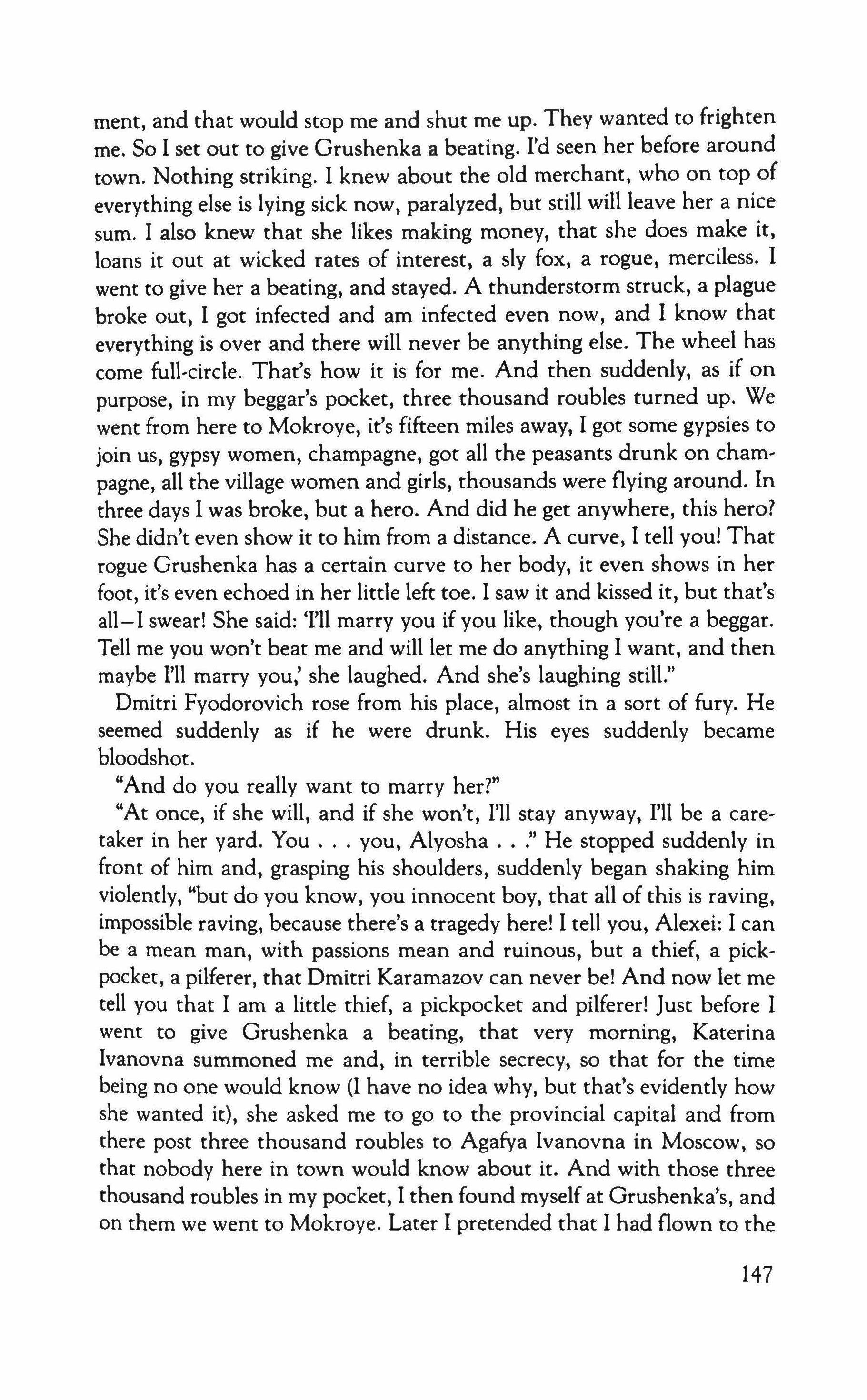
ment, and that would stop me and shut me up. They wanted to frighten me. So I set out to give Grushenka a beating. I'd seen her before around town. Nothing striking. I knew about the old merchant, who on top of everything else is lying sick now, paralyzed, but still will leave her a nice sum. I also knew that she likes making money, that she does make it, loans it out at wicked rates of interest, a sly fox, a rogue, merciless. I went to give her a beating, and stayed. A thunderstorm struck, a plague broke out, I got infected and am infected even now, and I know that everything is over and there will never be anything else. The wheel has come full-circle. That's how it is for me. And then suddenly, as if on purpose, in my beggar's pocket, three thousand roubles turned up. We went from here to Mokroye, it's fifteen miles away, I got some gypsies to join us, gypsy women, champagne, got all the peasants drunk on champagne, all the village women and girls, thousands were flying around. In three days I was broke, but a hero. And did he get anywhere, this hero? She didn't even show it to him from a distance. A curve, I tell you! That rogue Grushenka has a certain curve to her body, it even shows in her foot, it's even echoed in her little left toe. I saw it and kissed it, but that's all-I swear! She said: 'I'll marry you if you like, though you're a beggar. Tell me you won't beat me and will let me do anything I want, and then maybe I'll marry you,' she laughed. And she's laughing still."
Dmitri Fyodorovich rose from his place, almost in a sort of fury. He seemed suddenly as if he were drunk. His eyes suddenly became bloodshot.
"And do you really want to marry her?"
«At once, if she will, and if she won't, I'll stay anyway, I'll be a caretaker in her yard. You you, Alvosha " He stopped suddenly in front of him and, grasping his shoulders, suddenly began shaking him violently, "but do you know, you innocent boy, that all of this is raving, impossible raving, because there's a tragedy here! I tell you, Alexei: I can be a mean man, with passions mean and ruinous, but a thief, a pickpocket, a pilferer, that Dmitri Karamazov can never be! And now let me tell you that 1 am a little thief, a pickpocket and pilferer! Just before I went to give Grushenka a beating, that very morning, Katerina Ivanovna summoned me and, in terrible secrecy, so that for the time being no one would know (I have no idea why, but that's evidently how she wanted it), she asked me to go to the provincial capital and from there post three thousand roubles to Agafya Ivanovna in Moscow, so that nobody here in town would know about it. And with those three thousand roubles in my pocket, I then found myself at Grushenka's, and on them we went to Mokroye. Later 1 pretended that I had flown to the
147

capital and back, but I didn't present her with a postal receipt; I told her I'd sent the money and would bring her the receipt, but so far I haven't brought it, I've forgotten, if you like. Now, what if you go today and say to her: 'He bows to you,' and she says, 'And the money?' You could tell her: 'He's a base sensualist, a mean creature with irrepressible passions. He did not send your money that time, he spent it, because he couldn't help himself, like an animal,' and then you could add: 'But he is not a thief, here are your three thousand roubles, he returns them to you, send them to Agafya Ivanovna yourself, and he says he bows to you.' But then what if she suddenly says: 'And where is the money?'"
"Mitya, you're unhappy, yes! But not as unhappy as you think. Don't kill yourself with despair, don't do it!"
"What do you think, that I'll shoot myself ifI can't find three thousand roubles to give back to her? That's just the thing: I won't shoot myself. It's beyond my strength right now-later, maybe, but right now I'll go to Grushenka Let my flesh rot!"
"And what then?"
"I'll be her husband, I'll have the honor of being her spouse, and if a lover comes, I'll go to another room. I'll clean her friends' dirty galoshes, I'll heat up the samovar, I'll run errands
"Katerina Ivanovna will understand everything," Alyosha all of a sudden said solemnly. "She will understand all the depths of all this grief and be reconciled. She has a lofty mind, because it's impossible to be unhappier than you are, she will see that."
"She will not be reconciled to everything," Mitya grinned. "There's something here, brother, that no woman can be reconciled to. Do you know what the best thing would be?"
"What?"
"To give her back the three thousand."
"But where can we get it? Listen, I have two thousand, Ivan will give a thousand, that makes three-take it and give it to her."
"And how soon will we get your three thousand? Besides, you're not of age yet, and you must, you must go today and make that bow to her, with the money or without it, because I can't drag on any longer, that's what it's come to. Tomorrow will already be too late, too late. I'll send you to father."
"To father?"
"Yes, to father, and then to her. Ask him for three thousand."
"But Mirya, he won't give it."
"Of course he won't, I know he won't. Alexei, do you know what despair is?"
148

"I do."
"Listen: legally he owes me nothing. I've already gotten everything out of him, everything, I know that. But morally he surely owes me something, doesn't he? He started with my mother's twenty-eight thousand and made a hundred thousand out of it. Let him give me only three of those twenty-eight thousands, and bring up my life from the Pit, and it will be reckoned unto him for his many sins! And I'll stop at those three thousands, I give you my solemn word on it, and he'll never hear of me again. For the last time I give him a chance to be my father. Tell him that God Himself sends him this chance."
"Mitva, he won't do it for anything."
"I know he won't do it, I know perfectly well he won't. Not now, especially. Moreover, I know something else: recently, only the other day, just yesterday maybe, he learned for the first time seriously (underline seriously) that Grushenka indeed may not be joking and could very well up and marry me. He knows her nature, he knows the cat in her. And can he really give me money to help make that happen, when he himself has lost his mind over her? And that's still not all, I can present you with something more: I know that about five days ago he withdrew three thousand roubles in hundred-rouble notes and packed them into a big envelope, sealed with five seals and tied crisscross with a red ribbon. See what detailed knowledge I have! And written on the envelope is: 'To my angel Grushenka, if she decides to come.' He scribbled it himself in silence and secrecy, and no one knows he's keeping the money except the lackey Smerdyakov, whose honesty he trusts like himself. For three or four days now he's been waiting for Grushenka, hoping she'll come for the envelope. He sent her word of it, and she sent word back saying 'maybe I'll come.' But if she comes to the old man, could I marry her then? Do you understand, now, why I'm keeping a secret watch here, and what exactly I'm watching for?"
"Her?"
"Her. The sluts who own this house rent out a closet to Foma. Foma is a local man, one of our former soldiers. He does chores for them, guards the house at night, and goes hunting grouse during the day, and that's how he lives. I've set myself up in his place; neither he nor the women of the house know the secret, that is, that I'm keeping watch here."
"Only Smerdyakov knows?"
"Only he. And he'll let me know if she comes to the old man."
''It was he who told you about the envelope?"
"Yes. It's a great secret. Even Ivan knows nothing about the money or anything. And the old man is sending Ivan on a ride to Chermashnya
149
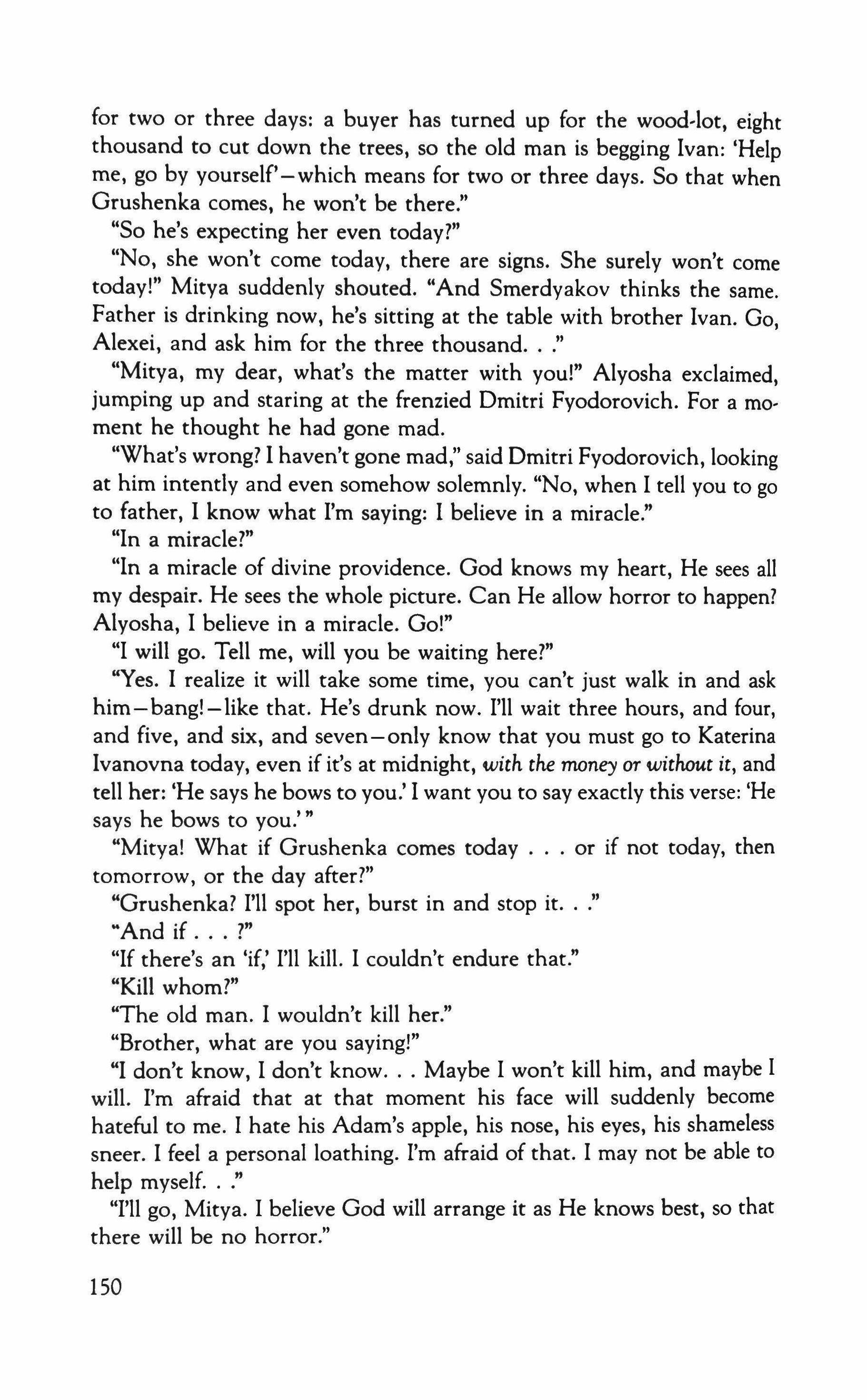
for two or three days: a buyer has turned up for the wood-lot, eight thousand to cut down the trees, so the old man is begging Ivan: 'Help me, go by yourself-which means for two or three days. So that when Grushenka comes, he won't be there."
"So he's expecting her even today?"
"No, she won't come today, there are signs. She surely won't come today!" Mitya suddenly shouted. "And Smerdyakov thinks the same. Father is drinking now, he's sitting at the table with brother Ivan. Go, Alexei, and ask him for the three thousand
"Mirya, my dear, what's the matter with you!" Alyosha exclaimed, jumping up and staring at the frenzied Dmitri Fyodorovich. For a moment he thought he had gone mad.
"What's wrong? I haven't gone mad," said Dmitri Fyodorovich, looking at him intently and even somehow solemnly. "No, when I tell you to go to father, I know what I'm saying: I believe in a miracle."
"In a miracle?"
"In a miracle of divine providence. God knows my heart, He sees all my despair. He sees the whole picture. Can He allow horror to happen? Alyosha, I believe in a miracle. Go!"
"I will go. Tell me, will you be waiting here?"
"Yes. I realize it will take some time, you can't just walk in and ask him-bang!-like that. He's drunk now. I'll wait three hours, and four, and five, and six, and seven-only know that you must go to Katerina Ivanovna today, even if it's at midnight, with the money or without it, and tell her: 'He says he bows to you.' I want you to say exactly this verse: 'He says he bows to you.'''
"Mitya! What if Grushenka comes today or if not today, then tomorrow, or the day after?"
"Grushenka? I'll spot her, burst in and stop it ."
"And if I"
"If there's an 'if,' I'll kill. I couldn't endure that."
"Kill whom?"
"The old man. I wouldn't kill her."
"Brother, what are you saying!"
"I don't know, I don't know Maybe I won't kill him, and maybe I will. I'm afraid that at that moment his face will suddenly become hateful to me. I hate his Adam's apple, his nose, his eyes, his shameless sneer. I feel a personal loathing. I'm afraid of that. I may not be able to help myself "
"I'll go, Mitya. I believe God will arrange it as He knows best, so that there will be no horror."
150

"And I'll sit and wait for a miracle. But if it doesn't happen, then " Alyosha, in deep thought, went to see his father.
Between the preceding scene and this one, Alyosha goes to his father's house, where he finds his father, Fyodor Pavlovich, getting drunk as the servants Grigory and Smerdyakoo fardcally argue about theology and Alyosha's brother Ivan offers atheistic opinions when Fyodor Pavlovich asks him to comment. Dmitri bursts in, furiously searching for Grushenka and violently assaults his father; he flees again and a temporary peace is restored. Our excerpt resumes at Madame Khokhlakov's house, where, after intense emotional confrontations among Katerina Ivanovna, Ivan, Alyosha and others, Alyosha receives these instructions:
Katerina Ivanovna suddenly returned. In her hands she had two hundred-rouble bills.
"I have a great favor to ask of you, Alexei Fyodorovich," she began, addressing Alyosha directly, in a seemingly calm and level voice, quite as though nothing had just happened. "A week ago-yes, a week, I thinkDmitri Fvodorovich committed a rash and unjust act, a very ugly act. There is a bad place here, a tavern. In it he met that retired officer, that captain, whom your father employed in some business of his. Dmitri Fyodorovich got very angry with this captain for some reason, seized him by the beard in front of everyone, led him outside in that humiliating position, and led him a long way down the street, and they say that the boy, the captain's son, who goes to the local school, just a child, saw it and went running along beside them, crying loudly and begging for his father, and rushing up to everyone asking them to defend him, but everyone laughed. Forgive me, Alexei Fyodorovich, I cannot recall without indignation this shameful act of his one of those acts which Dmitri Fyodorovich alone could bring himself to do, in his wrath and in his passions! I cannot even speak of it, I am unable to my words get confused. I made inquiries about this offended man, and found out that he is very poor. His last name is Snegiryov. He did something wrong in the army and was expelled, I can't talk about that, and now he and his family, a wretched family of sick children and a wife-who, it seems, is insane-have fallen into abject poverty. He has been living in town for a long time, he was doing something, worked somewhere as a scrivener, and now suddenly he's not being paid. I looked at you that is, I thought - I don't know, I'm somehow confused-you see, I wanted to ask you, Alexei Fyodorovich, my dearest Alexei Fyodorovich, to go to him, to find an excuse, to visit them, this
151

captain, I mean-oh God! I'm so confused-and delicately, carefullyprecisely as only you could manage" (Alvosha suddenly blushed}"manage to give him this assistance, here, two hundred roubles. He will surely accept I mean, persuade him to accept Or, no, what do I mean? You see, it's not a payment to him for conciliation, so that he will not complain (because it seems he wanted to lodge a complaint), but simply compassion, a wish to help, from me, from me, Dmitri Fvodorovich's fiancee, not from him. Well, you'll find a way. I would go myself, but you will know much better how to do it. He lives on Lake Street, in the house of a woman named Kalmykov For God's sake, Alexei Fyodorovich, do this for me, and now now I'm a little tired. Goodbye. ."
She suddenly turned and disappeared again behind the portiere, so quickly that Alyosha did not have time to say a word.
Part II, Book 4
Chapter 6: Strain in the Cottage
He was indeed in real distress, of a kind he had seldom experienced before. He had gone and "put his foot in it" - and in what? An affair of the heart! "But what do I know of that, what kind of judge am I in such matters?" he repeated to himself for the hundredth time, blushing. "Oh, shame would be nothing, shame would be only the punishment I deserve-the trouble is that now I will undoubtedly be the cause of new misfortunes And the elder sent me to reconcile and unite. Is this any way to unite?" Here again he recalled how he had "united" their hands, and again he felt terribly ashamed. "Though I did it all sincerely, I must be smarter in the future," he suddenly concluded, and did not even smile at his conclusion.
For Katerina Ivanovna's errand he had to go to Lake Street, and his brother Dmitri lived on the way there, not far from Lake Street, in a lane. Alyosha decided to stop at his place in any case, before going to the captain's, though he had a premonition that he would not find him at home. He suspected that his brother would perhaps be somehow deliberately hiding from him now, but he had to find him at all costs. Time was passing: the thought of the dying elder had never left him, not for a minute, not for a second, from the moment he left the monastery.
152
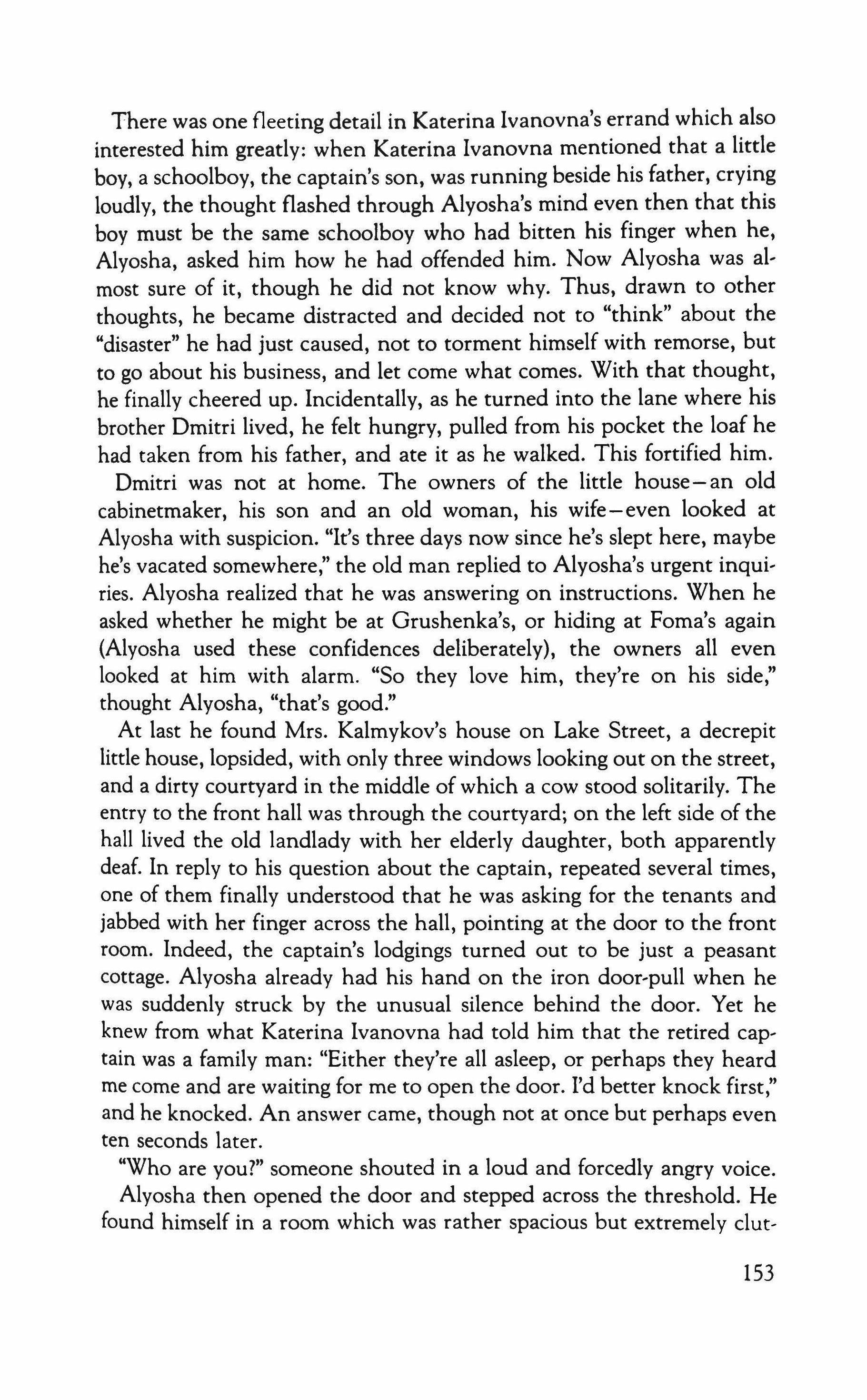
There was one fleeting detail in Katerina lvanovna's errand which also interested him greatly: when Katerina lvanovna mentioned that a little boy, a schoolboy, the captain's son, was running beside his father, crying loudly, the thought flashed through Alyosha's mind even then that this boy must be the same schoolboy who had bitten his finger when he, Alyosha, asked him how he had offended him. Now Alyosha was aI, most sure of it, though he did not know why. Thus, drawn to other thoughts, he became distracted and decided not to "think" about the "disaster" he had just caused, not to torment himself with remorse, but to go about his business, and let come what comes. With that thought, he finally cheered up. Incidentally, as he turned into the lane where his brother Dmitri lived, he felt hungry, pulled from his pocket the loaf he had taken from his father, and ate it as he walked. This fortified him.
Dmitri was not at home. The owners of the little house - an old cabinetmaker, his son and an old woman, his wife - even looked at Alyosha with suspicion. "It's three days now since he's slept here, maybe he's vacated somewhere," the old man replied to Alyosha's urgent inquiries. Alyosha realized that he was answering on instructions. When he asked whether he might be at Grushenka's, or hiding at Foma's again (Alyosha used these confidences deliberately), the owners all even looked at him with alarm. "So they love him, they're on his side," thought Alyosha, "that's good."
At last he found Mrs. Kalmykov's house on Lake Street, a decrepit little house, lopsided, with only three windows looking out on the street, and a dirty courtyard in the middle of which a cow stood solitarily. The entry to the front hall was through the courtyard; on the left side of the hall lived the old landlady with her elderly daughter, both apparently deaf. In reply to his question about the captain, repeated several times, one of them finally understood that he was asking for the tenants and jabbed with her finger across the hall, pointing at the door to the front room. Indeed, the captain's lodgings turned out to be just a peasant cottage. Alyosha already had his hand on the iron door-pull when he was suddenly struck by the unusual silence behind the door. Yet he knew from what Katerina Ivanovna had told him that the retired cap, tain was a family man: "Either they're all asleep, or perhaps they heard me come and are waiting for me to open the door. I'd better knock first," and he knocked. An answer came, though not at once but perhaps even ten seconds later.
"Who are you?" someone shouted in a loud and forcedly angry voice. Alyosha then opened the door and stepped across the threshold. He found himself in a room which was rather spacious but extremely clut-
153
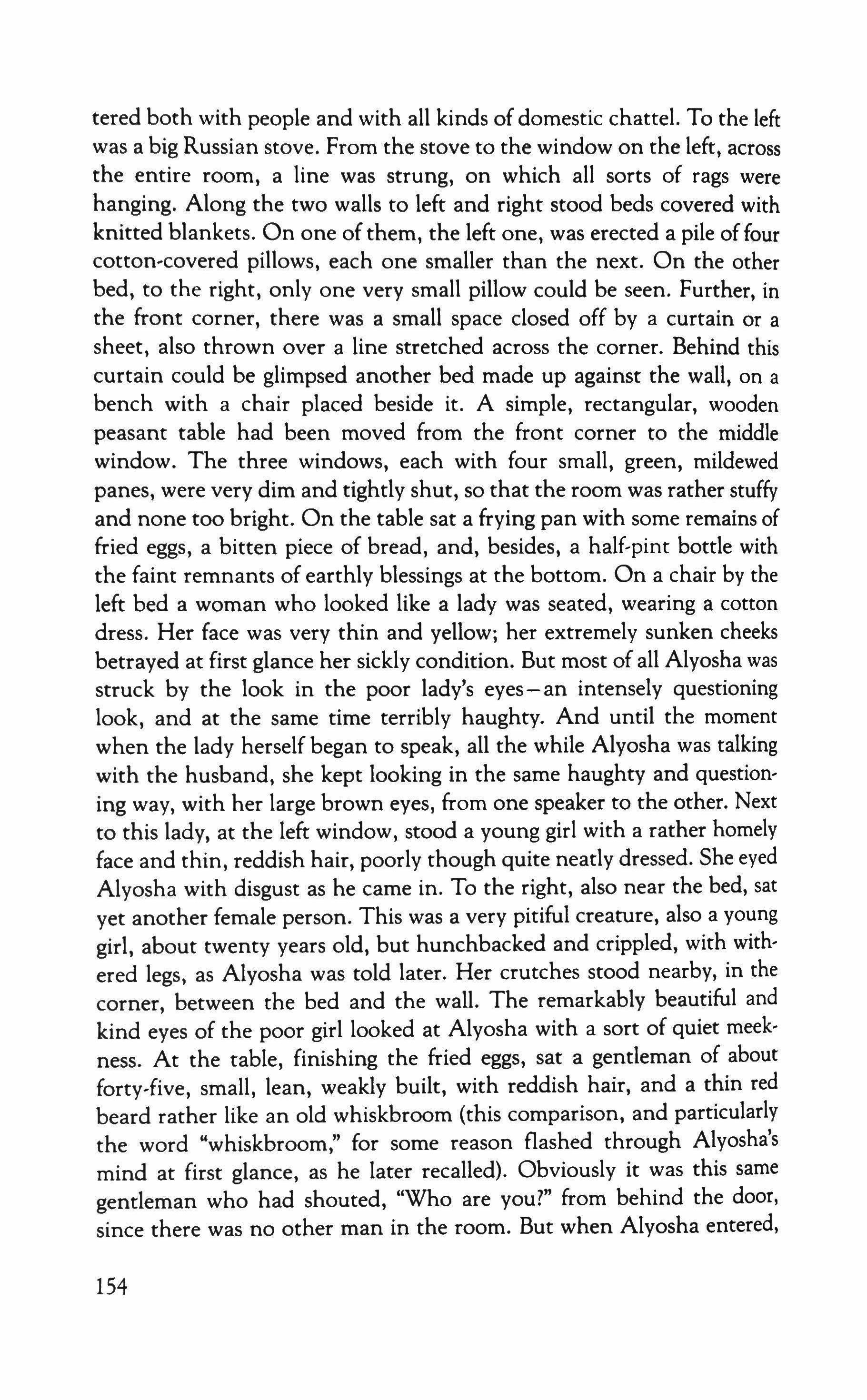
tered both with people and with all kinds of domestic chattel. To the left was a big Russian stove. From the stove to the window on the left, across the entire room, a line was strung, on which all sorts of rags were hanging. Along the two walls to left and right stood beds covered with knitted blankets. On one of them, the left one, was erected a pile offour cotton-covered pillows, each one smaller than the next. On the other bed, to the right, only one very small pillow could be seen. Further, in the front corner, there was a small space closed off by a curtain or a sheet, also thrown over a line stretched across the corner. Behind this curtain could be glimpsed another bed made up against the wall, on a bench with a chair placed beside it. A simple, rectangular, wooden peasant table had been moved from the front corner to the middle window. The three windows, each with four small, green, mildewed panes, were very dim and tightly shut, so that the room was rather stuffy and none too bright. On the table sat a frying pan with some remains of fried eggs, a bitten piece of bread, and, besides, a half-pint bottle with the faint remnants of earthly blessings at the bottom. On a chair by the left bed a woman who looked like a lady was seated, wearing a cotton dress. Her face was very thin and yellow; her extremely sunken cheeks betrayed at first glance her sickly condition. But most of all Alyosha was struck by the look in the poor lady's eyes-an intensely questioning look, and at the same time terribly haughty. And until the moment when the lady herself began to speak, all the while Alyosha was talking with the husband, she kept looking in the same haughty and questioning way, with her large brown eyes, from one speaker to the other. Next to this lady, at the left window, stood a young girl with a rather homely face and thin, reddish hair, poorly though quite neatly dressed. She eyed Alyosha with disgust as he came in. To the right, also near the bed, sat yet another female person. This was a very pitiful creature, also a young girl, about twenty years old, but hunchbacked and crippled, with withered legs, as Alyosha was told later. Her crutches stood nearby, in the corner, between the bed and the wall. The remarkably beautiful and kind eyes of the poor girl looked at Alyosha with a sort of quiet meekness. At the table, finishing the fried eggs, sat a gentleman of about forty-five, small, lean, weakly built, with reddish hair, and a thin red beard rather like an old whiskbroom (this comparison, and particularly the word "whiskbroom," for some reason flashed through Alyosha's mind at first glance, as he later recalled). Obviously it was this same gentleman who had shouted, "Who are you?" from behind the door, since there was no other man in the room. But when Alyosha entered,
154

he all but flew from the bench on which he was sitting at the table, and, hastily wiping his mouth with a tattered napkin, rushed up to Alyosha.
"A monk begging for the monastery - he's come to the right placer' the girl standing in the left corner meanwhile said loudly. But the gentleman who had run up to Alyosha immediately turned on his heel to her, and in an excited, somehow faltering voice, answered her:
"No, ma'am, Varvara Nikolaevna, that's not it, you've got it wrong! Allow me to ask in my turn, sir," he suddenly wheeled around to Alvosha again, "what has urged you, sir, to visit these depths?"
Alyosha looked at him attentively; it was the first time in his life he had seen the man. There was something angular, hurried and irritable in him. Although he had obviously just been drinking, he was not drunk. His face expressed a sort of extreme insolence, and at the same time-which was strange-an obvious cowardice. He looked like a man who had been submissive for a long time and suffered much, but had suddenly jumped up and tried to assert himself. Or, better still, like a man who wants terribly to hit you, but is terribly afraid that you are going to hit him. In his speech and the intonations of his rather shrill voice could be heard a sort of crackbrained humor, now spiteful, now timid, faltering and unable to sustain its tone. The question about "depths" he had asked all atremble, as it were, rolling his eyes, and jumping up to Alyosha, so close that Alyosha mechanically took a step back. The gentleman was wearing a coat of some sort of dark, rather shabby nankeen, stained and mended. His trousers were of a sort of extremely light color, such as no one had even been wearing for a long time, checkered, and made of some thin fabric, crumpled at the cuffs and therefore bunched upwards, as if he had outgrown them like a little boy.
"I am Alexei Karamazov Alyosha said in reply.
"That I am quite able to understand, sir," the gentleman immediately snapped, letting it be known that he was aware even without that of who Alyosha was. "And I am Captain, sir, for my part, Snegiryov, sir; but still it would be desirable to know precisely what has urged you to
"Oh, I just stopped by. As a matter offact, I'd like very much to have a word with you if I may
"In that case, here is a chair, sir, pray be seated, sir. As they used to say in the old comedies: 'Pray be seated. .,'" and with a quick gesture the captain seized an empty chair (a simple peasant one, all wood, not upholstered with anything) and placed it almost in the middle of the room; then, seizing another chair, just like the first, for himself, he sat
ISS

facing Alvosha, as close up to him as before, so that their knees almost touched.
"Nikolai llyich Snegiryov, sir, former captain in the Russian infantry, sir, disgraced by his vices, but still a captain. I should have said Captain Yessirov instead of Snegiryov, because it's only in the second half of my life that I've started saying 'vessir,' 'Yessir' is acquired in humiliation."
"That's very true," Alyosha smiled, "but is it acquired unwillingly or deliberately?"
"Unwillingly, God knows. I never used to say it, all my life I never used to say 'sir.' Suddenly I fell down and got up full of 'sirs.' It's the work of a higher power. I see that you're interested in contemporary problems. Yet how can I have aroused such curiosity, living as I do in conditions which render the exercise of hospitality impossible?"
"I've come about that matter "
"About what matter?" the captain interrupted impatiently.
"Concerning that encounter of yours with my brother, Dmitri Fvodorovich," Alyosha blurted out awkwardly.
"Which encounter, sir? You mean that one, sir? The one concerning the whiskbroom, the old whiskbroom?" he suddenly moved so close that this time he positively hit Alyosha with his knees. His lips somehow peculiarly compressed themselves into a thread.
"What whiskbroom?" Alyosha mumbled.
"He came to complain to you about me, Papa!" a boy's voice, already familiar to Alyosha, cried from behind the curtain in the corner. "It was his finger I bit today!"
The curtain was pulled aside, and Alyosha saw his recent enemy, in the corner, under the icons, on the little bed made up on a bench and a chair. The boy was lying under his own coat and an old quilted cotton blanket. He was obviously not well, and, judging by his burning eyes, was in a fever. He looked fearlessly at Alyosha now, unlike the first time: "See, I'm at home now, you can't get me."
"Bit what finger?" The captain jumped up a little from his chair. "Was it your finger he bit, sir?"
"Yes, mine. Today he was throwing stones with some boys in the street; the six of them were throwing at him, and he was alone. I came up to him, and he threw a stone at me, too, then another one, at my head. I asked him what I had done to him. He suddenly rushed at me and bit my finger badly, I don't know why."
"A whipping, right now, sir! A whipping this very minute, sir," the captain now jumped all the way out of his chair.
156
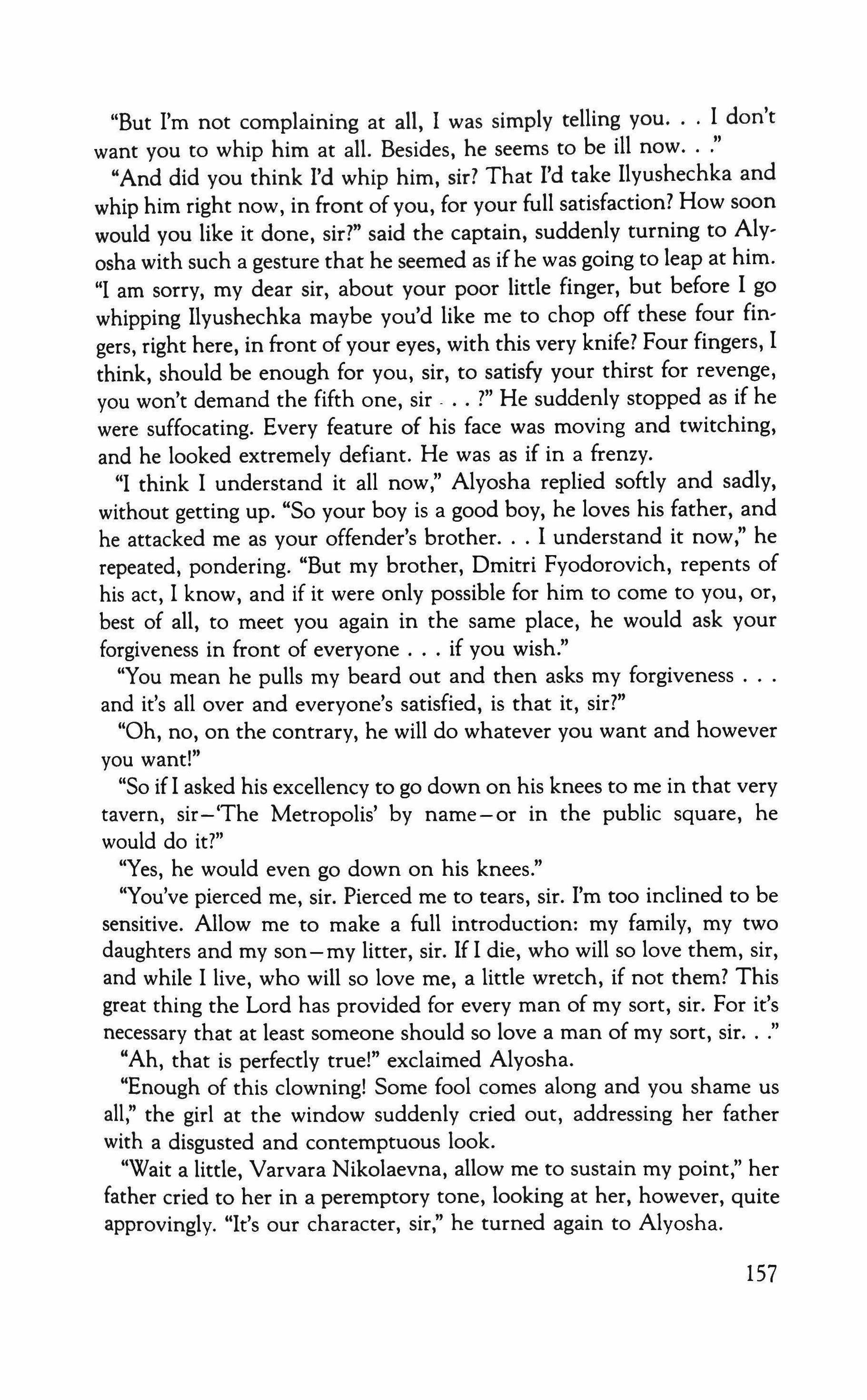
"But I'm not complaining at all, I was simply telling you I don't want you to whip him at all. Besides, he seems to be ill now
"And did you think I'd whip him, sir? That I'd take Ilvushechka and whip him right now, in front of you, for your full satisfaction? How soon would you like it done, sir?" said the captain, suddenly turning to Alvosha with such a gesture that he seemed as ifhe was going to leap at him.
"I am sorry, my dear sir, about your poor little finger, but before I go whipping llyushechka maybe you'd like me to chop off these four fin' gers, right here, in front of your eyes, with this very knife? Four fingers, I think, should be enough for you, sir, to satisfy your thirst for revenge, you won't demand the fifth one, sir - ?" He suddenly stopped as if he were suffocating. Every feature of his face was moving and twitching, and he looked extremely defiant. He was as if in a frenzy.
"I think I understand it all now," Alyosha replied softly and sadly, without getting up. "So your boy is a good boy, he loves his father, and he attacked me as your offender's brother I understand it now," he repeated, pondering. "But my brother, Dmitri Fyodorovich, repents of his act, I know, and if it were only possible for him to come to you, or, best of all, to meet you again in the same place, he would ask your forgiveness in front of everyone if you wish."
"You mean he pulls my beard out and then asks my forgiveness and it's all over and everyone's satisfied, is that it, sir?"
"Oh, no, on the contrary, he will do whatever you want and however you want!"
"So if I asked his excellency to go down on his knees to me in that very tavern, sir-The Metropolis' by name-or in the public square, he would do it?"
"Yes, he would even go down on his knees."
"You've pierced me, sir. Pierced me to tears, sir. I'm too inclined to be sensitive. Allow me to make a full introduction: my family, my two daughters and my son-my litter, sir. Ifl die, who will so love them, sir, and while I live, who will so love me, a little wretch, if not them? This great thing the Lord has provided for every man of my sort, sir. For it's necessary that at least someone should so love a man of my sort, sir
"Ah, that is perfectly true!" exclaimed Alyosha.
"Enough of this clowning! Some fool comes along and you shame us all," the girl at the window suddenly cried out, addressing her father with a disgusted and contemptuous look.
"Wait a little, Varvara Nikolaevna, allow me to sustain my point," her father cried to her in a peremptory tone, looking at her, however, quite approvingly. "It's our character, sir," he turned again to Alyosha.
157

"And in all nature there was nothing He would give his blessing to-
only it should be in the feminine: that she would give her blessing to, sir. But allow me to introduce you to my wife: this is Arina Petrovna, sir, a crippled lady, about forty-three-years old; she can walk, but very little, sir. From simple people. Arina Petrovna, smooth your brow; this is Alexei Fyodorovich Karamazov. Stand up, Alexei Fyodorovich," he took him by the arm, and with a force one would not have suspected in him, suddenly raised him up. "You are being introduced to a lady, you should stand up, sir. Not that Karamazov, Mama, the one who hm, and so on, but his brother, shining with humble virtues. Allow me, Arina Petrovna, allow me, Mama, allow me preliminarily to kiss your hand."
And he kissed his wife's hand respectfully and even tenderly. The girl at the window indignantly turned her back on the scene; the haughtily questioning face of the wife suddenly took on a remarkably sweet expression.
"How do you do, sit down, Mr. Chernomazov," she said.
"Karamazov, Mama, Karamazov-we're from simple people, sir," he whispered again.
"Well, Karamazov, or whatever it is, but I always say Chernomazov But sit down, why did he get you up? A crippled lady, he says, but my legs still work, only they're swollen like buckets, and the rest of me is dried up. Once I was good and fat, but now it's as if I swallowed a needle
"We're from simple people, sir, simple people," the captain prompted once again.
"Papa, oh, Papa!" the hunchbacked girl, who until then had been silent on her chair, said suddenly, and suddenly hid her eyes in her handkerchief.
"Buffoon!" the girl at the window flung out.
"You see what sort of news we have," the mother spread her arms, pointing at her daughters, "like clouds coming over; the clouds pass, and we have our music again. Before, when we were military, we had many such guests. I'm not comparing, dear father. If someone loves someone, let him love him. The deacon's wife came once and said: 'Alexander Alexandrovich is a man ofexcellent soul, but Nastasya,' she said, 'Nastasya Petrovna is a hellcat.' 'Well,' I said, 'we all have our likes and you're a little pile, but you smell vile.' 'And you need to be kept in your place,' she said. 'Ah, you black sword,' I said to her, 'who are you to teach me?' 'I'm
158

letting in fresh air,' she said, 'yours is foul.' 'Go and ask all the gentlemen officers,' I told her, 'whether the air in me is foul or otherwise.' And from that time on it's been weighing on my heart, and the other day I was sitting here, like now, and saw the general come in who visited us in Holy Week: 'Tell me, now, Your Excellency,' I said to him, 'can a noble lady let in free air?' 'Yes,' he said to me, 'you should open the window or the door, because the air in here is not clean. And it's always like that! What's wrong with my air? The dead smell even worse. 'I'm not spoiling your air,' I tell them, 'I'll order some shoes and go away.' My dear ones, my darlings, don't reproach your own mother! Nikolai Ilyich, dear father, don't I please you? I have only one thing left-that Ilyushechka comes home from school and loves me. Yesterday he brought me an apple. Forgive me, my dears, forgive me, my darlings, forgive your own mother, I'm quite lonely, and why is my air so offensive to you?"
And the poor woman suddenly burst into sobs, tears streamed from her eyes. The captain quickly leaped to her side.
"Mama, Mama, darling, enough, enough! You're not lonely. Everyone loves you, everyone adores you!" and he again began kissing both her hands and tenderly caressing her face with his palms; and taking a napkin, he suddenly began wiping the tears from her face. Alyosha even fancied that there were tears shining in his eyes, too. "Well, sir, did you see? Did you hear, sir?" he suddenly turned somehow fiercely to Alyosha, pointing with his hand to the poor, feeble-minded woman.
"I see and hear," murmured Alyosha.
"Papa, Papa! How can you with him stop it, Papa!" the boy suddenly cried, rising in his bed and looking at his father with burning eyes.
"Enough of your clowning, showing off your stupid antics, which never get anywhere!" Varvara Nikolaevna shouted from the same corner, quite furious now, and even stamping her foot.
"You are perfectly justified, this time, to be so good as to lose your temper, Varvara Nikolaevna, and I will hasten to satisfy you. Put on your hat, Alexei Fyodorovich, and I will take my cap-and let us go, sir. I have something serious to tell you, only outside these walls. This sitting girl here-she's my daughter, sir, Nina Nikolaevna, I forgot to introduce her to you-is God's angel in the flesh who has flown down to us mortals if you can possibly understand that "
"He's twitching all over, as if he had cramps," Varvara Nikolaevna went on indignantly.
"And this one who is now stamping her little foot and has just denounced me as a clown-she, too, is God's angel in the flesh, sir, and
159

rightly calls me names. Let us go, Alexei Fyodorovich, we must bring this to an end, sir "
And seizing Alyosha's arm, he led him from the room and straight outside.
Part II, Book 4
Chapter 7: And in the Fresh Air
"The air is fresh, sir, and in my castle it is indeed not clean, not in any sense. Let's walk slowly, sir. I would very much like to enlist your interest, sir."
"And I, too, have some extraordinary business with you," Alyosha remarked, "only I don't know how to begin."
"Didn't I know that you must have some business with me, sir? Without some business, you would never come to call on me. Unless you came, indeed, only to complain about the boy, sir? But that is improbable. By the way, about the boy, sir: I couldn't explain everything in there, but here I will describe that scene to you. You see, the whiskbroom used to be thicker, sir, just a week ago-I'm referring to my beard, sir; my beard is nicknamed a whiskbroom, mostly by the schoolboys, sir. Well, and so, sir, your good brother, Dmitri Fyodorovich, dragged me by my beard that day, he dragged me out of the tavern to the square, and just then the schoolboys were getting out of school, and Ilyusha with them. When he saw me in such a state, sir, he rushed up to me: 'Papa,' he cried, 'Papa!' He caught hold of me, hugged me, tried to pull me away, crying to my offender: 'Let go, let go, it's my papa, Papa, forgive him' - that was what he cried: 'Forgive him!' And he took hold of him, too, with his little hands, and kissed his hand, that very hand, sir I remember his face at that moment, I have not forgotten it, sir, and I will not forget it I"
"I swear to you," exclaimed Alvosha, "that my brother will express his repentance in the most sincere, the fullest manner, even if it means going down on his knees in that very square I will make him, or he is no brother of mine!"
"Aha, so it's still in the planning stage! And proceeds not directly from him, but only from the nobility of your fervent heart. Why didn't you say so, sir? No, in that case, allow me to finish telling you about the highly chivalrous and soldierly nobility of your good brother, for he
160
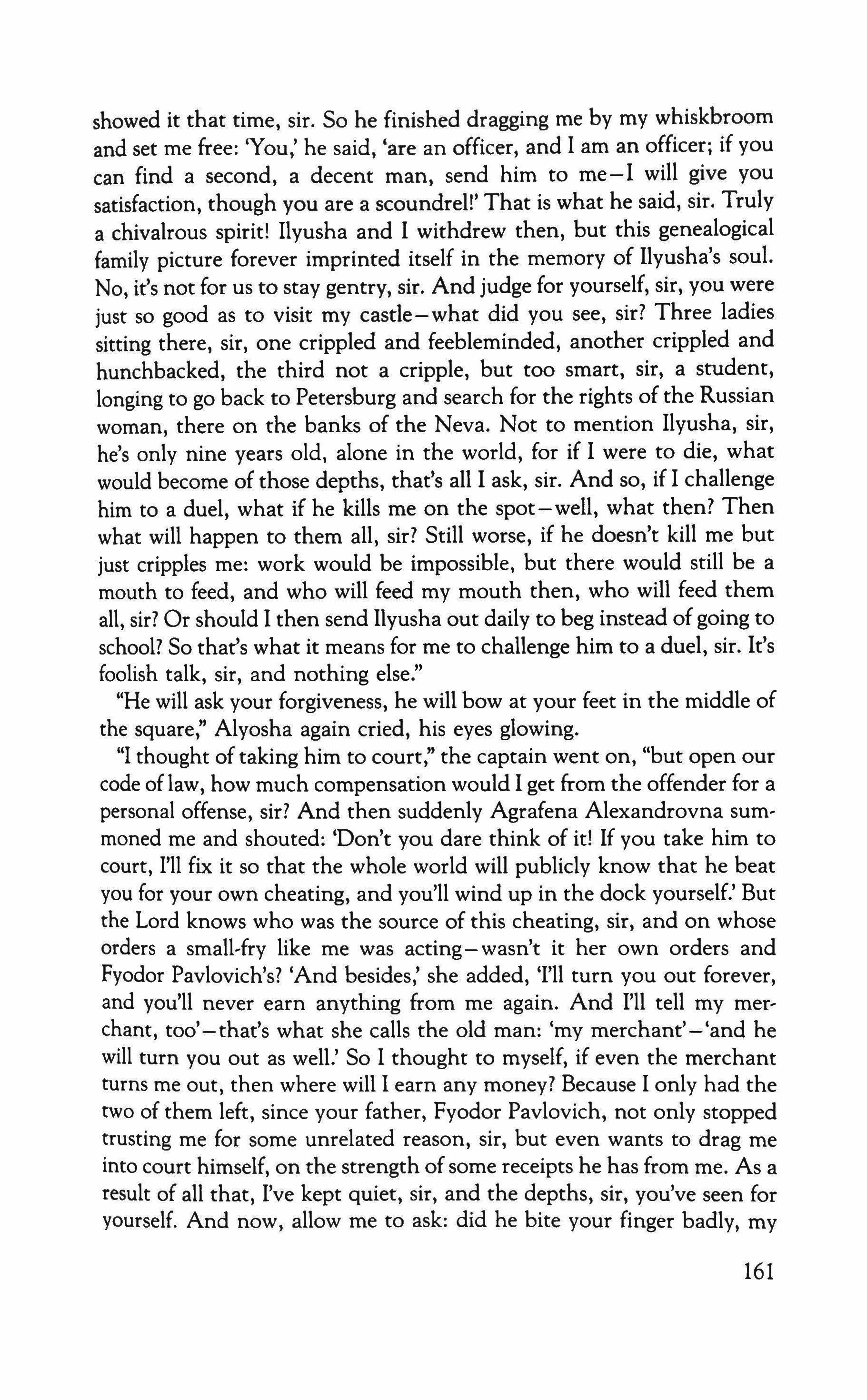
showed it that time, sir. So he finished dragging me by my whiskbroom and set me free: 'You,' he said, 'are an officer, and I am an officer; if you can find a second, a decent man, send him to me-I will give you satisfaction, though you are a scoundrel!' That is what he said, sir. Truly a chivalrous spirit! Ilvusha and I withdrew then, but this genealogical family picture forever imprinted itself in the memory of llyusha's soul. No, it's not for us to stay gentry, sir. And judge for yourself, sir, you were just so good as to visit my castle-what did you see, sir? Three ladies sitting there, sir, one crippled and feebleminded, another crippled and hunchbacked, the third not a cripple, but too smart, sir, a student, longing to go back to Petersburg and search for the rights of the Russian woman, there on the banks of the Neva. Not to mention llyusha, sir, he's only nine years old, alone in the world, for if I were to die, what would become of those depths, that's all I ask, sir. And so, if I challenge him to a duel, what if he kills me on the spot - well, what then? Then what will happen to them all, sir? Still worse, if he doesn't kill me but just cripples me: work would be impossible, but there would still be a mouth to feed, and who will feed my mouth then, who will feed them all, sir? Or should I then send llyusha out daily to beg instead of going to school? So that's what it means for me to challenge him to a duel, sir. It's foolish talk, sir, and nothing else."
"He will ask your forgiveness, he will bow at your feet in the middle of the square," Alyosha again cried, his eyes glowing.
"I thought of taking him to court:' the captain went on, "but open our code oflaw, how much compensation would I get from the offender for a personal offense, sir? And then suddenly Agrafena Alexandrovna summoned me and shouted: 'Don't you dare think of it! If you take him to court, I'll fix it so that the whole world will publicly know that he beat you for your own cheating, and you'll wind up in the dock yourself.' But the Lord knows who was the source of this cheating, sir, and on whose orders a small-fry like me was acting - wasn't it her own orders and Fyodor Pavlovich's? 'And besides,' she added, 'I'll turn you out forever, and you'll never earn anything from me again. And I'll tell my merchant, too'-that's what she calls the old man: 'my merchant' - 'and he will turn you out as well.' So I thought to myself, if even the merchant turns me out, then where willI earn any money? Because I only had the two of them left, since your father, Fyodor Pavlovich, not only stopped trusting me for some unrelated reason, sir, but even wants to drag me into court himself, on the strength of some receipts he has from me. As a result of all that, I've kept quiet, sir, and the depths, sir, you've seen for yourself. And now, allow me to ask: did he bite your finger badly, my
161
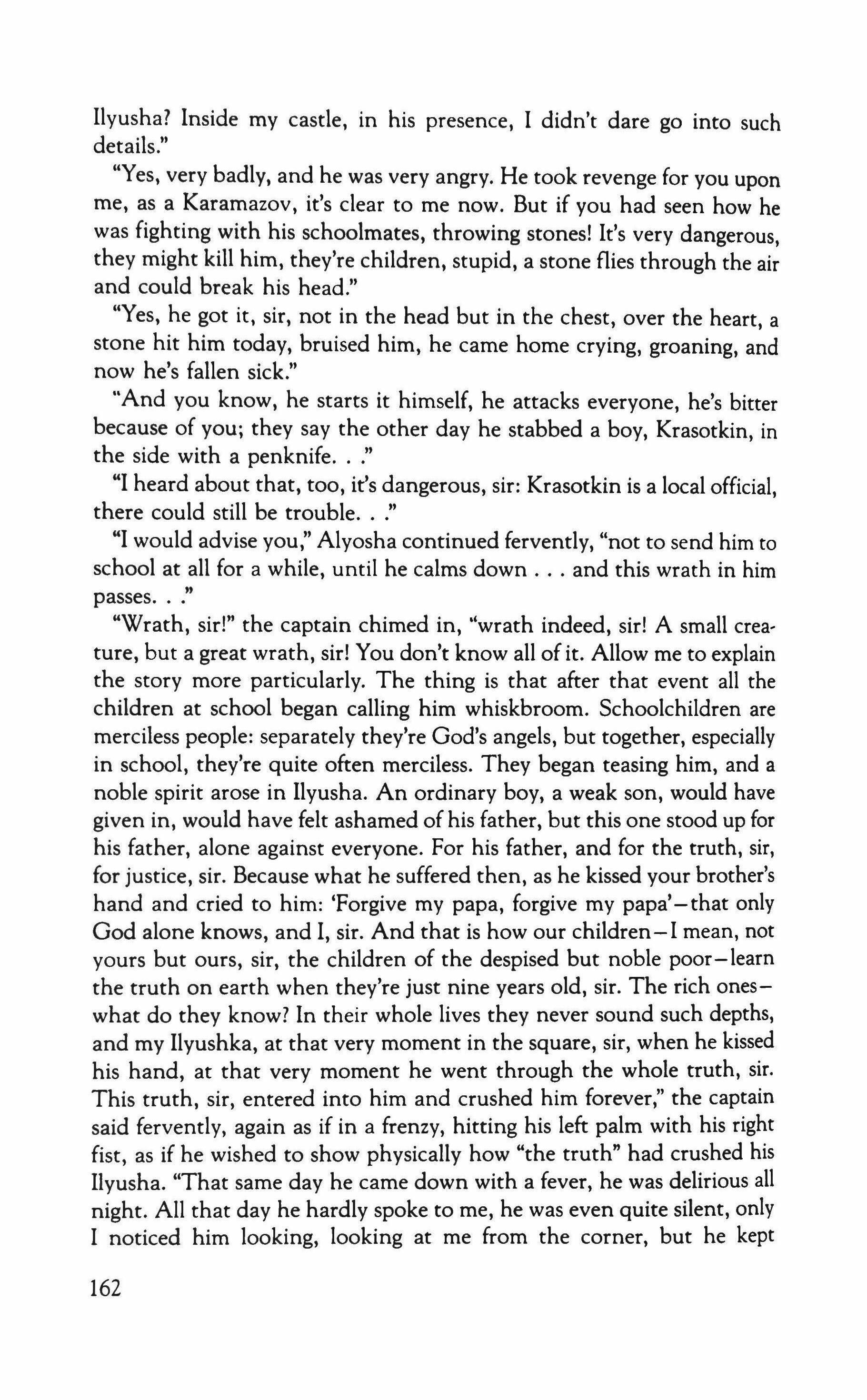
llyusha? Inside my castle, in his presence, I didn't dare go into such details."
"Yes, very badly, and he was very angry. He took revenge for you upon me, as a Karamazov, it's clear to me now. But if you had seen how he was fighting with his schoolmates, throwing stones! It's very dangerous, they might kill him, they're children, stupid, a stone flies through the air and could break his head."
"Yes, he got it, sir, not in the head but in the chest, over the heart, a stone hit him today, bruised him, he came home crying, groaning, and now he's fallen sick."
"And you know, he starts it himself, he attacks everyone, he's bitter because of you; they say the other day he stabbed a boy, Krasotkin, in the side with a penknife
"I heard about that, too, it's dangerous, sir: Krasotkin is a local official, there could still be trouble
"I would advise you," Alyosha continued fervently, "not to send him to school at all for a while, until he calms down and this wrath in him passes
"Wrath, sir!" the captain chimed in, "wrath indeed, sir! A small creature, but a great wrath, sir! You don't know all of it. Allow me to explain the story more particularly. The thing is that after that event all the children at school began calling him whiskbroom. Schoolchildren are merciless people: separately they're God's angels, but together, especially in school, they're quite often merciless. They began teasing him, and a noble spirit arose in llyusha. An ordinary boy, a weak son, would have given in, would have felt ashamed of his father, but this one stood up for his father, alone against everyone. For his father, and for the truth, sir, for justice, sir. Because what he suffered then, as he kissed your brother's hand and cried to him: 'Forgive my papa, forgive my papa'-that only God alone knows, and I, sir. And that is how our children-l mean, not yours but ours, sir, the children of the despised but noble poor-learn the truth on earth when they're just nine years old, sir. The rich oneswhat do they know? In their whole lives they never sound such depths, and my llyushka, at that very moment in the square, sir, when he kissed his hand, at that very moment he went through the whole truth, sir. This truth, sir, entered into him and crushed him forever," the captain said fervently, again as if in a frenzy, hitting his left palm with his right fist, as if he wished to show physically how "the truth" had crushed his llyusha. "That same day he came down with a fever, he was delirious all night. All that day he hardly spoke to me, he was even quite silent, only I noticed him looking, looking at me from the corner, but he kept
162

leaning more towards the window, pretending he was doing his homework, but I could see that he didn't have homework on his mind. The next day I did some drinking, sir, and forgot a lot; I'm a sinful man, from grief, sir. Mama there also began crying-and I love Mama very much, sir-well, from grief I had a drop on my last few kopecks. Don't despise me, my good sir: in Russia, drunks are our kindest people. Our kindest people are also the most drunk. So I was lying there and I didn't much remember llyusha that day, and it was precisely that day when the boys started jeering at him in school, that morning, sir: 'Whiskbroom: they shouted at him, 'your father was dragged out of the tavern by his whiskbroom, and you ran along asking forgiveness.' On the third day he came home from school, and I saw that he looked pale, awful. 'What's wrong?' I asked. Silence. Well, there was no talking about it in our castle, otherwise Mama and the girls would immediately take part-and besides, the girls already knew all about it even on the first day. Varvara Nikolaevna was already grumbling: 'Clowns, buffoons, can you never be reasonable?' 'Right,' I said, 'Varvara Nikolaevna, we can never be reasonable.' I got off with that at the time. So, sir, towards evening I took my boy out for a walk. And you should know, sir, that even before that, every evening he and I used to take a walk, just the same way we're going now, from our gate to that big stone over there, standing like an orphan in the road near the wattle fence, where the town common begins: the place is deserted and beautiful, sir. We were walking along, llyusha and I, his little hand in my hand, as usual; he has such a tiny hand, his little fingers are so thin and cold-my boy suffers from a weak chest. 'Papa,' he said, 'Papa!' 'What?' I said to him, and I could see that his eyes were flashing. 'Papa, the way he treated you, Papa!' 'It can't be helped, Ilyusha,' I said. 'Don't make peace with him, Papa, don't make peace. The boys say he gave you ten roubles for it.' 'No, llyusha,' I said, 'I won't take any money from him, not for anything.' Then he started shaking all over, seized my hand in both his hands, and kissed it again. 'Papa: he said, 'Papa, challenge him to a duel; they tease me at school, they say you're a coward and won't challenge him to a duel, but you'll take his ten roubles.' 'It's not possible for me to challenge him to a duel, Ilyusha,' I answered, and explained to him briefly all that I just explained to you about that. He listened. 'Papa,' he said, 'Papa, even so, don't make peace with him: I'll grow up, I'll challenge him myself, and I'll kill him!' And his eyes were flashing and shining. Well, I'm still his father for all that, I had to tell him the right thing. 'It's sinful to kill,' I said, 'even in a duel.' 'Papa,' he said, 'Papa, I'll throw him down when I'm big, I'll knock the sword out of his hand with my sword, I'll rush at him, throw him down, hold my
163

sword over him and say: "I could kill you now, but I forgive you, so there!" You see, sir, you see what a process went on in his little head over those two days! Day and night he was thinking precisely about that revenge with the sword, and that must have been in his delirium at night, sir. Only he started coming home from school badly beaten up, I learned of it the day before yesterday and you're right, sir, I won't send him to that school anymore. When I learned that he was going alone against the whole class, and was challenging everyone, and that he was so bitter, that his heart was burning-I was afraid for him. Again we went for a walk. 'Papa,' he asked, 'Papa, is it true that the rich are stronger than anybody in the world?' 'Yes, Ilvusha,' I said, 'no one in the world is stronger than the rich.' 'Papa,' he said, 'I'll get rich, I'll become an officer, and I'll beat everybody, and the tsar will reward me. Then I'll come back, and nobody will dare .' He was silent for a while, then he said, and his little lips were still trembling as before: 'Papa,' he said, 'our town is not a good town, Papa!' 'Yes, Ilvushechka,' I said, 'it's really not a very good town.' 'Papa, let's move to another town, a good one,' he said, 'a town where they don't know about us.' 'We will,' I said, 'we will move, Ilyusha, as soon as I save some money.' I was glad to be able to distract him from his dark thoughts, and so we began dreaming of how we'd move to another town, how we'd buy our own horse and cart. 'We'll sit Mama and your sisters in the cart and cover them, and we ourselves will walk beside it, and from time to time you'll get in and ride and I'll walk beside, because we must spare our horse, we shouldn't all ride, and so we'll set off.' He was delighted with that, most of all because we'd have our own horse and he could ride it. Everyone knows that a Russian boy is born with a horse. We chattered for a long time: thank God, I thought, I've diverted him, comforted him. That was two days ago, in the evening, but by yesterday evening it all turned out differently. That morning he went to school again and came back gloomy, much too gloomy. In the evening I took him by the hand, we went for a walk; he was silent, he didn't speak. The breeze picked up, the sun clouded over, there was autumn in the air, and dusk was already coming-we walked along, both feeling sad. 'Well, my boy,' I said, 'how are we going to get ourselves ready for the road?' - thinking to bring him around to our conversation of the day before. Silence. But I could feel his little fingers trembling in my hand. Eh, I thought, that's bad, there's something new. We came to this very stone, just as we are now, I sat on the stone, and in the sky there were kites humming and flapping on their strings, about thirty of them. It's the season for kites, sir. 'Look, Ilyusha,' I said, 'it's time we flew our kite from last year. I'll mend it. Where do you keep it?'
164

My boy was silent, he looked away, turned aside from me. And suddenly the wind whistled and blew up some sand He rushed to me suddenly, threw his little arms around my neck, and hugged me. You know, when children are silent and proud, and have been holding back their tears for a long time, when they suddenly burst out, if a great grief comes, the tears don't just flow, sir, they pour out in streams. With these warm streams he suddenly wet my whole face. He suddenly sobbed as if he was in convulsions, and began shaking and pressing me to him as I sat there on the stone. 'Papa,' he cried, 'Papa, dear Papa, how he humiliated you!' Then I began weeping, too, sir. We were sitting, holding each other, and sobbing. 'Papa,' he said, 'dear Papa!' 'Ilyusha,' I said, 'dear Ilyusha!' No one saw us then, sir, only God saw us-let's hope he'll enter it into my record, sir. Thank your good brother, Alexei Fyodorovich. No, sir, I will not whip my boy for your satisfaction, sir!"
He ended on the same note of cracked and spiteful humor. Alyosha felt, however, that he already trusted him, and that if someone else were in his, Alvosha's, place, with someone else the man would not have "talked" as he had, would not have said all that he had just said to him. This encouraged Alyosha, whose soul was trembling with tears.
"Ah, how I wish I could make peace with your boy!" he exclaimed. "If only you could arrange it. ."
"Right, sir," the captain muttered.
"But something else now, something quite different," Alyosha went on exclaiming. "Listen: I've come with an errand. This same brother of mine, this Dmitri, has also insulted his fiancee, a most noble girl, of whom you've probably heard. I have the right to tell you of this insult, I even must do so, because when she learned of your offense and learned everything about your unfortunate situation, she charged me at once just now to bring you this assistance from her but just from her alone, not from Dmitri, who has abandoned her as well, not at all, and not from me, his brother, or from anyone else, but from her, just from her alone! She entreats you to accept her help you have both been offended by one and the same man She thought of you only when she suffered the same offense from him (the same in intensity) as you! It means that a sister is coming to the aid of a brother She precisely charged me to persuade you to accept these two hundred roubles from her as from a sister. No one will know of it, no unjust gossip will arise from it here are the two hundred roubles, and, I swear, you must accept them, otherwise otherwise it follows that everyone in the world must be enemies of each other! But there are
165

brothers in the world, too. You have a noble soul you must understand, you must !"
And Alyosha held out too him two new, iridescent hundred-rouble bills. They were both standing precisely by the big stone near the fence, and there was no one around. The bills seemed to make a terrible impression on the captain: he started, but at first only as if from astonishment: he had not imagined anything of the sort and did not at all expect such an outcome. Even in sleep he did not dream of anyone's help, not to mention so large a sum. He took the bills, and for a moment almost could not reply, something quite new flashed in his face.
"Is this for me, for me, sir, so much money, two hundred roubles? Good heavens! But I haven't seen so much money for the past four years-Lord! And she says that a sister and it's true really true?"
"I swear that everything I told you is true!" Alyosha cried. The captain blushed.
"Listen, sir, my dear, listen, if I do accept it, won't that make me dishonorable? In your eyes, Alexei Fyodorovich, won't it, won't it make me dishonorable? No, Alexei Fyodorovich, listen, listen to me, sir," he was hurrying, touching Alyosha all the time with both hands, "here you are persuading me to accept it, telling me that a 'sister' has sent it, but inside, in your own heart - won't you hold me in contempt if I accept it, sir, eh?"
"But, no, of course not! I swear to you by my own salvation, I will not! And no one will ever know of it but us: you, I and she, and one other lady, her great friend
"Forget the lady! Listen, Alexei Fyodorovich, listen to me, sir, because the moment has now come for you to listen, sir, because you cannot even understand what these two hundred roubles can mean for me now," the poor man went on, gradually getting into a sort of confused, almost wild ecstasy. He was befuddled, as it were, and was speaking extremely quickly and hastily, as if he was afraid they might not let him get it all out. "Besides the fact that it has been acquired honestly, from such a respected and holy 'sister,' sir, do you know that I can now get treatment for mama and Ninochka-my hunchbacked angel, my daughter? Doctor Herzenstube came once out of the goodness of his heart, and examined them both for a whole hour. 'I can make nothing of it,' he said, but still, the mineral water they sell at the local pharmacy (he gave a prescription for it) will undoubtedly do her good, and he also prescribed a footbath with medications. The mineral water costs thirty kopecks, and she would have to drink maybe forty jugs of it. So I took the prescription and put it on the shelf under the icons, and it's still there.
166

And for Ninochka he prescribed baths in some solution, hot baths, every day, morning and evening, but how could we dream of such a treatment, sir, in our place, in our castle, with no maid, with no help, with no tub or water, sir? And Ninochka is rheumatic all over, I didn't even tell you that yet, at night her whole right side aches, she suffers, and would you believe it, God's angel, she keeps it in, so as not to disturb us, she doesn't groan, so as not to wake us up. We eat whatever we can get, and she always takes the worst piece, what should only be thrown to a dog: 'I'm not worthy of it,' is what she means, 'I'm taking food from you, I'm just a burden to you.' That's what her angelic eyes mean to say. It weighs on her that we serve her: 'I don't deserve it, I don't deserve it, I'm a worthless cripple, I'm useless,' but I wouldn't say she was worthless, sir, when she's been the salvation of us all with her angelic meekness; without her, without her quiet word, we'd have hell, sir, she's even softened Varya. And don't condemn Varvara Nikolaevna either, sir; she, too, is an angel, she, too, is an offended one. She came home this summer and brought sixteen roubles with her that she'd earned giving lessons and set aside so that in September-now, that is-she could go back to Petersburg. And we took her money and lived on it, and she has nothing to go back with, that's how things are, sir. And she can't go back, because she slaves for us - we've saddled and harnessed her like a horse; she takes care of everything, mends, washes, sweeps the floor, puts Mama to bed, and Mama is fussy, sir, Mama is tearful, sir, and Mama is mad, sir ! But now, with these two hundred roubles, I can hire a maid, sir, do you understand, Alexei Fyodorovich, I can undertake treatment for my dear ones, sir, send the student to Peters, burg, sir, and buy beef, and introduce a new diet, sir. Lord, but this is a dream!"
Alyosha was terribly glad that he had caused so much happiness and that the poor man had agreed to be made happy.
"Wait, Alexei Fyodorovich, wait," the captain again seized upon a new dream that had just come to him, and again rattled on in a frenzied patter, "do you know, perhaps now Ilvushka and I will indeed realize our dream: we'll buy a horse and a covered cart, and the horse will be black, he asked that it be black, and we'll set off as we were picturing it two days ago. I know a lawyer in K-- province, my childhood friend, sir, and I was told by a reliable man that if I came he might give me a position as a clerk in his office, and who knows, maybe he would So I could put Mama in the cart, and Ninochka in the cart, and let 11, yushechka drive, and I'd go by foot, and so I'd take them all away, sir
167

Lord, if only I could get one miserable debt paid back to me, then maybe there would even be enough for that, sir!"
"There will be enough, there will be!" Alyosha exclaimed. "Katerina Ivanovna will send you more, as much as you want, and, you know, I have some money, too, take what you need, as you would from a brother, from a friend, you can pay it back later (you'll get rich, you will!) And, you know, you could never have thought of anything better than this move to another province! It will be your salvation, and, above all, your boy's - and, you know, you should hurry, before winter, before the cold, and you will write to us from there, and we will remain brothers No, it's not a dream!"
Alyosha was about to embrace him, he was so pleased. But glancing at him, he suddenly stopped: the man stood, stretching his neck, stretching his lips, with a pale and frenzied face, whispering something with his lips, as if he were trying to utter something; there was no sound, but he kept whispering with his lips. It was somehow strange.
"What's wrong with you?" Alyosha suddenly started for some reason.
"Alexei Fyodorovich I you ," the captain muttered and broke off, staring strangely and wildly straight in his face, with the look of a man who has decided to throw himself off a cliff, and at the same time smiling, as it were, with his lips only. "I, sir you, sir And would you like me to show you a nice little trick, sir?" he suddenly whispered in a quick, firm whisper, his voice no longer faltering.
"What little trick?"
"A little trick, a bit of hocus-pocus," the captain kept whispering; his mouth became twisted to the left side, his left eye squinted, he went on staring at Alyosha as if his eyes were riveted to him.
"But what's wrong with you? What trick?" Alvosha cried, now quite alarmed.
"Watch this!" the captain suddenly shrieked.
And holding up both iridescent bills, which all the while, during the whole conversation, he had been holding by the corner between the thumb and index finger of his right hand, he suddenly seized them in some kind of rage, crumpled them, and clutched them tightly in his right fist.
"See that, sir, see that?" he shrieked to Alyosha, pale and frenzied, and suddenly, raising his fist, he threw both crumpled bills with all his might on the sand. "See that, sir?" he shrieked again, pointing at them with his finger. "Well, so, there, sir !"
And suddenly raising his right foot, he fell to trampling them with his heel, in wild anger, gasping and exclaiming each time his foot struck:
168
"There's your money, sir! There's your money, sir! There's your money, sir! There's your money, sir!" Suddenly he leaped back and straightened up before Alyosha. His whole figure presented a picture of inexplicable pride.
"Report to those who sent you that the whiskbroom does not sell his honor, sir!" he cried out, raising his arm in the air. Then he quickly turned and broke into a run; but he hadn't gone even five steps when, turning all the way around, he suddenly made a gesture to Alyosha with his hand. Then, before he had gone even five more steps, he turned around again, this time for the last time, and now there was no twisted laugh on his face, but, on the contrary, it was all shaken with tears. In a weeping, faltering, spluttering patter, he cried out:
"And what would I tell my boy, if I took money from you for our disgrace?" And having said this, he broke into a run, this time without turning around. Alyosha looked after him with inexpressible sadness. Oh, he understood that the captain had not known until the very last moment that he would crumple the bills and fling them down. The running man did not once look back, and Alyosha knew that he would not look back. He did not want to pursue him or call out to him, and he knew why. When the captain was out of sight, Alvosha picked up the two bills. They were just very crumpled, flattened and pressed into the sand, but were perfectly intact and crisp as new when Alyosha spread them and smoothed them out. Having smoothed them out, he folded them, put them in his pocket, and went to report to Katerina Ivanovna on the success of her errand.
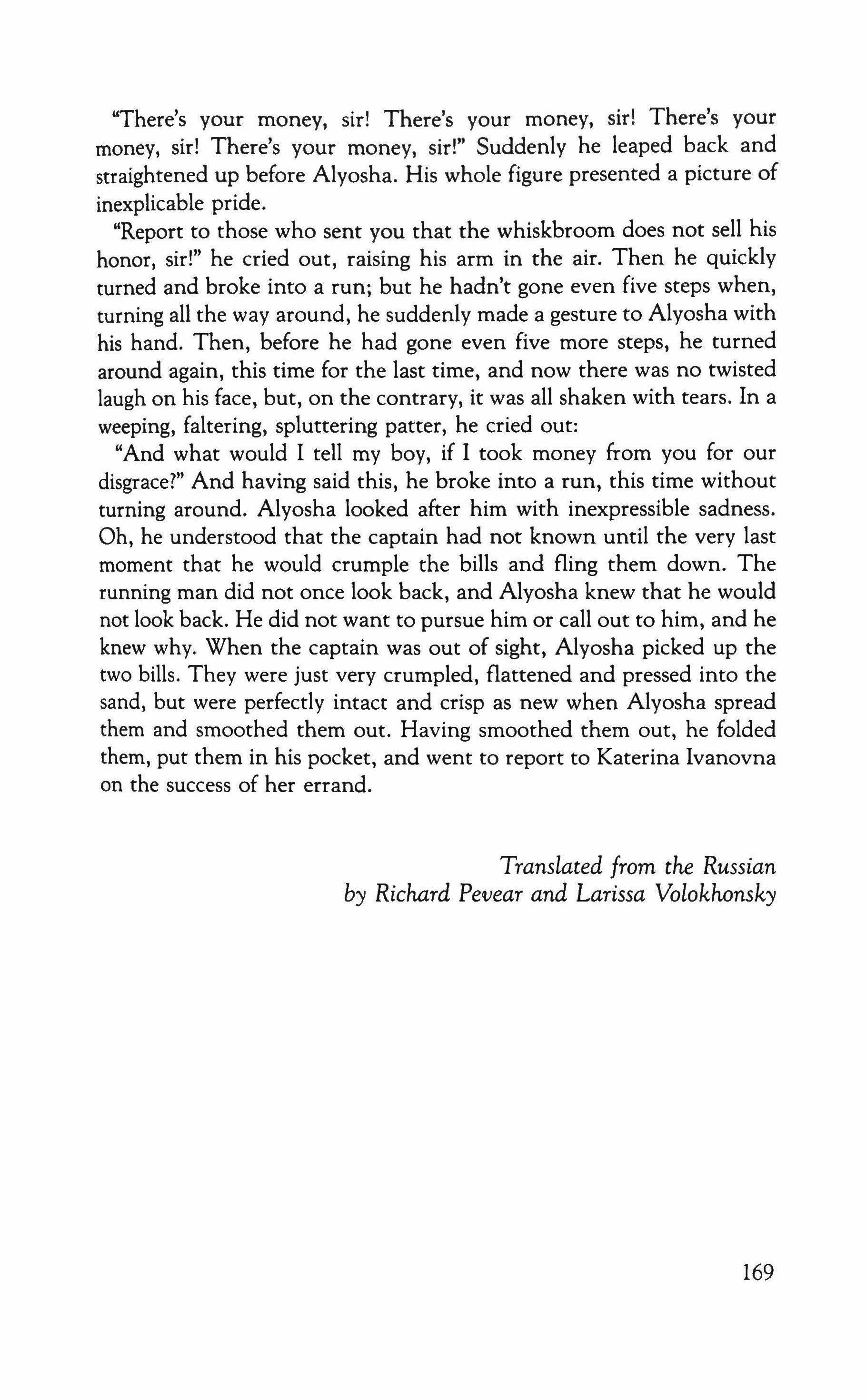 Pevear and Larissa
Pevear and Larissa
Translated from the Russian by Richard
Volokhonsky
169
FroID Holy Ewe-Lamb, Madonna of the Pressure Cooker
Athina Papadaki

The ten poems appearing here for the first time in English translation are from a nineteen-poem cycle, Holy Ewe-Lamb, Madonna of the Pressure Cooker, published in Thessaloniki in 1980. A leftist and a feminist, Papadaki writes in the tradition of Elytis and Ritsos; she uses a particularly Greek form of surrealism, centered on the concrete realities ofdaily life. Drawing on liturgical and mythological references, and on the many levels of spoken Greek, she evokes a rich literary and popular tradition while always staying close to the experience and speech of a wide audience.
- Thalia A. Pandiri
Persephone
Ever since my husband's shift began, I am dense night. As for the old days, In my mother's house, I've got to admit My dowry was white and my days full of sunlight. They've profaned spring with my name.
170
From My Window
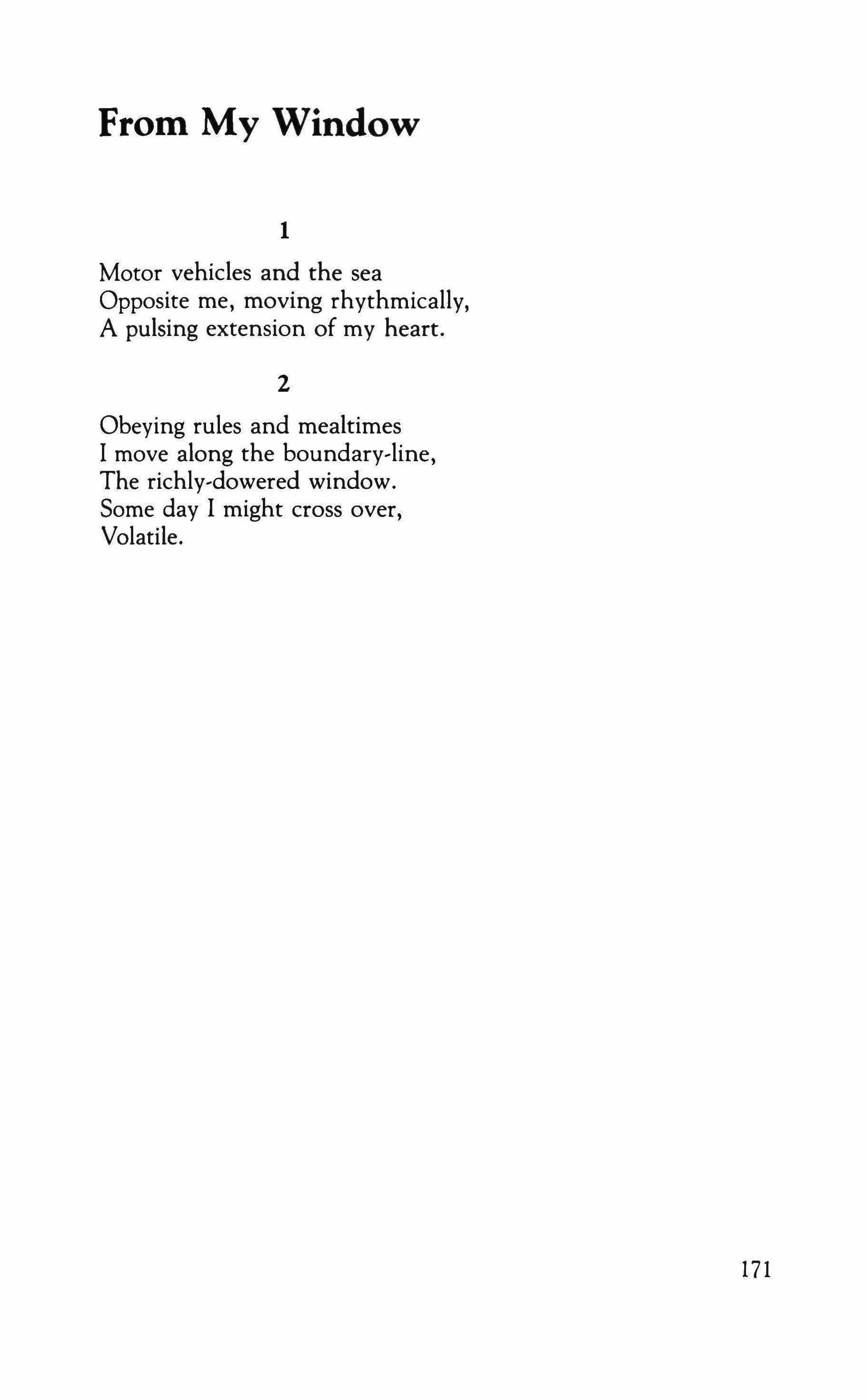
1
Motor vehicles and the sea
Opposite me, moving rhythmically, A pulsing extension of my heart.
2
Obeying rules and mealtimes I move along the boundary-line, The richly-dowered window. Some day I might cross over, Volatile.
171
Dusting

I turn my memory back to material objects.
The wood, the glass
Intuit my love, and they gleam. I even take good care of the dust rag Hanging on my line.
"Washed so clean," I think, "it must be remembering the cotton fields of Boeotia."
Just a housewife, just one cheap cotton print after another, I'm bulldozed by the dust, And I give in until my head clothes feet escape, uncared for, Missing In Action.
172
Hanging Out the Wash

For the space of one morning, my wash dowered the roof. Here it is. The Great Shepherd, the sheet of my marriage bed, snaps loud in the wind. A breeze recites the white embroidered linens. When I take the sheet down, dry Holding my arms up like a hierophant I am shaken, A votive offering that has etched deeper the boundaries of desecration.
This insignificant duty Earns me the title of Lady of the House; I glide towards the stairs, a black freighter.
173
Ironing
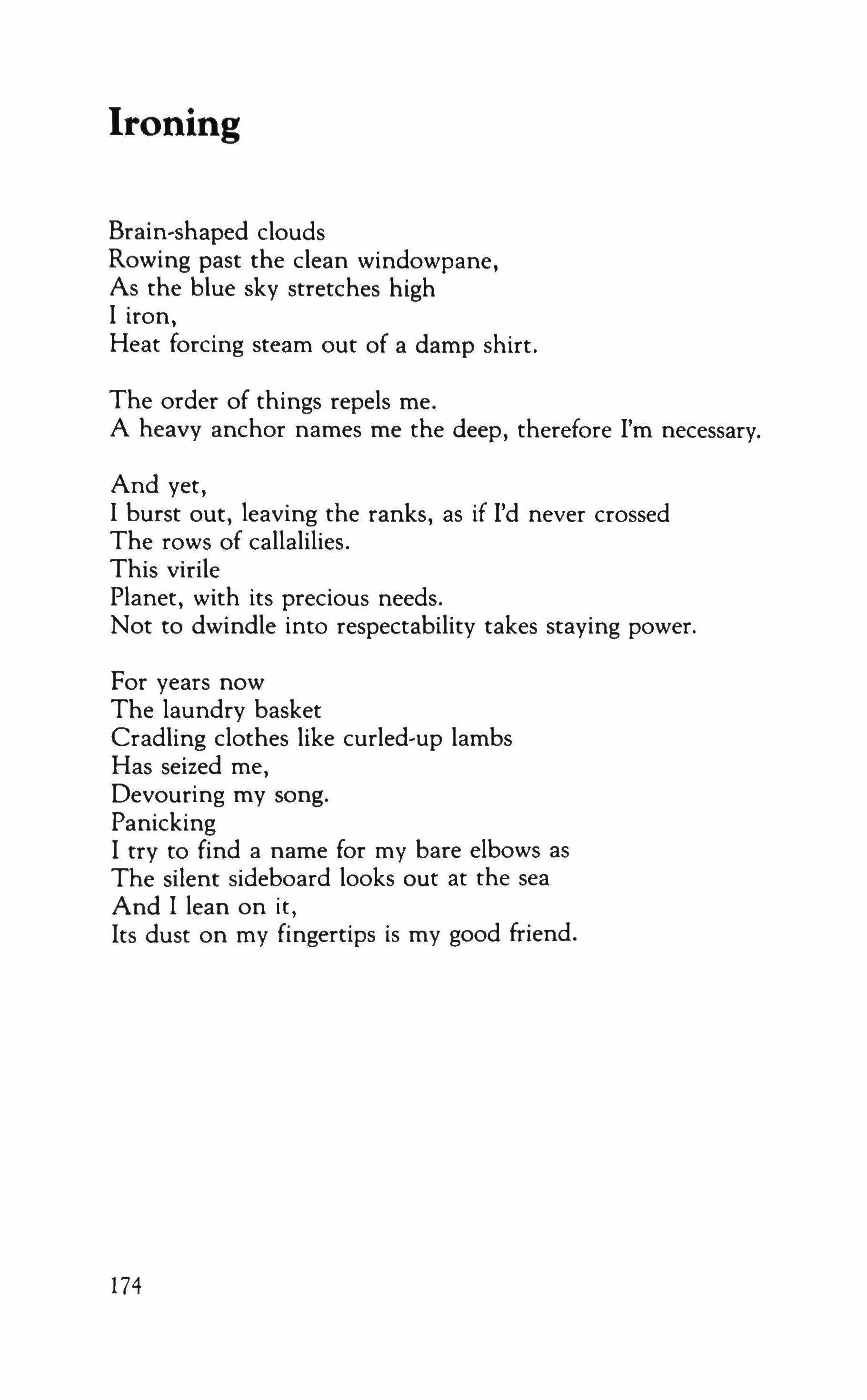
Brain-shaped clouds
Rowing past the clean windowpane, As the blue sky stretches high I iron,
Heat forcing steam out of a damp shirt.
The order of things repels me. A heavy anchor names me the deep, therefore I'm necessary.
And yet,
I burst out, leaving the ranks, as if I'd never crossed The rows of callalilies.
This virile Planet, with its precious needs. Not to dwindle into respectability takes staying power.
For years now
The laundry basket
Cradling clothes like curled-up lambs Has seized me, Devouring my song.
Panicking
I try to find a name for my bare elbows as The silent sideboard looks out at the sea And I lean on it, Its dust on my fingertips is my good friend.
174
K.P.

Dust motes falling in the falling light. A mound of dirty dishes waits for me Like the mountain waiting for its prophet, An escape route tunneling its way to whiteness. No hope, and I'm worn down by rules and schedules.
Other times, I am gone, translucent. The baby's feeding time leaves no taste in my mouth.
175
Cooking

At the stove, Monotonous sizzling of meatballs, An odor without fire. Suddenly I find myself up-ended, Cornerstone china-services explode lewdly, in slow motion.
A civilization of things diminishes me. I throw off my apron.
Assumption,
My foot planted firmly over the abyss, Turning everything inside outOnly a child could recognize me now, The child clutching at my skirt as beautiful as an apple, I take a bite
With pain and love I report to those who will come after always keep afloat and keep away from dams.
If they ask after me, I'll come back fast
To set the table.
176
Tidying Up

There are times when habit is fulfilling. With love and submissiveness I protect my men. For their sake, my needle wounds their clothes. The swaggerers of rooms and drawers have never learned -it's a talentthat I elevated my humble pillow-cases into high priestesses of dreams. I am a woman, something like midnight, my precious darkness still raw material.
177
Kitchen Cupboards

These linens, mute witnesses of love, Tablecloths, napkins
That embrace the table Or the knees, Are they what reduces me to nothing?
2
Some day the dishes
Will reveal their inner light, Reciting for my mother's hands Poetry of clay or glass. Even the mighty mountain-ranges Will marvel at their cleansing.
1
178

Housewife
Time to rest
Hands folded over the harvest. I'd measured the flour accurately, But there was a slight debit in the sugar column. It couldn't have been otherwise. This is my life, the corridor That joins the bedroom to the formal parlor, What else? I don't dare say it, Something slyly sucks me dry, The walls like white-robed Patriarchs bless my work, I bend so they don't see that as I wring out the mop my tears flow back toward their roots.
Translated from the Greek by Thalia A. Pandiri
179
Diary: Day of Rest
Sandra McPherson

The poplar tops buck, inflate, die down, and shake to a stillness, righted, not wilted, magnolia petals brushed out on the lawn.
On the radio a man would give his life for inspiration, shouts belief in an old saint's rules. And missionaries shoulder to shoulder at the door ring a bell to say their god is not a racist anymore.
But now: I feel breathed in, the body worked to a suppleness at last, its age more than ever welcoming fresh scents.
The opened daphne fanned insideinto my ears, around in hollows under my eyes.
March 13. Mirrors reflect a storm top to bottom, windchimes echo its pearly pandemonium.
Same date last century: we'd be smart women who did all Sunday work on Saturday, saying it was ordained. Then no one holier or heavier could force chores from us on our day of rest.
It's Sunday so no grown daughter can expect the letter her mother never writes, any bulletin of nervous aspirations.
180

I believe: no credence ever, ever, without curiosity.
A divinity's apt to be busy todayscanning rest, from all exposures reverencing the apple-blossom atom.
181
Three Poems
Betsy Fogelman

Remembrance by a Vase
The first time I opened, like the mouth of this flower I was in water.
I'd anchored myself by the back to the bottom of the ocean where it laps the shore, my nose jutted out and the ends of waves surged over me and off like drunken sleep.
Day was water and air and the sun dropping petals on me from its unfathomable blossom.
The water told me what the earth was saying. It filled my ears, the holy language, the word which begins and waits to be spoken.
I was captive of the benevolent father. I did not resist. If I could listen it would sing the whole song, every word ever spoken, silent as the flower.
The waves spread on me. Inside I stormed pacific lavender. There is so much every country has to offer.
I was born then in a way I'd never imagined. I loved the seashore as I had my mother.
182
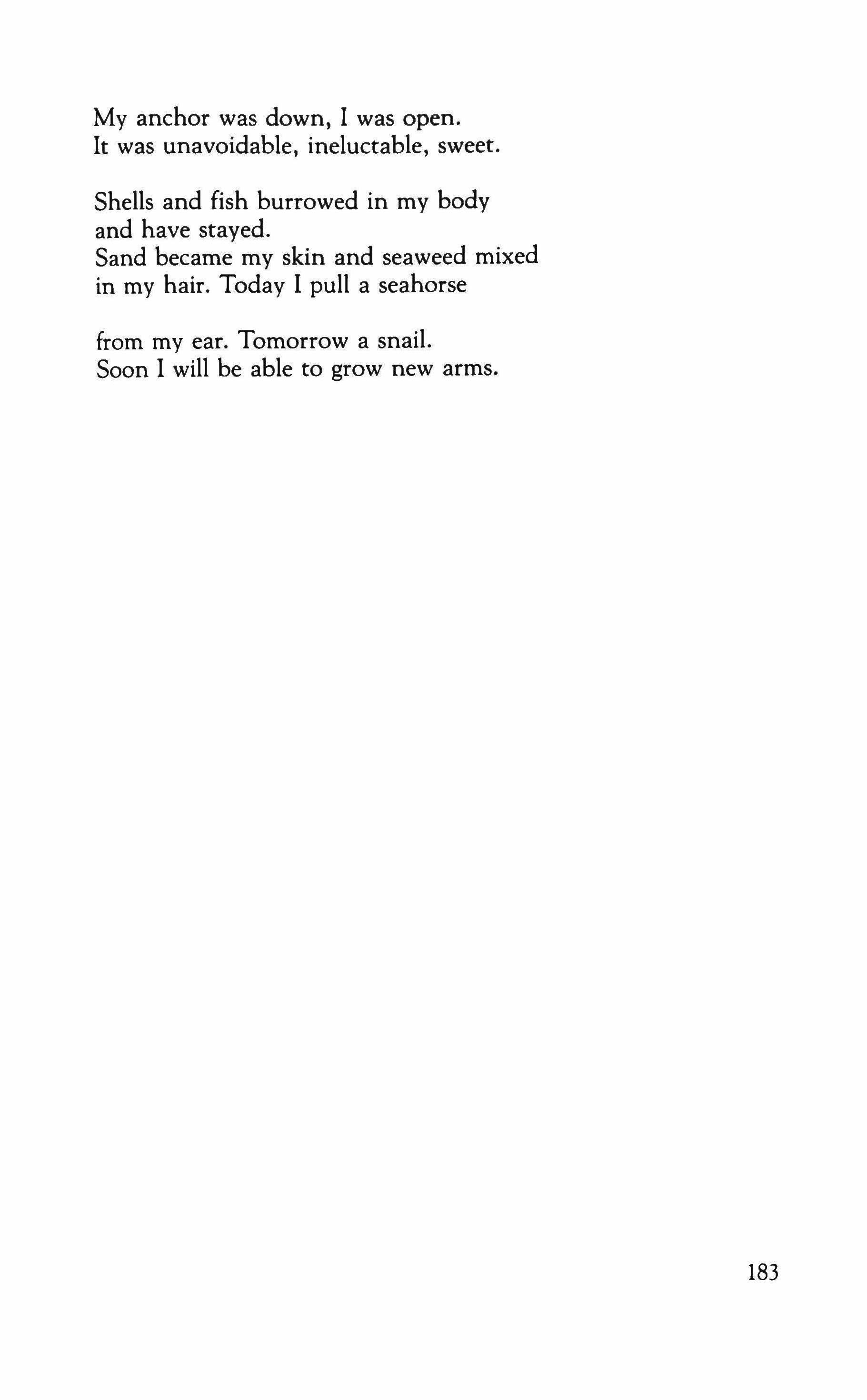
My anchor was down, I was open. It was unavoidable, ineluctable, sweet.
Shells and fish burrowed in my body and have stayed. Sand became my skin and seaweed mixed in my hair. Today I pull a seahorse from my ear. Tomorrow a snail. Soon I will be able to grow new arms.
183
A Man Speaks to His Woman

These moments I want to last forever. Your fingers bunched like grapes dangling from a vine, their rosy tips glistening from the water of my tongue.
When I found you I'd almost forgotten, hidden from the dangers of love a year or more and women veiled like mirrors in an empty house the owners thought they'd return to in a season.
I don't know which shines brighter for me now you, or the silver sun we could hardly stand to see above the trees as we moved east.
184
Womanly
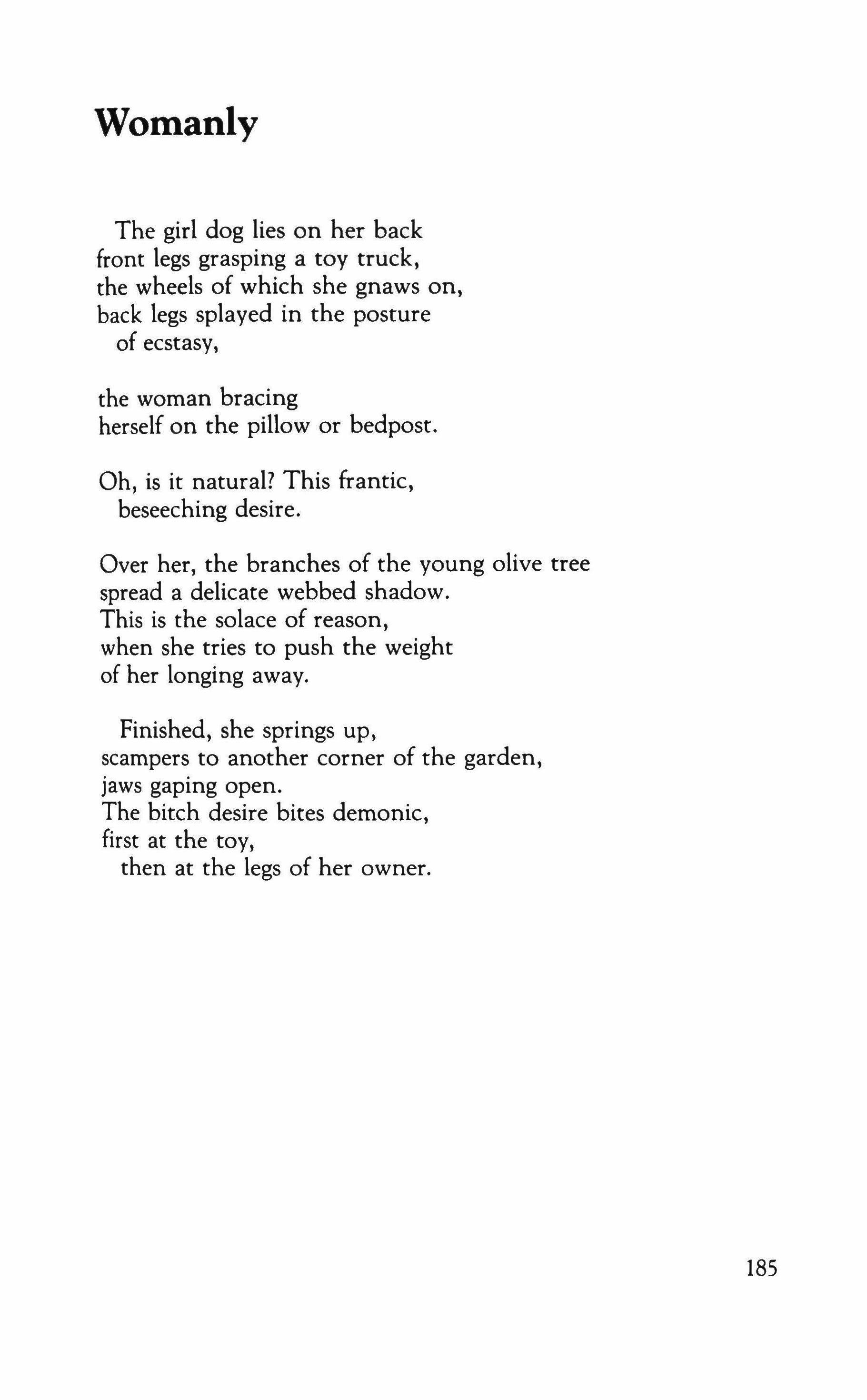
The girl dog lies on her back front legs grasping a toy truck, the wheels of which she gnaws on, back legs splayed in the posture of ecstasy, the woman bracing herself on the pillow or bedpost.
Oh, is it natural? This frantic, beseeching desire.
Over her, the branches of the young olive tree spread a delicate webbed shadow. This is the solace of reason, when she tries to push the weight of her longing away.
Finished, she springs up, scampers to another corner of the garden, jaws gaping open. The bitch desire bites demonic, first at the toy, then at the legs of her owner.
185
Three Poems
Franz Wright
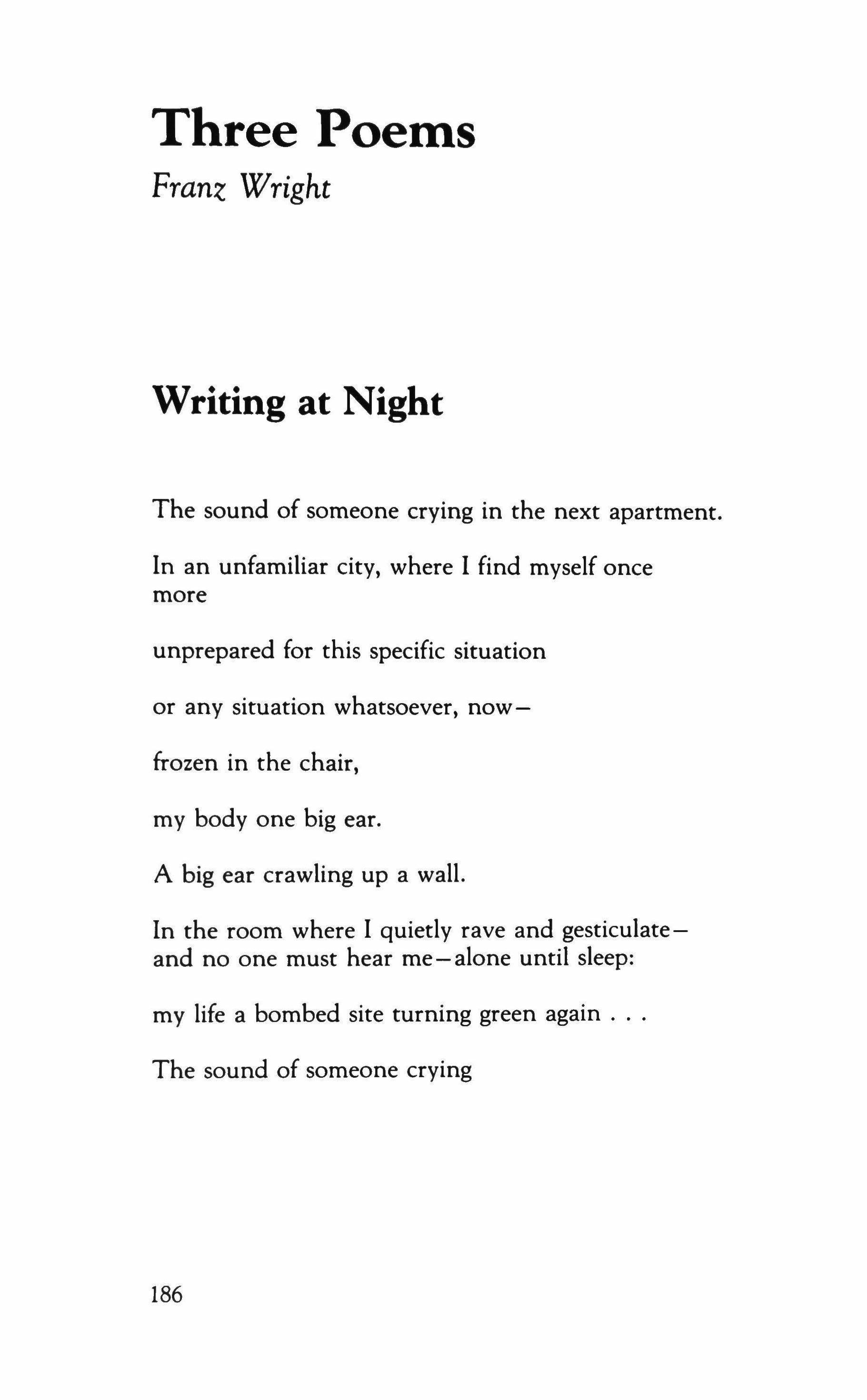
Writing at Night
The sound of someone crying in the next apartment.
In an unfamiliar city, where I find myself once more unprepared for this specific situation or any situation whatsoever, nowfrozen in the chair, my body one big ear. A big ear crawling up a wall. In the room where I quietly rave and gesticulateand no one must hear me - alone until sleep: my life a bombed site turning green again
The sound of someone crying
186
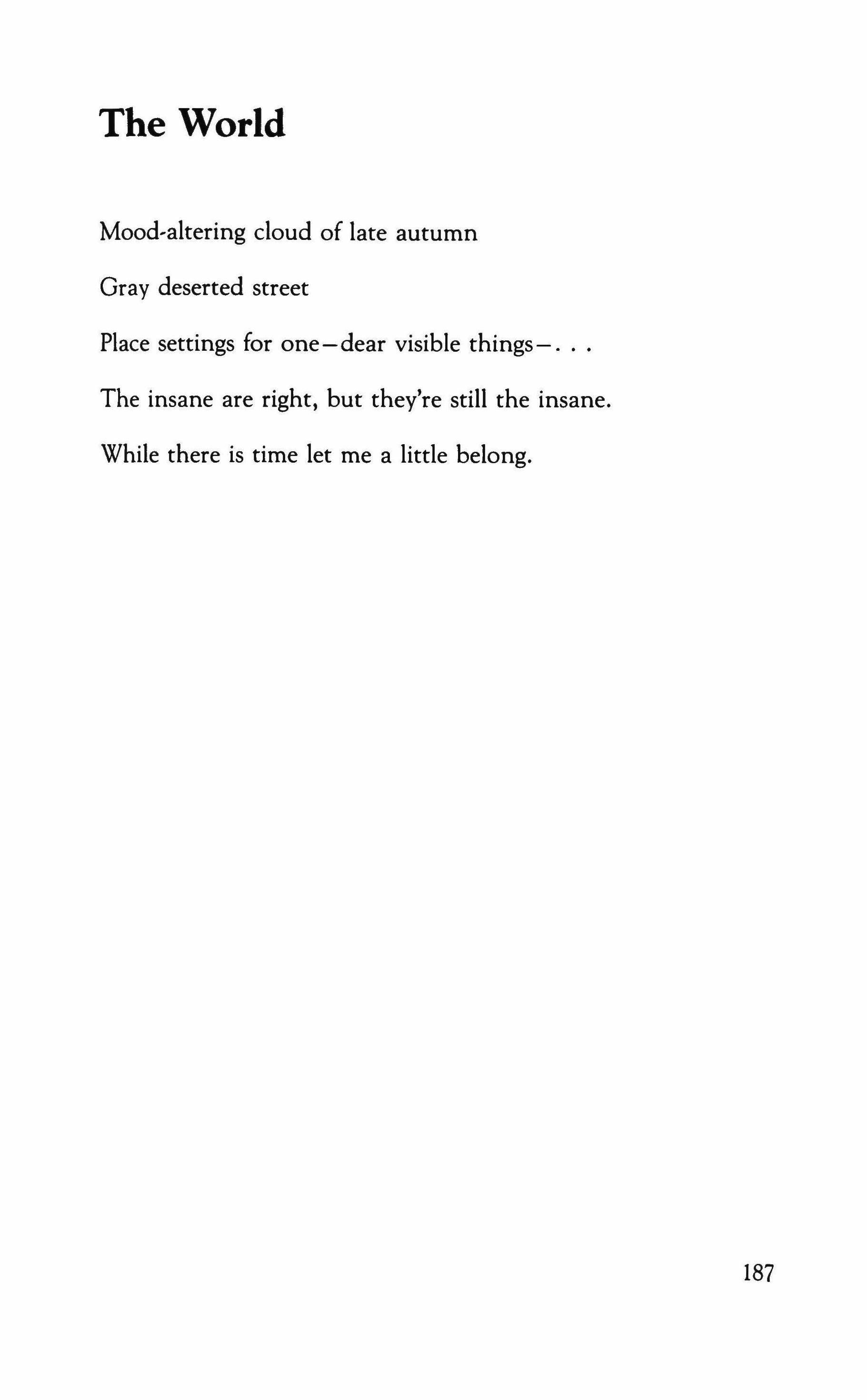
The World
Mood-altering cloud of late autumn
Gray deserted street
Place settings for one-dear visible things-
The insane are right, but they're still the insane.
While there is time let me a little belong.
187

Poem
for Frank Bidart
Per each dweller
one grass blade, one leaf
one apartment
one shadow one rat.
By itself, defending a lost position, the poem writing the poet
Anvil of solitude
So diminish the city's population by one, and go add your tear to the sea-
Heart that wonderfully lasted until I learned how to write what it so longed to say
Nothing of the kind.
188
Devils Night
James Reidel
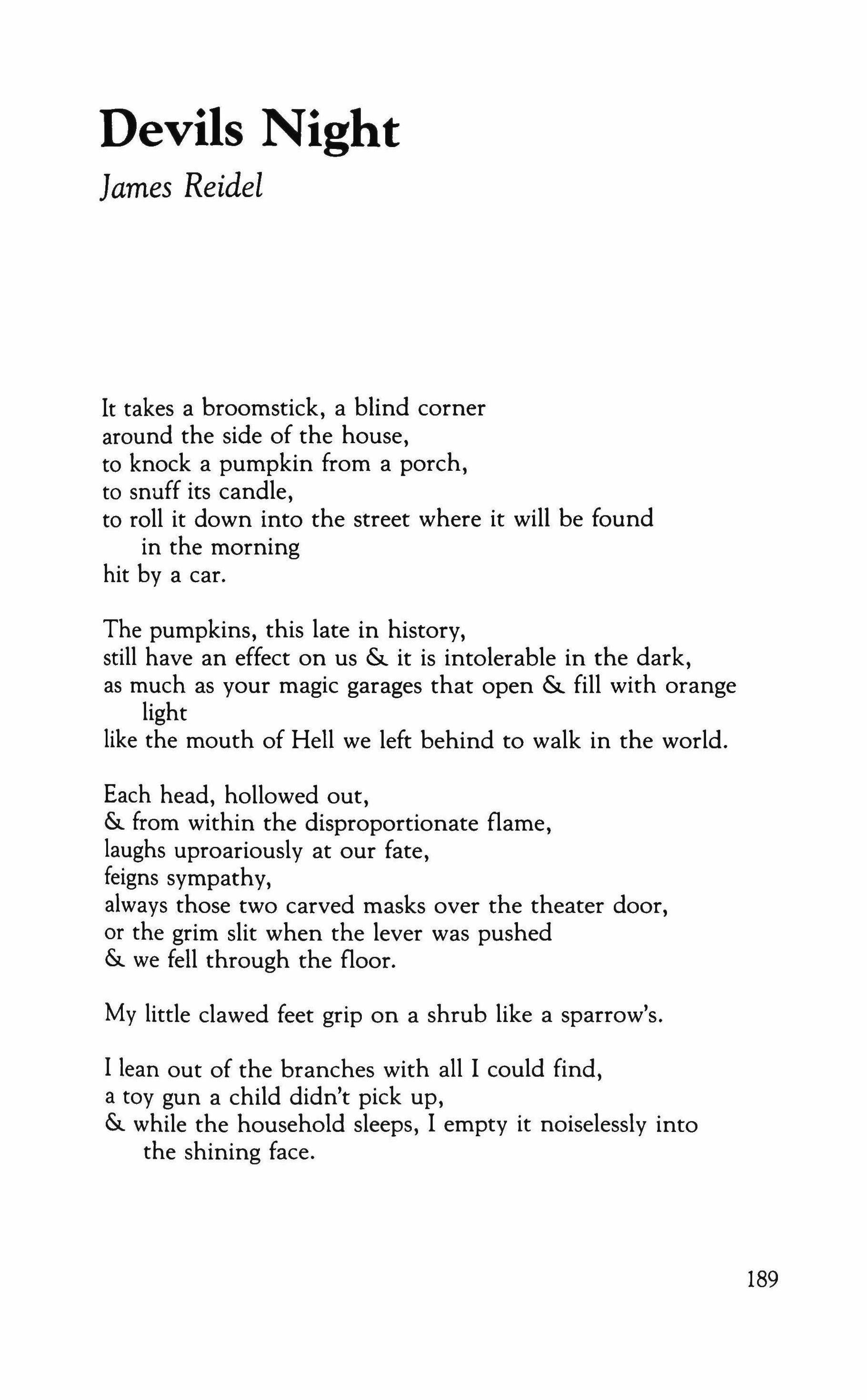
It takes a broomstick, a blind corner around the side of the house, to knock a pumpkin from a porch, to snuff its candle, to roll it down into the street where it will be found in the morning hit by a car.
The pumpkins, this late in history, still have an effect on us & it is intolerable in the dark, as much as your magic garages that open & fill with orange light like the mouth of Hell we left behind to walk in the world.
Each head, hollowed out, & from within the disproportionate flame, laughs uproariously at our fate, feigns sympathy, always those two carved masks over the theater door, or the grim slit when the lever was pushed & we fell through the floor.
My little clawed feet grip on a shrub like a sparrow's.
I lean out of the branches with all I could find, a toy gun a child didn't pick up, & while the household sleeps, I empty it noiselessly into the shining face.
189
Bye Bye Blackbird
Mary Kinzie

I am making a dentist appointment by phone-what more ideal instance of the banal into which to be Regularly drawn however artful one's regimen? Someone says hold but before I reply the earpiece Pours out a ripple, a welter of notes from the mid-Ocean of recorded music in the Central Bureau of Hold. A chorus
Sighs forth the melody to the same romantic tune, once poignant, now brutal and ironic beneath their Jaunty clapping and insincere tremolo. This swooning mimicry of lovesickness is performed by a multitude Of voices clear, yet general, not quite imperfect enough to be human.
The seconds of waiting tap tap, Tap tap, until I am no longer conscious of waiting, I am warming to the oily average sound of the notes as they Bubble along. It is a singing not made by voices but by what? Nothing animate-impulses in tubes, rays Traversing a rainbow of gases beautiful in their sublimation, but pernicious, even
Such concepts as an Auditory Ether naively quaint, with a crepuscular naivete. The song itself, its Frail stem of feeling, dies in the mouth of this choir (I do not believe they can hang their heads and cry): Real yearning is needed to make the simple true; did even self-pity (I wondered) touch This cavalcade of dark-trousered and white-bloused and blade-boned and cadet-groomed men And women packed together in the disappearing'
190

chevron formation of Infinite Regress? - why else Fan their shoulders like petals in the same rehearsal of artifice, their mouths identically
Void black discs?
"Make my bed and light the light," they hum with a little Warbled shudder that echoes along the line, then with perfect irrelevance babble the finale
To another song that seems just like it, the way they do it, "All I longed for, long ago, was you." Yet the look Fixed above their lips says they never longed for anything but their own kingdom where Fathomless eyes brim around drilled points of white like the eyes of a moray eel.
Days later, the sound of the mean little dog across the way begins to fray into the moaning Of a train, a siren from the highway, the distant modern warlike sound of absconding jet aircraft. Soon The little dog seems not to have barked at all, not for weeks, one had meanwhile heard only the carefully Struck templates and dampened chorus of turbines that mimicked the breath of life.
The legion of voices
And the spectral little dog were both proofs the world was porous, just failing of the third dimension, Thinning out at the edge into an atmosphere in which there was never enough human spirit to go Round, never enough evolved matter to fill the first weak apertures. Not even clearing weather Brought much comfort, with its change in scale. Clouds at the end of the white street toward dusk Bent forward from the waist where a buckle gleamed a threatening gunmetal-orange that worked open Till the courtesy wisped off, exposing a translucent cartouche of howling. For unlike the dismissal Of a summer storm, in winter here a clearing sky presaged something much worse:
191

From it the truth, super-heavy, Began to spill. There flew the silver airliners like crystalline insects whirring against their pins
Ejected, growing tinier, then disappearing. In their place, gravity dragged down the truth and kissed it
Roughly like lost family in whose embrace the cold dropped, planets shone cruelly, and winds inexorably
Drove, for in this place, under this sign, the sign of the Meager Surface, one was always alone with the bolt, Hard machinery of atom and ice to which, down the alleyway, a second-story window
Sent out all night its chink of illusory fire.
192
A&P Nightshift: January 1959
Paul Mariani for Phil Levine

The Johns Hopkins University, he let me know as I staggered half dizzy from lifting cases of Campbell's Soup cans by the hour from off the highstrung metal roller rising from the cellar to greet him as my father'd taught me to shake the hand of any man who held
his hand out, his tugger's grip hard enough to granulate my knuckles, lips curled up beneath that steady starblue gaze. A world of slave and master in the voice & carriage, something the Third, the face done a hundred times by Rockwell: blond & tanned, pure poster propaganda art. I'd have given a week's pay to bring a wrench down on that sullen head, if I thought I might live to tell the story.
Those long weekday nights at a buck ten an hour at the Garden City
193
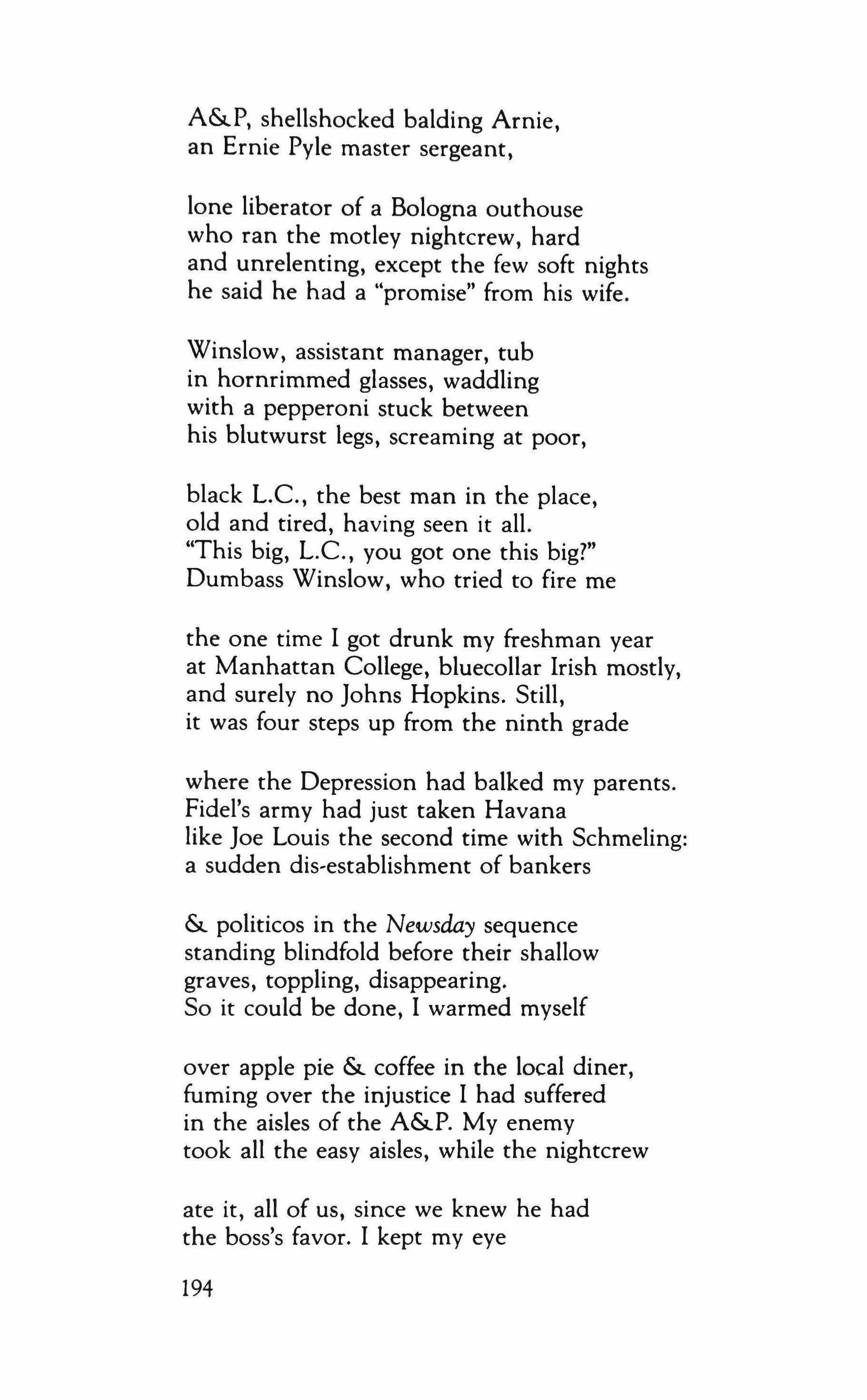
A&P, shellshocked balding Arnie, an Ernie Pyle master sergeant,
lone liberator of a Bologna outhouse who ran the motley nightcrew, hard and unrelenting, except the few soft nights he said he had a "promise" from his wife.
Winslow, assistant manager, tub in hornrimmed glasses, waddling with a pepperoni stuck between his blutwurst legs, screaming at poor,
black L.C., the best man in the place, old and tired, having seen it all.
"This big, L.C., you got one this big?" Dumbass Winslow, who tried to fire me
the one time I got drunk my freshman year at Manhattan College, bluecollar Irish mostly, and surely no Johns Hopkins. Still, it was four steps up from the ninth grade
where the Depression had balked my parents. Fidel's army had just taken Havana like Joe Louis the second time with Schmeling: a sudden dis-establishment of bankers
& politicos in the Newsday sequence standing blindfold before their shallow graves, toppling, disappearing. So it could be done, I warmed myself
over apple pie & coffee in the local diner, fuming over the injustice I had suffered in the aisles of the A&P. My enemy took all the easy aisles, while the nightcrew
ate it, all of us, since we knew he had the boss's favor. I kept my eye
194
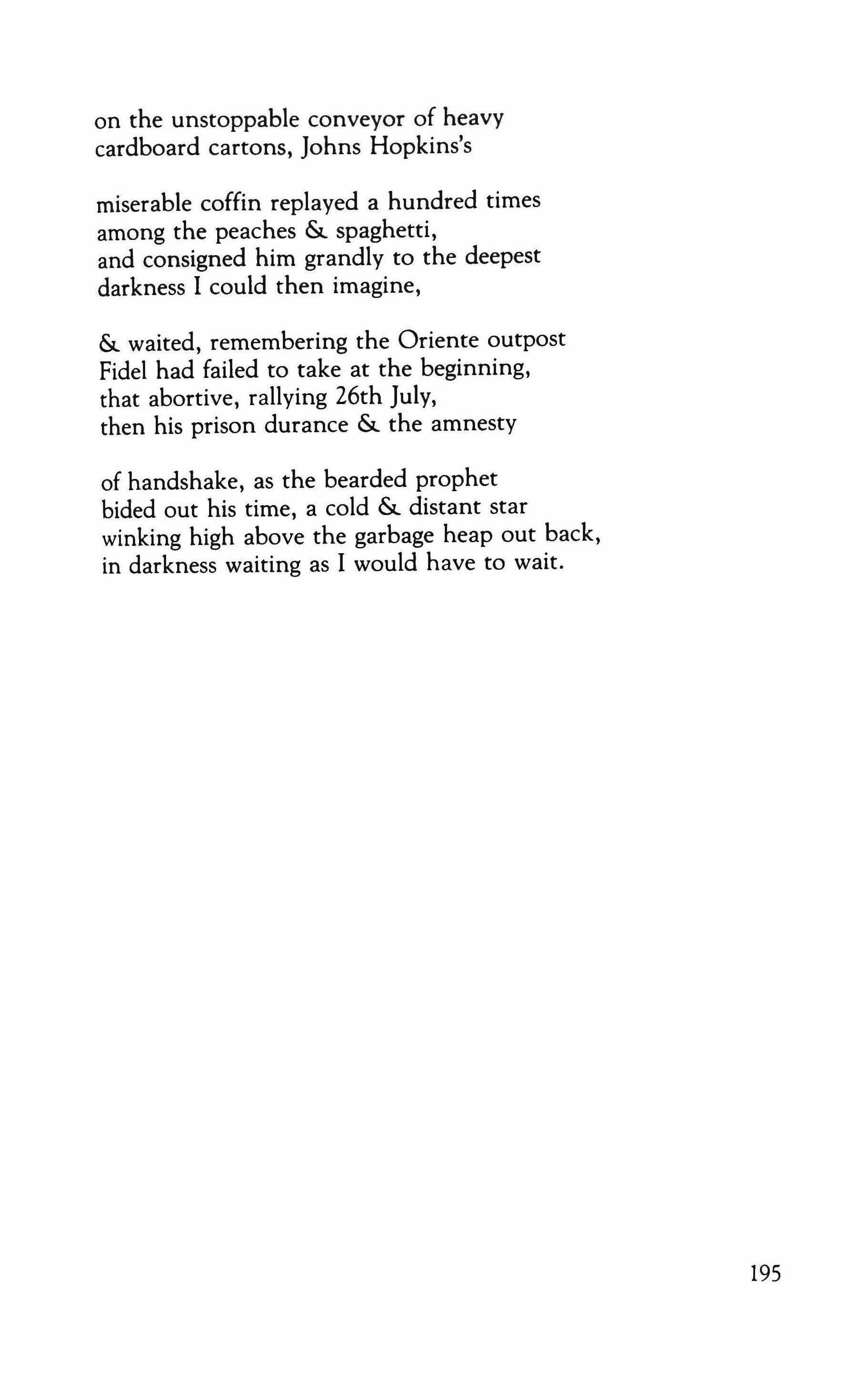
on the unstoppable conveyor of heavy cardboard cartons, Johns Hopkins's miserable coffin replayed a hundred times among the peaches & spaghetti, and consigned him grandly to the deepest darkness I could then imagine, & waited, remembering the Oriente outpost Fidel had failed to take at the beginning, that abortive, rallying 26th July, then his prison durance & the amnesty of handshake, as the bearded prophet bided out his time, a cold & distant star winking high above the garbage heap out back, in darkness waiting as I would have to wait.
195
From Donner
Belle Randall
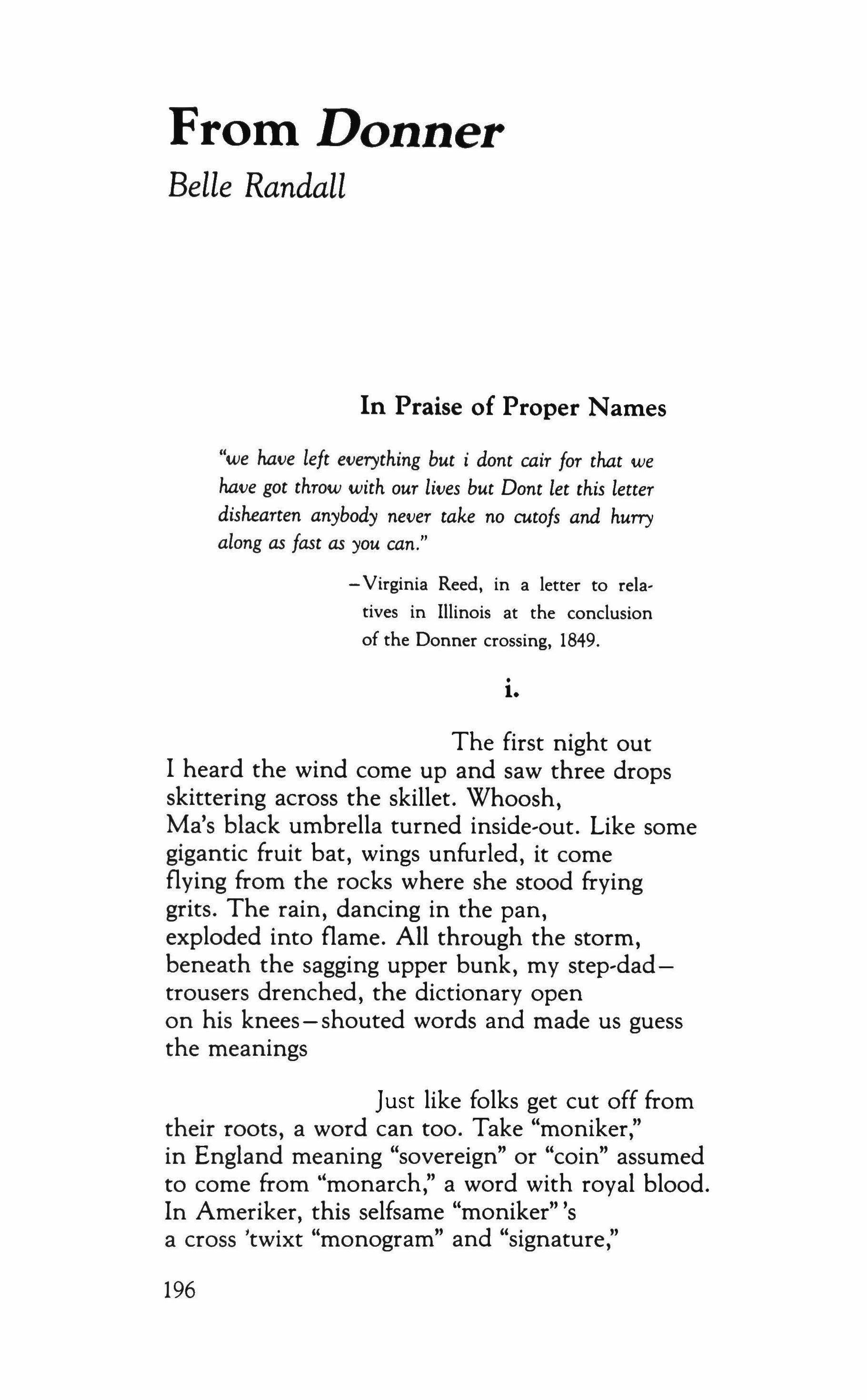
In Praise of Proper Names
"we have left everything but i dont cair for that we have got throw with our lives but Dont let this letter dishearten anybody never take no cutofs and hurry along as fast as you can."
- Virginia Reed, in a letter to relatives in Illinois at the conclusion of the Donner crossing, 1849.
The first night out I heard the wind come up and saw three drops skittering across the skillet. Whoosh, Ma's black umbrella turned inside-out. Like some gigantic fruit bat, wings unfurled, it come flying from the rocks where she stood frying grits. The rain, dancing in the pan, exploded into flame. All through the storm, beneath the sagging upper bunk, my step-dadtrousers drenched, the dictionary open on his knees - shouted words and made us guess the meanings
Just like folks get cut off from their roots, a word can too. Take "moniker," in England meaning "sovereign" or "coin" assumed to come from "monarch," a word with royal blood. In Ameriker, this selfsame "moniker" 's a cross 'twixt "monogram" and "signature,"
i,
196

and isn't that like us, the Reeds, you kids, trampoosing 'cross a continent, once noblemen, twice immigrants, now vagabonds?
We weren't prezactly "Reeds." He weren't my Real Pa, and 1 was slow at twelve to take his name.
H.
A moniker defined in our John Bee: "The mark a tramp leaves on a water tower; hence, in slang, nickname, name."
We named ourselves the Donner Party and left our mark on tanks and towers until they thinned to prairies and pure sky. I'd waved my childhood friend goodbye, a girl whose name 1 coveted. Oh my how 1 wished that moniker were mine. Just to say it to herself and write it in secret in the shadow of her arm transformed a person to a heroine. By what stroke of genius Mr. and Mrs. West named their only girl America, 1 never knew.
America West, When our wooden sidewalks met in Sacramento three years laterBut 1 roam; We'll get to Sacramento in due time.
iii.
Having most, we Reeds had most to losefireworks in the Rockies on the Fourth, pickles, ham and fine Wiessboden wine carried in our trunks a thousand miles. Our wagon, twice as big as any other,
197
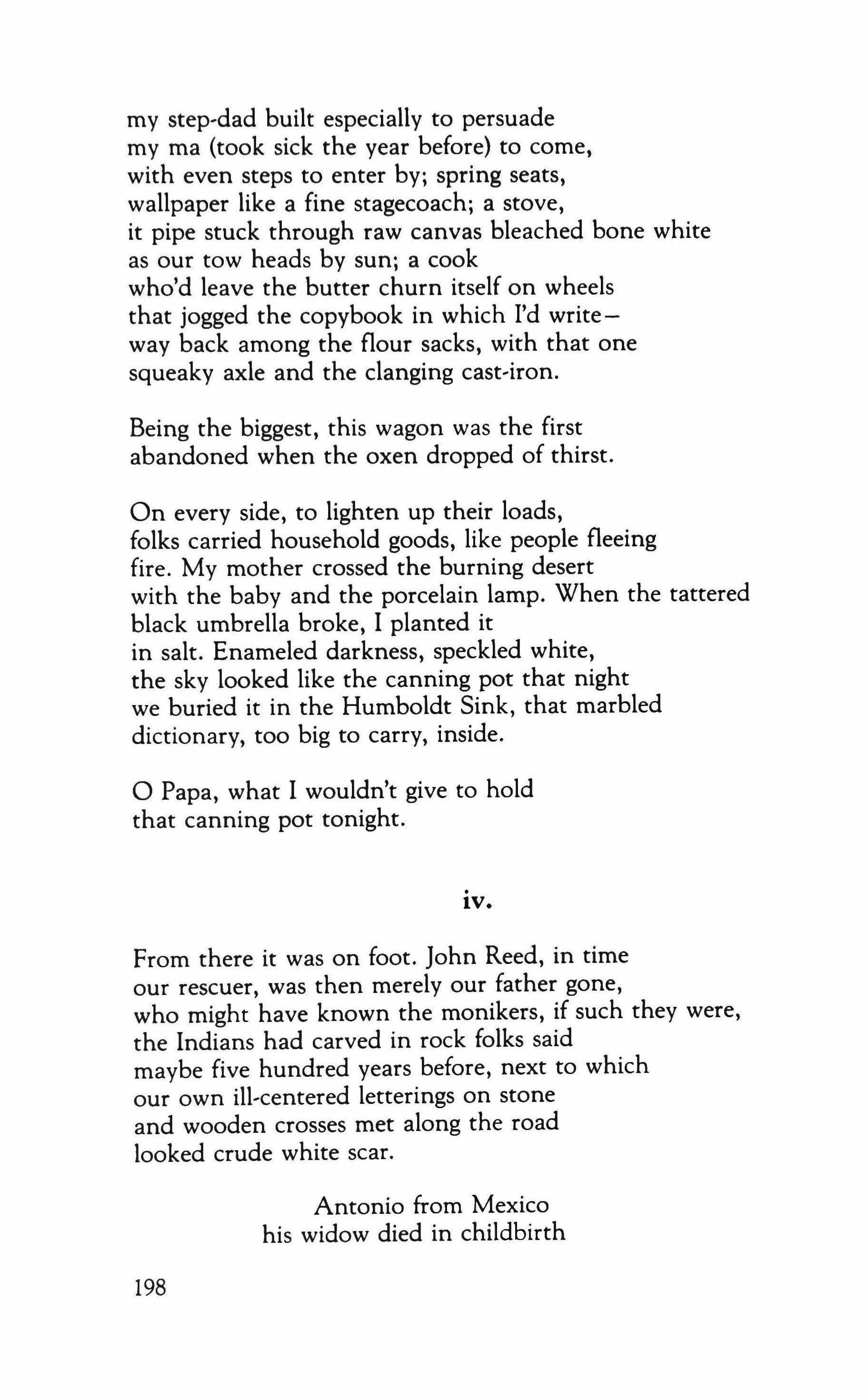
my step-dad built especially to persuade my rna (took sick the year before) to come, with even steps to enter by; spring seats, wallpaper like a fine stagecoach; a stove, it pipe stuck through raw canvas bleached bone white as our tow heads by sun; a cook who'd leave the butter churn itself on wheels that jogged the copybook in which I'd writeway back among the flour sacks, with that one squeaky axle and the clanging cast-iron.
Being the biggest, this wagon was the first abandoned when the oxen dropped of thirst.
On every side, to lighten up their loads, folks carried household goods, like people fleeing fire. My mother crossed the burning desert with the baby and the porcelain lamp. When the tattered black umbrella broke, I planted it in salt. Enameled darkness, speckled white, the sky looked like the canning pot that night we buried it in the Humboldt Sink, that marbled dictionary, too big to carry, inside.
o Papa, what I wouldn't give to hold that canning pot tonight.
iv.
From there it was on foot. John Reed, in time our rescuer, was then merely our father gone, who might have known the monikers, if such they were, the Indians had carved in rock folks said maybe five hundred years before, next to which our own ill-centered letterings on stone and wooden crosses met along the road looked crude white scar.
Antonio from Mexico his widow died in childbirth
198
two days apart: the twins she bore of cholera; of cholera
Royall, Tyler and Clementina Tubbs, her children by a former marriage.
After a time, the graves was marked no more, and I'd be thinking: they all done it, all these nameless ones. Even dogs have done it. Guess I can do it too, time comes. I guess instead of doing, I'll be done for, done-
fear clanging in my heart its awful knell, though all the air for miles around was still.
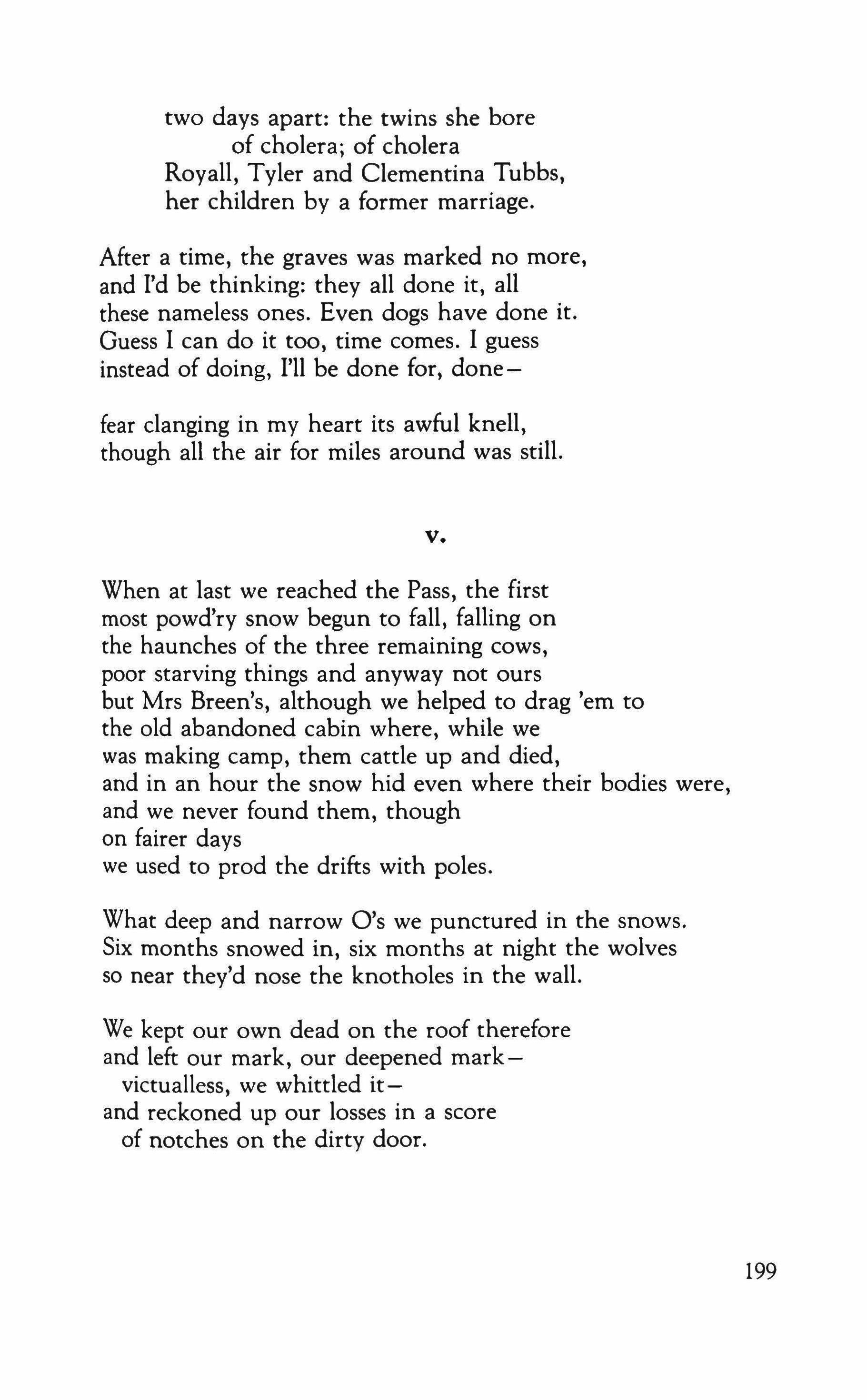
When at last we reached the Pass, the first most powd'ry snow begun to fall, falling on the haunches of the three remaining cows, poor starving things and anyway not ours but Mrs Breen's, although we helped to drag 'em to the old abandoned cabin where, while we was making camp, them cattle up and died, and in an hour the snow hid even where their bodies were, and we never found them, though on fairer days we used to prod the drifts with poles.
What deep and narrow O's we punctured in the snows.
Six months snowed in, six months at night the wolves so near they'd nose the knotholes in the wall.
We kept our own dead on the roof therefore and left our mark, our deepened markvictualless, we whittled itand reckoned up our losses in a score of notches on the dirty door.
v.
199

They call that pass the Donner Pass for afterward they named it after us. As for the girl whose name I coveted, when our wooden sidewalks crossed in Sacramento three years later, she no longer had the name, having given it away in marriage to a boy who played mouth harp and walked beside their wagon. And since she swapped her moniker for his harmonica, think I'll claim it for my own:
My name is America West. Like everyone else I endured when I had no choice and afterwards took pride in it.
When you reach the Promised Land you find most everyone is immigrants. We're all from somewhere else here, just like you. Even the Indians are wanderers. We're scattered freckles on a scrawny arm. We're tumbleweed, we got no roots nor common story. Please, as if it were that coin called "moniker," accept this poem as tribute to your own hard times come across.
vi.
200
Two Poems
Adrienne Rich

The Slides
Three dozen squares of light,inflicted glass lie in a quarter-century's dust under the skylight. I can show you this: also a sprung couch spewing dessicated mouse-havens, a revolving bookstand rusted on its pivot, leaning with books of an era: Roosevelt vs Recovery The Mystery & Lure of Perfume My Brother Was Mozart I've had this attic in mind for years
Now you who keep a lookout for places like this, make your living off things like this: You see, the books are rotting, sunbleached, unfashionable the furniture neglected past waste but the lantern-slides - their story could be sold, they could be a prize I want to see your face when you start to sort them. You want cloched hats of the thirties, engagement portraits with marcelled hair, maillots daring the waves, my family album:
This is the razing of the spinal cord by the polio virus this, the lung-tissue kissed by the tubercle bacillus this with the hooked shape is the cell that leaks anemia to the next generation Enlarged on a screen they won't be quaint; they go on working; they still kill.
201

It's June and summer's height the longest bridge of light leaps from all the rivets of the sky
Yet it's of earth and nowhere else I have to speak Only on earth has this light taken on these swiveled meanings, only on this earth where we are dying befouled, gritting our teeth losing our guiding stars
found an alphabet has this light a mouth
6/21
202
I. C. U.
Robert A. Fink

How like the game you used to playPeek,A,Boo, I See You. Always: your daddy not quite fitting behind the kitchen door. Always: in the living room, he chose the slat-backed rocker to crouch behind obvious as the heart between the ribs. And when he looked for you, wondering for hours what secret place you'd found, he never heard your giggles from the wicker clothes hamper until you popped up like the weasel, surprising him again.
Halloween, everybody on your street knew he was the clown waiting just beyond the front-porch light for you and your gang of Creatures From The Black Lagoon to scare the living daylights out of neighbors innocently opening their doors. You told him everyone could see he was too big for candy, the lipstick-painted smile, the talcum powder on each cheek not disguise enough to fool anybody.
So finally, after all these years, he finds the perfect place to hide: a room of deep-sea-diver tubes, transparent fluids dripping from plastic bags slowly closing like a lung, machines strewn about like boulders in shallow water.
203

Each one hums a childhood tune you almost recall. Each dial points in a different direction. This time you are on your own, no clues to where, oh where, your father has gone.
204
Three Poems
Josephine Jacobsen
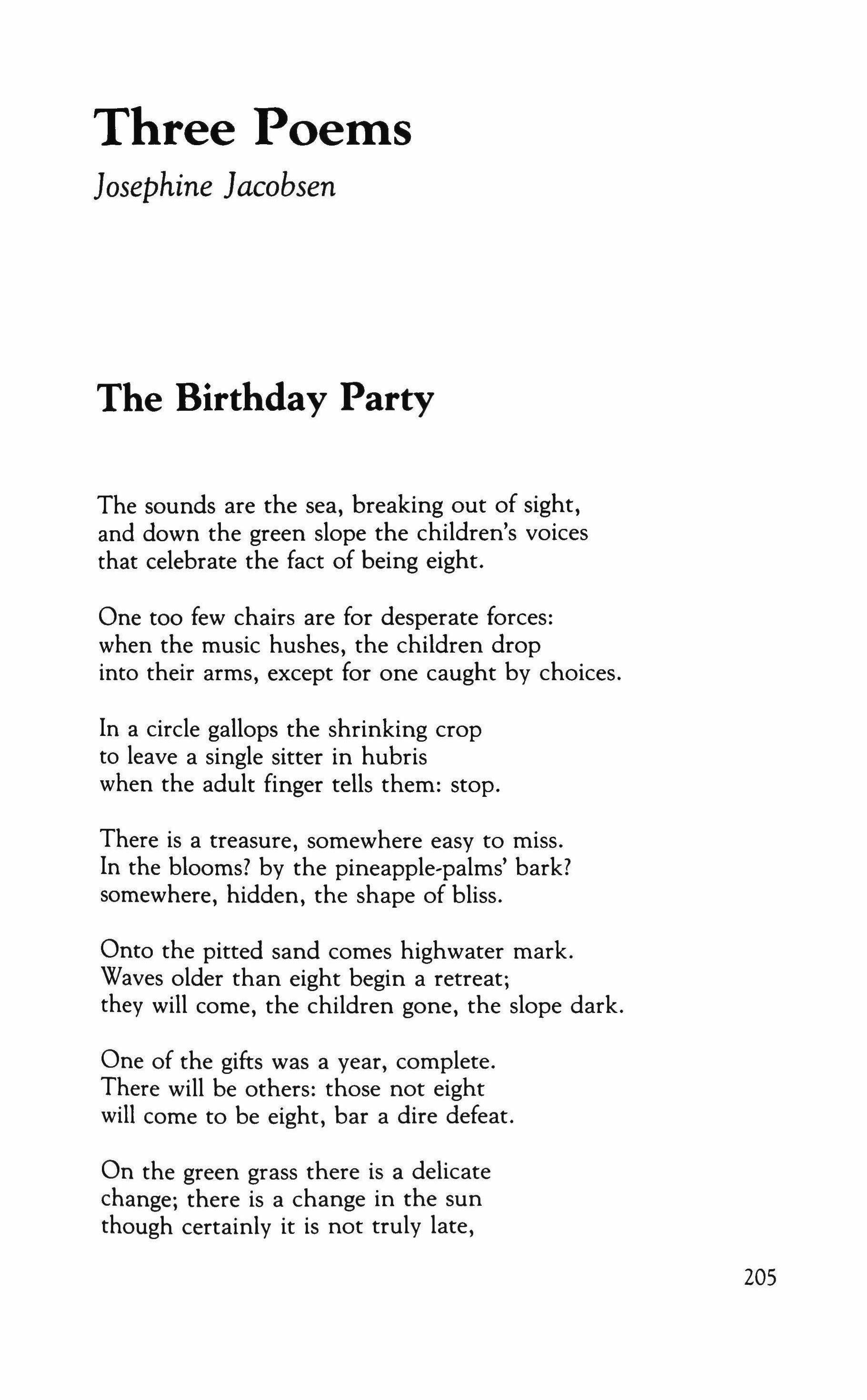
The Birthday Party
The sounds are the sea, breaking out of sight, and down the green slope the children's voices that celebrate the fact of being eight.
One too few chairs are for desperate forces: when the music hushes, the children drop into their arms, except for one caught by choices.
In a circle gallops the shrinking crop to leave a single sitter in hubris when the adult finger tells them: stop.
There is a treasure, somewhere easy to miss. In the blooms? by the pineapple-palms' bark? somewhere, hidden, the shape of bliss.
Onto the pitted sand comes highwater mark. Waves older than eight begin a retreat; they will come, the children gone, the slope dark.
One of the gifts was a year, complete. There will be others: those not eight will come to be eight, bar a dire defeat.
On the green grass there is a delicate change; there is a change in the sun though certainly it is not truly late,
205

and still caught up in the scary fun, like a muddle of flowers blown around. For treasure, for triumph, the children run and the wind carries the steady pound, and salty weight that falls, and dies, and falls. The wind carries the sound of the children's light high clear cries.
206
The Dogs
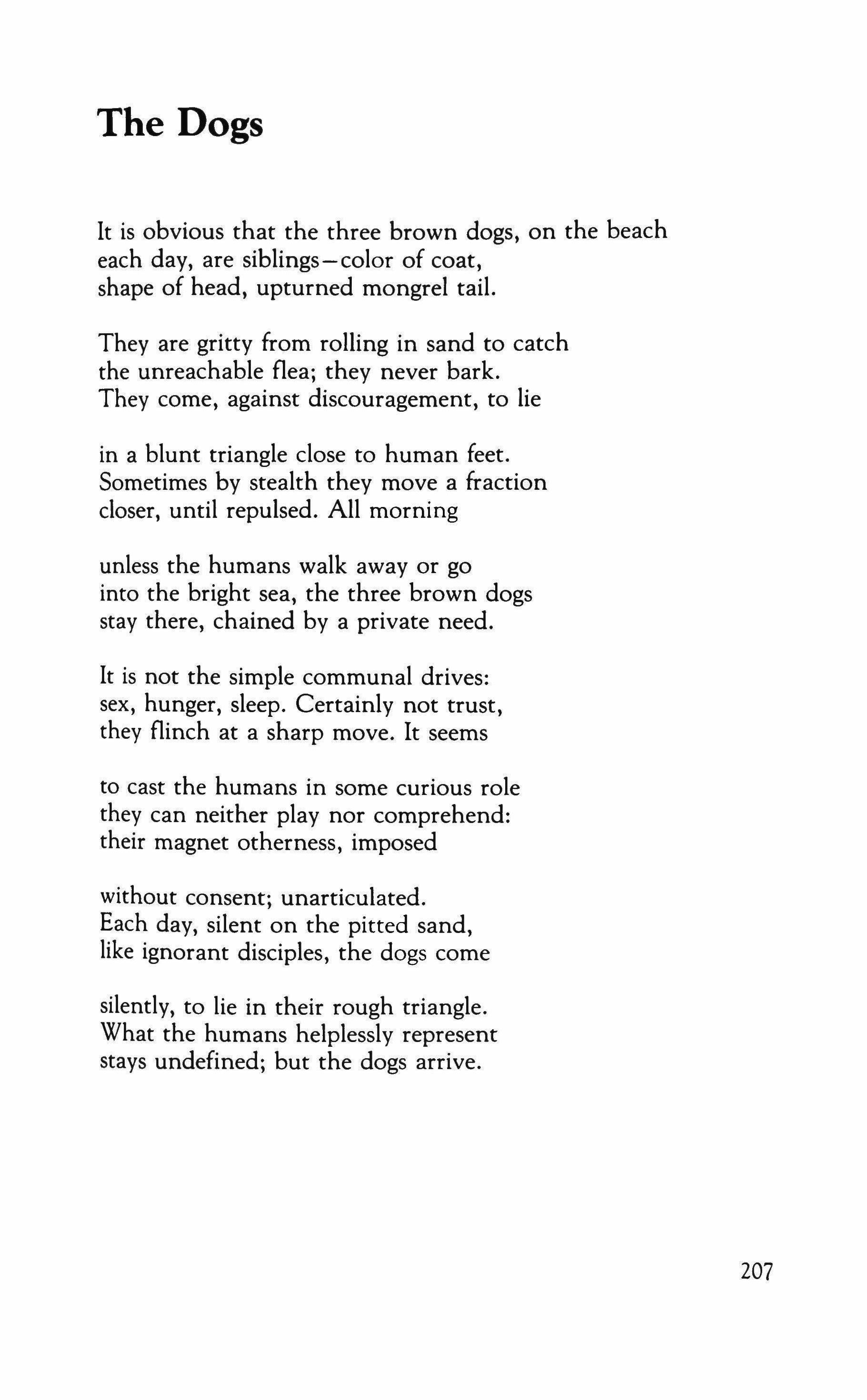
It is obvious that the three brown dogs, on the beach each day, are siblings-color of coat, shape of head, upturned mongrel tail.
They are gritty from rolling in sand to catch the unreachable flea; they never bark. They come, against discouragement, to lie in a blunt triangle close to human feet. Sometimes by stealth they move a fraction closer, until repulsed. All morning unless the humans walk away or go into the bright sea, the three brown dogs stay there, chained by a private need.
It is not the simple communal drives: sex, hunger, sleep. Certainly not trust, they flinch at a sharp move. It seems
to cast the humans in some curious role they can neither play nor comprehend: their magnet otherness, imposed without consent; unarticulated. Each day, silent on the pitted sand, like ignorant disciples, the dogs come silently, to lie in their rough triangle. What the humans helplessly represent stays undefined; but the dogs arrive.
207
Loss of Sounds
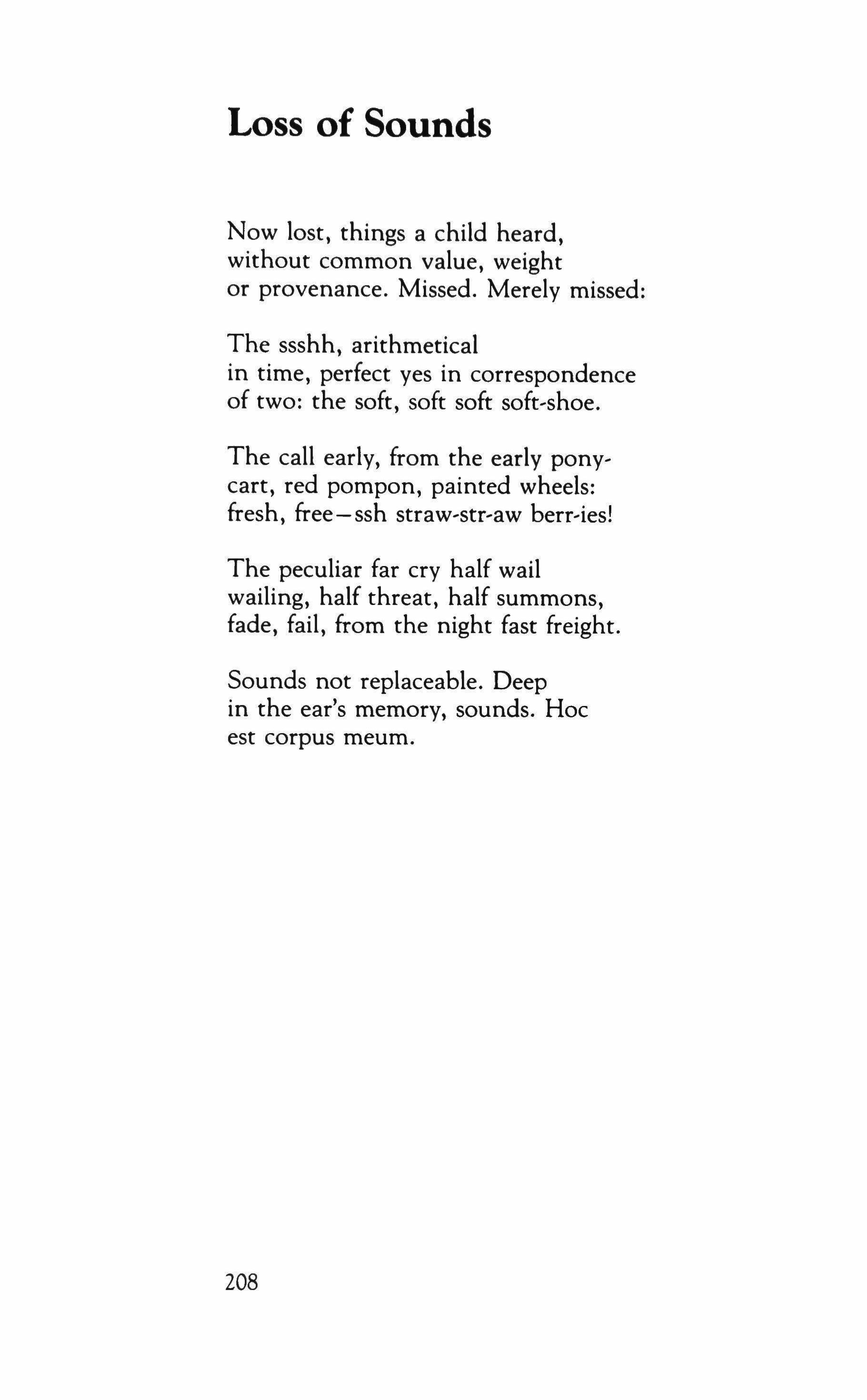
Now lost, things a child heard, without common value, weight or provenance. Missed. Merely missed:
The ssshh, arithmetical in time, perfect yes in correspondence of two: the soft, soft soft soft-shoe.
The call early, from the early pony, cart, red pompon, painted wheels: fresh, free-ssh straw-str-aw berr-ies!
The peculiar far cry half wail wailing, half threat, half summons, fade, fail, from the night fast freight.
Sounds not replaceable. Deep in the ear's memory, sounds. Hoc est corpus meum.
208
Two Poems
Eleanor Wilner

It's Not Cold Here
for Bob
Somewhere the flags are frozen in the bitter wind and cannot flap, the brittle trees stand outlined in the ice, black relics in glass cases, backlit by the sickly light of a fitful sun; somewhere the drifts of snow are studded with those who didn't make it home, who died embedded in the white where they sought cover; somewhere, water falling slow over the stone rift in the mountain, froze solid and hangs in air like some perfected dogma
but it's not cold here although outside it's winterthis place we never chose, but only found, as luck would have it, as mountain streams, impetuous and cold, flow down but with no way of knowing how slow they'd grow and brown on broad alluvial plains. Too much is made of choice: we merely came the way we could being what we were, and we were changed by the terrain we came by. Nor could we see around a single bend until we'd turned it. And it was wind
209

and not a course we'd charted that brought us to a pebbled shore whose stones the sea had shaped and polished, and gave us food we'd never tasted. Of this, we had no premonition nor even, quite, desire; though one may dream of fire when lost in ice, the temperate zones are never those we dream of, the mind proceeding by extremes, desire by contrast.
And now it's hard to say just where we are except it isn't cold here the light is often amber we can't remember the sting of wind-whipped snow against the eyes nor the stop-frame of the ice. Here we are happy, forgetful of the cold - as well-fed children, dragging sleds, see every snowbound hill as heaven, made just to climb for the pure abandoned joy of sliding down.
210
Conversation with a Japanese Student

That lovely climbing vine, so fresh at dawn, so shy at noon, whose blue countenance we call Morning Glory, you call it asakao, Morning Face. "What is this glory?" you ask, child of akarui,* even the memory of war effaced. "What is it all for?"
Here is an artist working, his brush is history's tongue, his canvas allegorical and large, the landscape must be ample for his themethe turn of epic tides, pulled in the wake of a dream. Glory, unlike her homely twin, Mortality, casts no shadow, never rests ("A beautiful and charming Female floating Westward through the air, bearing on her forehead the Star of Empire"). There,
notice that Glory is artfully draped in a tunic of pale silk in the Classical style her limbs as plump and supple as oil paint and appetite can make them, the lift of her head - proud, a summons and a dare, one delicious arm carries a bright banner streaming in the air its design illegibly wrought with large suggestions. But of Glory you can be sure because an army marches in her train
*Akarui is a compound word meaning "clear" and "bright." Generally used to refer to a fine day, its extended meaning denotes the bright time of peace and prosperity in Japan since the 1960's.
* * *
211

almost a shadow, darkening the land. At times, a peasant woman raising her gaunt baby in a trite appeal may momentarily block the light, obscure Glory, put a little in the shade all that golden beauty the toss of whose curls is worth a thousand ships, a million villages, the world
for even a glimpse, the faintest rustle of the hem of Beatrice's skirt as it disappears around the corner of those gates of pearl to the eternal harbor, the flutter of doves in the white thighs of Helen, desire in its perfected form. The mirror of art becomes a burning glass in the light of absolute desire, the brush a flame about to be consumed, for he has reached the limits, here, of art - as Michelangelo one night when he was old, in his rage at the stubborn stone's refusal to yield to his conception, attacked his last Pieta with his chisel trying to tear the pattern from the matter, Christ from the arms of his grieving mother; his servant was forced to subdue the master in order to save the work.
This time, no servant soul to intervene and fire at the core, the center split - as if mankind, with its cold forever mind, trapped in its furious, failing heart had torn the Pieta apart from within-gone the mother, a cloud of glowing dust, gone the son, dissolved in the monstrous cloud, heaven's fungus growing on the axis of the world casting its white shadow on the hills
212

pitiless as any parasite whose life depends on what it slowly kills.
No brush can paint a light so pure only the blind can see white hot it whites out everything but what is not the sun's high noon, but brighter "ex Occidente, lex; ex Oriente, lux" out of the West, law; out of the East, light.
At Nagasaki in the Peace Park near the epicenter of the blast there is a glade so dense with foliage, bushes, asakao and pine, you'd almost miss the sign, hand-drawn, the only one in English that I saw:
THEY SAID NOTHING WOULD GROW HERE FOR 75 YEARS
And though the language was my own I found it difficult to read through such a thick exquisite screen of evergreen and tears.
* * *
213
Two Poems
Ingeborg Bachmann
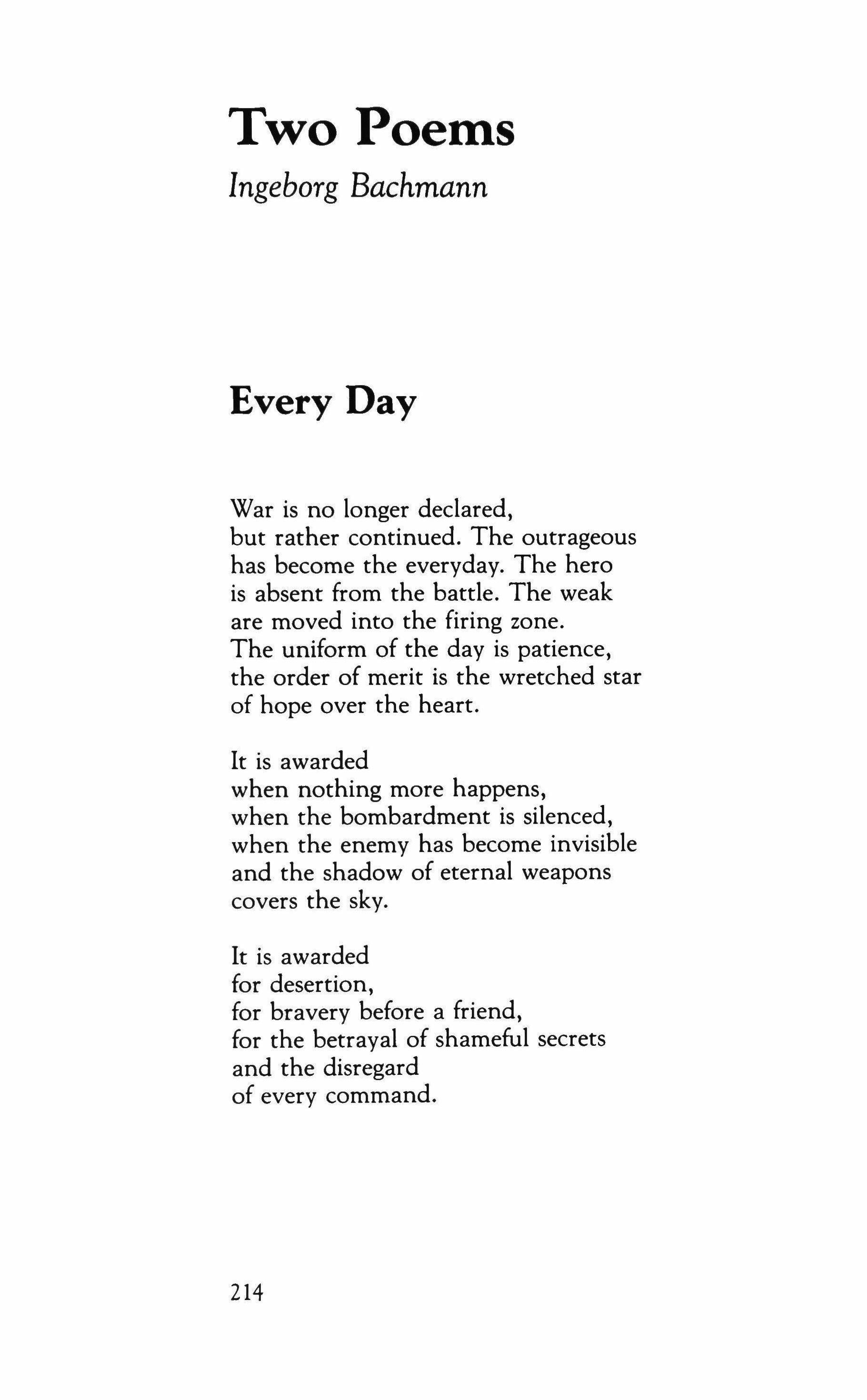
Every Day
War is no longer declared, but rather continued. The outrageous has become the everyday. The hero is absent from the battle. The weak are moved into the firing zone. The uniform of the day is patience, the order of merit is the wretched star of hope over the heart.
It is awarded when nothing more happens, when the bombardment is silenced, when the enemy has become invisible and the shadow of eternal weapons covers the sky.
It is awarded for desertion, for bravery before a friend, for the betrayal of shameful secrets and the disregard of every command.
214
No Delicacies

Nothing pleases me anymore.
Should I construct a metaphor with an almond blossom? crucify the syntax upon a light effect? Who will rack their brains over such superfluous things-
I have learned an insight with words, which exist (for the lowest class)
Hunger Shame Tears and Darkness.
With unpurged tears, with despair (and I still despair in the face of despair) about so much misery, the many sick, the cost of living, I will get by.
I don't neglect writing, but rather myself. The others are able God knows to get by with words. I am not my assistant.
Should I arrest an idea, lead it off
215

to a bright sentence cell? feed sight and hearing with first-rate word bits? analyze the libido of a vowel, estimate the auction price of our consonants?
Must I with a battered head, with the writing cramp in this hand, under the pressure of the three hundredth night rip up the paper, sweep away the contrived word operas, annihilating as well: I you and he she it
we you all?
(Should? Let the others do it.)
My part, it shall be lost.
Translated from the German by Peter Filkins
216
Antigone
Czeslaw Milosz
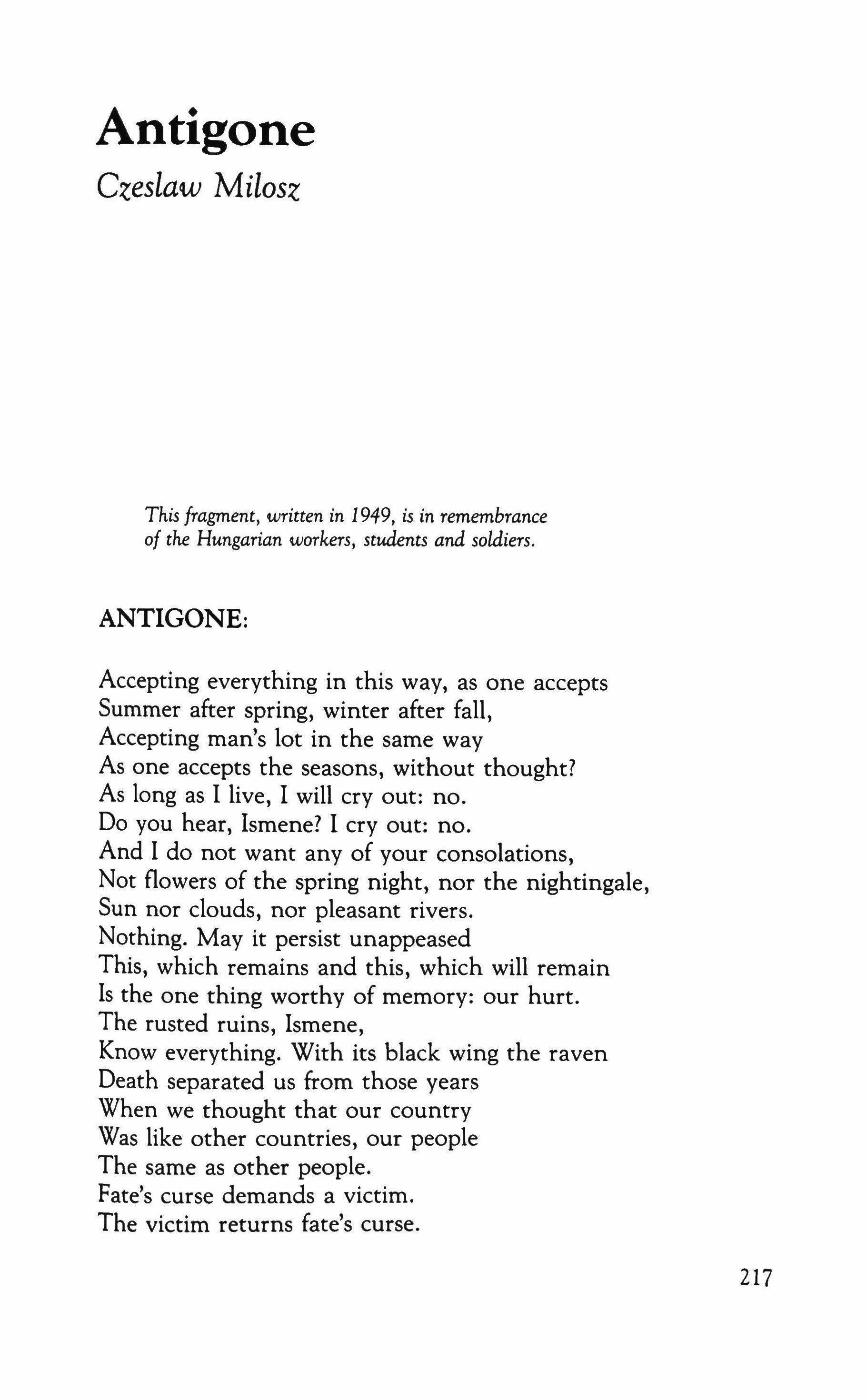
This fragment, written in 1949, is in remembrance of the Hungarian workers, students and soldiers.
ANTIGONE:
Accepting everything in this way, as one accepts Summer after spring, winter after fall, Accepting man's lot in the same way
As one accepts the seasons, without thought? As long as I live, I will cry out: no.
Do you hear, Ismene? I cry out: no.
And I do not want any of your consolations, Not flowers of the spring night, nor the nightingale, Sun nor clouds, nor pleasant rivers.
Nothing. May it persist unappeased
This, which remains and this, which will remain Is the one thing worthy of memory: our hurt.
The rusted ruins, Ismene, Know everything. With its black wing the raven Death separated us from those years
When we thought that our country Was like other countries, our people
The same as other people.
Fate's curse demands a victim.
The victim returns fate's curse.
217
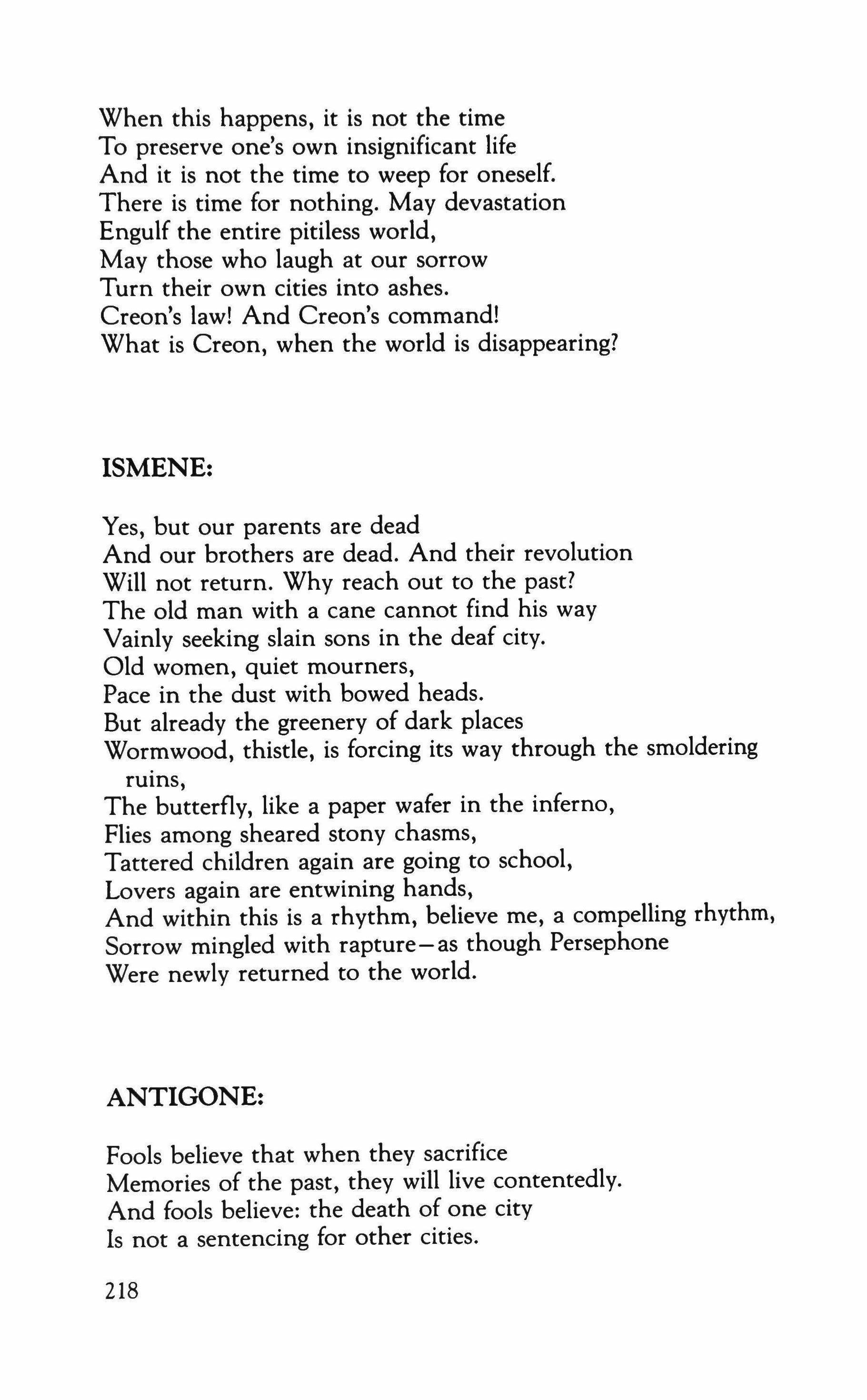
When this happens, it is not the time To preserve one's own insignificant life And it is not the time to weep for oneself. There is time for nothing. May devastation Engulf the entire pitiless world, May those who laugh at our sorrow Turn their own cities into ashes. Creon's law! And Creon's command! What is Creon, when the world is disappearing?
ISMENE:
Yes, but our parents are dead And our brothers are dead. And their revolution Will not return. Why reach out to the past? The old man with a cane cannot find his way Vainly seeking slain sons in the deaf city.
Old women, quiet mourners, Pace in the dust with bowed heads. But already the greenery of dark places Wormwood, thistle, is forcing its way through the smoldering ruins, The butterfly, like a paper wafer in the inferno, Flies among sheared stony chasms, Tattered children again are going to school, Lovers again are entwining hands, And within this is a rhythm, believe me, a compelling rhythm, Sorrow mingled with rapture-as though Persephone Were newly returned to the world.
ANTIGONE:
Fools believe that when they sacrifice Memories of the past, they will live contentedly. And fools believe: the death of one city Is not a sentencing for other cities.
218
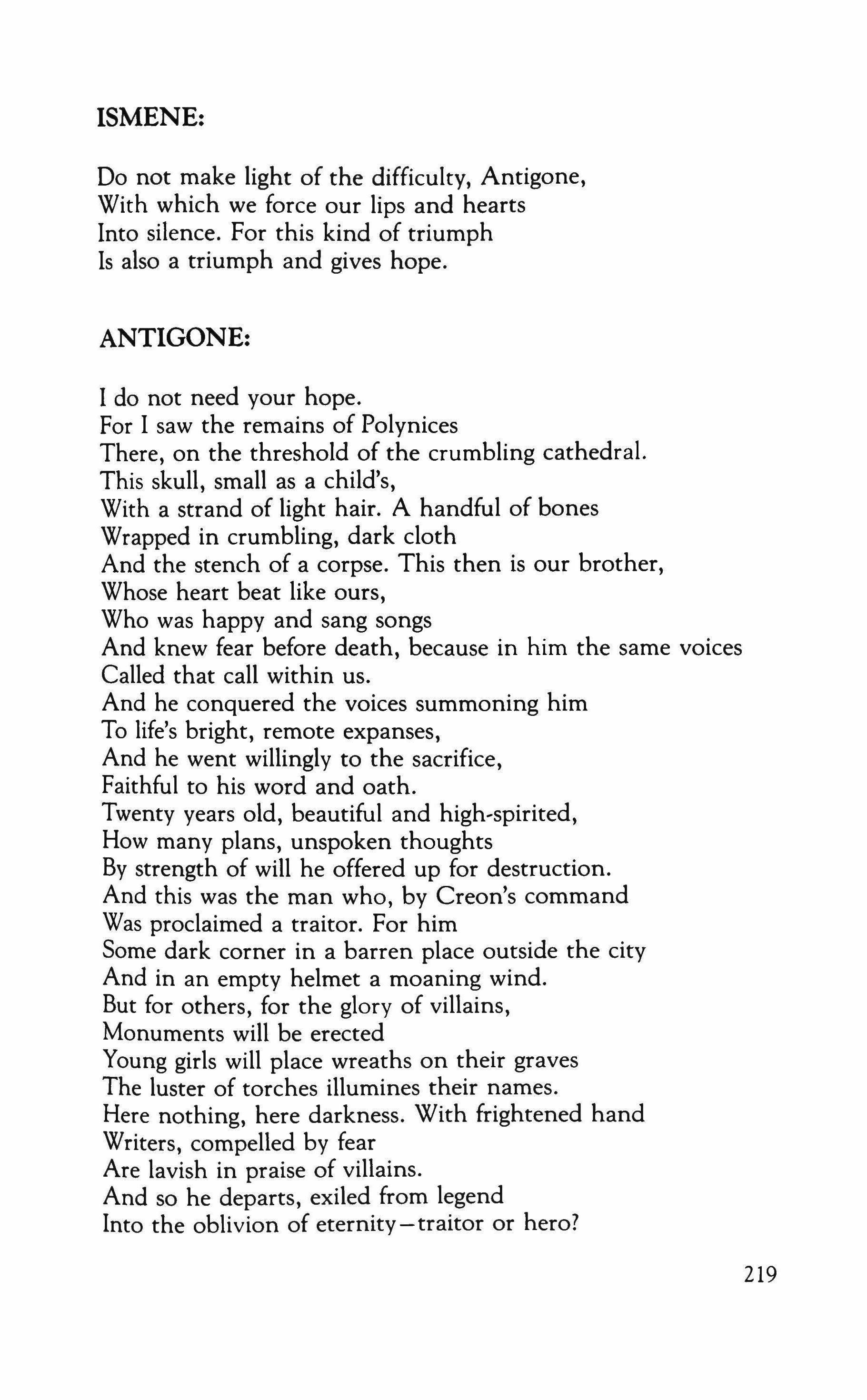
ISMENE:
Do not make light of the difficulty, Antigone, With which we force our lips and hearts Into silence. For this kind of triumph Is also a triumph and gives hope.
ANTIGONE:
I do not need your hope. For I saw the remains of Polynices There, on the threshold of the crumbling cathedral. This skull, small as a child's, With a strand of light hair. A handful of bones Wrapped in crumbling, dark cloth
And the stench of a corpse. This then is our brother, Whose heart beat like ours, Who was happy and sang songs And knew fear before death, because in him the same voices Called that call within us.
And he conquered the voices summoning him To life's bright, remote expanses, And he went willingly to the sacrifice, Faithful to his word and oath.
Twenty years old, beautiful and high-spirited, How many plans, unspoken thoughts By strength of will he offered up for destruction. And this was the man who, by Creon's command Was proclaimed a traitor. For him
Some dark corner in a barren place outside the city And in an empty helmet a moaning wind. But for others, for the glory of villains, Monuments will be erected Young girls will place wreaths on their graves
The luster of torches illumines their names. Here nothing, here darkness. With frightened hand Writers, compelled by fear
Are lavish in praise of villains.
And so he departs, exiled from legend Into the oblivion of eternity-traitor or hero?
219

ISMENE:
Words can enflame the hurt. One who remains silent does not suffer less, perhaps more.
ANTIGONE:
Not only words, Ismene, not only words. Creon will not build his kingdom On our graves. He will not establish his order With the power of the sword. Great is the power of the dead. No one is safe. Even though he surrounds himself With a crowd of spies and a million guards, The dead will reach him. They await the hour. They are ironic, laughingly striding Around the lunatic, who does not believe in them. And when he adds up his accounts Suddenly the mistake is obvious. A little mistake, but multiplied, Enough! And this mistake grows in magnitude, Villages and cities are consumed by the fire of iniquity. Blood! Blood! With crimson ink, he strives To eradicate the mistake. Too late. It is finished. Hapless Creon in this way intends to rule As though we were a barbaric country. As though here every stone did not remember Tears of sorrow and tears of hope.
Translated from the Polish by Lenora Ledwon
220
From Martial
Laurie Duggan

You'll tackle anything o products of writing schools: you read well, you're socially conscious, you compose sestinas, sonnets, villanelles, epics, epigrams, you've set work to music, written several librettos So what's wrong with you? It's your competence.
Your sweet breath tells me you gargle when you don't gobble.
II vii
II xii
221
The perfumed anorexics of L.A. are like corpses; they don't eat and they smell.
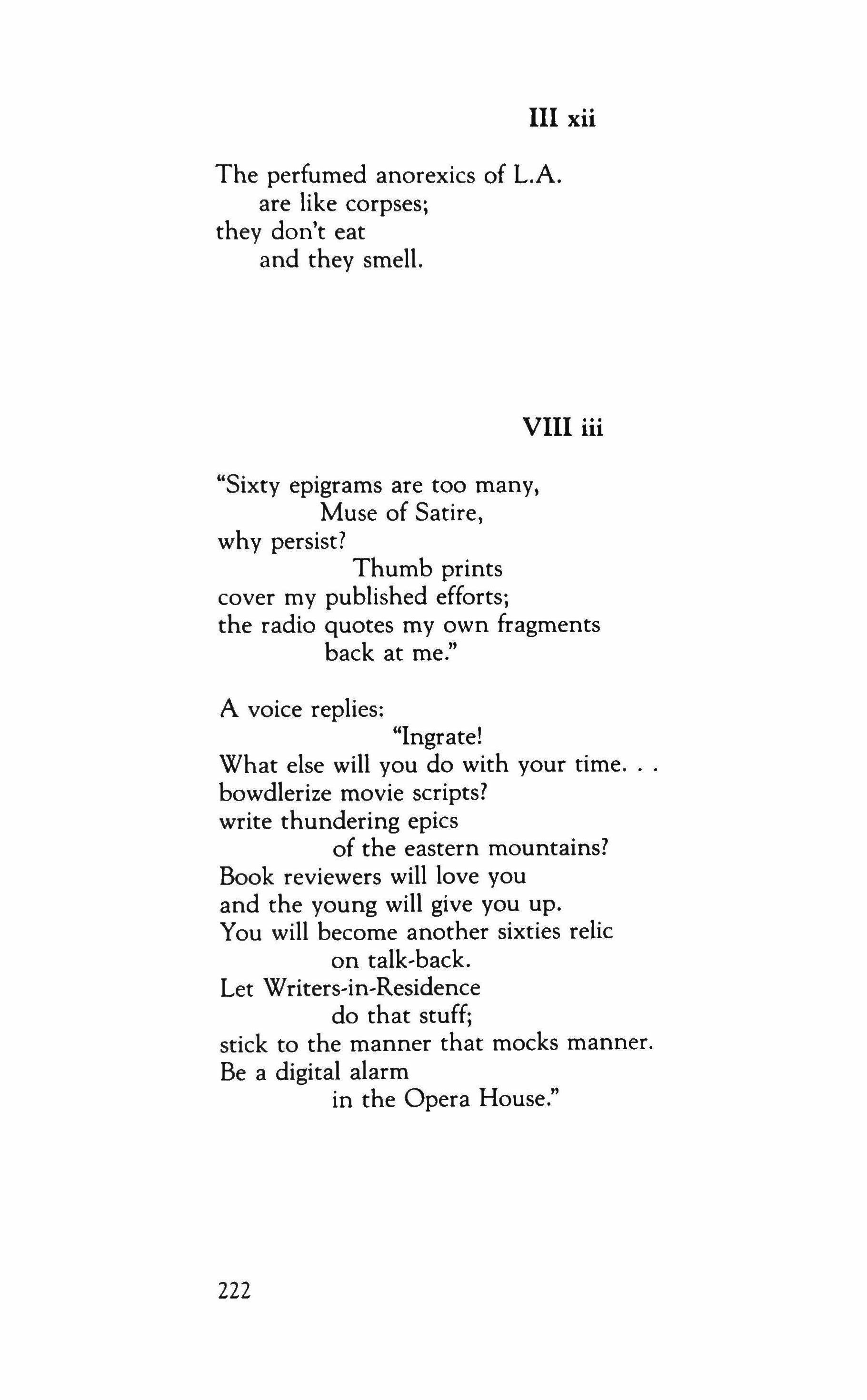
"Sixty epigrams are too many, Muse of Satire, why persist?
Thumb prints cover my published efforts; the radio quotes my own fragments back at me."
A voice replies: "Ingrate!
What else will you do with your time bowdlerize movie scripts? write thundering epics of the eastern mountains? Book reviewers will love you and the young will give you up. You will become another sixties relic on talk-back. Let Writers,in,Residence do that stuff; stick to the manner that mocks manner. Be a digital alarm in the Opera House."
III
xii
VIII iii
222
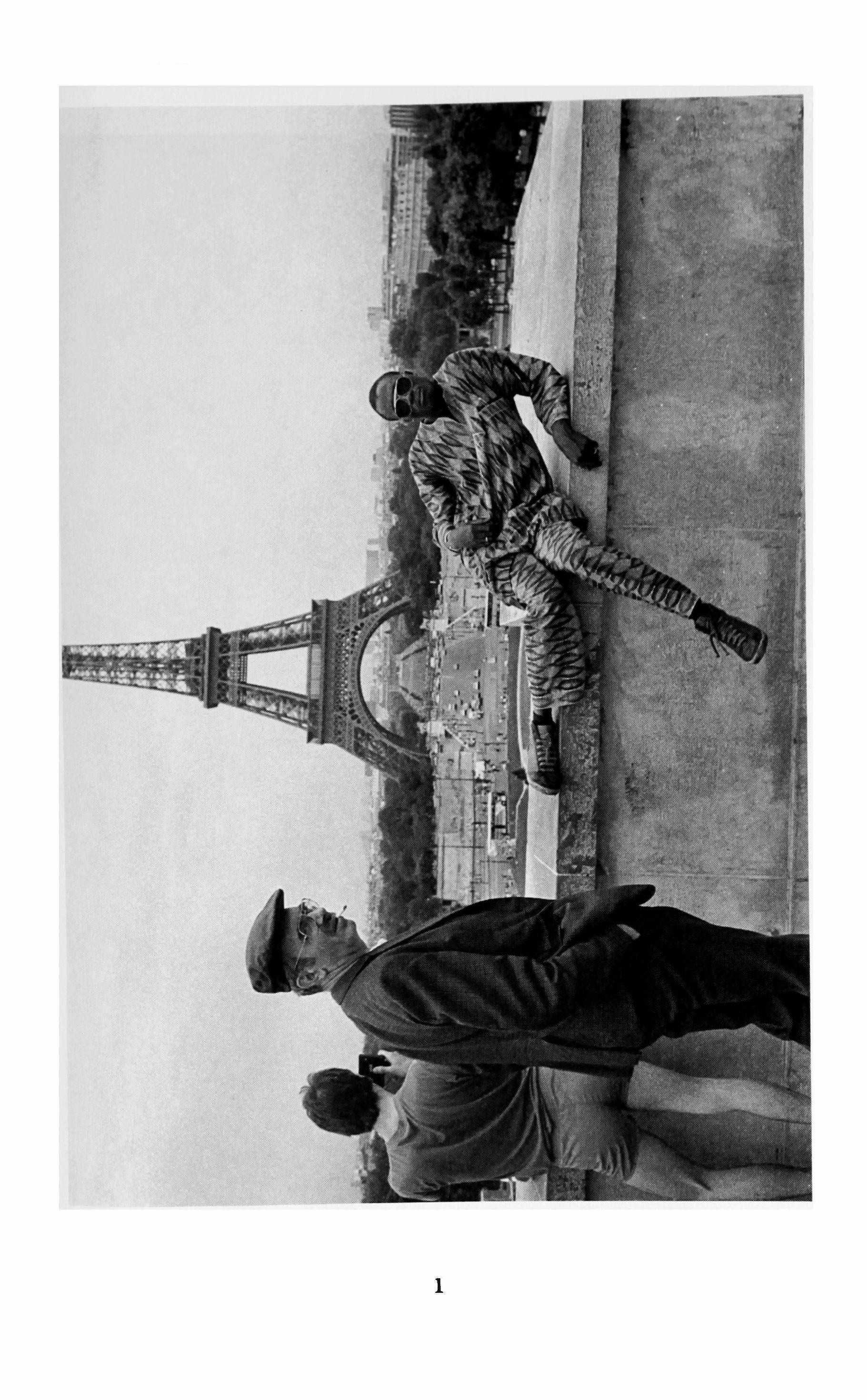
1
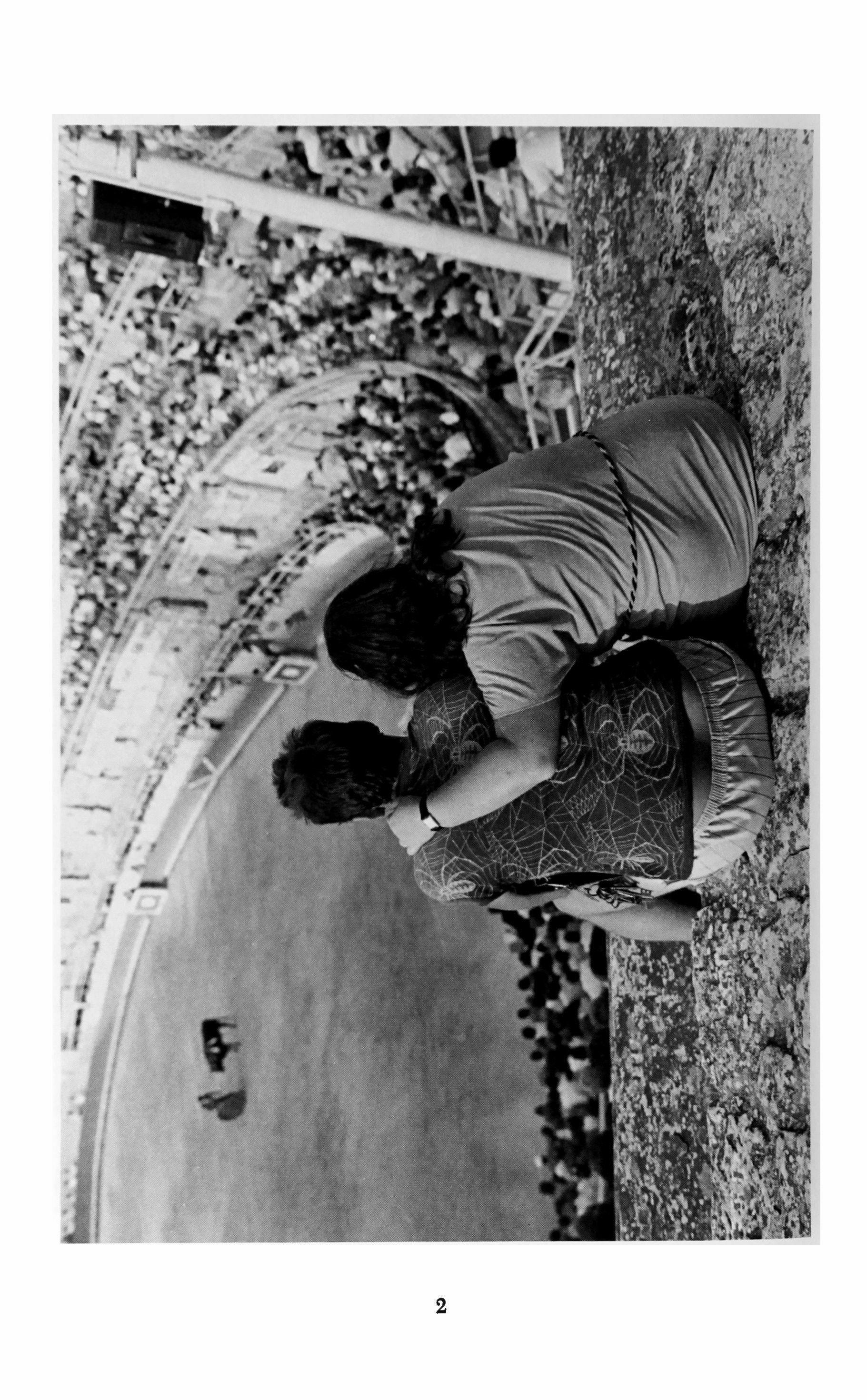
2
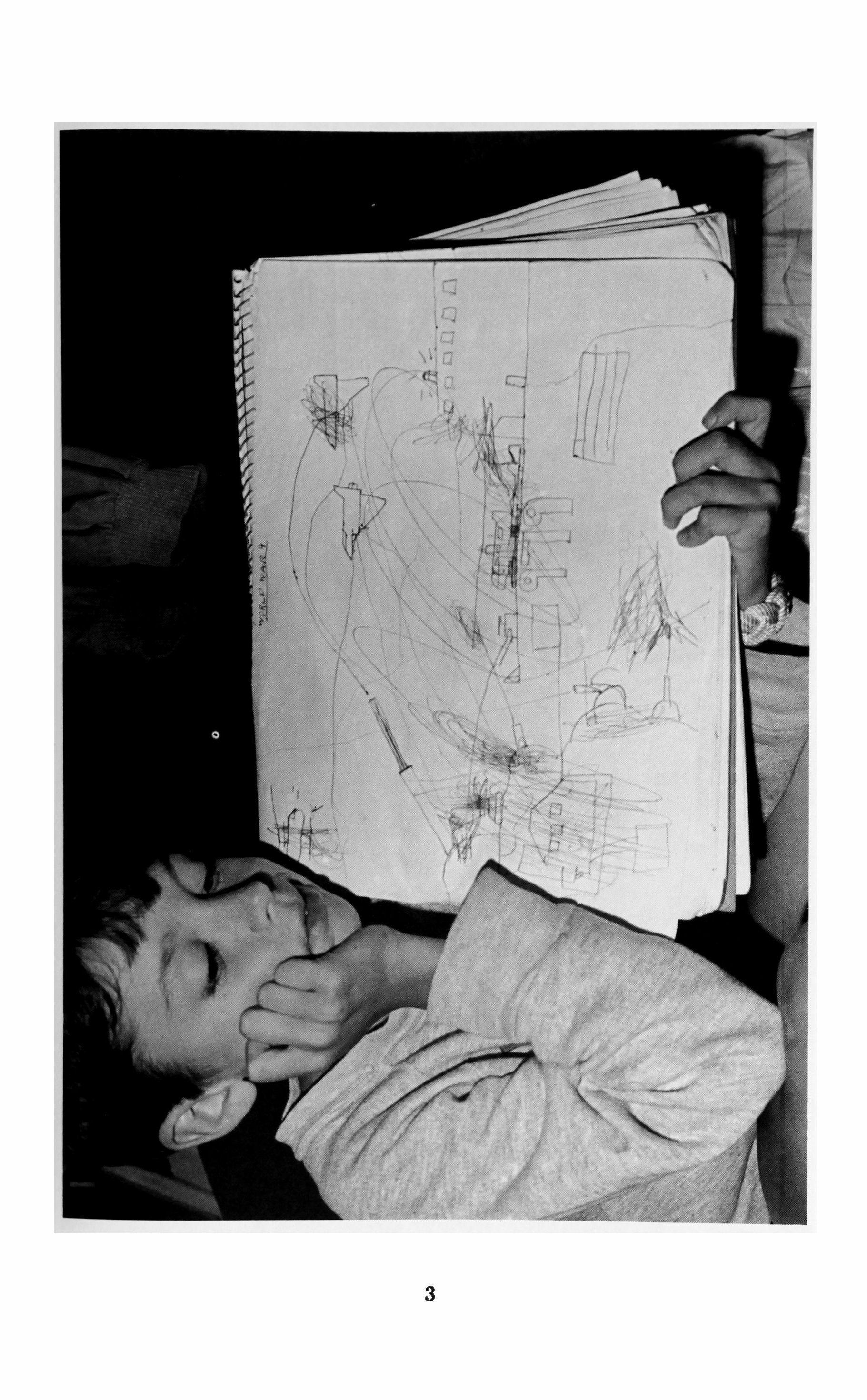
3
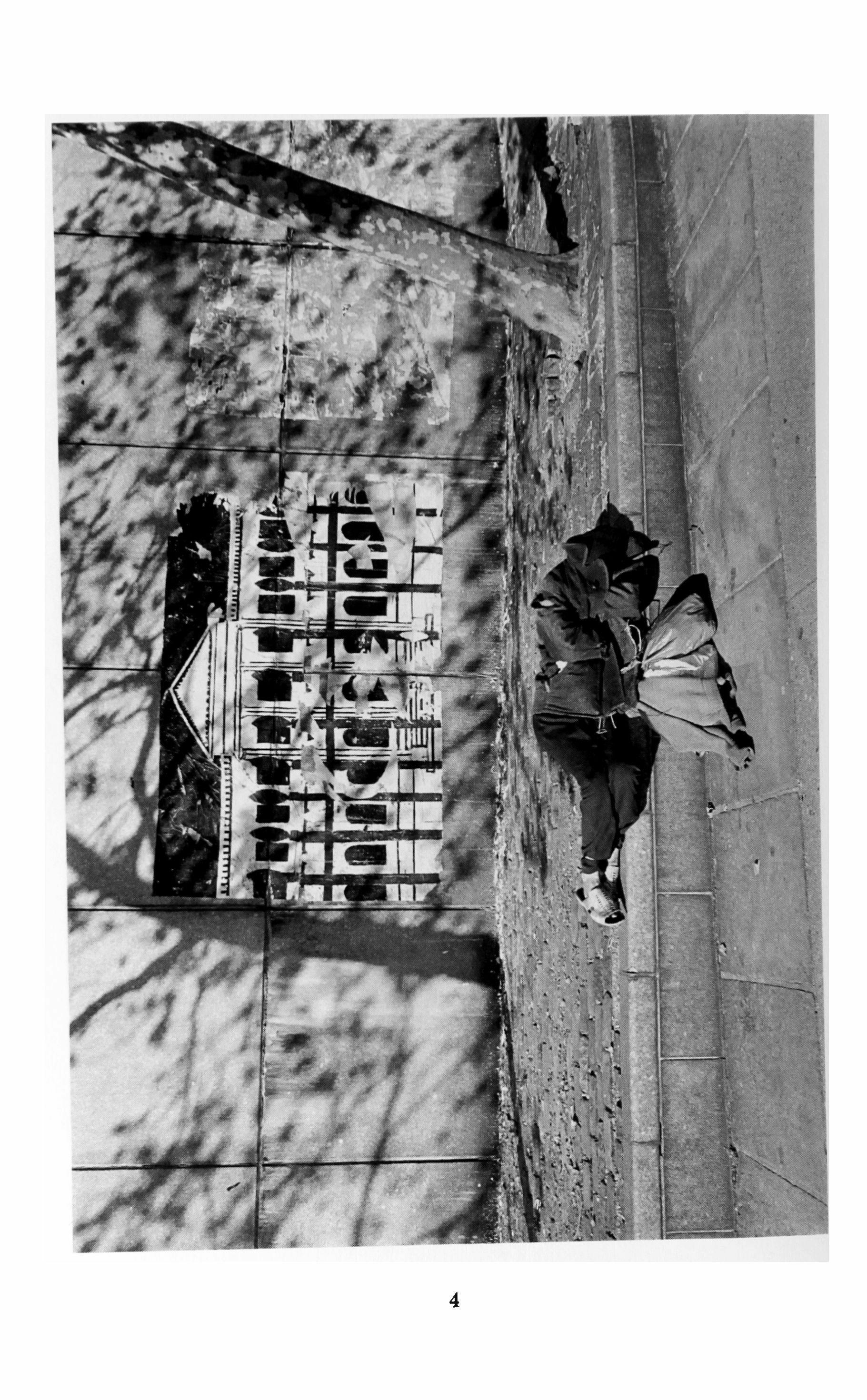

LJj f J I raJ! 1 1 I Of ( I 0' I ) 1 1 II IT! / I f-lr2J I I I I j J JJ/ f I 1 t I I I> 5

6
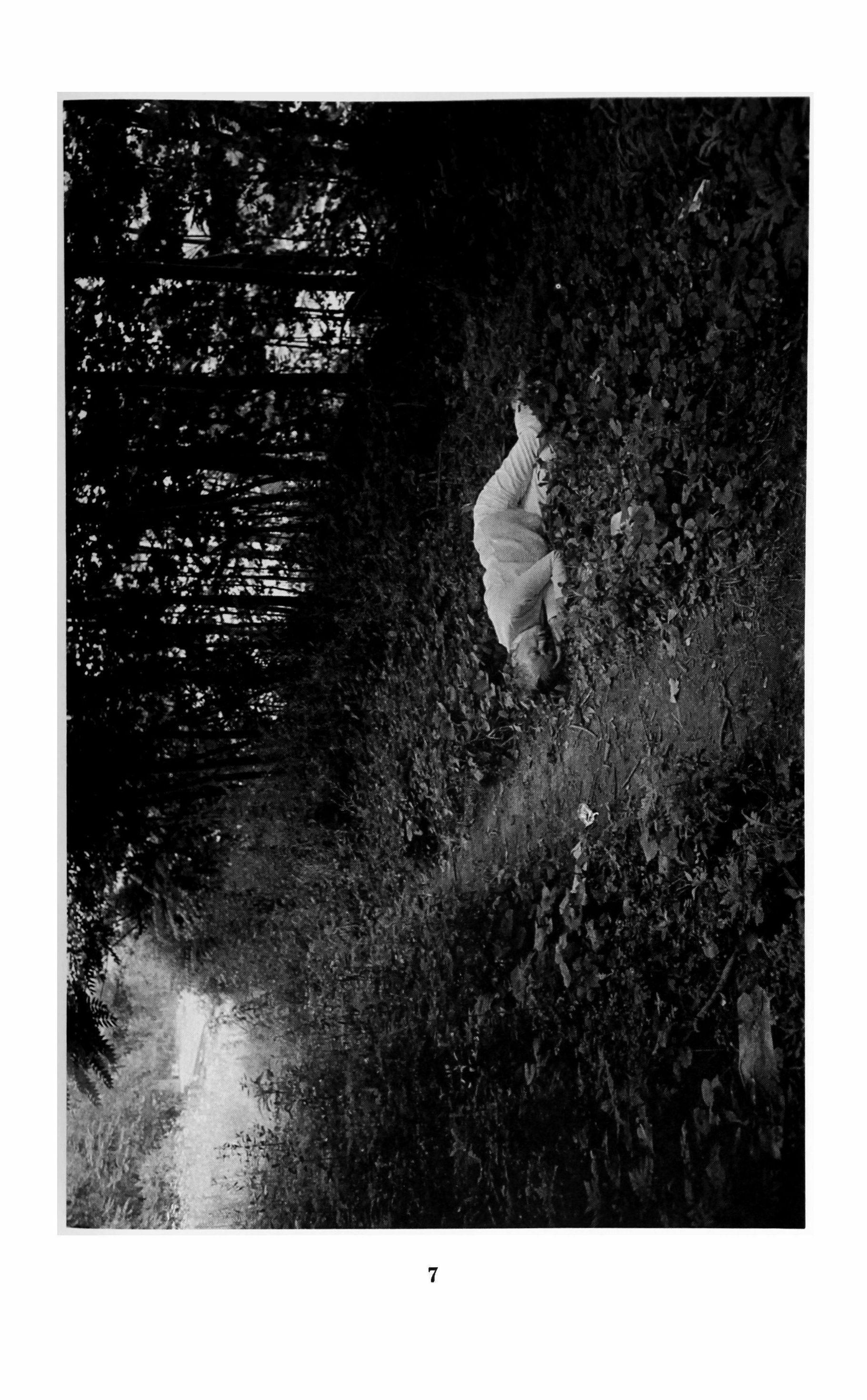


Captions
1. Paris, 1985.
2. Aries, France, 1987.
3. Sandwich, Massachusetts, 1986.
4. New York City, 1984.
5. West Haven, Connecticut, 1985.
6. Bloomfield, Connecticut, 1985.
7. Middletown, Connecticut, 1986.
8. Palais-Royal, Paris, 1985.
Life of Johnson Upside Your Head
Forrest Gander

Crossroad Blues
Came down along the road Robert Johnson carrying his Stella guitar like a misshapen child on his back
And stood at the side in dog fennel to watch the hearse he'd heard for half a mile bottoming out on the rutted road sucking up a tunnel of dust in its wake, dust to dust,
Approacheth and fishtaileth on toward Protho Junction.
Mr. Johnson passes into that cloud.
It was first break up one of the abandoned terrific rackets.
the child picked guitars, commenced
tilting a jar of corn whiskey rude noise and shouting, the screendoor, his eyebrows made his planetary way who shrieked over his din,
Son House, outside when he heard ripped open curling up at the far ends, toward Robert
I want to upset your backbone put your kidneys to sleep Do the breakaway on your liver and dare your heart to beat.
Want to entertain folks, said House, wrestling back his guitar, lift your mama's
* * *
232
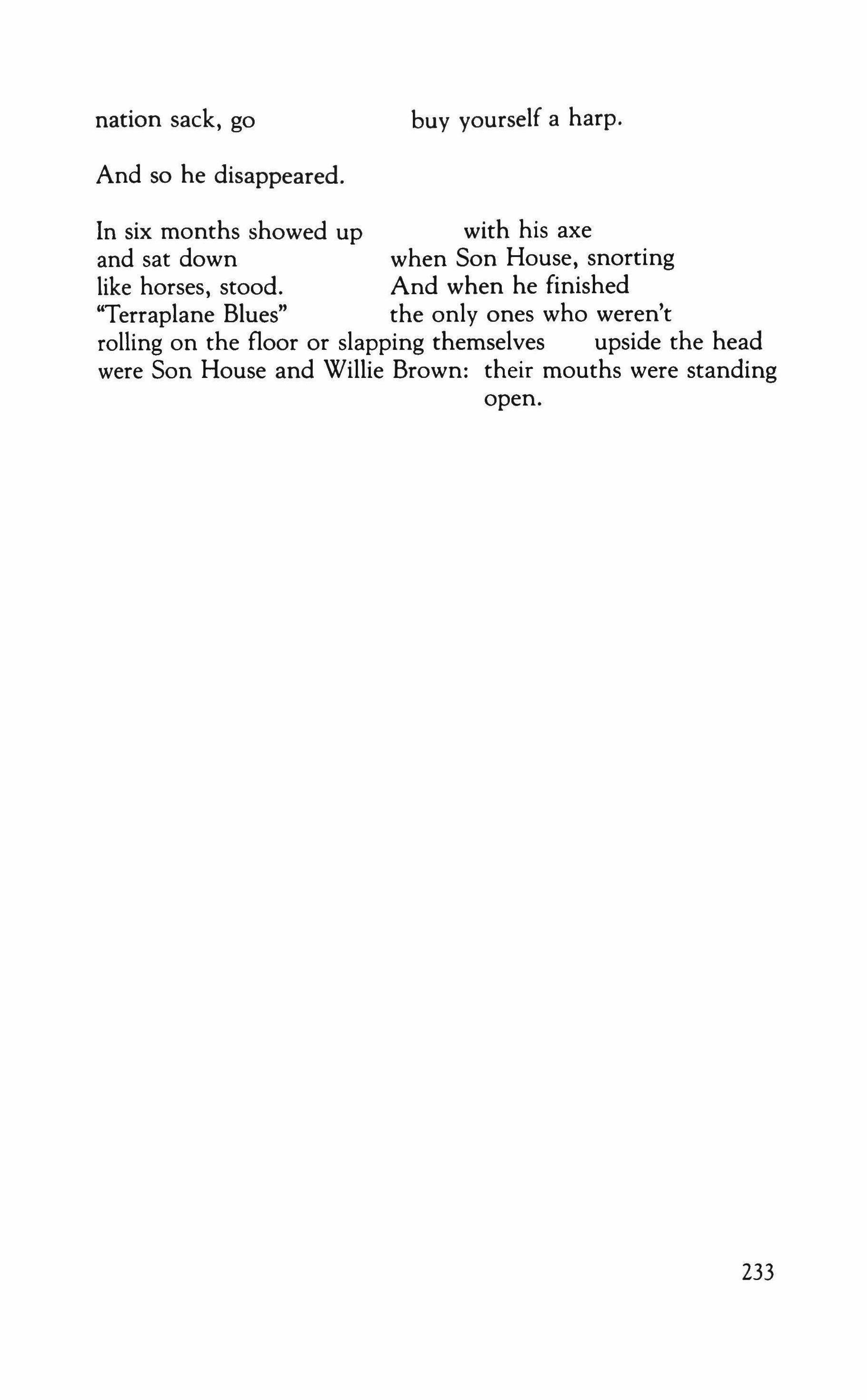
nation sack, go buy yourself a harp.
And so he disappeared.
In six months showed up with his axe and sat down when Son House, snorting like horses, stood. And when he finished "Terraplane Blues" the only ones who weren't rolling on the floor or slapping themselves upside the head were Son House and Willie Brown: their mouths were standing open.
233
Drunken-hearted Man

That it was evening because the west had gone red and the chiggers had increased in his wrists. From the flatbed he could see a girl in a knee,length dress holding her hands on top of her head, her face framed; laundry staying out late. Robert loved his sister's skin. As though he could blow on it and it would riffle. How drinking shoe polish strained through whitebread lodged a peekerwood behind their brains. Their father was soaking half a cooked chicken in paris green, kneading in some Rough on Rats, and limping out to find the mongrel under the drugstore porch. Then the rumor he couldn't no way have been their father. Robert claimed, Two people are inside me. His brother learned taxidermy from a book. Robert played harp in the outhouse. When you sit in the outhouse a while you begin to imagine bad things live in the shit and right this moment they are looking up at your butt getting an idea. He married young.
At the time I met him the so-called guitar player was fresh out of Memphis, thumb out where the roads crossed and I thought he must have been teenage. But he didn't like that title of being kid. Was a man far as he was concerned.
* * *
234

I said, Now son forget that motion-picture left hand, good evening, my name is Tush Hog. He said, I pick cotton for no man and I ain't skeared of you Satan.
235
Milkcow's Calf Blues

She had looked in the crib to see a brown recluse pulsing on her baby's forehead.
One of the cross staves supporting the coffin broke, so that it plunged forward, splintering open.
Between Calvary
Baptist Church Parsonage and the graveyard, the reverend's planking addressed a muddy washout and the women in their meeting clothes walked over this now single file, their heads tilted down.
Robert Johnson arrived of an evening in a suit covered with road. Rags hung burning in a corner for the mosquitoes were bad. She let go a kettle of hot water, smoothed calico skirt to the backs of her knees. Hilo, Dusty, she answered.
The Devil hummed around the tonic, the blue third and the fifth
Robert Johnson snatched this out of air how to cock it on the wall, controlling timbre while planters prastered off like a load of bokros
* * *
236
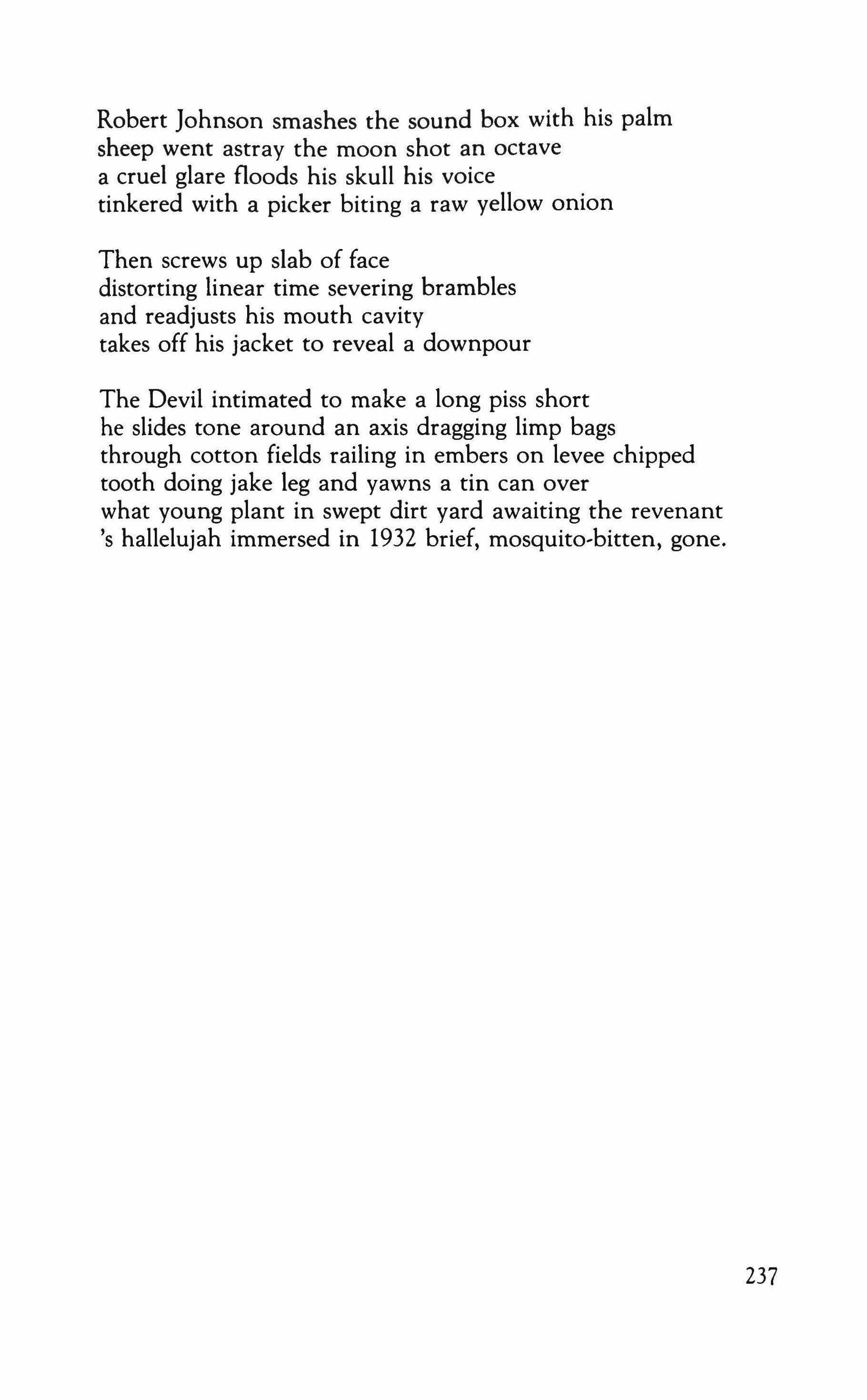
Robert Johnson smashes the sound box with his palm sheep went astray the moon shot an octave a cruel glare floods his skull his voice tinkered with a picker biting a raw yellow onion
Then screws up slab of face distorting linear time severing brambles and readjusts his mouth cavity takes off his jacket to reveal a downpour
The Devil intimated to make a long piss short he slides tone around an axis dragging limp bags through cotton fields railing in embers on levee chipped tooth doing jake leg and yawns a tin can over what young plant in swept dirt yard awaiting the revenant 's hallelujah immersed in 1932 brief, mosquito-bitten, gone.
237
Kind hearted Woman Blues
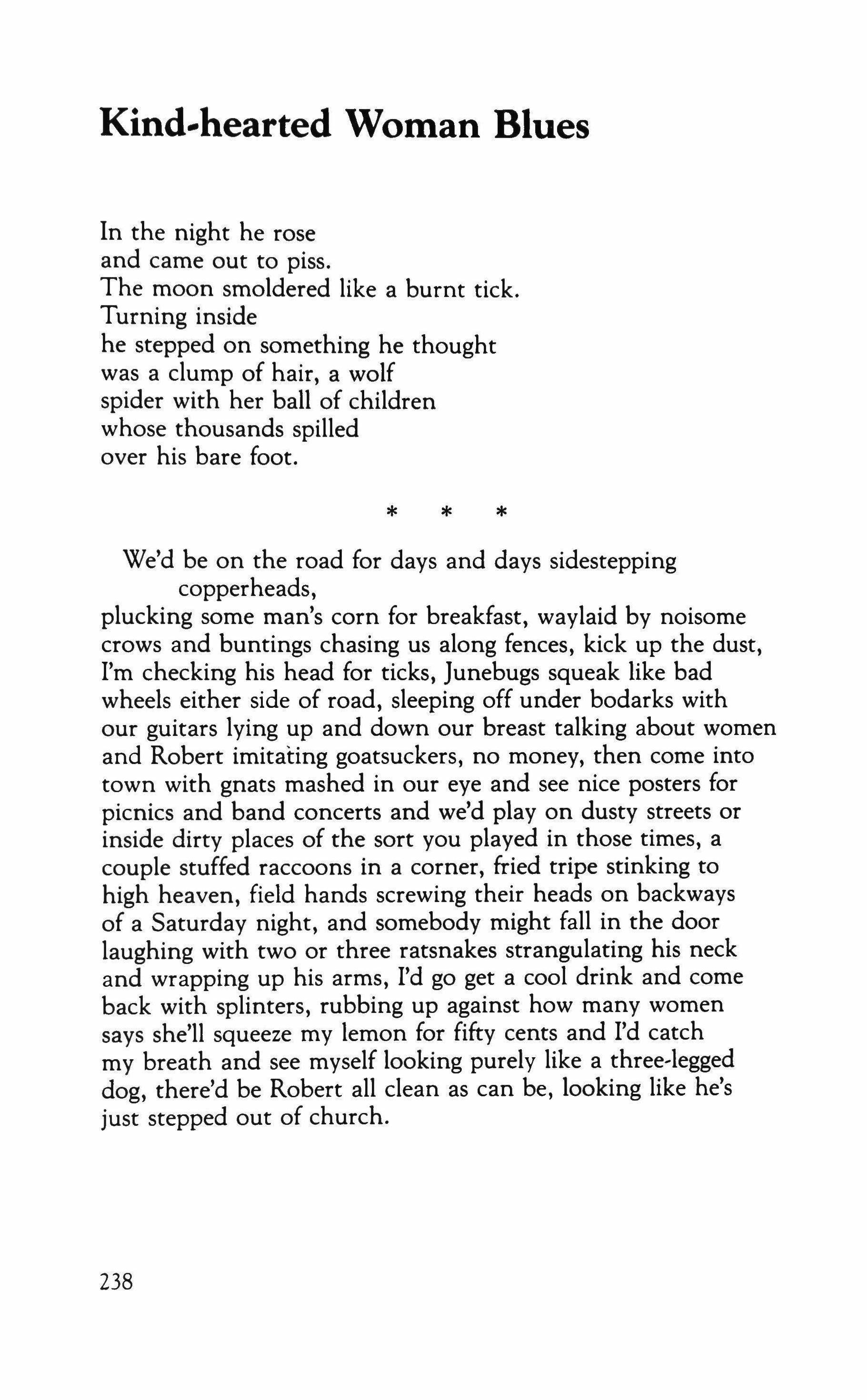
In the night he rose and came out to piss. The moon smoldered like a burnt tick. Turning inside he stepped on something he thought was a clump of hair, a wolf spider with her ball of children whose thousands spilled over his bare foot.
We'd be on the road for days and days sidestepping copperheads, plucking some man's corn for breakfast, waylaid by noisome crows and buntings chasing us along fences, kick up the dust, I'm checking his head for ticks, Junebugs squeak like bad wheels either side of road, sleeping off under bodarks with our guitars lying up and down our breast talking about women and Robert imitating goatsuckers, no money, then come into town with gnats mashed in our eye and see nice posters for picnics and band concerts and we'd play on dusty streets or inside dirty places of the sort you played in those times, a couple stuffed raccoons in a corner, fried tripe stinking to high heaven, field hands screwing their heads on backways of a Saturday night, and somebody might fall in the door laughing with two or three ratsnakes strangulating his neck and wrapping up his arms, I'd go get a cool drink and come back with splinters, rubbing up against how many women says she'll squeeze my lemon for fifty cents and I'd catch my breath and see myself looking purely like a three-legged dog, there'd be Robert all clean as can be, looking like he's just stepped out of church.
* * *
238
Ramblin' on My Mind

"1 would just as lief you go alone," she answered. Grinding coffee beans, dipping a cup in the water bucket four times to fill the porcelain pot. Hot as a two-peckered goat. Morning. The weight of her coppled breast. Accused of burglary, pleading somnambulism. The road was two deep ruts on either side of a big hump. Misery runs on a broken leash. As when the hypnotist says so, he remembered. Shot herself while looking in a mirror. One photograph: their infant in a coffin. The Sliding Delta outside his door in Tunica County, Mississippi, near the cemetery at Three Forks.
* * *
He was kind of a nobody's business. 'd be standing up playing some place, playing like peculiar. At that time it was matter of fact with him as well as hustle. And money'd be coming in from all directions. But Robert'd just Robert and walk off and leave you there two or three weeks. And you wouldn't see pleasure no more maybe in playing. So, we began journeying off. It's just I was, so to speak, tagging along.
239
Little Queen of Spades
The voice the dead man's voice is young and tight and high the naturalness of it as language a man's voice tuned a little sharp the image of the voice a pressured high and letting out the dead man's falsetto counterpointing a drumbeat in lower register his guitar breathing the blinds of syllables his chair squeaks voice undulating outside the wire thin loops of swallows in his voice the diprheria epidemic in his voice the barn fires his father a drunk in the dark mistaking carbolic acid for cough medicine bottleneck slide groups of triplets in the treble strings tuned sharp thumb for hard rhythm intensity inside him his mouth a little slack the concentration inside the voice an orphan who ate match heads his wife on the cooling board his baby buried pain's medium voice contours of landscape eroded mortal erotic upwelling to warp as the degree of emotion increases the power to be funny jammed through oblivion like a crowbar cotton fields frog gig pissing in wild sweet peas sweat lubricating voice sex speeding up the dead man's voice orphaned from its mouth
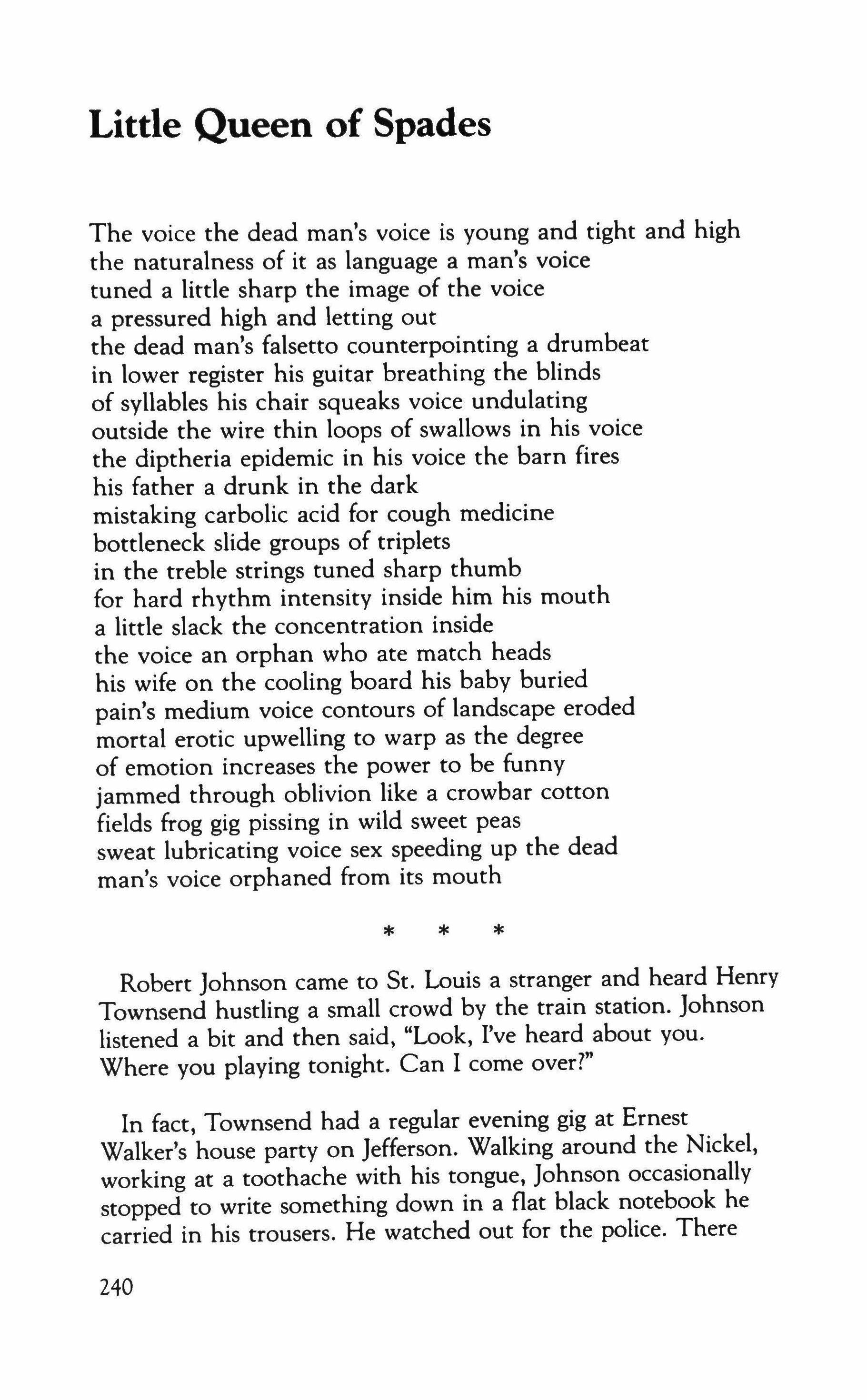
Robert Johnson came to St. Louis a stranger and heard Henry Townsend hustling a small crowd by the train station. Johnson listened a bit and then said, "Look, I've heard about you. Where you playing tonight. Can I come over?"
In fact, Townsend had a regular evening gig at Ernest Walker's house party on Jefferson. Walking around the Nickel, working at a toothache with his tongue, Johnson occasionally stopped to write something down in a flat black notebook he carried in his trousers. He watched out for the police. There
* * *
240
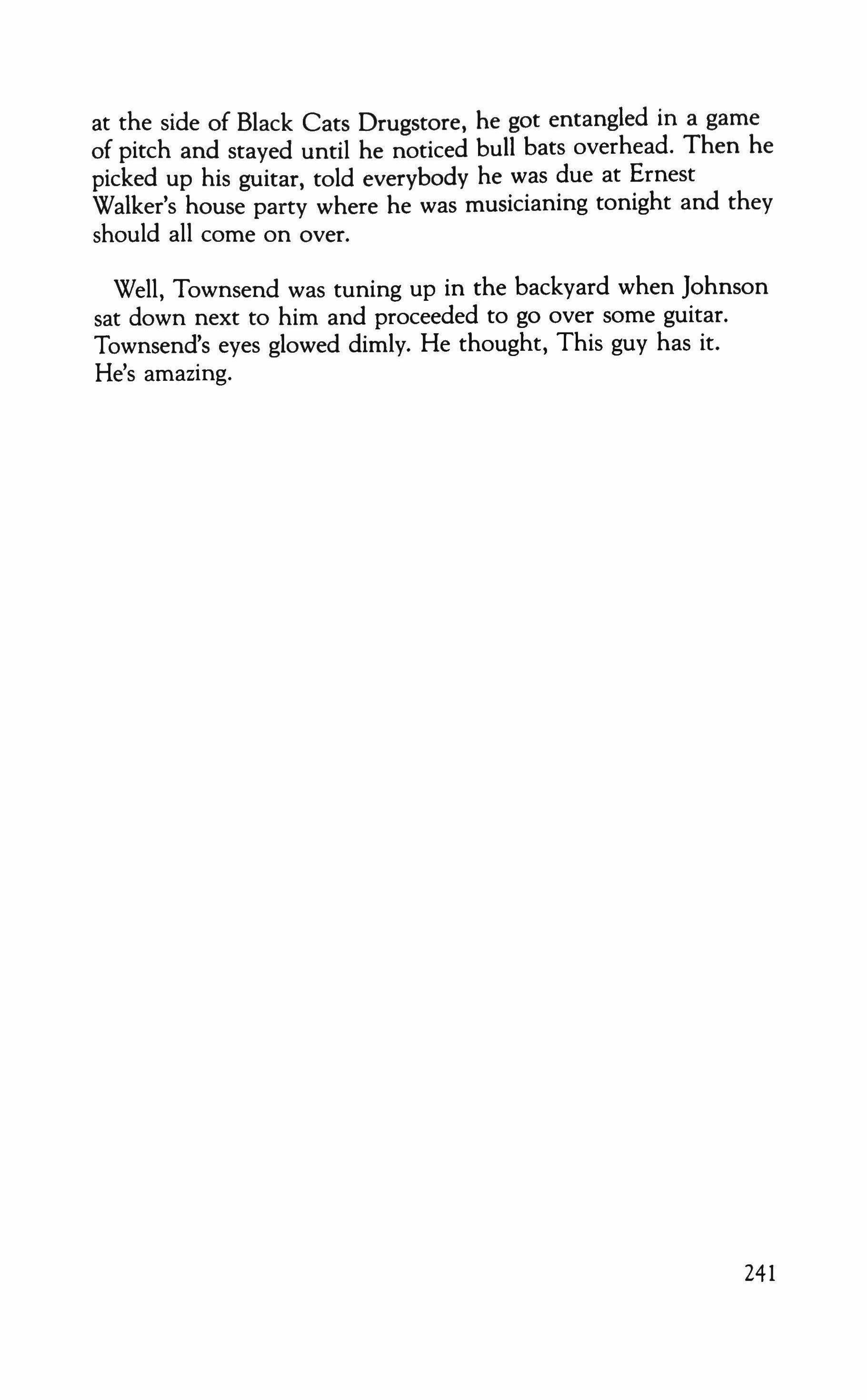
at the side of Black Cats Drugstore, he got entangled in a game of pitch and stayed until he noticed bull bats overhead. Then he picked up his guitar, told everybody he was due at Ernest Walker's house party where he was musicianing tonight and they should all come on over.
Well, Townsend was tuning up in the backyard when Johnson sat down next to him and proceeded to go over some guitar. Townsend's eyes glowed dimly. He thought, This guy has it. He's amazing.
241
Stones in My Passway

Another houseparty: there are long tables out back and dogs everywhere, maybe seventy people slapping tables or winging bones at the animals. Women and men both lying around in bushes on all sides dethroned of their reason, or dancing an orgy: a married woman squeezes her breasts at the guitar player, gyrating on bowed legs with her skirt half lifted. Her husband runs slides under her whooping, followed by another man who seems to get stuck there. Thighs in ceaseless friction And sweat washing all of them, night sweat, clothing soaked, sterno sweat, blind faces glowing like a new shoe shine and Robert Johnson set up precariously in a chair on a bumped table wearing a brand-new fedora, eyes hooded by his brow playing guitar with a broken bottleneck and his left hand fingers bleeding on the strings.
I'm goin' to get up in the morning, I believe I'll dust my broom.
Girlfriend the black man you been lovin', girlfriend, can get my room.
He is still getting clear high notes still getting drunker, when a mulatto on a bet wrestles down a pariah dog and his friend pours a full lantern of coal oil over it then touches a match to its tail whereupon half the first man and all the dog
242

instantly blow up, visions of hell each howling and burning a brief passageway through stumbling bodies toward the street. * * * Stopped at this place in ill in noise crucified dead and buried. And the guy asked us play a piece, so Robert starts out and me right with him, and they got us to stay and we stayed coupla nights. 25 cents a head to see how the colored guys looked like.
243
Last Fair Deal Gone Down

1. Wood bench barrel on side two chair sunk veranda Mose Brown's Dry Goods semi, retired men one soak feet bucket epsom salt water.
2. Came town man electric machine you see what was crank phone two wire come out he start poker dealer voice soon decent crowd. Some mischief unhook line/harness his standing team, boys. Nickel bet how long Snead Noe his feet that bucket once crank.
3. Look serious like take shit. Car come boy shout everyone turn head Intermediary Christ Snead Noe rip pant barrel cinch head hit wall rock back splash bucket water. Dust devil follow car pull up Drugstore and Lemonade. Mischief hang back then surround car, boys.
4. White man slam door step butterfly cover horse dung kick porch enter store cough three time proprietor most deaf read magazine swat fly man cough heart attack proprietor raise head lower glasses boys open door Snead Noe shout across street I'm looking for a guitar player name of Robert Johnson white man says. What.
5. Across street other man smile put feet bucket water nickel bet Snead Noe shake head white man look get car back horse dung butterfly electric man crank machine men whoop car shift first grind white man see last eight-hundred-pound hog boy lead string knock house door open huge testicle too big fit under hog out squeeze behind leg two watermelon tail open wide door go boy string hog. Goddamn.
244

Interviewed, Johnny Shineswho traveled awhile with himremembered a time in St. Louis we were playing one of the songs he'd like to play with someone once in a great while. "Come On in My Kitchen." He was playing very slow and passionate and when we quit I noticed no one saying anything. Then I realized they were all crying. Both women and men.
* * *
245
Hellhounds on My Trail

He ends here, a sort of omen. History accelerates. The excluded remains to disrupt the structure constructed to domesticate it. Unimproved, his voice turns away at the most intense moments of emotion. Into grooves. You bloodless and attenuated: here is the rufous prophet wailing a blue fuck. The prompt sound. Where the Mississippi embouchures into. Sixty years ago, a voice that no longer exists in a room that no longer exists. Fugitive tendency. Erotic disorder. He woke up this morning and reached under the bed for his shoes. Material added by way of analogy. I lacks a nickel. The barber who clipped his nose hairs. When you get down to the lick log. Ruminations of sex without love, love without children. Undergrowth with two figures. Part of his earlobe torn off in a married woman's teeth. Pubic hairs shed in the beds of strangers. Ass curve moonlight. Stared into landscapes in ceilings, knots and their tributaries and lead-based paint unfolding moth wings. Reeling stars. Bulge in his pants at her funeral. Instead of a country a set of traps. There is not much time in the day between death and life. Tuning. His dogs, throat eaters, untamed and invisible. A weed under tongue. Wanted to be a living man.
246
The Sad White Jazz Man
Peter Schwendener

When they write about themselves, musicians have a strange way of often choosing to write about violence, or emphasizing the violent parts oftheir lives at the expense of more mundane parts like practicing scales. It's as if they thought they had some special insight into the subject of violence by virtue of being musicians, which is not the case, as most violent rock-star autobiographies attest. Occasionally, however, a musician will write a book that deals with violence not by locating it in "selfdestruction" but by showing how self-destructive acts affect people outside the self; and this takes literary skill. One such book, many feel, is the alto saxophonist Art Pepper's book Straight Life, * which came out in 1979 (Pepper died of a stroke in 1982, at the age of fifty-seven). Straight Life, ironically named after the title of one of Pepper's own songs, is a book about his childhood, his career as a musician, and his extramusical activities as a rapist, a petty hoodlum, a drug addict, a peeping tom, a burglar, a convict, an accordion salesman and other things that constantly distracted him from playing his horn. It is an ugly book in many ways, full of a kind of stale, sour, sickly smell of clinical degeneracy, or the kind ofviolence that never goes anywhere but just sits rotting on the page. This may be the almost unwitting point of the book, however-which is that violence doesn't lead to anything but more violence, and certainly doesn't lead to playing music, which is as incompatible with violence as any other technical act requiring a certain minimal soundness of the hands, at least.
*Art and Laurie Pepper, Straight Life: The Story of Art Pepper (New York: Schirmer Books, 1979).
247

Pepper's book gets this across, and does so nicely; yet one can't help but wonder in reading it if Pepper enjoyed the violence he writes about while it was actually going on, and the sense one gets that he did makes one's pleasure in the book feel a bit warped, as if it were not really pleasure but something more like voyeurism or one of Pepper's other self-described sins one were engaging in as one reads. To begin with, there is the sheer exuberance of the book, or the way it seems to amble on almost happily from one gruesome scene to another. The violence is relentless, and seems to fill almost every page. Pepper sees blood in his dreams, and real blood everywhere he looks while he is awake-gushing from his drunken mother's body as his father beats her up, beading on his arm as he withdraws the needle from a heroin injection, pouring from the bodies of the convicts and hoods among whom he spends the better part of his adult life.
There is something unreal about it, a quality of yearning for desolation and destruction that hinders one's ability to believe what one wants to believe about Pepper, which is that he was a great musician. He may have been, but his playing itself, on records at least, doesn't suggest the purely musical authority ofsadness overcome by instrumental technique that he's supposed to have derived from Charlie Parker, Lester Young and John Coltrane. However well he played, it's not clear from the book that he wanted to overcome sadness anyway. There's a lot to like about Pepper-his honesty and friendliness and way with words-yet there's also the sense of someone who got more positive energy from violent depression than most people get from feeling great about themselves. Pepper himself seems aware of this, and partly atones for his worship of his own misery by making it dramatically vivid, as in the following account of the first time he took heroin:
I felt a tingly, burning sensation up in my sinuses, and I tasted a bitter taste in my throat, and all of a sudden, all of a sudden, all that feeling-wanting something and having no idea what it was, thinking it was sex and then when I had a chance to ball a chick not wanting to ball her because I was afraid of some disease and because of the guilt; that wandering and wandering like some derelict; that agony of drinking and drinking and nothing ever being resolved; and no peace at all except when I was playing, and then the minute that I stopped playing there was nothing; that continual, insane search just to pass out somewhere and then to wake up in the morning and think, "Oh, my God," to wake up and think, "Oh God, here we go again," to drink a bottle of warm beer so I could vomit, so I could start all over again, so I could start that ridiculous, sickening, horrible life againall of a sudden, all of a sudden the demons and the devils and the wandering and wondering and all the frustrations just vanished and they didn't exist at all anymore because I'd found peace.
248

There is an eerie or undead quality about Pepper that comes through clearly in this passage but doesn't get universalized enough in the book to make it seem like a human quality. The pianist Hampton Hawes, on the other hand, wrote a book about his heroin addiction that is every bit as vivid as Pepper's book yet much more in control of itself as a piece ofwriting. * The more artful quality of Hawes's book, or the fact that it is more well-dramatized than Pepper's, has the ironic effect of taking most of the drama out of the heroin use itself, or making it seem like the tediously awful thing it is. Here is Hawes sitting on a park bench in New York in the late fifties:
Sitting on a bench across from Central Park one afternoon or night, wasted, trying to figure out where my next fix was coming from and what was happening to my life-thinking: from $1,500 a week the year before to sitting on a park bench stone broke with cigarette holes in my pants from nodding, that's a bitch of a drop-when a gleam ofsunlight offmetal flashes in my eyes and a familiar Bentley rolls up to the curb. Nica behind the wheel and Monk saying, Man, get in this car, a good musician ain't supposed to be sittin' on no bench lookin' like you look.
"A good musician" is what seems telling about this episode, suggesting that according to Monk and the Baroness Nica de Koenigswarter there are some musicians who actually belong more on the park bench than on the piano stool.
In a recent book about jazz musicians, ** the guitarist Jim Hall separates his life from his music less drastically than Art Pepper does when Pepper says that "the minute" he stopped playing his instrument "there was nothing." Hall says he sometimes feels a sense of "panic" about being a musician that makes him wonder if he should give it up altogether, but that when he actually starts playing the guitar the feeling goes away. Hall's verbal account of his relationship to his instrument comes across as quite calm compared to Pepper's, which is especially interesting because Hall has always shown a rather keen sense of drama in his solos-in contrast to Pepper, who has always been appreciated, in some ways, as an abstract or logical player in the Lee Konitz mold.
The one thing Jim Hall's remarks about his playing and Art Pepper's book about his life have in common is that both are significantly about
*Hampton Hawes and Don Asher, Raise Up Off Me, (New York: Coward, McCann & Geoghegan, Inc., 1972).
**Whitney Balliett, American Musicians: Fifty-six Portraits in Jazz (New York: Oxford University Press, 1986).
249

sadness, which has always been regarded as something different, or at least separate, from the blues. The blues has a calming drama about it, or the sense of a well-controlled tragedy, while sadness, like real depression, has no sense of drama at all and lacks all sense of being controlled. Compared to Art Pepper's somewhat wild account of his miseries, Jim Hall's profile has a bracing sense of melancholy that suggests the technical challenge of playing music, more than the passive wallow of drugs and degeneracy - although Hall does describe himself in the profile as a recovered alcoholic.
In the popular mythology of jazz figures, which tries like all mythologies to obscure what people actually do in an attempt to find out who they really "are," or what their souls are like, white musicians have always been thought to have more of a monopoly on sadness than on the blues. Bix Beiderbecke is the original Sad White Jazz Man, or the player who tried to capitalize on sadness itself as a quality in his playing rather than trying to refine or sharpen sadness into the blues. One of the better attempts by a critic to say something intelligent about this subject is that of Gary Giddins, who writes in a piece about Art Pepper called "The Whiteness of the Wail" that:
The important thing about the good white jazzmen is not that they appropriated the black American's music - a narrow and paranoid sentiment that denies the individuality of all jazzmen, white and black-but that so many of them chose a black aesthetic as the best possible source for self-examination. Those who dug deepest avoided minstrelsy and went beyond mere technique. They offered the jazz listener the only quality no black jazzman can offer-the pursuit of the white wail, a revelation of Caucasian inwit through the black idiom of the blues: a personal search fraught with peril. *
The problem with this analysis is that it does what I'm sure Giddins doesn't want it to do, namely identifies the "peril" of creation too much with skin color and not enough with the artist's struggle with his materials. The only real drama in an artist's life is in his struggle with his materials, not in his relationship to "the world." The good thing about Giddins's comment is that it is intelligent mythography, or a comment about music that really relates it to other things as opposed to simply "comparing" it to them: the Joycean reference to "Caucasian inwit" makes one think of literature, and what Giddins is expressing is essentially a nonmusical concept whose implications are more for poetry or
*Gary Giddins, "The Whiteness of the Wail," in Riding on a Blue Note: Jazz and American Pop (New York: Oxford University Press, 1981), p. 254.
250

reading books than for playing an instrument. In the record store the other day I saw an extremely brief liner note for a Bill Evans album in which Evans was almost marter-of-facrlv compared to Keats in a way a black musician, one feels, might not be. The Keats connection in jazz goes back at least as far as Stan Getz's recording in the late forties of a piece called "Early Autumn," and whenever critics use the word "bur' nished" to refer to a saxophone player's sound the Keatsian or other literary echoes are often rustling nearby. The black tenor saxophonist Lester Young is often brought in by critics to preside over the whole melancholy or introspective school of white saxophone playing, including that of Art Pepper and Stan Getz. Young was a melancholy player, yet he was also a swinger of almost orgiastic ebullience and intensity, and putting him at the head of a long list of mostly depressive white players who are supposedly the inheritors of his sadness seems a little dubious.
The white pianist Bill Evans, who died in 1980 at the relatively young age offifty-one, was one of the most expressive musicians in jazz, though there were always listeners, such as the critic Whitney Balliett, who thought he was too introverted (Balliett once wrote a piece about Evans comparing him to Young Werther). On the early records Evans made with Miles Davis and other leaders it was clear that what he was trying to do, and often succeeding in a way that could seem supernatural at times, was raise thoughtful or introspective playing to the level of swing, if not exuberance. Some think his playing retained this quality to the end of his life, while others have questioned how well his obvious ability to swing survived the transition he eventually made to leading his own groups. I think his playing got a little brittle as he got older, or fell a little too deeply into the well of arpeggios or pre-digested melodic patterns that every improvising musician has to constantly watch out for. Evans was a great musician, but there's something about his later records that makes one think he reversed the natural order of his musical imagination, or put mind, in the form of his powerful ability to analyze what he was doing, over the emotionality that always made him so interesting to listen to. His celebrated ability, for example, to break down or analyze popular songs and reassemble them on his own impressionistic terms seemed to flourish or advertise itself at the expense of what he had always done best, which was swing in a powerful if somewhat peculiar way. The kind of analysis one "hears" or is acutely aware of in the later Evans is a quality that strikes one as having more to do, in a way, with writing or literature than with music, as if Evans were trying to revise or correct the structure of his music while actually performing it.
251
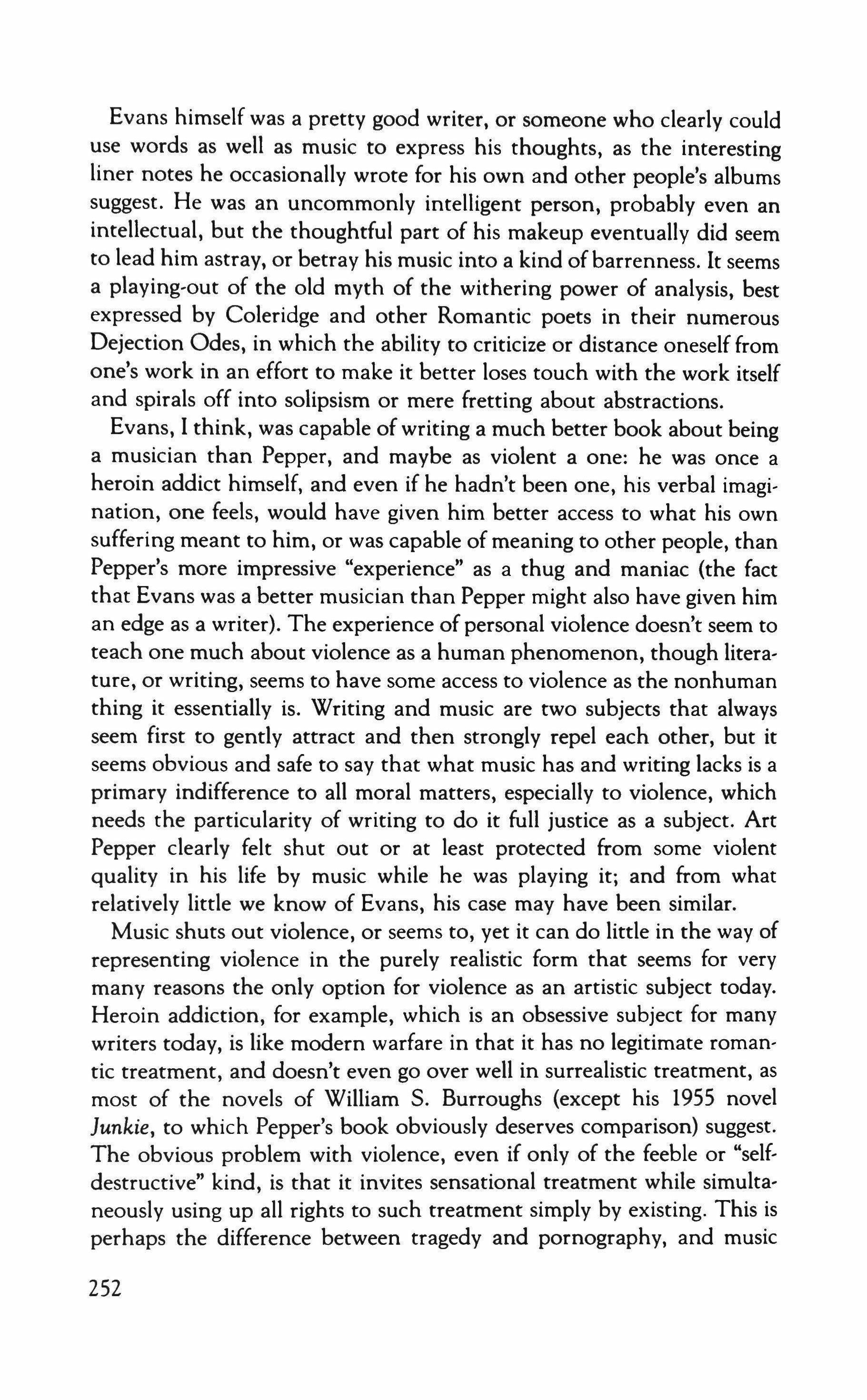
Evans himself was a pretty good writer, or someone who clearly could use words as well as music to express his thoughts, as the interesting liner notes he occasionally wrote for his own and other people's albums suggest. He was an uncommonly intelligent person, probably even an intellectual, but the thoughtful part of his makeup eventually did seem to lead him astray, or betray his music into a kind ofbarrenness. It seems a playing-out of the old myth of the withering power of analysis, best expressed by Coleridge and other Romantic poets in their numerous Dejection Odes, in which the ability to criticize or distance oneself from one's work in an effort to make it better loses touch with the work itself and spirals off into solipsism or mere fretting about abstractions.
Evans, I think, was capable of writing a much better book about being a musician than Pepper, and maybe as violent a one: he was once a heroin addict himself, and even if he hadn't been one, his verbal imagination, one feels, would have given him better access to what his own suffering meant to him, or was capable of meaning to other people, than Pepper's more impressive "experience" as a thug and maniac (the fact that Evans was a better musician than Pepper might also have given him an edge as a writer). The experience of personal violence doesn't seem to teach one much about violence as a human phenomenon, though literature, or writing, seems to have some access to violence as the nonhuman thing it essentially is. Writing and music are two subjects that always seem first to gently attract and then strongly repel each other, but it seems obvious and safe to say that what music has and writing lacks is a primary indifference to all moral matters, especially to violence, which needs the particularity of writing to do it full justice as a subject. Art Pepper clearly felt shut out or at least protected from some violent quality in his life by music while he was playing it; and from what relatively little we know of Evans, his case may have been similar.
Music shuts out violence, or seems to, yet it can do little in the way of representing violence in the purely realistic form that seems for very many reasons the only option for violence as an artistic subject today. Heroin addiction, for example, which is an obsessive subject for many writers today, is like modern warfare in that it has no legitimate romantic treatment, and doesn't even go over well in surrealistic treatment, as most of the novels of William S. Burroughs (except his 1955 novel Junkie, to which Pepper's book obviously deserves comparison) suggest. The obvious problem with violence, even if only of the feeble or "selfdestructive" kind, is that it invites sensational treatment while simultaneously using up all rights to such treatment simply by existing. This is perhaps the difference between tragedy and pornography, and music
252

can never be pornographic, which is both its power and its limitation. It can never be realistic either, and in some cases, or in the representation of some lives, realism is the only thing that seems called for.
The only way to appreciate this fact about violence is to read or study violent works of art, especially literary works, because writing has more power to convey the essence of violence than any other art, as if the violence lying behind the elegy and the epitaph were the only real object of all writing. Art Pepper's violent book does what too many books do, which is try to make violence seem like a quest rather than the circular thing it is. Hampton Hawes's book, on the other hand, opens up the circle to show violence trying to integrate itself into life as a creative force, yet has the honesty to show how the circle keeps snapping back into its own confusion and dull, miasmic quality. Hawes's book is a better book than Pepper's-better on music, better on violence and better written-and this seems to have something to do with skin color, or with the fact that Pepper is white and Hawes is black. Blacks who write books about violence have been more restrained or less fond of the subject than whites, at least in the area of jazz autobiography; blacks who have written about their lives as musicians have also tended to give their books a more controlled artistic form than Pepper's book, whichall things considered-deserves to be regarded as the best autobiography by a white American jazzman ever written. Sidney Bechet's autobiography, Treat It Gentle (note the title), is fully two-thirds artful and often brilliant mythologizing about slavery, and Charles Mingus's autobiography, Beneath the Underdog, is couched in violent language throughout but is mostly about his love affairs. Duke Ellington's autobiography, Music Is My Mistress, is as everyone knows something like a parody of restrained elegance. It is nearly inconceivable, in other words, that any black musician would write a book like Pepper's, or probably even allow a book like Pepper's to be written about his life if he had any say or control over the matter.
Ross Russell's biography of Charlie Parker* has so far stood up pretty well as a piece of writing because it humors the myths about its subject, or embellishes them in a literary way that leads our attention toward rather than away from the fact that Parker was a musician, or someone who made his mark on the world through instrumental technique rather than through insanity. Its hard to say that insanity has nothing to do with technique or skill, since the effort it takes to learn any
*Ross Russell, Bird Lives! The High Life and Hard Times of Charlie (Yardbird) Parker (New York: Charterhouse, 1973).
253
worthwhile skill seems frequently to drive people crazy, but in his book Art Pepper seems to relish craziness for its own sake, and this may be the hallmark of the white musician's attitude toward self-destruction, and perhaps that of whites in general, as opposed to blacks. Though any number of blacks may do so also, whites are more apt to see selfdestruction or violence as interesting or fertile things in themselves, and if they are upper- or upper-middle-class American whites who also think they are artists they tend to worship violence openly, as the novels of William S. Burroughs suggest and as Geoffrey Wolffs superb biography of the contemptible but interesting American adventurer and idiot Harry Crosby abundantly proves. *
Jazz today has lost almost all of the violent associations it had in the fifties, or passed them over to rock 'n' roll, where they are not as interesting for the simple reason that rock has never been as bothered as jazz has by controversy over whether or not it is an "art." Compared to most books on Janis Joplin, jimi Hendrix or Jim Morrison, Art Pepper's book about his relatively obscure life as a jazz alto saxophonist seems almost laughably restrained. There's no reason why the most docile person couldn't write a better book about drug use, violence or even music, as knowing how to use language, and not having the illusory "experience" of these things, is what it evidently takes to do this. This forces-I was about to say violently forces-the need for moral intelligence on a writer, however, which can probably kill some people in the effort they have to make to arrive at it.

*Geoffrey Wolff, Black Sun: The Brief Transit and Violent Eclipse ofHarry Crosby (New York: Random House, 1976).
254
Teaching, Writing and Politics
Roger Mitchell

james Laughlin, Pound As Wuz: Essays and Lectures on Ezra Pound (Saint Paul: Graywolf Press), 1987
Richard Ohmann, Politics of Letters (Middletown: Wesleyan University Press), 1987
Ezra Pound's departure for Europe in 1908 was probably inevitable, but the state of American higher education had much to do with it. As james Laughlin says in his collection of essays and memoirs, Pound was a born teacher. It could be said, in fact, that that was what Pound did with his life. Whether as critic, anthologist, translator, poet or friend, Pound was "always teaching."
Paradoxes emerge. Pound grew up at the height of Estheticism, a movement which tried to separate the arts from teaching. Its advocates hoped that the arts might stand alone and not be used, as they typically were in the nineteenth century, as vehicles for moral instruction. Henry james, the writer Pound admired most in his youth, was a diligent antididact. As Eliot said, james's mind was so fine, it was rarely violated by an idea. Pound's apothegm, "Go in fear of abstractions," is an instant codification of this way of thought, with one difference. It is bluntly didactic. The profession of letters has rarely had a more assertive propagandist.
Pound's manner, 1 feel certain, was learned, or at least polished, in the university. He was a bright, brash student and undoubtedly saw himself as the power structure of the university encouraged him to see himself, 255
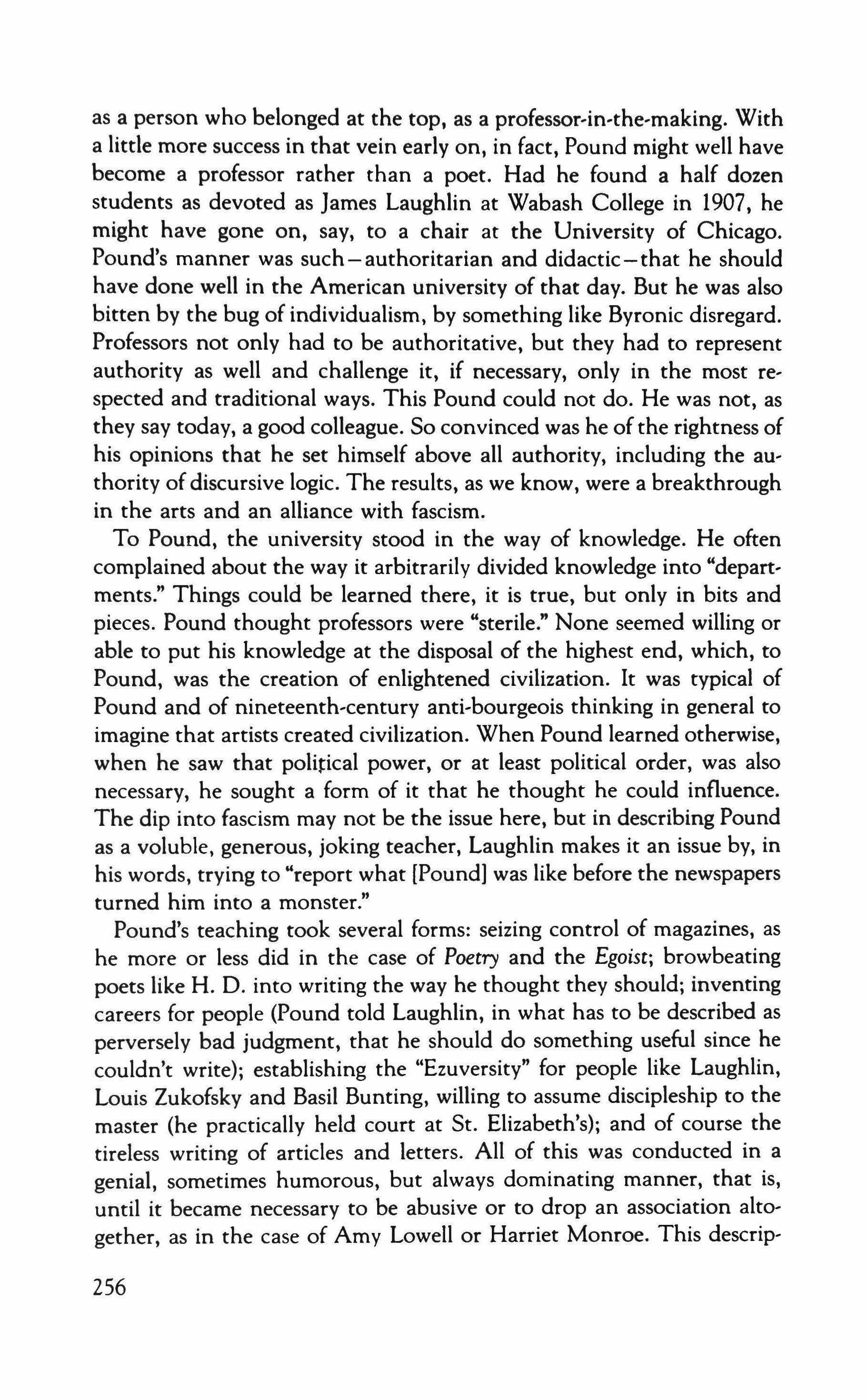
as a person who belonged at the top, as a professor-In-the-making. With a little more success in that vein early on, in fact, Pound might well have become a professor rather than a poet. Had he found a half dozen students as devoted as James Laughlin at Wabash College in 1907, he might have gone on, say, to a chair at the University of Chicago. Pound's manner was such-authoritarian and didactic-that he should have done well in the American university of that day. But he was also bitten by the bug of individualism, by something like Byronic disregard. Professors not only had to be authoritative, but they had to represent authority as well and challenge it, if necessary, only in the most respected and traditional ways. This Pound could not do. He was not, as they say today, a good colleague. So convinced was he ofthe rightness of his opinions that he set himself above all authority, including the au, thority ofdiscursive logic. The results, as we know, were a breakthrough in the arts and an alliance with fascism.
To Pound, the university stood in the way of knowledge. He often complained about the way it arbitrarily divided knowledge into "depart, ments." Things could be learned there, it is true, but only in bits and pieces. Pound thought professors were "sterile." None seemed willing or able to put his knowledge at the disposal of the highest end, which, to Pound, was the creation of enlightened civilization. It was typical of Pound and of nineteenth-century anti-bourgeois thinking in general to imagine that artists created civilization. When Pound learned otherwise, when he saw that political power, or at least political order, was also necessary, he sought a form of it that he thought he could influence. The dip into fascism may not be the issue here, but in describing Pound as a voluble, generous, joking teacher, Laughlin makes it an issue by, in his words, trying to "report what [Pound] was like before the newspapers turned him into a monster."
Pound's teaching took several forms: seizing control of magazines, as he more or less did in the case of Poetry and the Egoist; browbeating poets like H. D. into writing the way he thought they should; inventing careers for people (Pound told Laughlin, in what has to be described as perversely bad judgment, that he should do something useful since he couldn't write); establishing the "Ezuversity" for people like Laughlin, Louis Zukofsky and Basil Bunting, willing to assume discipleship to the master (he practically held court at St. Elizabeth's); and of course the tireless writing of articles and letters. All of this was conducted in a genial, sometimes humorous, but always dominating manner, that is, until it became necessary to be abusive or to drop an association alto, gether, as in the case of Amy Lowell or Harriet Monroe. This descrip-
256
tion of things makes Pound seem rough and ungentle, as he sometimes was, but I put it this way to offset the slightly partial view of him given by Laughlin. I don't doubt Laughlin's Pound at all, but I don't doubt Charles Olson's either, or Elizabeth Bishop's. No one was a more devoted admirer than Olson, yet he came finally to dislike Pound for his insistent, mindless anti-Semitism, and though I am willing to believe, as Laughlin wishes me to, that Pound's famous fascist salute on his return to Italy in 1958 was a joke, it has to rank as one of the cruelest jokes ever attempted.
In some sense, the incompatability between the writer and the university typifies the Romantic distrust of the intellect and of the social and political forms that reason breeds. The university in Pound's day, as he discovered at Wabash, was there to keep the door to the moral barn closed. An institution so committed to preserving a social and moral order could hardly be expected to take the risks necessary to invent and meet the future. An institution as committed as the university was (and to a large extent still is) to the preservation of tradition, to seeing the present as the evolved child of the past, could not see (or was terrified by) the discontinuities with the past that were everywhere apparent in 1910. It could act only as a drag and an anchor to a world that, to be truthful, would have been born with or without Ezra Pound. It was part of Pound's luck and genius to be there, to see what was happening and to act upon it.

Buried deeply in Richard Ohmann's Politics of Letters is a description of the "ideology of writers and intellectuals." Pound is not mentioned in his book-for various reasons-but it is as good a thumbnail sketch of Pound as we are apt to find.
The free, untrammeled, unique, "original" individual, expressing itself freely (including sexually), above or outside of any particular society or set of institutions, free through ideas and literature and art and conversation I've called this an ideology of writers and intellectuals, who stand apart from bankers and industrialists and stockbrokers and often bitterly criticize them. But this romantic ideal of the free self is critical of the capitalist world order only from a point of view internal to it; it is itself a form ofcapitalist ideology-of individualism, specifically, which has its base in the ideology of the free market and of free competition.
This is really a thumbnail sketch of our entire system of letters. Pound is merely an exaggeration and distortion ofwhat the rest of us are or would be. It does no good, either, to say that Ohmann's critique of the Arneri-
* * *
257
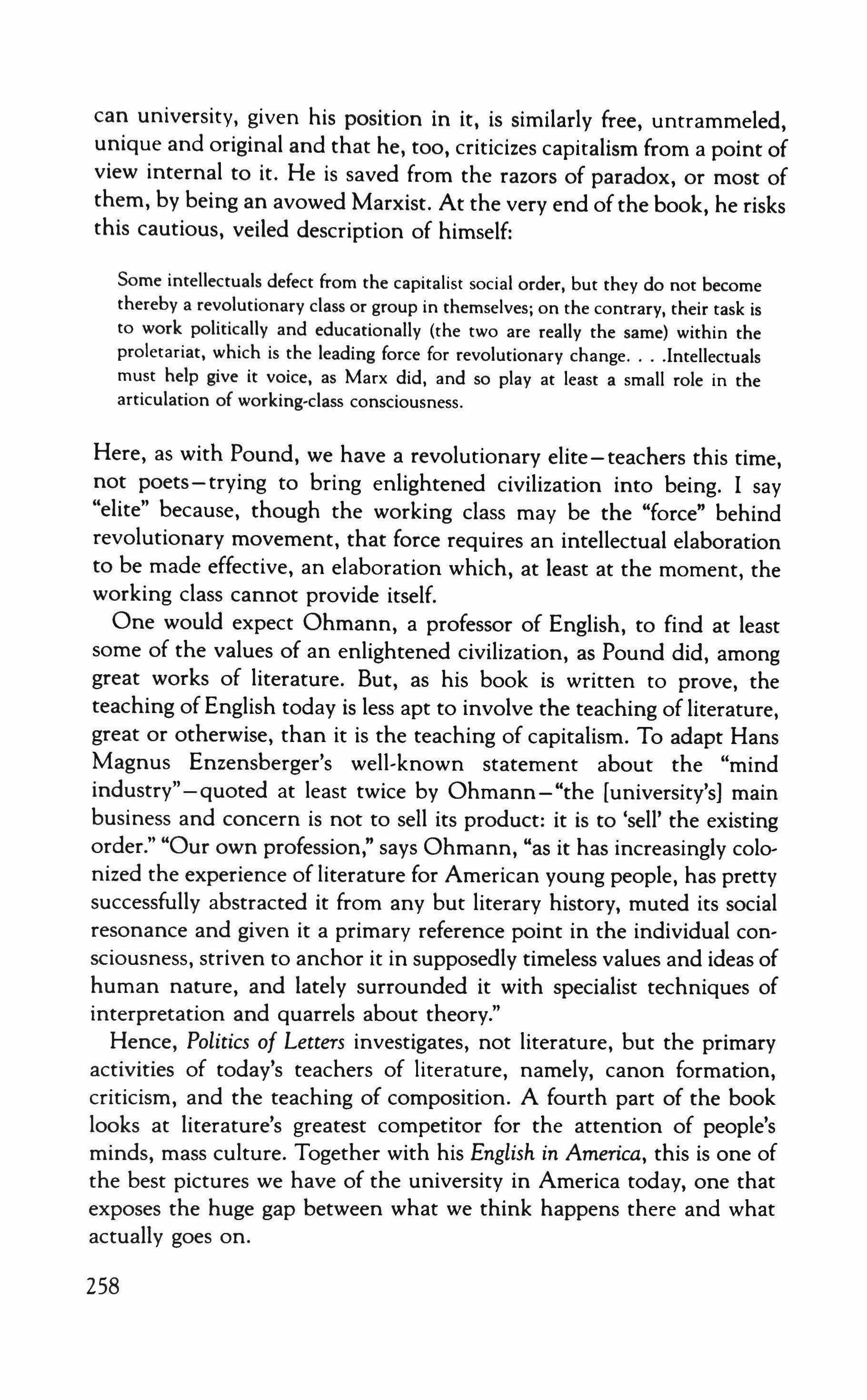
can university, given his position in it, is similarly free, untrammeled, unique and original and that he, too, criticizes capitalism from a point of view internal to it. He is saved from the razors of paradox, or most of them, by being an avowed Marxist. At the very end of the book, he risks this cautious, veiled description of himself:
Some intellectuals defect from the capitalist social order, but they do not become thereby a revolutionary class or group in themselves; on the contrary, their task is to work politically and educationally (the two are really the same) within the proletariat, which is the leading force for revolutionary change .Intellectuals must help give it voice, as Marx did, and so play at least a small role in the articulation of working-class consciousness.
Here, as with Pound, we have a revolutionary elite-teachers this time, not poets-trying to bring enlightened civilization into being. I say "elite" because, though the working class may be the "force" behind revolutionary movement, that force requires an intellectual elaboration to be made effective, an elaboration which, at least at the moment, the working class cannot provide itself.
One would expect Ohmann, a professor of English, to find at least some of the values of an enlightened civilization, as Pound did, among great works of literature. But, as his book is written to prove, the teaching of English today is less apt to involve the teaching of literature, great or otherwise, than it is the teaching of capitalism. To adapt Hans Magnus Enzensberger's well-known statement about the "mind industry"-quoted at least twice by Ohmann-"the [university's] main business and concern is not to sell its product: it is to 'sell' the existing order." "Our own profession," says Ohmann, "as it has increasingly colonized the experience of literature for American young people, has pretty successfully abstracted it from any but literary history, muted its social resonance and given it a primary reference point in the individual consciousness, striven to anchor it in supposedly timeless values and ideas of human nature, and lately surrounded it with specialist techniques of interpretation and quarrels about theory."
Hence, Politics of Letters investigates, not literature, but the primary activities of today's teachers of literature, namely, canon formation, criticism, and the teaching of composition. A fourth part of the book looks at literature's greatest competitor for the attention of people's minds, mass culture. Together with his English in America, this is one of the best pictures we have of the university in America today, one that exposes the huge gap between what we think happens there and what actually goes on.
258
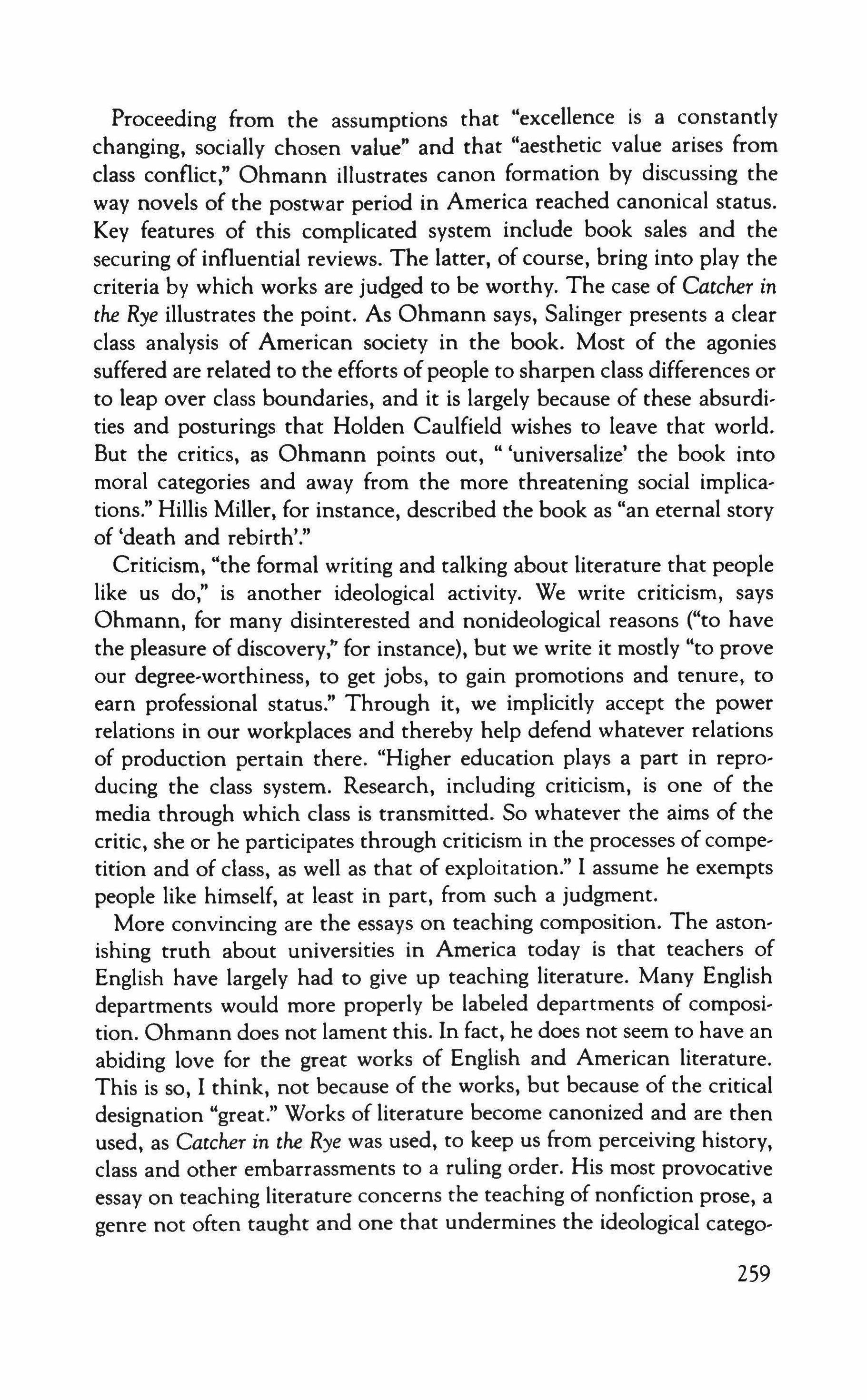
Proceeding from the assumptions that "excellence is a constantly changing, socially chosen value" and that "aesthetic value arises from class conflict," Ohmann illustrates canon formation by discussing the way novels of the postwar period in America reached canonical status. Key features of this complicated system include book sales and the securing of influential reviews. The latter, of course, bring into play the criteria by which works are judged to be worthy. The case of Catcher in the Rye illustrates the point. As Ohmann says, Salinger presents a clear class analysis of American society in the book. Most of the agonies suffered are related to the efforts ofpeople to sharpen class differences or to leap over class boundaries, and it is largely because of these absurdities and posturings that Holden Caulfield wishes to leave that world. But the critics, as Ohmann points out, "'universalize' the book into moral categories and away from the more threatening social implications." Hillis Miller, for instance, described the book as "an eternal story of 'death and rebirth'."
Criticism, "the formal writing and talking about literature that people like us do," is another ideological activity. We write criticism, says Ohmann, for many disinterested and nonideological reasons ("to have the pleasure of discovery," for instance), but we write it mostly "to prove our degree-worthiness, to get jobs, to gain promotions and tenure, to earn professional status." Through it, we implicitly accept the power relations in our workplaces and thereby help defend whatever relations of production pertain there. "Higher education plays a part in reproducing the class system. Research, including criticism, is one of the media through which class is transmitted. So whatever the aims of the critic, she or he participates through criticism in the processes of competition and of class, as well as that of exploitation." I assume he exempts people like himself, at least in part, from such a judgment.
More convincing are the essays on teaching composition. The astonishing truth about universities in America today is that teachers of English have largely had to give up teaching literature. Many English departments would more properly be labeled departments of composition. Ohmann does not lament this. In fact, he does not seem to have an abiding love for the great works of English and American literature. This is so, I think, not because of the works, but because of the critical designation "great." Works of literature become canonized and are then used, as Catcher in the Rye was used, to keep us from perceiving history, class and other embarrassments to a ruling order. His most provocative essay on teaching literature concerns the teaching of nonfiction prose, a genre not often taught and one that undermines the ideological catego-
259

ries of genre and form. The essay essentially attacks Northrop Frye for having made no room in The Anatomy of Criticism for nonfiction prose. Nonfiction, says Ohmann, is open-ended, It resists form by resisting closure. "I think the genre releases energies that resist closure and the repose or resignation that would go with it." This is perhaps doubly true since he is talking about Let Us Now Praise Famous Men, Children of Crisis, Road to Wigan Pier, Working and other books about widespread poverty.
I gather Ohmann would rather teach composition than literature. In composition classes he can deal more directly with students' minds. Also, there the mystifying interference of great literature, of who says it is great and why, is less apt to interfere with his efforts to help students perceive the real nature of the world. He makes a convincing case that the automatic injunctions to use definite, specific, concrete language "push the student writer always toward the language that most nearly reproduces the immediate experience and away from the language that might be used to understand it, transform it, and relate it to everything else." It is a strategy of writing that teaches that it is better to have the experience than to understand it, and it is not terribly far away from the automatic injunction passed on to those other writers in English departments-the creative writers: show, don't tell. The language that students are encouraged to develop, says Ohman, removes the writer from history, undermines comprehensive forms of perception by being fragmentary, encourages solipsism ("this is what I saw and felt"), and denies conflict. "The ways ofteaching composition that simply block out the social process around our teaching and our students' writing have little chance of fostering critical literacy."
When it comes to written assignments, Ohmann prefers the interview to the expository essay. It is an open rather than a closed form. In that sense, it makes the piece of writing less the inviolable personal creation of the writer, as all formal writing tends to do, and more a transcription of the world. It requires that students make contact with people and not just with books and ideas. It forces them to look outwardly as well as inwardly.
Finally, mass culture. Its pervasiveness and its power to shape people's lives make it the true "school" of our culture. Here, too, Ohmann finds form and content deeply ideological. He is particularly hard on what passes for news. TV, for instance, organizes "our political reality into safe and familiar patterns." The sporting spectacle, with its winners and losers, its tiny minority of participants and its great majority of passive observers, turns politics into a game which most watch and few play.
260
The problem/solution syndrome "drains issues of their politics" by making politics a succession of problems to be solved and government merely a technocratic institution. When politics is turned into a succession of "issues," history and the overall sense of politics at work in our lives are obscured. The media urges "a fragmented, classless nonpolitical awareness on those who might have something to gain by changing the status quo through a genuine politics." And, since TV is essentially owned by the advertisers, we should not be too surprised by this state of affairs.

It would be hard to imagine two people more at odds with one another than Ezra Pound and Richard Ohmann. Pound would accuse Ohmann of a philistine disregard for the arts. Ohmann would say that it was not really art Pound had in mind. They would each accuse the other of being more interested in politics than in the given nature oftheir chosen work, writing poetry and professing literature. And, to a large extent, they would both be right. At the center of both perceptions of the world, as well, lies an unquestioned belief in the need for learning coupled with a criticism of the institution that should provide it. And that criticism is, at bottom, the same: that the university is too much a part of the capitalist order and that that order should be done away with.
At a time when our educational system is being called into question by the conservative right, it is good to read about two passionate radical teachers. When Allen Bloom, E. D. Hirsch and Secretary Bennett are trying to restore standards, it is good to have people around to ask the relevant questions. Whose standards? Standards with what goals in mind? Etc. The governor of my state (Indiana) suddenly became alarmed a few years ago and pushed an educational reform bill through the legislature. It is called the"A-Plus Program." Why did he do this? In his own words, to provide business in our state with a better-trained work force. Given such a conception of education, it is little wonder that alternative models of the university don't spring up everywhere, not just in Ezra Pound's living room or in Richard Ohmann's university classroom. To survive as a human being, to resist being tooled as a microchip in someone else's computer, to be allowed to see and to think about the world for oneself and in authentic terms, one must resist the general tenor and purposes of our schools. Are the students who are "learning nothing" smarter than we think? Is "dropping out" the only way for
* * *
261

many people to survive? Whatever the answers to these questions, resisting education, as these two books show, has been thought necessary in our society for a long time.
Pound's battle on this front was fought against the middle class whom he saw as indifferent, even hostile, to art. Insofar as the middle class demanded that its art directly support its morality and make itself perfectly clear, as was obviously the case in America a hundred years ago, it was an oppressive opponent to art. All that has changed, though. The extent to which the United States has enlarged itself culturally in the last century is remarkable. Every city has its art museum. Many have symphony orchestras. Several prominent dance companies seem to survive. The youth culture which has emerged since the Second World War models itself on ideals of theatricality and performance. Poets and fiction writers can be found in every state. Most universities have creative writing courses, if not creative writing programs. And yet, as Richard Ohmann would undoubtedly say, nothing has changed. Art, the new morality - everything that has come along, in fact - has found a comfortable place in a socio-political system that remains in all essentials the same. Does the admission of writers and writing programs to the university mean that our poetry is better than it was? Does it mean that our writers are read more or have assumed the sort of role in society dreamed for them by Pound or by Neruda? Are the ideals and goals of this society less aquisitive or more esthetic than in the days of Rockefeller and Carnegie? The irony is that, for the most part, Pound's "revolution" succeeded without raising more than a ripple on the surface of the society he hoped to transform.
Yet, hovering over Ohmann's convincing analyses of the ideological nature of our universities is something like a puritanic fear or dislike of artists and writers for not committing themselves to truths and causes of the highest sort. The missing section of his book is about teaching literature. Does literature play no positive role in the raising of consciousness? Are books and their authors just too unreliably individualistic to be able to effect this? Does a Marxist professor of literature have to teach around his subject, avoiding it, apologizing for its shortcomings, implying that there are so many more important things than mere books?
Marx himself is a useful model here. Marx was a scholar and a writerin a word, a member of the middle class. Marxism itself is a body of thought created and kept alive by the middle class. If you walk into a bar in south Philadelphia and start talking about hegemony, ideology and the means of production, you'll be invited to leave. Marxism is embed-
262

ded in the jargon of an educated elite. Yet without it-such is the dialectical nature of things-the truth cannot be seen very clearly or the way forward indicated. Something like this is true of literature as well. It might be written by a proto-fascist in the isolation of his study and in celebration of the virtues of individual experience and personal revelation, but are not individual experience and personal revelation things which a truly liberated people would have, things which in their current condition of profound alienation most people do not have? Would the communist state of the future-the one imagined by Marx-do away with individuality, or would it give it a true foundation? Would that state not be a better one for having a few renegade teachers in its schools and universities making sure that the power in that state remains wisely dispersed?
And, to round out the paradoxes, has this country produced an artist who has called more of what we are and do into question than Ezra Pound? Are we not still working out the implications of his efforts to cleanse our particularly noxious stables?
263
Contributors

Leo Masliah is a musician and performance poet from Uruguay. The pieces appearing here were originally performed in concert in South America as monologues alternating with musical compositions. * * * Donna L. Trussell edits an arts-and-entertainment newspaper in Kansas City, Missouri. Her fiction and poetry have appeared in the Massachusetts Review, Poetry Northwest and other journals. * * * Lynn Grossman's stories have appeared in Story Quarterly, the Quarterly, TQ #68 and the anthology Hot Type, edited by John Miller (Collier Macmillan, 1988). She lives in New York City.
Angela Jackson's collections of poems include VooDoo/Love Magic (Third World Press, 1974) and The Greenville Club, in Four Black Poets (BkMk Press, 1978). Two other excerpts from her novel, Treemont Stone, appeared in TQ #60 and 71. She teaches at Columbia College, in Chicago.
* * * Leo E. Litwak's novels include Waiting for the News, which will be reissued this year by Wayne State University Press. He teaches English and creative writing at San Francisco State Unversity.
* * * Kate Kaufman was awarded the Michigan Council for the Arts 1988 grant for fiction. She lives in Grand Rapids. * * * Margaret Broucek holds an M.F.A. in writing from Sarah Lawrence College and lives in New York City.
Richard Pevear has translated into English books of poetry by Yves Bonnefoy, Alberto Savinio and Alain. In Mister Cat-and-a-Half and Our King Has Horns (published by Macmillan, 1986 and 1987), he retold Russian children's fables in English. * * * Besides translating from the Russian language, Larissa Volokhonskv has translated work by John Meyendorff, the historian of religions, from English into Russian.
* * * Athina Papadaki has written four poetry collections in
264
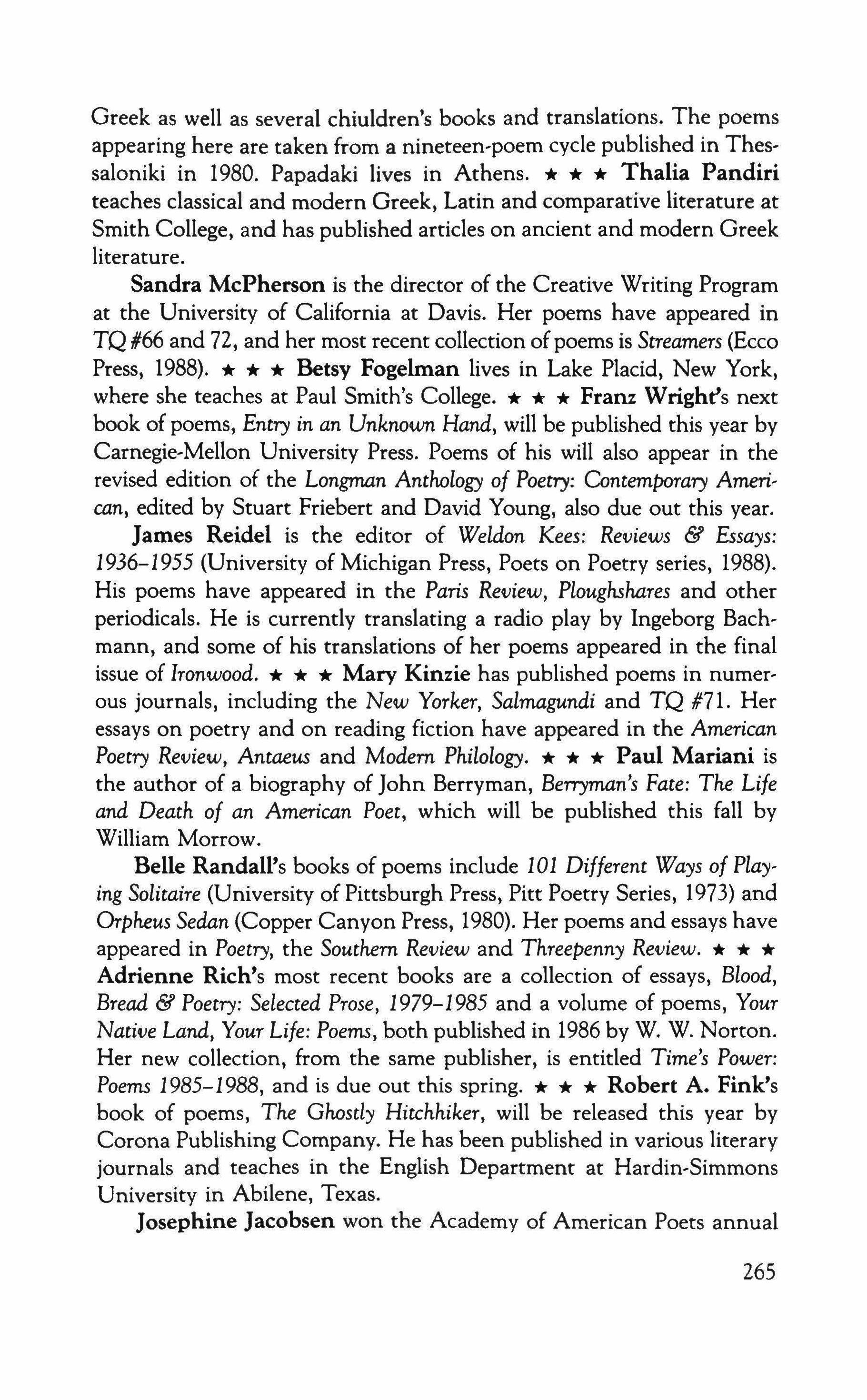
Greek as well as several chiuldren's books and translations. The poems appearing here are taken from a nineteen-poem cycle published in Thessaloniki in 1980. Papadaki lives in Athens. * * * Thalia Pandiri teaches classical and modern Greek, Latin and comparative literature at Smith College, and has published articles on ancient and modern Greek literature.
Sandra McPherson is the director of the Creative Writing Program at the University of California at Davis. Her poems have appeared in TQ #66 and 72, and her most recent collection ofpoems is Streamers (Ecco Press, 1988). * * * Betsy Fogelman lives in Lake Placid, New York, where she teaches at Paul Smith's College. * * * Franz Wright's next book of poems, Entry in an Unknoum Hand, will be published this year by Carnegie-Mellon University Press. Poems of his will also appear in the revised edition of the Longman Anthology of Poetry: Contemporary American, edited by Stuart Friebert and David Young, also due out this year.
James Reidel is the editor of Weldon Kees: Reviews & Essays: 1936-1955 (University of Michigan Press, Poets on Poetry series, 1988). His poems have appeared in the Paris Review, Ploughshares and other periodicals. He is currently translating a radio play by Ingeborg Bachmann, and some of his translations of her poems appeared in the final issue of Ironwood. * * * Mary Kinzie has published poems in numerous journals, including the New Yorker, Salmagundi and TQ #71. Her essays on poetry and on reading fiction have appeared in the American Poetry Review, Antaeus and Modem Philology. * * * Paul Mariani is the author of a biography of John Berryman, Berryman's Fate: The Life and Death of an American Poet, which will be published this fall by William Morrow.
Belle Randall's books of poems include 101 Different Ways of Playing Solitaire (University of Pittsburgh Press, Pitt Poetry Series, 1973) and Orpheus Sedan (Copper Canyon Press, 1980). Her poems and essays have appeared in Poetry, the Southern Review and Threepenny Review. * * * Adrienne Rich's most recent books are a collection of essays, Blood, Bread & Poetry: Selected Prose, 1979-1985 and a volume of poems, Your Native Land, Your Life: Poems, both published in 1986 by W. W. Norton. Her new collection, from the same publisher, is entitled Time's Power: Poems 1985-1988, and is due out this spring. * * * Robert A. Fink's book of poems, The Ghostly Hitchhiker, will be released this year by Corona Publishing Company. He has been published in various literary journals and teaches in the English Department at Hardin-Simmons University in Abilene, Texas.
Josephine Jacobsen won the Academy of American Poets annual
265
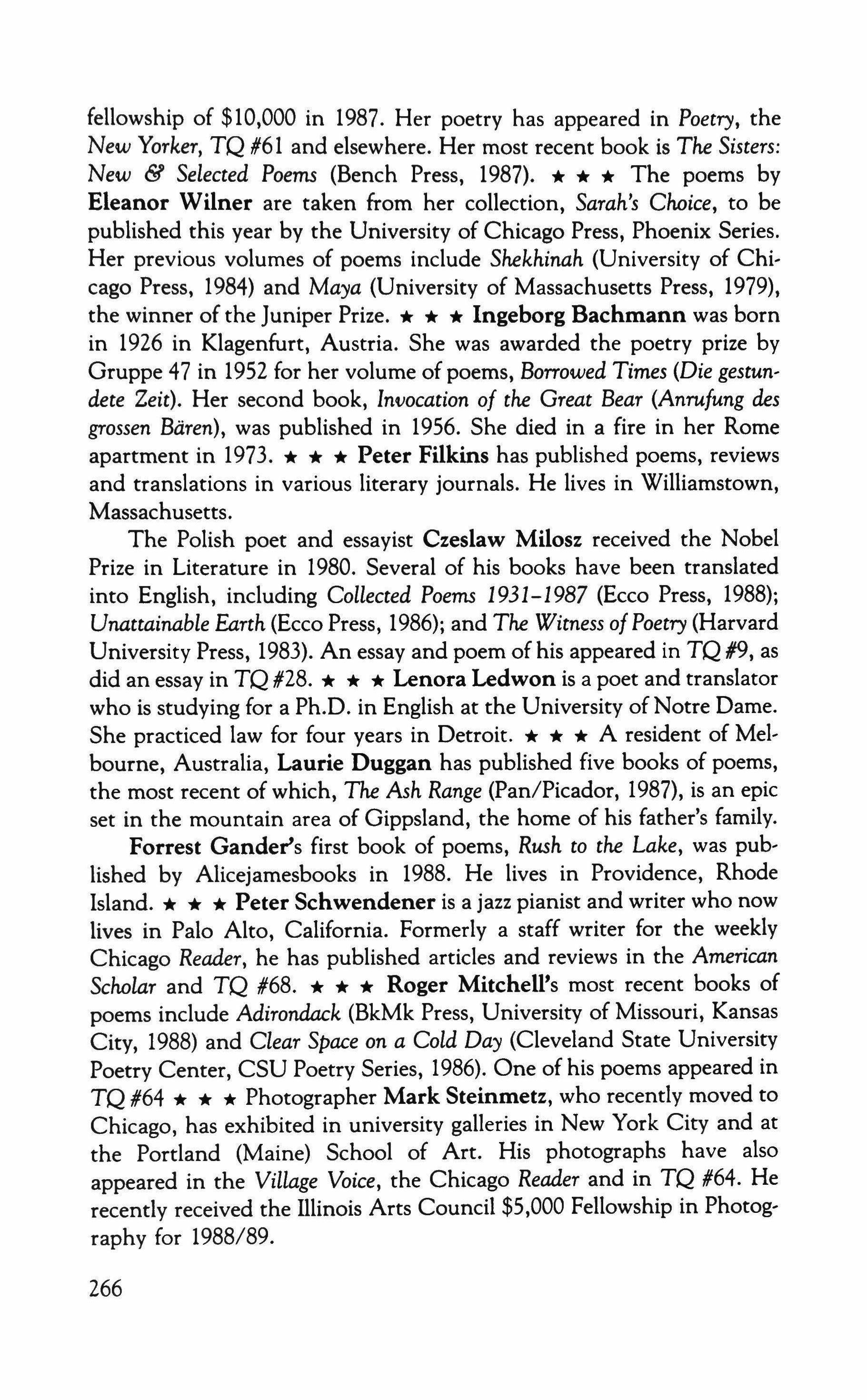
fellowship of $10,000 in 1987. Her poetry has appeared in Poetry, the New Yorker, TQ #61 and elsewhere. Her most recent book is The Sisters: New & Selected Poems (Bench Press, 1987). * * * The poems by Eleanor Wilner are taken from her collection, Sarah's Choice, to be published this year by the University of Chicago Press, Phoenix Series. Her previous volumes of poems include Shekhinah (University of Chi, cago Press, 1984) and Maya (University of Massachusetts Press, 1979), the winner of the Juniper Prize. * * * Ingeborg Bachmann was born in 1926 in Klagenfurt, Austria. She was awarded the poetry prize by Gruppe 47 in 1952 for her volume of poems, Borrowed Times (Die gestundete Zeit). Her second book, Invocation of the Great Bear (Anrufung des grossen Baren), was published in 1956. She died in a fire in her Rome apartment in 1973. * * * Peter Filkins has published poems, reviews and translations in various literary journals. He lives in Williamstown, Massachusetts.
The Polish poet and essayist Czeslaw Milosz received the Nobel Prize in Literature in 1980. Several of his books have been translated into English, including Collected Poems 1931-1987 (Ecco Press, 1988); Unattainable Earth (Ecco Press, 1986); and The Witness ofPoetry (Harvard University Press, 1983). An essay and poem of his appeared in TQ #9, as did an essay in TQ #28. * * * Lenora Ledwon is a poet and translator who is studying for a Ph.D. in English at the University of Notre Dame. She practiced law for four years in Detroit. * * * A resident of Mel, bourne, Australia, Laurie Duggan has published five books of poems, the most recent of which, The Ash Range (Pan/Picador, 1987), is an epic set in the mountain area of Gippsland, the home of his father's family. Forrest Gander's first book of poems, Rush to the Lake, was published by Alicejamesbooks in 1988. He lives in Providence, Rhode Island. * * * Peter Schwendener is a jazz pianist and writer who now lives in Palo Alto, California. Formerly a staff writer for the weekly Chicago Reader, he has published articles and reviews in the American Scholar and TQ #68. * * * Roger Mitchell's most recent books of poems include Adirondack (BkMk Press, University of Missouri, Kansas City, 1988) and Clear Space on a Cold Day (Cleveland State University Poetry Center, CSU Poetry Series, 1986). One of his poems appeared in TQ #64 * * * Photographer Mark Steinmetz, who recently moved to Chicago, has exhibited in university galleries in New York City and at the Portland (Maine) School of Art. His photographs have also appeared in the Village Voice, the Chicago Reader and in TQ #64. He recently received the illinois Arts Council $5,000 Fellowship in Photog, raphy for 1988/89.
266
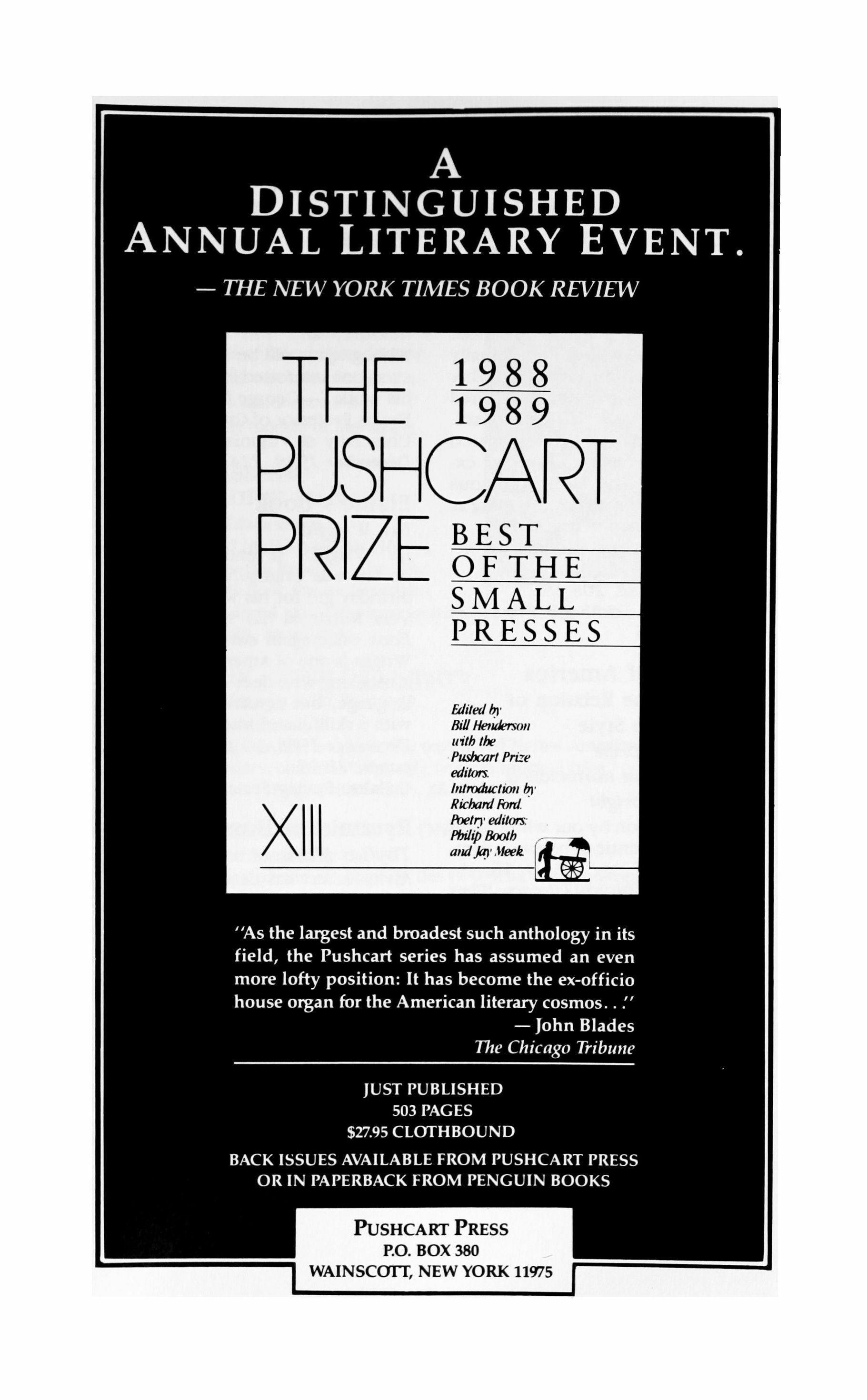
A DISTINGUISHED ANNUAL LITERARY EVENT. - tnt: NEW YORK TIMES BOOK REVIEW THE 1988 1989 PUSHCART PRZE BEST OFTHE SMALL PRESSES XIII Edited bv BiU HetidersOIl uitb the Pushcart Prize editors. huroductiou bv Ricbard ForrJ. Poetrv editors. PhiliP Booth andjay,Week. PuSHCART PRESS P.O. BOX 380 �;;;;;;;;;;;;;;;;;;;;;;;;;;;;;;;;;;;;;;;iiiiiiiiiiiii"" WAINSCarr, NEW YORK 11'175
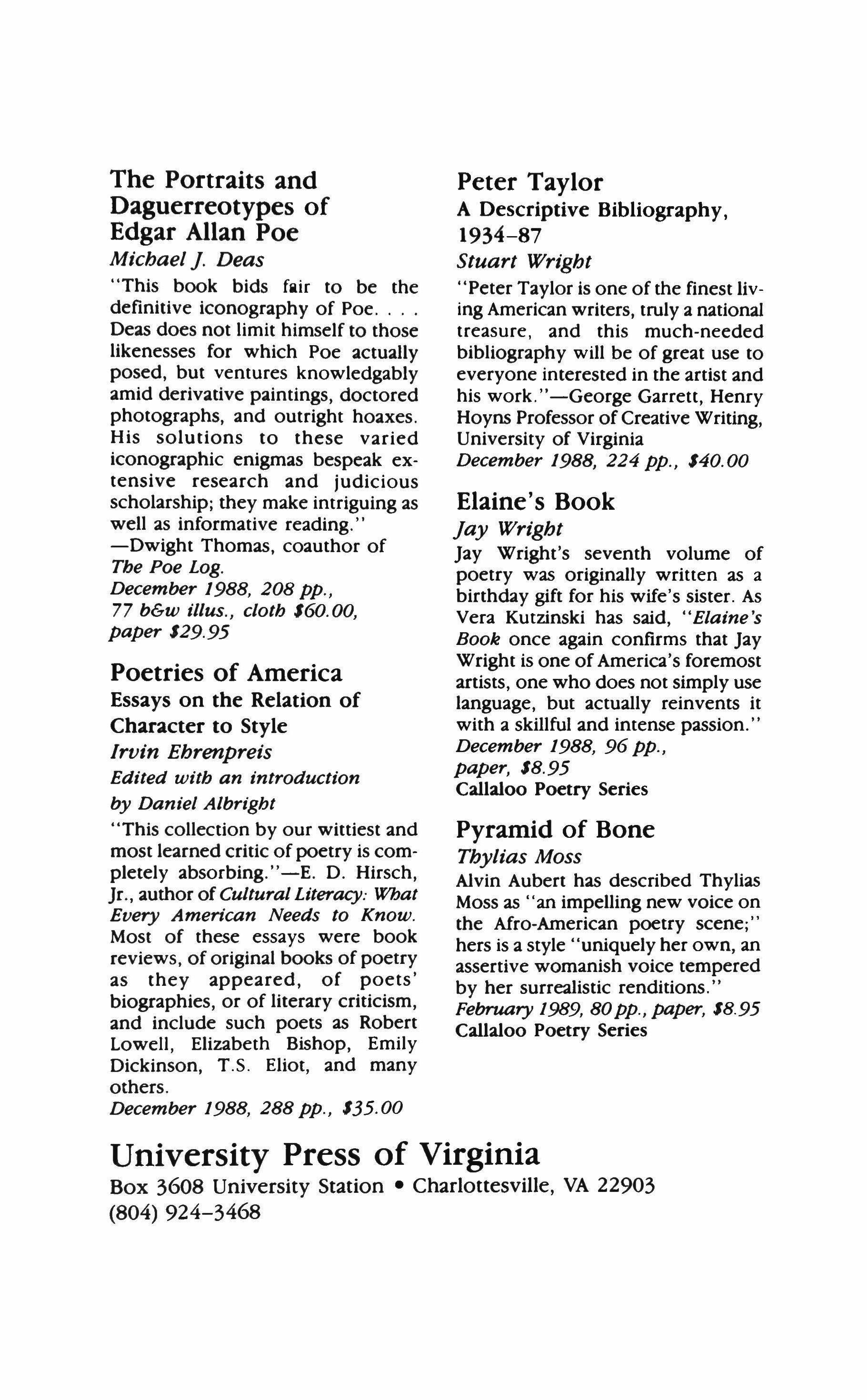
The Portraits and Daguerreotypes of Edgar Allan Poe
Michael]. Deas
"This book bids fair to be the definitive iconography of Poe Deas does not limit himself to those likenesses for which Poe actually posed, but ventures knowledgably amid derivative paintings, doctored photographs, and outright hoaxes. His solutions to these varied iconographic enigmas bespeak extensive research and judicious scholarship; they make intriguing as well as informative reading."
-Dwight Thomas, coauthor of Tbe Poe Log.
December 1988,208 pp., 77 b&w illus., clotb 160.00, paper 129.95
Poetries of America
Essays on the Relation of Character to Style
Irvin Ebrenpreis
Edited witb an introduction by Daniel Albrigbt
"This collection by our wittiest and most learned critic of poetry is completely absorbing."-E. D. Hirsch, jr., author of Cultural Literacy: What Every American Needs to Know. Most of these essays were book reviews, of original books of poetry as they appeared, of poets' biographies, or of literary criticism, and include such poets as Robert Lowell, Elizabeth Bishop, Emily Dickinson, T.S. Eliot, and many others.
December 1988, 288 pp., 135.00
Peter Taylor A Descriptive Bibliography, 1934-87
Stuart Wright
"Peter Taylor is one of the finest living American writers, truly a national treasure, and this much-needed bibliography will be of great use to everyone interested in the artist and his work."
-George Garrett, Henry Hoyns Professor of Creative Writing, University of Virginia
December 1988, 224 pp., 140.00
Elaine's Book Jay Wright
Jay Wright's seventh volume of poetry was originally written as a birthday gift for his wife's sister. As Vera Kutzinski has said, "Elaine's Book once again confirms that Jay Wright is one of America's foremost artists, one who does not simply use language, but actually reinvents it with a skillful and intense passion."
December 1988,96 pp., paper, 18.95
Callaloo Poetry Series
Pyramid of Bone Tbylias Moss
Alvin Aubert has described Thylias Moss as "an impelling new voice on the Afro-American poetry scene;" hers is a style "uniquely her own, an assertive womanish voice tempered by her surrealistic renditions."
February 1989,80pp., paper, 18.95
Callaloo Poetry Series
University Press of Virginia
Box 3608 University Station • Charlottesville, VA 22903 (804) 924-3468
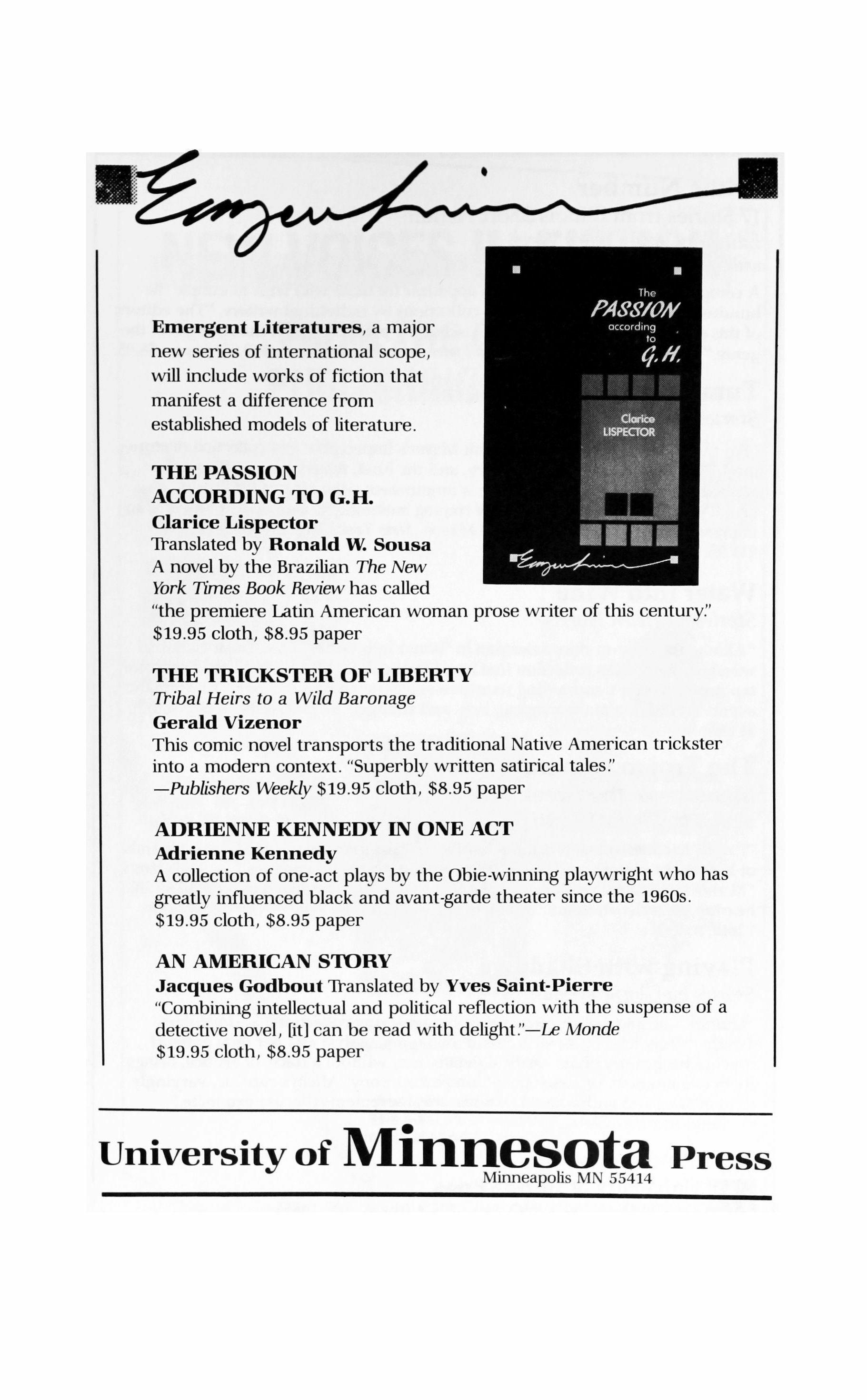
Emergent Literatures, a major new series of international scope, will include works of fiction that manifest a difference from established models of literature.
THE PASSION ACCORDING TO G.H.
Clarice Lispector
Translated by Ronald W. Sousa
A novel by the Brazilian The New York Times Book Review has called "the premiere Latin American woman prose writer of this century:' $19.95 cloth, $8.95 paper
THE TRICKSTER OF LIBERTY
Tribal Heirs to a Wild Baronage
Gerald Vizenor
This comic novel transports the traditional Native American trickster into a modern context. "Superbly written satirical tales:' -Publishers Weekly $19.95 cloth, $8.95 paper
ADRIENNE KENNEDY IN ONE ACT
Adrienne Kennedy
A collection of one-act plays by the Obie-winning playwright who has greatly influenced black and avant-garde theater since the 1960s. $19.95 cloth, $8.95 paper
AN AMERICAN STORY
Jacques Godbout Ttanslated by Yves Saint-Pierre
"Combining intellectual and political reflection with the suspense of a detective novel, [it] can be read with delight:'-Le Monde
$19.95 cloth, $8.95 paper
University of Minnesota Press
Minneapolis MN 55414
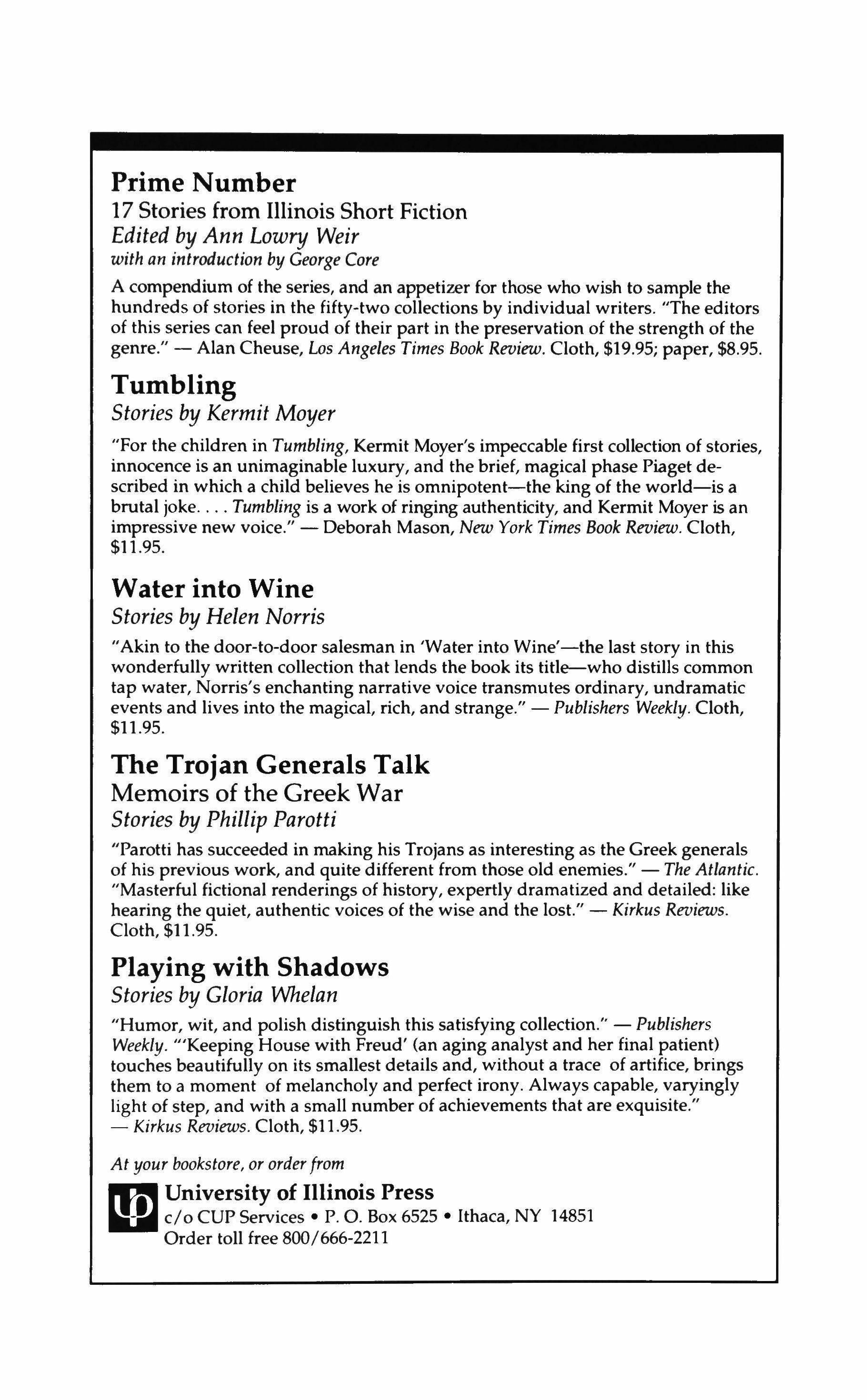
Prime Number
17 Stories from Illinois Short Fiction
Edited by Ann Lowry Weir with an introduction by George Core
A compendium of the series, and an appetizer for those who wish to sample the hundreds of stories in the fifty-two collections by individual writers. "The editors of this series can feel proud of their part in the preservation of the strength of the genre." - Alan Cheuse, Los Angeles Times Book Review. Cloth, $19.95; paper, $8.95.
Tumbling
Stories by Kermit Moyer
"For the children in Tumbling, Kermit Moyer's impeccable first collection of stories, innocence is an unimaginable luxury, and the brief, magical phase Piaget described in which a child believes he is omnipotent-the king of the world-is a brutal joke Tumbling is a work of ringing authenticity, and Kermit Moyer is an impressive new voice." - Deborah Mason, New York Times Book Review. Cloth, $11.95.
Water into Wine
Stories by Helen Norris
"Akin to the door-to-door salesman in 'Water into Wine'-the last story in this wonderfully written collection that lends the book its title-who distills common tap water, Norris's enchanting narrative voice transmutes ordinary, undramatic events and lives into the magical, rich, and strange." - Publishers Weekly. Cloth, $11.95.
The Trojan Generals Talk Memoirs of the Greek War
Stories by Phillip Parotti
"Parotti has succeeded in making his Trojans as interesting as the Greek generals of his previous work, and quite different from those old enemies." - The Atlantic. "Masterful fictional renderings of history, expertly dramatized and detailed: like hearing the quiet, authentic voices of the wise and the lost." - Kirkus Reviews. Cloth, $11.95.
Playing with Shadows
Stories by Gloria Whelan
"Humor, wit, and polish distinguish this satisfying collection:' - Publishers Weekly. "'Keeping House with Freud' (an aging analyst and her final patient) touches beautifully on its smallest details and, without a trace of artifice, brings them to a moment of melancholy and perfect irony. Always capable, varyingly light of step, and with a small number of achievements that are exquisite." - Kirkus Reviews. Cloth, $11.95.
At your bookstore, or order from � University of Illinois Press
M;II c/o CUP Services P. O. Box 6525 Ithaca, NY 14851
Order toll free 800/666-2211
NEW VOICES IN FICTION FROM THE CROWN PUBLISHING GROUP
HOUSE OF HEROES HI tun SlUIiS
MARY LA CHAPELLE

·Uke Anne Tyler, Bache draws her characters ffem the inside out.·
-DIANE SCHARPet' .. Baltimore Sun
A literary Guild and IIa. Doubleday Book Club Altemate
"Works powerfully as a comedy of manners."
- MICHIKO KAKUTANI, New York Times
·A thoroughly modern tale Both great fun to read arul asouree of powerful vlslOl"
MARY GORDON, author of Men and Angels
·Smooth and elegant, a respite for readers. bored with minimalist ftttion and self-lnd"'�1 gent heroes."
-KARENRA'I'. N Y. Times BookReview
Mary La Chapelle was the winner of the 1986 PEN/Nelson Algren Fiction Award.
r--!
ELLYN BACHE
"'��"--"-;-;PIJ""""'BL"--'I�SH�E=R:=S�loc�J 225 Park Ave, South, N.Y., N.Y. 10003
BA,KI: �"'.S.OXS
"Elegant, subtle, beautifully crafted."
-Washington PostBook World
"Surprising and enticing, lyrically beautiful Andrea Barrett's first novel illuminates the lives of three women, all connected to each other by a single man."
-DetroitNews
"Barrett resembles such eminent female writers as Gail Godwin and Anne Tyler.· -ClevelandPlain Dealer
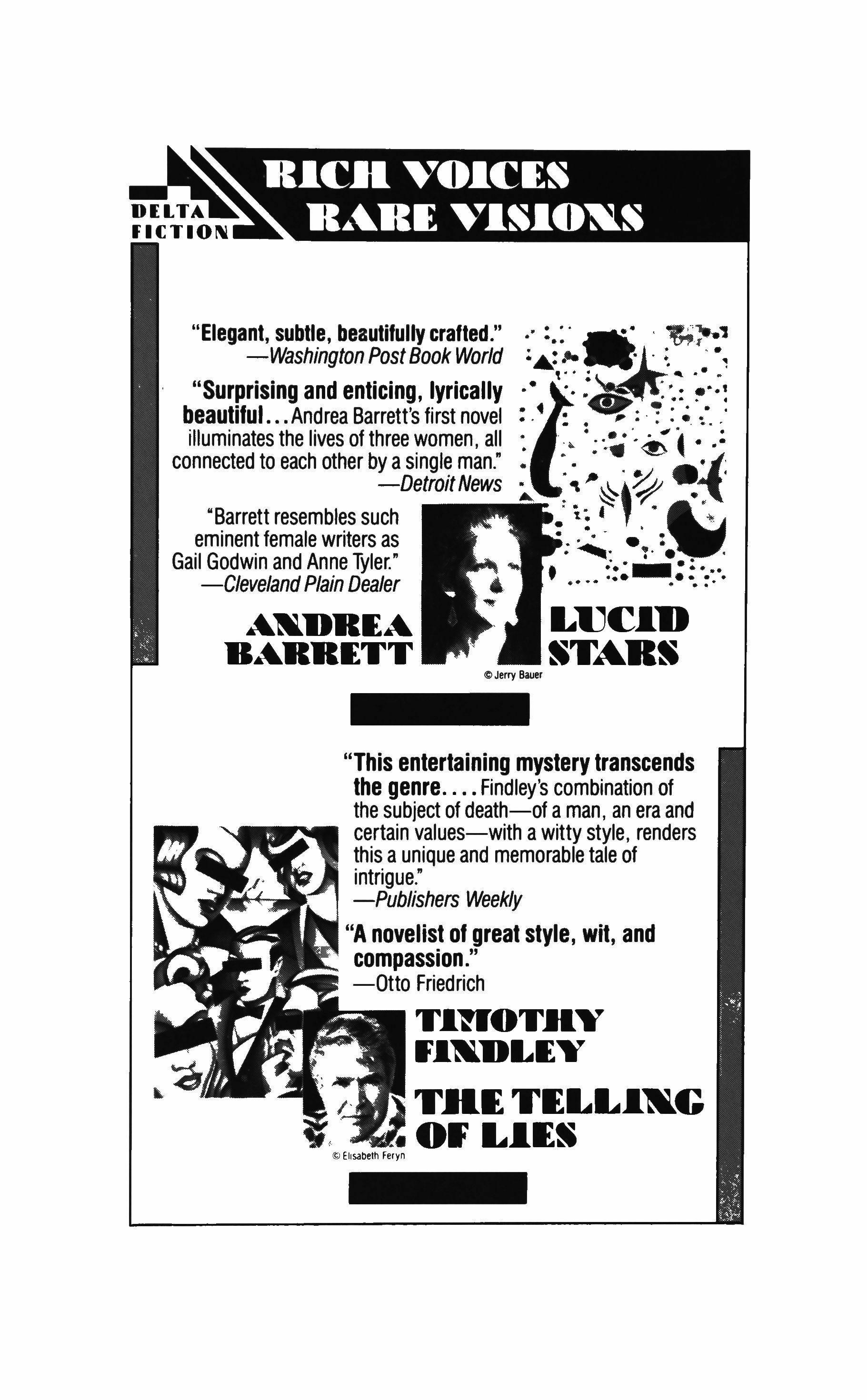
<I:> Jerry Bauer
"This entertaining mystery transcends the genre Findley's combination of the subject of death-of a man, an era and certain values-with a witty style, renders this a unique and memorable tale of intrigue."
-Publishers Weekly
"A novelist of great style, wit, and compassion."
-Otto Friedrich
Elisabeth Feryn
.�H VO.�I:S
•••.•• ">"�1 : �'U"'I'(.: ." � I'" ; " •• ! .� •• �. '!t •••. j �:>��:;�:; � rlj� i' • .: �: : y.. • ::.�.�.=: L'U(;ID 5TAB5
-.._-._
T.nOTHY DIAI:Y TilE TELL••G .OIJ LIE5
©
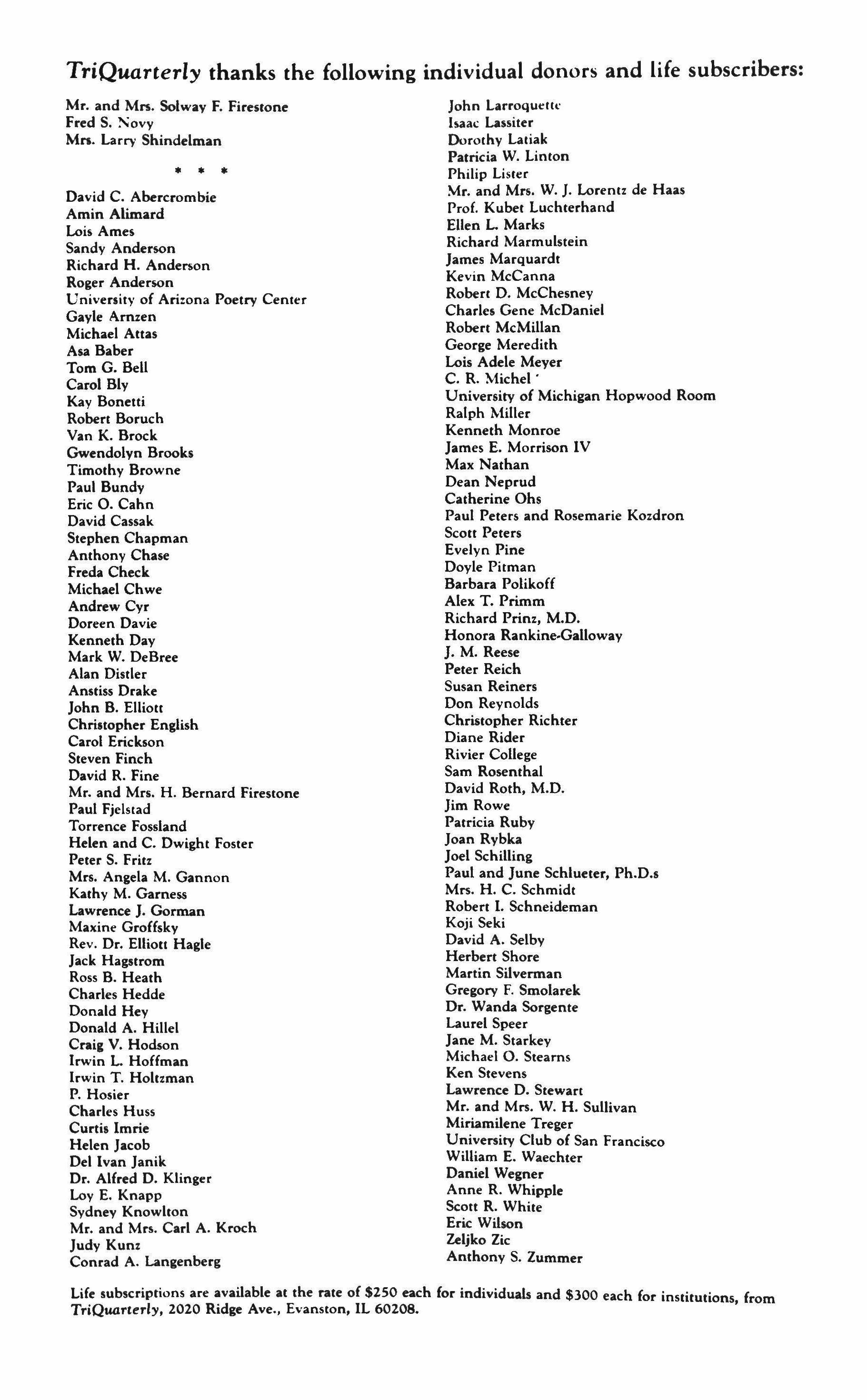
TriQuarterly thanks the following individual donors and life subscribers:
Mr. and Mrs. Solway F. Firestone
Fred S. �ovy
Mrs. Larry Shindelman
David C. Abercrombie
Amin Alimard
Lois Ames
Sandy Anderson
Richard H. Anderson
Roger Anderson
University of Ari:ona Poetry Center
Gayle Arnzen
Michael Anas
Au Baber
Tom G. Bell
Carol Bly
Kay Bonetti
Robert Boruch
Van K. Brock
Gwendolyn Brooks
Timothy Browne
Paul Bundy
Eric O. Cahn
David Cassak
Stephen Chapman
Anthony Chase
Freda Check
Michael Chwe
Andrew Cvr
Doreen Davie
Kenneth Day
Mark W. DeBree
Alan Distler
Anstiss Drake
John B. Elliott
Christopher English
Carol Erickson
Steven Finch
David R. Fine
Mr. and Mrs. H. Bernard Firestone
Paul Fjelstad
Torrence Fossland
Helen and C. Dwight Foster
Peter S. Fritz
Mrs. Angela M. Gannon
Kathy M. Gamess
Lawrence J. Gorman
Maxine Groffsky
Rev. Dr. Elliott Hagle
Jack Hagstrom
Ross B. Heath
Charles Hedde
Donald Hey
Donald A. Hillel
Craig V. Hodson
Irwin L. HoHman
Irwin T. Hohzman
P. Hosier
Charles Huss
Curtis Imrie
Helen Jacob
Del Ivan Janik
Dr. Alfred D. Klinger
Loy E. Knapp
Sydney Knowhon
Mr. and Mrs. Carl A. Kroch
Judy Kunz
Conrad A. Langenberg
John Larroquene
Isaac Lassiter
Dorothy Latiak
Patricia W. Linton
Philip Lister
Mr. and Mrs. W. J. Lorentz de Haas
Prof. Kubet Luchterhand
Ellen L. Marks
Richard Marmulstein
James Marquardt
Kevin McCanna
Robert D. McChesney
Charles Gene McDaniel
Robert McMillan
George Meredith
Lois Adele Meyer
C. R. Michel
University of Michigan Hopwood Room
Ralph Miller
Kenneth Monroe
James E. Morrison IV
Max Nathan
Dean Neprud
Catherine Ohs
Paul Peters and Rosemarie Kozdron
Scott Peters
Evelyn Pine
Doyle Pitman
Barbara Polikoff
Alex T. Primm
Richard Prinz, M.D.
Honora Rankine-Galloway
J. M. Reese
Peter Reich
Susan Reiners
Don Reynolds
Christopher Richter
Diane Rider
Rivier College
Sam Rosenthal
David Roth, M.D.
Jim Rowe
Patricia Ruby
Joan Rybka
Joel Schilling
Paul and June Schlueter, Ph.Des
Mrs. H. C. Schmidt
Robert 1. Schneideman
Koji Seki
David A. Selby
Herbert Shore
Martin Silverman
Gregory F. Smolarek
Dr. Wanda Sorgente
Laurel Speer
Jane M. Starkey
Michael O. Steams
Ken Stevens
Lawrence D. Stewart
Mr. and Mrs. W. H. Sullivan
Miriamilene Treger
University Club of San Francisco
William E. Waechter
Daniel Wegner
Anne R. Whipple
Scott R. White
Eric Wilson
Zeljko Zic
Anthony S. Zummer
TriQuarterly,
Life subscriptions are available at the rate of $250 each for individuals and $300 each f
2020 Ridge Ave., Evanston, IL 60208. or msurunons, from












































































































































































 Pevear and Larissa
Pevear and Larissa








































































































